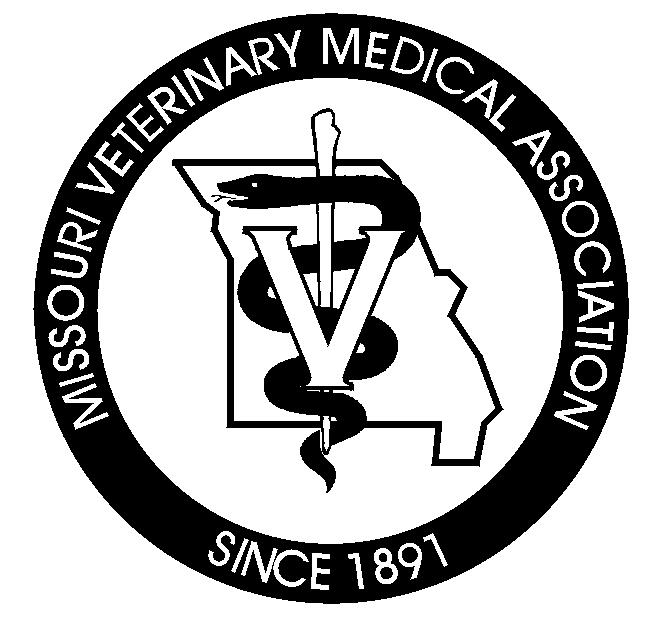

WORKING TOGETHER FOR OUR PROFESSION New Officer Handbook 2023 1
2
Table of Contents Item 1 Item 2 Item 3 Item 4 Item 5 Item 6 Item 7 Item 8 Item 9 Item 10 Item 11 Item 12 Expectations Contacts Calendar Strategic Plan Member Discounts and Benefits Member Website Virtual Tour Policy Manual Employee Manual Officer Handbook Constitution and Bylaws Committee Chair Handbook and their Members 5 9 11 13 15 21 27 75 99 119 143 151 3 Missouri Veterinary Medical Practice act
4
I
5
T E M 1
Expectations of Officer Nominees
(revised October 2015)
Nominees for Vice President agree to express their expectation
1. to serve as Vice President throughout year one, to run for election to Presidentelect at the at the end of year one, to serve during year two if elected as President-elect, to serve during year three if elected as President, and to serve during year four as Board Chair; and
2. to provide a photo, biography and a statement of why they would like to serve in the position for which they are vying which can be sent with the ballot.
3. to adhere to the high moral and ethical standards required as the profession’s representative to the public and as a role model to your peers.
General
Be prepared to undertake the cost of travel related to the duties of the office.
A $4,500 allowance for reimbursing expenses is allowed only during the one-year presidential term. Also a $200 lump sum is paid to each officer each year other than the president to offset MVMA related mileage and communications expenses.
You agree to find your replacement in your fourth year (when you are Board Chair). During your tenure, be looking for likely candidates and nurture them to be prepared to run for Vice President. The two years after you step down as Board Chair, you are on the Nominating Committee, helping the current Board Chair with leadership recruitment, sharing information about individuals in consideration for leadership.
Attend the Heartland Regional Veterinary Leadership Conference as Vice President, PresidentElect, and President.

Optionally attend the AVMA Convention during the presidential year.
Try to attend at least one district meeting in each district (nine districts) before the end of your fourth year.
Prepare a short message once each year for the newsletter.
Do your best to help your fellow officers by covering obligations they are unable to fulfill.
6
Year One -- Vice President
Constitutional Duties:
Vice President
The Vice President is responsible to:
(1) perform the duties of the President and President-Elect in their absence;
(2) serve as a member of the Executive Board, Board of Governors and Budget Committee;
(3 serve as Chairperson of the Membership Committee;
(4) perform other duties as requested by the President and Executive Board
(5) serve as Vice Chairperson of the Convention Program Committee
(6) keep the Executive Director fully informed.
Traditional schedule of activities:
Attend AVMA Leadership Conference in Chicago early January along with one or two other officers, Executive Director and one or two recent graduates. Hotel, airfare & meal costs covered by MVMA & AVMA. Spouse is welcome at your expense.
Attend board meeting in January. Participate in the convention to the fullest extent possible, serving as a role model to the membership. Hotel room courtesy MVMA.
Optionally attend Veterinary Day at the Capitol, usually a Tuesday in March
Optionally, attend the MVMA student lunch & learn at the college on a weekday in March
Attend Budget Committee meeting in March or April. Usually a half day meeting on a Sunday in Jefferson City.
Attend Board meeting in Spring (one or two days).
Serve as Membership Committee Chair
Oversee the endorsed programs & member benefits
Work with Exec. Director to promote membership as possible
June & July Recruit your Convention Program Committee, first meeting is conference call in August (18 months prior to your convention) to identify topics which industry council members will use to consider speakers they can offer. First in person meeting is at convention in January (12 months prior to your convention).
Optionally attend the Heartland Regional Veterinary Leadership Conference
Optionally attend the student orientation dinner on a Monday in late August
Attend Late September/Mid-October Board Meeting usually in Columbia on a Sunday morning
Optionally attend the industry council meeting in October in Jefferson City. Usually a two hour mid-day meeting on a Thursday. Industry partners work with MVMA to maximize sponsorship dollars for both the upcoming convention, as well as the next one.
Attend Policy Forum in Jefferson City on a Sunday afternoon in November.
7
8
I
9
T E M 2
Dr. Matt Silvius, President 4825 NW Gateway Riverside, MO 64150
816-741-2345 mss1195@gmail.com
Dr. Ed Migneco, Board Chair 5331 Wilson Ave
St. Louis, MO 63110 314-303-4255 emigneco0887@gmail.com
Dr. Shelia Taylor, Secretary-Treasurer 2878 S Eldon Springfield, MO 65807 417-447-8245 Work shelia9012@yahoo.com
Julie Braun, Executive Director 2500 Country Club Drive Jefferson City, MO 65109 573-636-8612 Work 573-659-7175 Fax jrbraun@movma.org
Kim Ralston, Director of Print Communications kralston@movma.org
Lizzie Benke, Digital Communications and Program Coordinator lbenke@movma.org
Michelle Gentges, Executive Assistant mgentges@movma.org
Dawn Felger, Data Specialist dfelgar@movma.org
Brette Frank, Member Relations and Event Manager bfrank@movma.org
Lori Muhlenbruch, Program Coord lmuhlenbruch@movma.org
2022
MVMA Contacts –
10
I T
E M 3
Mark Your Calendar
G:\Shared drives\AA-Community\00-Virtual File Drawer\Future Dates Documents\2023 dates (in progress).docx
Veterinary Conference
Leadership Conference
Board Meeting
Board Meeting
2023 Heartland
January 5, 2023 AVMA
January 5-8, 2023 – Sheraton Grand Chicago MVMA
January 26, 2023 Foundation
Convention
Veterinary Day at the Capitol
Student Accreditation Day
Budget Meeting
MVMA Leadership Conference 2024 Spring MVMA Board Meeting April 16, 2023 Gentle Doctor Benefit April 15, 2023 Foundation Board Meeting April 29, 2023 MU-CVM Open House May
MU-CVM Graduation May 14,
Summer Equine Meeting TBD 2023 MOVVC Short Course TBD 2023 AVMA Convention July 14-18, 2023 – Denver State Fair August 10-20, 2023 VET Student Dinner TBD 2023 Fetch dvm360 Conference August 25-27, 2023 Foundation Board Meeting TBD Fall 2023 MU CVM Alumni Weekend September 15-16, 2023 MVMA Fall Board Meeting September 17, 2023 Equine Dentistry Weekend September 29-Oct 1, 2023 MVTRA Vet Ride October
White Coat Ceremony October
Policy Forum
Advisory Council Meeting TBD
Fall Student Leadership Meeting TBD September 2023 2024 Heartland Veterinary Conference January 4, 2024 AVMA Leadership Conference January 4-6, 2024 – Chicago AVMA Legislative Symposium TBD 132nd MVMA Convention January 25-27, 2024 – Columbia, MO AVMA Convention June 21-25, 2024 - Austin 2025 AVMA Convention July 18-22, 2025
D.C. AVMA Leadership Conference January 9-11, 2025
Chicago 133rd MVMA Convention January 30-Feb 1, 2025 – Columbia, MO Revised 1/10/23 BF
January 26, 2023 131st MVMA
January 26-29, 2023 - Holiday Inn Executive Center
March 7, 2023
March 3, 2023 – 9am – in person MVMA
March 31, 2023 (Officers Only)
7, 2022 – 9am-3pm
2023 – 1pm in Jesse Auditorium
6-8, 2023
16, 2022
TBD 2023 - (tentatively 4th Sunday in October)
2023 - (tentatively Thurs after Policy Forum)
– Washington
–
I
13
T E M 4
The Association’s Mission:
As Missouri’s statewide veterinary organization, Missouri Veterinary Medical Association’s mission is to serve the members, promote the veterinary medical profession, promote animal welfare, and enhance veterinarians’ ability to advance animal and human health.
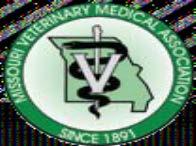
Goal 1:
To understand accurately the views and needs of the members and initiate actions and services to address those needs
Action Steps:
• Utilize Early Career task force to increase and recognize participation and leadership
• Educate members on new and existing programs to support animal welfare
• Enhance awareness of the CE opportunities offered through the MVMA convention, webinars, association programs and district meetings
• Increase the value of the MSFQAP to its participants
• Continue to support members in practice staff topics and practice staff utilization
• Increase the education of members about Scope of Practice issues
• Increase education and awareness of wellness and wellbeing in the profession
• Address personnel supply/demand needs in the veterinary workforce including a comprehensive and diverse pipeline of veterinarians
• Increase awareness of the range of career opportunities throughout the state
Goal 2:
To practice proactive leadership
Action Steps:
• Recruit effective leaders
• Support the VET: Veterinary Enrichment Training
• Nurture the Emerging Leadership group through Power of 10 and other programs
• Review and use the strategic plan
• Mentor and engage future leadership
• Maintain an open and productive dialogue with the MU-CVM leadership
• Continue to develop the relationship with MVTA leadership
Goal 3:
To encourage an engaged, broad-based membership
Action Steps:
• Encourage and invite working Veterinarians and practice staff to participate
• Promote attendance of veterinary students and early career veterinarians at the convention
• Use current and relevant technology to communicate with
• membership and the public
• Reach out to more large animal regulatory and nonregulatory veterinarians
• Enhance and engage within the MOVVC
• Identify the needs of various types of members and create membership value to meet those needs
• Assist district VMAs as possible to facilitate their viability and relevancy
• Engage with District VMAs for partnering on leadership recruitment and membership participation
Goal 4:
To facilitate a member-driven policy and advocacy to the public and the legislature
Action Steps:
• Increase accessibility of information and legislative issues
• Inform districts and general membership about issues and educate on important topics including One Health
• To actively encourage and support veterinarians to run for public office
• Increase member contact with legislators
• Work with members, industry partners and allied groups to have a unified voice
• Increasing participation at Veterinarian Day at Capitol
• Enhance client awareness on emergency preparedness
• Promoting the veterinarian as the primary care provider in the animal healthcare system
Goal 5: Ensure resources to fulfill Mission of MVMA
Action Steps:
• Review budget items, programs, available resources
• Allocate resources to most valuable programs
• Maintain reserve fund from percentage of membership fees
Revised 208
MVMA Strategic Plan
RevisedApril 2022
I
15
T E M 5
Animal Archives Pet Memorial
Turnkey pet memorial program with interactive web presence for your clients for only $20
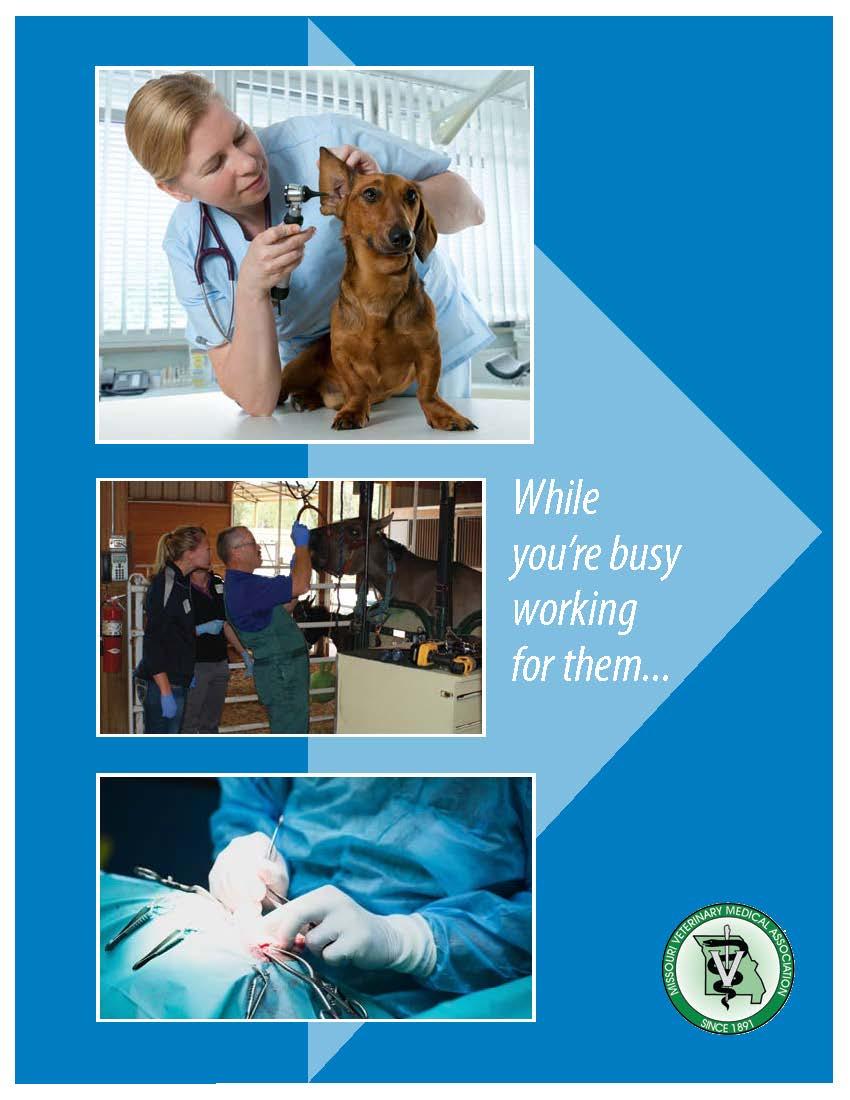
Convention Registration
Your membership saves you up to $145 compared to non-member registration to our MVMA Annual Convention and its extensive continuing education program. If you are a new, first-time member, you receive free registration to next year's convention. If you are an Academy Member, or a recent graduate, you qualify for registration discounts to this great meeting. Choose 24 hours of CE from over 60 hours offered over six different tracks.
Credit Card Processing
Competitive rates and free or discounted equipment at https://payroc.com/
1/10/23, 9:41 AM Member Benefits and Programs - Missouri Veterinary Medical Association https://www.movma.org/page/19 1/4
CVA
Certified Veterinary Assistant Program
Discount Rate for Fetch
Save 15% on your registration for the Kansas City Fetch Conference https://www.fetchdvm360.com/
Executive Report E-Newsletter
Receive updates on breaking news, medical alerts, upcoming events and other timely information every Missouri veterinarian should know with the Executive Report E Newsletter.
Free Classified Advertising
Take advantage of free classified ads in the MVMA Quarterly each year for MVMA members. These classifieds are also posted on the website between publication dates of the Quarterly and posted on our social media accounts.
National Employment Advertising
The Veterinary Career Network provides nationwide Classified Advertising for our members at a great low rate for employers and free for job seekers. Have access to hundreds of jobs and resumes. Go to http://careers.movma.org/ for more information.
Legislative and Governmental Representation
MVMA represents your interests at the state capitol and to governmental agencies. As a member you have the opportunity, if you wish, to make a difference by becoming educated on the issues, and impacting your legislators through emails, telephone calls, letters or personal visits. MVMA provides you the tools to Take Legislative Action and creates the opportunity for you to use them for the betterment of veterinary medicine, and animal and human health in the State of Missouri. You can also get involved with Veterinary Day at the Capitol which takes place every spring.
Local Veterinary Medical Association Meeting Notices
Receive notices of local Veterinary Medical Association meetings and continuing education opportunities in your area.
Missouri Volunteer Veterinary Corps
1/10/23, 9:41 AM Member Benefits and Programs - Missouri Veterinary Medical Association https://www.movma.org/page/19 2/4
For those so inclined, the MVMA Volunteer Veterinary Corps offers members an opportunity to get "plugged in" to disaster rescue and response efforts, and foreign animal disease outbreak response activities in Missouri. It also equips members to take advantage of national paid veterinary response efforts when those situations arise.
MSFQAP
Missouri Stocker Feeder Quality Assurance Program. Add value to your client's cattle by certifying certain health protocols have been followed with highly recognized ear tags. A new Veterinarian certification is online now and you can also submit your forms to us on our website too!
MVMA Academy
Document 40 hours of CE to qualify for an MVMA Academy plaque for your clinic wall. Earn a discount to Fetch.
MVMA Educational Seminars & Workshops
Deep discounts on registration fees for MVMA's educational seminars throughout the year, including the MVMA Summer Equine Program, the Fall Equine Dental Wetlab, and Volunteer Veterinary Corps trainings.
MVMA Quarterly
Receive MVMA's outstanding Quarterly Magazine to get a bird's eye perspective of your profession in Missouri.
MVMA Webinars
Members can access 100+ hours of webinar programming and CE. Unique to Missouri specific veterinary topics and issues, webinars that will not be found elsewhere.
Personal Dashboard in Website
Take control of your information on file. Update your personal and contact information, your clinic information. View and/or pay your pending invoices and payments received. Log in at www.movma.org.
Practice Staff Honor Roll
Recognize a staff member for their dedicated work
Rabies Vaccination & Titer Program
Check out this rabies program that helps you and your practice staff stay up to date on your rabies vaccinations and titers.
1/10/23, 9:41 AM Member Benefits and Programs - Missouri Veterinary Medical Association https://www.movma.org/page/19 3/4
Telephone & Email Support
Your MVMA staff will personally answer your calls and emails. No answering machine. You will talk to a staff member live during office hours. We're here to serve our MVMA members. If we don't know the answer to your question, or if we do not know where you can find the answer, we will find out. Call 573-636-8612 or email us at mvma@movma.org
Veterinary Honor Roll
To honor a veterinarian in your life
Support our Partners by taking advantage of their special programs for MVMA Members:
Find Contact Information for these companies here
1/10/23, 9:41 AM Member Benefits and Programs - Missouri Veterinary Medical Association https://www.movma.org/page/19 4/4
18
I T
6 19
E M
Welcome to the Website of the Missouri Veterinary MedicalAssociation
The first step to using the site is to log in, even if you are not a member of the MVMA. This allows you to access as much information as possible.
If you are a member, you will find the site gives you a lot of information at your fingertips and allows you a great deal of functionality.
Once you log in, you can visit your profile, such as the sample below:
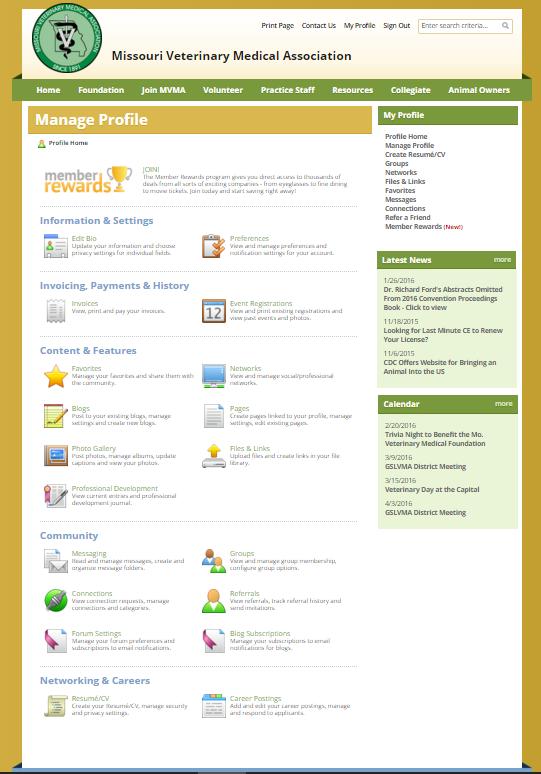
20
On this page you will find you can change your personal information, such as telephone, address and email. You can also go to your organization information (your clinic for instance) and update information there:
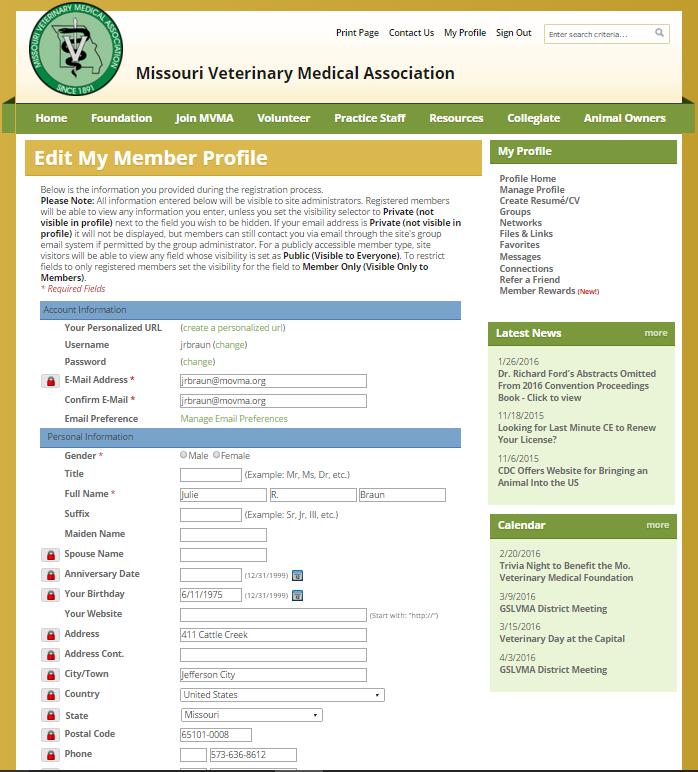
21
You can also see upcoming events, view information about them, and register for them:
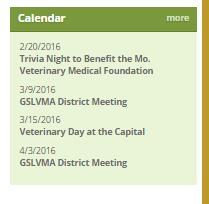
and you can review your individual invoices outstanding and payments you've made:

22
You will also be able to view the boards, committees and other groups that you are part of.
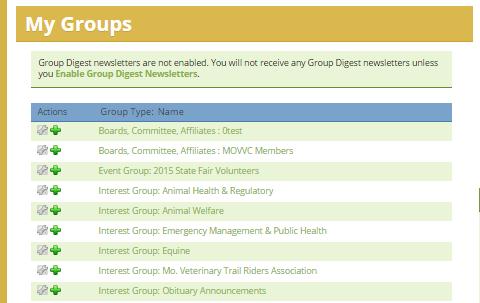
Back on the home page, in the center of the page, you will find the handful of most recent alerts, news, and promotions. As these items age, they are moved to the Archive page, which can be found under the Resources tab.
Along the top, you can visit the Foundation page. You can also visit the Volunteer section, which will take you to the minutes and activities of these various groups.
You can also visit our Partners for Progress by clicking on their logos or the Contact links at bottom of the page.
Along the middle, you will find our popular pet memorial program, called the Animal Archives of Missouri.
You can also pay your dues online, find or recommend dog breeders, get assistance for setting up district meetings, and more. If you have questions on these or other aspects of the website, just ask at: mvma@movma.org .
23
24
I T
25
E M 7
Policy Manual
Missouri Veterinary Medical Association
Missouri Veterinary Medical Foundation
Missouri Veterinary Medical Association Academy
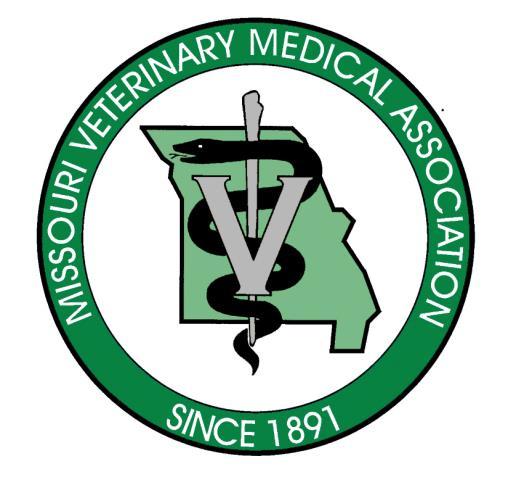
Missouri Stocker/Feeder Quality Assurance Program
Missouri Veterinary Medical Association, LLC
2022 - FINAL
1
2 AWARDS........................................................................................................................... 7 Lifetime.................................................................................................................. 7 Hertzog Leadership Award.................................................................................. 7 William A. Wolff Volunteerism Award.............................................................. 8 Veterinarian of the Year ...................................................................................... 8 President’s Award................................................................................................. 9 Legislative Leadership Award............................................................................. 9 MVMA Academy Honorary Award.................................................................... 9 Retiring President’s Award ................................................................................. 9 MVMA Academy Retiring President Award..................................................... 9 Retiring Board Member Awards......................................................................... 9 Ortu Stella Award................................................................................................. 9 Richard D. Antweiler Servant Leadership Award Criteria............................ 10 BOARD ELECTION PROCEDURE............................................................................ 10 BOARD MEETING........................................................................................................ 11 Packets ................................................................................................................. 11 Filing Packets/Minutes....................................................................................... 11 Consent Agenda .................................................................................................. 11 BOARD OFFICERS/BOARD OF GOVERNORS...................................................... 11 The Board of Governors are Responsible For:................................................ 11 Duties of Officers................................................................................................. 12 President ......................................................................................................... 12 President-Elect................................................................................................ 12 Vice President................................................................................................. 12 Secretary-Treasurer....................................................................................... 13 Board Chairperson ........................................................................................ 13
3 Duties of the Executive Board............................................................................ 14 District Delegates ................................................................................................ 14 Temporary Alternate Delegates......................................................................... 14 Board Ex-Officio Members................................................................................ 15 AVMA Leadership Conference Attendees ....................................................... 15 COMMITTEES............................................................................................................... 15 AVMA Council and Committee Nominations.................................................. 15 MVMA Standing Committees ........................................................................... 16 Membership Committee..................................................................................... 16 Task Force - Policy.............................................................................................. 16 COMPUTER MAINTENANCE AND COMPUTER FILE STORAGE AND DESTRUCTION POLICY............................................................................................. 17 CONFLICT OF INTEREST AND OTHER POLICIES ............................................ 17 Conflict of Interest Policy................................................................................... 17 Fiduciary Statement............................................................................................ 18 Whistleblower Policy.......................................................................................... 18 CONVENTION............................................................................................................... 19 FUTURE DATES FOR MVMA CONVENTION ....................................................... 20 CONSTITUTION AND BYLAWS AMENDMENT PROCESS................................ 20 DEATH OF MEMBERS................................................................................................ 21 Death notice protocol.......................................................................................... 21 DIRECTORY.................................................................................................................. 21 Distribution.......................................................................................................... 21 DISTRICT MAILINGS ................................................................................................. 21
4 DISTRICT COMMUNICATION................................................................................. 21 GSLVMA Communication ................................................................................ 21 DUES................................................................................................................................ 22 Increases............................................................................................................... 22 Statements............................................................................................................ 22 ENDORSED PROGRAMS............................................................................................ 22 Partnership for Preventative Pet Healthcare................................................... 22 FINANCIAL PROCEDURES....................................................................................... 22 Expense Reimbursement.................................................................................... 22 Communicating with MVMA Secretary/Treasurer ................................... 23 Staff ................................................................................................................. 23 Officers and Representatives ........................................................................ 23 Board Members................................................................................................... 23 MVMA Investment Policy Statement ............................................................... 23 Accounting Capitalization Policy...................................................................... 24 MVMA Reserve Maintenance ........................................................................... 25 Fees Charged to Related Entities....................................................................... 25 Employee Logoed Apparel and Christmas Gift............................................... 26 CALENDARING ................................................................................................ 27 FORUMS......................................................................................................................... 28 Memorial Forum................................................................................................. 28 HEARTLAND VETERINARY LEADERSHIP CONFERENCE............................. 28 LEGISLATIVE............................................................................................................... 28 Standards for Proactive Legislative Activity.................................................... 28 Levels of MVMA Support for Legislation or Issues........................................ 28 MAILING LIST ACCESS............................................................................................. 29
5 MVMA ACADEMY ....................................................................................................... 29 C.E. Approval process........................................................................................ 29 C.E. Approval Request Form........................................................................ 30 Certificate of Approval.................................................................................. 30 Certificate of Completion.............................................................................. 30 Following the Event ....................................................................................... 31 MEMBERSHIP AND CATEGORIES ......................................................................... 31 Active............................................................................................................... 32 Active New Graduates ................................................................................... 32 Active Faculty................................................................................................. 32 Practice Member............................................................................................ 32 Retired............................................................................................................. 32 Intern/Resident DVM .................................................................................... 33 Lifetime and Lifetime-Retired...................................................................... 33 Associate (Industry, Professional, or Partner for Progress)...................... 33 Non-Resident .................................................................................................. 33 Armed Forces ................................................................................................. 33 Collegiate......................................................................................................... 33 Honorary......................................................................................................... 33 Partner ............................................................................................................ 34 Membership Applications.................................................................................. 34 Form................................................................................................................ 34 Fees.................................................................................................................. 34 Procedure........................................................................................................ 34 Collegiate Member Applications....................................................................... 34 Non-Member and other Types of Member Categories ................................... 34 Pay It Forward Fund.......................................................................................... 35 MEMBERSHIP COMMUNICATION......................................................................... 35 Process for Responding to Clinic Break-Ins..................................................... 35 Membership Information Update ..................................................................... 35 MVMA Class Liaisons........................................................................................ 35 MSFQAP.......................................................................................................................... 36 Promotion............................................................................................................ 36 Producer Manual................................................................................................ 36 Veterinarian Certification.................................................................................. 36
6 Producer Certification........................................................................................ 36 Financial Notes............................................................................................... 37 MVMF.............................................................................................................................. 37 Animal Archives Web Vote................................................................................ 37 Search & Rescue Dog Care Program................................................................ 37 OBJECTIVES OF THE MVMA................................................................................... 38 PERSONNEL.................................................................................................................. 38 General................................................................................................................. 38 Purchasing and Policy Procedures.................................................................... 39 Job Descriptions.................................................................................................. 39 Executive Director.......................................................................................... 40 Member Relations and Event Manager....................................................... 41 Director of Print Communications............................................................... 42 Bookkeeper..................................................................................................... 42 District Coordinator....................................................................................... 43 Executive Assistant ........................................................................................ 43 Member Data Specialist................................................................................. 44 Digital Communication & Program Coordinator ...................................... 44 Museum Archivist.......................................................................................... 45 STRATEGIC PLANNING............................................................................................. 45
AWARDS
Lifetime
These are the requirements for the title of Lifetime member. To distinguish whether a member is eligible for this prestigious award, you can run a query in the database. To do this, you will need to determine the year the doctor graduated, his date of birth, and verify his membership in the MVMA has been at least 10 years (example: to be eligible for 2002 lifetime membership the doctor will have had to graduate in the year 1962, born in 1937, and been a member of the MVMA since 1992). They need to be at least 65 and graduated a full 40 years or more on January 1 of the membership year to qualify for the Lifetime membership that year. Once you have all the information into the database, you can run a query. The information the query gives you will be a list of all the eligible doctors for this type of membership.
Section 5. Lifetime (From the Constitution & Bylaws)
(A) Any Active or Retired member of the MVMA who has been a member of the veterinary profession for at least forty (40) years, an MVMA member for at least ten (10) years, and is sixty-five (65) years of age or more is eligible for Lifetime membership. Lifetime members shall have all privileges of Active members. Lifetime members shall be dues exempt.
(B) Any Non-Resident member of the MVMA who has been a member of the veterinary profession for at least forty (40) years, an MVMA member for at least ten (10) years, and is sixty-five (65) years of age or more is eligible for Lifetime membership. Non-Resident Lifetime members shall have all privileges of Active members except for voting rights. Non-Resident Lifetime members shall be dues exempt.
MVMA Bylaws
Hertzog Leadership Award
(Officially Robert E. Hertzog Veterinary Leadership Award)
The criteria is as follows:
For outstanding vision, leadership, and personal sacrifice for the betterment of the veterinary profession in Missouri, the nation, and the world.
First presented January 2007.
Chosen by vote of the Executive Board The MVMA Executive Board will consider recipients for the Robert E. Hertzog Veterinary Leadership Award at least every three years.
Board Action, September 2007
7
William A. Wolff Volunteerism Award
The criteria is as follows:
For outstanding commitment and effort to further the ideal of volunteer veterinary service to society on the local, state, national or international levels, especially as it relates to service to animals and their owners in a time of crisis. First presented January 2011.
Chosen by vote of the Executive Board upon the recommendation of the MVMA Emergency Management and Public Health Committee. The MVMA Executive Board will present this award to no more than one recipient per year at the annual convention. The award is not necessarily awarded every year but recognizes outstanding efforts appropriately if they occur.
- Board action September 2010
Veterinarian of the Year
The criteria is as follows:
The Missouri Veterinary Medical Association’s Veterinarian of the Year award is the premiere recognition bestowed by the association. The award winner is determined annually by MVMA Board members, who represent the nearly 1,700 veterinary members of MVMA in Missouri. The recipient of this highest honor is chosen based on their impeccable reputation as a skilled and knowledgeable veterinarian, their dedication and service to their patients and clients, their service as an integral participant in their community, their engagement and leadership in organized veterinary medicine, their mentorship to our future veterinarians, the admiration and respect held for them among their peers, and the positive impact they have had on the lives they have touched.
Applications are submitted by Districts, or MVMA Board Members, to the MVMA office after their spring district meetings. Nominee must have held appropriate MVMA membership during their career. Current officers are not eligible to receive this award while in office. Delegates and Alternate Delegates are eligible. Copies of applications are then to be forwarded to Executive Board Delegates. Over the summer, the delegate confers with leaders and members in their district about which applicant would make the best Veterinarian of the Year. At the Fall Executive Board Meeting, the agenda will include a vote on the Veterinarian of the Year. The vote is a secret ballot, which takes place at the Fall MVMA board meeting. Each board member chooses a first choice and a second choice, neither of which is from their district. First choice votes are worth 3 points second choice votes are worth 2 points. The point totals are tallied, and the winner’s name is kept secret until the convention.
8
President’s Award
The President notifies the Executive Director of one or more individuals he or she would like to receive this award. A plaque is prepared and awarded at the Annual Convention Awards Banquet.
Legislative Leadership Award
Recognition for legislative leadership consistent with the MVMA mission; the protection of animal health and welfare; the relief of animal suffering; the conservation of animal resources; and the advancement of public health.
MVMA Academy Honorary Award
The Academy President notifies the Executive Director of any individuals that he or she would like to receive this award. A plaque is prepared and awarded at the MVMA Annual Convention.
Retiring President’s Award
An award is presented to the outgoing president at the annual convention business meeting or awards banquet.
MVMA Academy Retiring President Award
An award is presented to the outgoing Academy president at the MVMA Annual Convention.
Retiring Board Member Awards
Retiring board members are awarded plaques of appreciation at the annual convention business meeting or awards banquet.
Ortu Stella Award
The Latin name of this prestigious award, a tribute to the foundation of our profession, means Rising Star. The young veterinarian deserving of the Ortu Stella Award is an emerging leader, a rising star. As such, the recipient must in some way shine brightly, aid comrades in navigating the veterinary profession, assist in illuminating the path for those around them, and/or demonstrate that they habitually strive to rise to the occasion.
Eligibility is limited to a Doctor of Veterinary Medicine who:
1) Is in good standing
2) Is currently a member of the MVMA
3) Is not more than ten years post receipt of veterinary medical degree
9
4) Has not previously received the Ortu Stella Award.
The recipient of this annual award will be nominated by veterinary colleagues. Nominations are mandated from the Chair of the Recent Grad and Collegiate Task Force and the Power of 10 group. Nominations are accepted from any MVMA member by the MVMA office before August 15th. All nominees will be presented to the voting members of the MVMA Board, and a winner determined by an anonymous majority vote. The award will be presented to the recipient at the MVMA’s Reception and Award Ceremony during Convention.
Richard D. Antweiler Servant Leadership Award Criteria
(Wording to come)
BOARD ELECTION PROCEDURE
The Nominating Committee is comprised of the Board of Governors with the Board Chair as the Nominating Committee Chair, through a process determined by the Chair. Nominees for the positions of Secretary/Treasurer, Vice President, and President-Elect are approved by the Board of Governors, then solicited.
The Board Chairman will enlist the Board of Governors to help in identifying candidates. The proposed slate of candidates developed should be approved the Board of Governors prior to May 1
A Nominations Committee shall be formed annually consisting of one member from each district association. The Board Chairperson shall chair the Committee. The Committee shall nominate at least two (2) members for the office of Vice President and at least one (1) each for the offices of President-Elect and Secretary-Treasurer. These nominations shall be published on the MVMA website and/or in the MVMA Quarterly newsletter by July 1. Additional nominations for an office may be made by a written petition signed by twenty-five (25) voting members submitted on or before August 1. All nominees must meet the necessary qualifications for office.
MVMA Bylaws.
The obligations of the positions are to be outlined for the prospective nominees, and those nominees should agree to fulfill the obligations as part of their acceptance of the nomination. Two candidates must be offered for the position of Vice President.
To be eligible for office, candidates for President-Elect, Vice President, and Secretary-Treasurer must have been active members in good standing of the MVMA for at least three (3) years total prior to standing for election, live or work in the state of Missouri, and agree to serve if elected.
MVMA Bylaws
The nominees provide biographies and a statement of motive for their candidacy. These are published in the MVMA Newsletter and included with the mail ballot.
10
By September 1, a mail ballot listing the nominees with their biographical information and a specially marked envelope shall be sent to each voting member of the MVMA. Ballot shall be returned in the specially marked envelopes furnished by the MVMA and only one ballot shall be in the envelope. If there is more than one ballot in an envelope, then all ballots in that envelope shall be declared null and void. Ballots must be returned to the MVMA office postmarked no later than October 1 and tallied by an impartial party as approved by the Nominations Committee Chairperson. Candidates who receive a majority of the votes cast shall be elected. In the event of a tie vote for any office, final results shall be determined by an additional ballot vote of members present at the MVMA annual general membership meeting.
MVMA Bylaws
BOARD MEETING
The Executive Board shall meet at least three (3) times per year – one being during the MVMA annual convention. It shall also meet as deemed necessary and called by the Board Chairperson or by any three (3) members of the Executive Board. At least seven (7) days advance notice shall be given to members of the Executive Board. Business may be conducted by mail, electronic mail, conference call, or web meeting when necessary.
MVMA Bylaws Packets
Packets with background material and agenda are prepared prior to the meeting and sent to Board Members and Alternate Board Members about one week prior to the meeting. Packets are sent via electronic means to reduce paper use.
Filing Packets/Minutes
A complete Board Packet, and a set of the Board Minutes are retained in the file for the permanent record. An additional copy of the minutes is added to a set of binders for easy access in the MVMA Office.
Consent Agenda
A Consent Agenda will be used at board meetings.
BOARD OFFICERS/BOARD OF GOVERNORS
(Board Action 2012)
The Five Board Officers comprise the Board of Governors. The President Chairs the Board of Governors. The Board of Governors are Responsible For:
a. have general supervision of the business for the MVMA between regular and special meetings of the Executive Board;
b act as the MVMA Budget Committee;
c. serve as members of the Long Range Planning Committee;
d. be empowered to act for and exercise the duties and authority of the Executive Board in an emergency situation only when contact with each member of the Executive Board is not possible;
e. oversee the operation of the MVMA office and action of the Executive Director;
f. conduct other business as necessary for normal operations of the MVMA;
g. keep the Executive Board fully informed.
MVMA Bylaws
11
Officers shall serve through the MVMA annual convention general membership meeting subsequent to the one at which they were elected. The President-Elect succeeds automatically to the office of the President. The President succeeds automatically to the office of Board Chairperson.
MVMA Bylaws
Duties of Officers President
The President shall be the chief elected executive officer of the MVMA and is responsible to:
(1) preside at MVMA general membership meetings;
(2) serve as a member of the Executive Board;
(3) Serve as Chairperson of the Board of Governors;
(4) appoint and charge all MVMA committees unless otherwise provided in the bylaws;
(5) be an ex-officio member of all committees;
(6) report to the Executive Board on matters pertaining to the goals and accomplishments of the MVMA;
(7) serve as a member of the MVMA Budget Committee;
(8) install newly-elected officers at the conclusion of term of office in the absence of an AVMA official;
(9) succeed automatically to the office of Board Chairperson;
(10) keep the Executive Director fully informed.
President-Elect
The President-Elect is responsible to:
MVMA Bylaws
(1) perform duties of the President in the absence of the President;
(2) serve as a member of the Executive Board and Board of Governors;
(3) serve as Chairperson of the Convention Program Committee and shall appoint that Committee;
(4) serve as a member of the Budget Committee;
(5) submit a list of tentative committee appointments for the coming year to the Executive Board at the fall meeting;
(6) perform such other duties as may be prescribed by the President or Executive Board;
(7) succeed automatically to the office of President;
(8) keep the Executive Director fully informed.
Vice President
The Vice President is responsible to:
MVMA Bylaws
(1) perform the duties of the President and President-Elect in their absence;
(2) serve as a member of the Executive Board, Board of Governors and Budget Committee;
(3) serve as Co-Chairperson of the Membership Committee;
(4) perform other duties as requested by the President and Executive Board
(5) serve as Vice Chairperson of the Convention Program Committee
(6) keep the Executive Director fully informed.
MVMA Bylaws
12
Secretary-Treasurer
The Secretary-Treasurer is responsible to:
(1) serve as recording secretary at meetings of the Executive Board, Board of Governors, Budget Committee, and MVMA general membership meetings;
(2) retain and secure all documents of the MVMA for a period of not less than five (5) years;
(3) serve as a member of the Executive Board, Board of Governors, and Budget Committee;
(4) be custodian of all funds of the MVMA, responsible for the executive director’s proper accounting of all receipts and disbursements and maintenance of a file of all vouchers and invoices for a period of not less than seven (7) years;
(5) review the financial reports of the MVMA monthly and make detailed reports of the financial status of the MVMA at every regular session of the Executive Board and regular meetings of the MVMA membership;
(6) be authorized to sign checks;
(7) turn over all funds, property and records to successor;
(8) keep the Executive Director fully informed.
Board Chairperson
The Board Chairperson is responsible to:
(1) Serve as Chairperson of the Executive Board;
(2) Serve as Chairperson of the Nominations Committee;
(3) Serve as Chairperson of the Budget Committee;
(4) Serve as a member of the Board of Governors;
--MVMA Bylaws
(5) Serve as Chairperson of the Long Range Planning Committee;
(6) Perform other duties as requested by the President;
(7) Keep the Executive Director fully informed.
MVMA Bylaws
The board chair; upon retiring, serves on the nominating committee for 1 year
Newly elected officers should attend the Thursday Board Meeting prior to their taking office on Saturday at the Convention in January. Attendance at all board meetings should be a priority.
13
BOARD DUTIES
Duties of the Executive Board
The Executive Board shall be the administrative body of the MVMA and shall, in principle, be the voice of the members. The Executive Board is responsible to:
a Have complete charge of the MVMA’s property and financial affairs;
b. Be charged with carrying out the provisions of these bylaws;
c. Elect and advise the MVMA Delegate and Alternate Delegate to the American Veterinary Medical Association;
d Approve honorary memberships;
e Act on matters referred by committees;
f Act on amendments proposed for the Constitution and Bylaws;
g. Employ and outline duties of Executive Director as kept in the policy manual;
h. Employ and outline duties of legislative consultant;
i Request written reports from representatives of allied professional groups to report on activities concerning the profession prior to the regular meetings of the Executive Board and, if deemed necessary, request specific representatives to appear before the Executive Board to provide counsel at meetings;
j Approve site and time of the annual convention, business meetings, and any special convention or meetings;
k Take any emergency action that must be taken by the MVMA when it is not possible to obtain action of the membership
l. Fill vacancies in office occurring between elections by appointment;
m Perform other functions as may be requested by the Board Chairperson;
MVMA Bylaws
District Delegates
The District Delegates shall:
a. represent the views of their constituents and be voting members of the Executive Board;
b. inform the district membership of actions pending and actions taken by the Executive Board;
c. contact a temporary Delegate to serve in the absence of the Delegate from any regular or called meeting of the Executive Board.
MVMA Bylaws
Board Delegates not able to attend a board meeting are responsible for ensuring their district is represented on the Executive Board by a temporary Delegate.
Temporary Alternate Delegates
The temporary Alternate Delegates shall:
a. be considered voting members of the Executive Board and report back to District Delegate
-MVMA Bylaws
14
Board Ex-Officio Members
Ex-Officio Members to the Executive Board include the Dean of the MU College of Veterinary Medicine, the AVMA Delegate, the AVMA Alternate Delegate, the AVMA District Executive Board Member, and the MU-CVM Student Representative/Alternate Student Representative, MVMA Legislative Committee Chair, and MVTA Legislative Chair.
The Delegate and Alternate Delegate to the AVMA shall:
a. serve as ex-officio members of the Executive Board and inform the Board on matters to be considered by the AVMA House of Delegates;
b. seek executive Board direction and represent the MVMA accordingly at all meetings of the AVMA House of Delegates;
c. report on actions of the AVMA House of Delegates at the next meeting of the Executive Board or sooner if necessary;
d. inform the Executive Board sufficiently prior to deadlines on AVMA nominations and other matters to allow appropriate action;
e. perform other duties as requested by the Executive Board
MVMA Bylaws
AVMA Leadership Conference Attendees
Attendees to the Leadership Conference are determined by the Board of Governors with the advice of the Executive Board.
COMMITTEES
AVMA Council and Committee Nominations
The point person in the MVMA who would identify and recruit Missouri nominees for these positions will be the Board Chair, since he or she is the also the Chair of the Nominating Committee. District presidents, who comprise the Nominating Committee, will be helpful to the Chair in identifying potential nominees in their districts as well as the AVMA Delegates.
15
MVMA Standing Committees
The Standing Committees of the MVMA are:
Advisory Committee to the College of Veterinary Medicine
Animal Welfare Committee
Convention Program Committee
Emergency Management & Public Health Committee
Equine Committee
Legislative Committee
Membership Committee
Missouri Stocker Feeder Quality Assurance Program Committee
Scope of Practice Committee
Veterinary Technician and Practice Staff Committee
(B) The Executive Board may establish or dissolve a standing committee by a two-thirds (2/3) vote.
(C) All actions of standing committees are subject to approval of the MVMA Executive Board.
The President appoints members of the Membership Committee. Geographic and practice type diversity, as well as talent and interest, should all be factors in assembling the membership committee. Officers are ex-officio members of the Membership Committee. The Vice President and Board Chair are Co-chairs of the Membership Committee
Task Force - Policy
A task force, unlike a committee, should have a definite timeframe to complete specific objectives. A task force should develop a specific set of objectives to be completed. If the objectives are completed, the President should generally declare the task force disbanded. If the objectives have not been clearly completed within a three-year period, the task force will be either re-appointed, or disbanded by the Board.
Board Action, January 2005
16
MVMA Bylaws Membership Committee
COMPUTER MAINTENANCE AND COMPUTER FILE STORAGE AND DESTRUCTION POLICY
The following are ongoing procedures effective August 15, 2005
• Continuously perform data backups and test those backups regularly for data integrity and reliability.
• Analyze plans on an ongoing basis to ensure alignment with current business objectives and requirements.
• Secure critical applications and data by patching known vulnerabilities with the latest fixes or software updates.
• Perform continuous computer vulnerability assessments.
• Monthly, all computers will be defragmented, and will have temporary internet files and histories deleted, anti-spyware and anti-adware run, and all deleted files cleaned from the system.
Board of Governors, August 2005
CONFLICT OF INTEREST AND OTHER POLICIES
Conflict of Interest Policy
This Conflict of Interest Policy of Missouri Veterinary Medical Association: (1) defines conflict of interest; (2) identifies classes of individuals within the Organization covered by this policy; (3) facilitates disclosure of information that may help identify conflicts of interest; and (4) specifies procedures to be followed in managing conflicts of interest.
1. Definition of conflicts of interest. A conflict of interest arises when a person in a position of authority over the Organization may benefit financially from a decision he or she could make in that capacity, including indirect benefits such as to family members or businesses with which the person is closely associated. This policy is focused upon material financial interest of, or benefit to, such persons.
2. Individuals covered Persons covered by this policy are the Organization’s officers, directors, and chief employed executive.
3. Facilitation of disclosure. Persons covered by this policy will annually disclose or update to the chairman of the Board of Directors on a form provided by the Organization their interest that could give rise to conflicts of interest, such as a list of family members, substantial business or investment holdings, and other transactions or affiliations with businesses and other organizations or those of family members.
4. Procedures to manage conflicts. For each interest disclosed to the Chairman of the Board of Directors, the Chairman will determine whether to: (a) take no action; (b) assure full disclosure to the Board of Directors and other individuals covered by this policy: (c) ask the person to recuse from participation in related discussions or decisions within the
17
Organization; or (d) ask the person to resign from his or her position in the Organization or, if the person refuses to resign, become subject to possible removal. The Organization’s chief employed executive will monitor proposed or ongoing transactions for conflicts of interest and disclose them to the chairman of the Board of Directors in order to deal with potential or actual conflicts, whether discovered before or after the transaction has occurred.
Fiduciary Statement
An Executive Board Fiduciary statement will be distributed annually to the full Executive Board for review and signature.
Whistleblower Policy
This Whistleblower Policy of Missouri Veterinary Medical Association: (1) encourages staff and volunteers to come forward with credible information on illegal practices or serious violations of adopted policies of the Organization; (2) specifies that the Organization will protect the person from retaliation; and (3) identifies where such information can be reported.
1. Encouragement of reporting. The Organization encourages complaints, reports or inquiries about illegal practices or serious violations of the Organization’s policies, including illegal or improper conduct by the Organization itself, by its leadership, or by others on its behalf. Appropriate subjects to raise under this policy would include financial improprieties, accounting or audit matters, ethical violations, or other similar illegal or improper practices or policies. Other subjects on which the Organization has existing complaint mechanisms should be addressed under those mechanisms, such as raising matters of alleged discrimination or harassment via the Organization’s human resources channels, unless those channels are themselves implicated in the wrongdoing. This policy is not intended to provide a means of appeal from outcomes in those other mechanisms.
2. Protection from retaliation. The Organization prohibits retaliation by or on behalf of the Organization against staff or volunteers for making good faith complaints, reports, or inquiries under this policy or for participating in a review or investigation under this policy. This protection extends to those whose allegations are made in good faith but prove to be mistaken. The Organization reserves the right to discipline persons who make bad faith, knowingly false, or vexatious complaints, reports, or inquiries or who otherwise abuse this policy
3. Where to report. Complaints, reports, or inquiries may be made under this policy on a confidential or anonymous basis. They should describe in detail the specific facts demonstration the bases for the complaints, reports or inquiries. They should be directed to the Organization’s chief employed executive or Chairman of the Board of Directors; if both of those
18
persons are implicated in the complaint, report or inquiry, it should be directed to the President. The Organization will conduct a prompt, discreet, and objective review or investigation. Staff or volunteers must recognize that the Organization may be unable to fully evaluate a vague or general complaint, report or inquiry that is made anonymously.
CONVENTION
All Convention arrangements are handled through the MVMA office in consultation with the President-Elect who is also the Chair of the Convention Planning Committee.
Hotel Arrangements for Executive Board are coordinated by the MVMA staff. Date of arrival, date of departure, and guest information is needed.
Convention should start one week after the VMX ends and should end one week before Super Bowl Sunday.
Speakers are determined by and initially contacted by the Convention Planning Committee members. Coordination is then handled through the MVMA office and the meeting planner. Speakers sign an agreement outlining the obligations of the MVMA and the speaker.
Speakers get meal tickets if they would otherwise have their expenses reimbursed.
Any exception to normal policy is subject to agreement of the Executive Director and the President-Elect.
Those taking advantage of the first-time member special rate must never have been an MVMA member before.
Other than special rates set for Students, Lifetime members and Retired members, there is no special rate for DVMs or potential exhibitors, even if the individual will not be attending continuing education sessions.
For Board Chair’s reception, host officer is allowed $500 through any combination of charging food & beverage to the MVMA master account, and/or expense reimbursement based on receipts.
Convention Proceedings
Printed proceedings available for cost if registration is returned by the stated deadline.
A limited number of printed proceedings will be available for sale at cost on site at the convention while supplies last.
19
About two weeks prior to convention, the proceedings or parts thereof can be downloaded or printed out at no charge from the Omni Press Convention website to take as notes for the convention.
Future Dates for MVMA Convention
In general, it starts the fourth Friday in January unless that date competes with the North American VMX Conference.
2023 January 26 - January 29 – Columbia
These dates should be published on the MVMA website
All past presidents are invited to a lunch gathering on Friday at the annual convention. The program is open and informal, though it is traditional for the attendees to pass around the MVMA gavel and to pose for a group photograph. Issues and challenges facing the MVMA may be posed for roundtable discussion by this group of individuals who represent a great deal of experience and wisdom. The most immediate past Board Chair (past-past president) is the liaison for the group to the various committees and task forces where it is anticipated the group’s ideas and suggestions would be most useful.
CONSTITUTION AND BYLAWS AMENDMENT PROCESS
Constitution and Bylaw amendments should be presented to the membership grouped by issue, with reference to the various pages of the Constitution & Bylaws where the wording is changed to address that issue. The goal should be clarity in presentation and ease of voting for or against various issues within the set of changes proposed.
When an amendment to the MVMA Constitution and Bylaws is generated by either the Executive Board, or by petition, the Board of Governors will work with the Executive Director to arrange a transparent discussion among the membership; and disseminate a fair summary of various points of view, as determined by the Board of Governors. Suggested tools to accomplish this process are: a special public forum at the convention, publishing pro and con views in the MVMA Quarterly, and including with the ballot a summary of these pro and con views.
20
DEATH OF MEMBERS
Death notice protocol
1. Send card to family.
2. Email board members of death.
3. Publish notice in newsletter
4. Alert the AVMA if the deceased was an AVMA member.
5. Initiate a $25.00 donation to the foundation in their name.
6. Foundation will memorialize the individual
7. Publish on Memorial Forum
DIRECTORY Distribution
Board Action 2001
Board Action January 2012
Each member of the MVMA has access to an online directory.
DISTRICT MAILINGS
All funds spent on mailings at the request of a specific district must be reimbursed by that district.
DISTRICT COMMUNICATION
GSLVMA Communication
The GSLVMA and the MVMA can take various actions that would help both organizations fulfill their needs in the areas of membership, scope of practice issues, guardianship issues, rabies issues, and unfair competition from the non-profit sector
There is strength in numbers and the two organizations can learn and gain much in resources and effectiveness through regular communication. It was suggested a meeting between officers be repeated once or twice each year.
The MVMA recognizes the importance of district membership and will promote membership to the GSLVMA. The GSLVMA likewise indicated it will promote MVMA membership to its members. The GSLVMA indicated that it recognizes that its officers are role models, and that it is important for them to be members of the Missouri VMA.
- MVMA/GSLVMA Meeting, October 13, 2004
21
DUES Increases
The Board of Governors should always ensure association expenses are necessary and related to the MVMA’s mission and strategic plan.
If expenses justifiably rise, and other sources of income are satisfactorily exploited, the Board of Governors should consider proposing a dues increase at least every two years, of at least an average of 1.5% per year.
This policy is intended to accurately reflect the association’s ongoing cost of doing business, to avoid crisis management, and to avoid the need for very large dues increases.
(Board Action April 2013)
Statements
Dues Statements are issued May 15th, payable by July 1st with a 60-day grace period.
ENDORSED PROGRAMS
Endorsed Programs are researched and recommended or not, by the Executive Director and the Membership Committee Chair. These recommendations stand for approval at an Executive Board Meeting.
Partnership for Preventative Pet Healthcare
As an associate member of this Partnership, MVMA promotes the tools and objectives of the program within the confines of its budget to do so.
Board action Jan 2013
FINANCIAL PROCEDURES
Expense Reimbursement
Expenses for guests of staff, board members and officers are not underwritten by the MVMA.
Signatures
All disbursements of MVMA funds shall be made by checks or electronic transfer drawn on the MVMA account in accordance with board policy.
Checks over $7000 require two signatures
MVMA Bylaws
Board Action April, 2018
22
Communicating with MVMA Secretary/Treasurer
The Executive Director signs those checks $7000.00 or less. Any check that is over $7000.00 requires two signatures. The Treasurer also receives a report of all checks written during the previous period.
Staff
Staff is reimbursed for travel expenses, including mileage at the current IRS rate.
Officers and Representatives
President’s MVMA-related travel and office expenses, during the year of his/her presidency, can be reimbursed up to $5,000
Complimentary hotel room nights granted by the hotel are used for officers during the convention, speakers, staff, and other individuals for whom expenses are part of MVMA’s cost of holding the convention.
The President, President-Elect, and Vice President usually attend the AVMA Leadership Conference. Cost is shared between the AVMA and the MVMA from the Representative Expense line item, except for the President who has a separate expense line. Expenses for the MVMA’s Delegate to the AVMA to travel to AVMA meetings throughout the year are reimbursed up to $2,000 Delegates maximize the use of AVMA funds first.
Board Members
Board Members are not reimbursed for expenses
MVMA Investment Policy Statement Purpose
The purpose of this Investment Policy shall be to establish objectives, to define the types of investments acceptable, to delegate the authority to invest on behalf of the MVMA, and to define other related parameters.
Investment Objectives
The investment objectives of the Missouri Veterinary Medical Association are to maximize return on investment while minimizing risk. The Executive Director, with the advice and consent of the MVMA Treasurer, shall maintain and implement prudent investment strategies.
Statement of Liquidity
23
As it is necessary for purposes designated by the Executive Director and Treasurer, the MVMA shall maintain liquid deposit balances at least sufficient to satisfy the short and intermediate obligations of the association.
Appropriate Investments
Acceptable investments include certificates of deposit, interest-bearing checking accounts and money market accounts, direct obligations of the U.S. government and any bonds or other obligations guaranteed as to the payment of principal and interest by the U.S. government.
Investment Authority and Process
All investments shall be made by the Executive Director in consultation with, and only with the consent of, the MVMA Treasurer. The Treasurer will include investment activities in the regular financial report to the MVMA Board.
Investment Plan Review
A review of the MVMA investment policy will take place on an annual basis.
Board Action, January 18, 2001
Accounting Capitalization Policy
The MVMA will NOT capitalize amounts meeting the following criteria:
1. Amounts that are paid to acquire, produce, or improve tangible property that does not exceed $500. These amounts are to be charged to the appropriate expense accounts. This threshold is to be applied at a per item, per invoice level and must include any allocable expenses such as taxes, transportation, installation charges, etc., that are included on the invoice, OR
2. Amounts that are paid to acquire, produce or improve tangible property which has an economic useful life of 12 months or less. These amounts are to be charged to the appropriate expense accounts.
This policy does not apply to costs related to the acquisition of, or improvements to, land, inventory, certain ratable, temporary, and/or emergency spare parts.
This policy is effective January 1, 2015 and is to be adhered to for all income tax reporting purposes AND all non-tax financial reporting purposes. This policy is intended to comply with the Internal Revenue Code and the tangible property regulations promulgated thereunder.
24
MVMA Reserve Maintenance
Determine each February what dues were collected since the previous May. Take the dues collected x 3 percent. Divide this amount by 12. Establish a monthly transfer in this amount to a Reserve Account from main account starting the next budget year (May 1).
In May each year, the Executive Director, the Secretary/Treasurer, and the President will confer to determine if additional funds can be transferred to the Reserve Account. Throughout the year, funds may be withdrawn from the reserve account if necessary, with approval of the Secretary/Treasurer and President.
Continue this practice until the reserve account equals or exceeds 40% of annual dues collected, which is the reserve target established in the MVMA bylaws.
By Law’s Board Action 2018
Fees Charged to Related Entities
The MVMA provides services to various related entities and programs. Significant among these are the Missouri Veterinary Medical Foundation, the Missouri Veterinary Medical Association Academy, the Missouri Stocker Feeder Quality Assurance Program, and the MVMA, LLC It is the policy and intention of the MVMA to propose adjustment to the fees charged to these entities and programs, and others as they may be initiated, based on changes in costs incurred by the MVMA due to salaries and other related administrative costs associated with providing these services. These adjustments should be proposed as needed but considered at least annually.
25
Employee Logoed Apparel and Christmas Gift
1st year employees: Over 20 hours per week:
$100.00 logoed clothing allowance.
$50.00 Christmas gift certificate
2nd year employees: Over 20 hours per week:
$75.00 logoed clothing allowance.
$75.00 Christmas gift certificate.
3rd year employees: Over 20 hours per week:
$50.00 logoed clothing allowance.
$100.00 Christmas gift certificate.
All employees under 20 hours per week:
$50.00 logoed clothing allowance
$25.00 Christmas gift certificate
26
CALENDARING
Each December, and updated throughout the year, staff will investigate and record important dates & distribute to leadership & publish as appropriate in calendars. These dates will also be part of board packets at each Board Meeting:
2022
Heartland Veterinary Conference
AVMA Leadership Conference
MVMA Board Meeting
Foundation Board Meeting
130th MVMA Convention
Veterinary Day at the Capitol
January 7, 2022
January 6-9, 2022
January 27, 2022
January 27, 2022
January 27-30, 2022 - Columbia
March 1, 2022
Student Accreditation Day- VIRTUAL March 4, 2022
Board of Governors/Budget Com
MVMA Leadership Conference
Spring MVMA Board Meeting
Gentle Doctor Benefit
Foundation Board Meeting
MU-CVM Open House
MU-CVM Graduation
Summer Equine Meeting
March 20, 2022 (Officers Only)
April 2, 2022
April 3, 2022
April 9, 2022
April 23, 2022
May 7, 2022 – 9am-3pm
May 13, 2022 – 2pm in Jesse Auditorium
TBD 2022
MOVVC Short Course TBD 2022
AVMA Convention
State Fair
July 29-August 2, 2022 – Philadelphia
August 11-21, 2022
August 15-17, 2022 (tentative) – Camp Mihaska, Bourbon, MO
VET Student Dinner
Fetch dvm360 Conference
Foundation Board Meeting
MU CVM Alumni Weekend
MVMA Fall Board Meeting
Equine Dentistry Weekend
White Coat Ceremony
Policy Forum
Advisory Council Meeting
August 26-28, 2022
September 10, 2022
September 16-17, 2022
September 18, 2022 – location TBD
September 30-Oct 2, 2022
October 16, 2022
October 23, 2022 - (tentatively 4th Sunday in October)
October 27, 2022 - (tentatively Thurs. after Policy Forum)
Fall Student Leadership Meeting TBD December 2022
2023
Heartland Veterinary Conference
AVMA Leadership Conference
January 5, 2023
January 5-8, 2023 – Sheraton Grand Chicago
AVMA Legislative Symposium TBD
131st MVMA Convention
AVMA Convention
2024
AVMA Convention
January 26-29, 2023 – location TBD
July 14-18, 2023 - Denver
June 21-25, 2024 – Austin
27
FORUMS
Memorial Forum
A memorial forum on the MVMA website will carry announcements of the passing of MVMA members and their families.
Board Action January 2012
HEARTLAND VETERINARY LEADERSHIP CONFERENCE
It is recommended to send as many officers to the Heartland Conference as budget allows, to promote attendance at the conference to the MVMA membership, and to facilitate attendance of recent graduates as practical.
Heartland Program Committee & Planning
1. Thirteen states are divided into two groups. Group A: Illinois, Indiana, Iowa, Kentucky, Michigan, Minnesota. Group B: Missouri, Nebraska, North Dakota, Ohio, South Dakota, West Virginia, Wisconsin.
2. Each year either group A or B provides one representative each coordinated by state execs. “Point person” to be state exec rotated alpha so exec would take that role only once every thirteen years.
3. For 2023 meeting, group B with Missouri taking the lead.
LEGISLATIVE Standards for Proactive Legislative Activity
The level of proactive efforts the MVMA expends on legislative issues will be relative to the support and engagement of the MVMA Leadership on those issues. The standards for proactive support or opposition are:
a) Majority approval by the Legislative Committee and unanimous approval by the Executive Board.
b) Support is contingent on each district providing a point of contact for members (usually the district’s delegate to the board) and a point of contact for the public and media on the issue.
c) District contacts are able and willing to receive member, public, and media calls on the issue referred to them from the MVMA office.
Board Action September 2014
Levels of MVMA Support for Legislation or Issues
1. Active pursuit of passage: Staff, volunteers and lobbyists actively engaged from beginning to end for passage.
2. Support: We acknowledge support, but we are not actively engaged in advocating for the issue.
28
3. Neutral: The MVMA does not have a stated opinion on the issue.
4. Oppose: We acknowledge that we oppose the legislation or issue, but we are not actively engaged in defeating it.
5. Active pursuit of defeat: Staff, volunteers and lobbyists actively engaged in pursuing defeat of the legislation or issue.
Board Action, January 2015
MAILING LIST ACCESS
Sell MVMA members the MVMA mailing list for one time use only, and other entities when the Executive Director and MVMA President feel the Association membership as a whole will benefit, at a fee to be set by the Executive Board. Currently $100 MVMA Board Action, Sept. 16, 2000
The MVMA does not release its electronic files of member data with other organizations, entities, or companies. Any exception of this policy must be approved by the Board of Governors and must be on the grounds that it serves the general welfare of the membership.
Board Action, April 2011
MVMA does not share with or release electronic files of membership data
MVMA ACADEMY
The criteria for being an MVMA Academy Member is current MVMA membership and a minimum of 40 hours of continuing education. MVMA Academy Lifetime membership can be obtained by being a current Academy Member who has retired from practice with a minimum of 10 hours of CE.
C.E. Approval process
The MVMA Academy “approves” continuing education that is judged to meet the MVMA Academy standards. This “MVMA Academy Approved” C.E. is recognized by the Missouri Veterinary Medical (licensing) Board as provided for in the Missouri Veterinary Medical Board Rules under 4 CSR 270-4.042 (8)(H).
The MVMA Academy Guidelines consist of the following:
Scientific presentation by a veterinarian………………1-hour credit awarded for 50 minutes of presentation
Scientific presentation with no more than 50% commercial content given by a veterinarian………….1-hour credit awarded for 50 minutes of presentation
Scientific presentation with more than 50% commercial content or presentation by a non-veterinarian……………………………………… 1/2-hour credit awarded for 50 mins of presentation
Wet labs presentation by a veterinarian…… 1-hour credit awarded for 50 minutes of presentation
Practice management presentations by appropriate professional…………………… ….1-hour credit awarded for 50 minutes of presentation
29
The above categories are guidelines; final determination of credit hours is at the discretion of the MVMA Academy President.
The MVMA Academy President, working through the MVMA office and in conjunction, as needed, with the MVMA Academy Board, decides, after reviewing all submitted materials, as to the validity of the proposed workshop, seminar, or prepared material as worthwhile and therefore “approved” continuing education for veterinary medicine.
All communication should be conducted through the MVMA office unless otherwise specifically requested by MVMA Academy.
C.E. Approval Request Form
District VMA’s interested in receiving MVMA Academy approval for a continuing education presentation must submit the MVMA Academy C.E. Approval Request Form to the MVMA office prior to presentation of the program. Programs will not be approved if C.E. Application Request Form is submitted after presentation of the program.
Certificate of Approval
Upon approval, the MVMA Academy will send an official written approval of the course to the sponsoring district, which should then be retained in its files. The Certificate of Approval is not for distribution to the individual attendees for their proof of completion.
Certificate of Completion
Upon approval, the MVMA Academy will send an official Certificate of Completion to the sponsoring district. The attendees take the certificate with them for their files, so they may produce it should the licensing board audit them.
The hours approved for each course are recorded at the MVMA office to be the final authority on how many hours were approved for that course on those specific dates.
The MVMA Academy will provide a Certificate of Completion only for meetings where the MVMA Academy, the MVMA or an MVMA District VMA is the sponsoring organization. Other sponsoring organizations can borrow the MVMA Academy format to create their own certificates of completion.
30
Following the Event
It is necessary that the MVMA Academy surveys be distributed at the meeting, that they be completed by the attendees, collected at the end of the meeting, and sent to the MVMA office at 2500 Country Club Drive, Jefferson City, MO 65109. The MVMA Academy will use the survey results to compare with the information provided on the C.E. Approval Request Form. The extent to which the completed surveys are returned following the event may be used as a factor in future C.E. approvals. An attendance log is also sent to the MVMA office
The event will be registered at the MVMA office as being on the official list of continuing education programs approved by the MVMA Academy.
Events must be re-submitted for approval each year for C.E. being offered January through December, but the MVMA Academy must receive the date and location of each occurrence of the program.
Available information is:
• The Missouri Veterinary Medical (licensing) Board Rules on the Continuing Education Requirement
• The MVMA Academy C.E. Approval Request Form
• A generic Certificate of Approval
• A generic Certificate of Completion*
• MVMA Academy Brochure explaining the principles and goals of the MVMA Academy
*The MVMA provides a Certificate of Completion for meetings where the MVMA Academy, the MVMA or a MVMA district VMA is the sponsoring organization.
MEMBERSHIP and CATEGORIES
Membership in the MVMA shall consist of veterinarians, except for Associate, Collegiate, Partner, and Honorary membership as specified by these Bylaws, who:
(a) are graduates of colleges or schools of veterinary medicine, recognized by the American Veterinary Medical Association;
(b) have applied and been accepted by the Executive Board and MVMA membership; and
(c) agree to comply with the MVMA Bylaws and AVMA Principles of Veterinary Medical Ethics
Occasionally people who want to join the MVMA ask for a prorated price. A prorated membership fee can be offered to FIRST TIME joining members and cannot be less than 50% of the original fee.
- Board Decision Fall 2016
31
Active
Active members are those veterinarians who qualify for membership as specified in these Bylaws. They shall enjoy all the privileges of the MVMA. Each Active member shall have one vote. Active members shall pay dues in the amount established by the general membership.
Applications for new Active membership must be accompanied by annual dues or agreement to pay full dues plus applicable charges via electronic means as outlined in the corporate policy manual approved by the Executive Board. Active members, in good standing, of other state veterinary medical associations who pursue a livelihood in veterinary medicine in Missouri and meet all other requirements for membership, may be granted “Active” membership by transfer. These veterinarians shall be exempt from payment of dues to the MVMA during the year of transfer provided dues of like membership have been paid in full to the veterinary medical association of another state.
Active New Graduates
Collegiate members, who reside in Missouri, automatically become Active New Graduates (Active 1) upon graduation from veterinary college. They shall have the same qualifications and privileges described under “Active.” Active New Graduates shall be exempt from dues the first year after graduation. The second full year after graduation, Active New Graduates (active 2) residing in Missouri shall pay one-third (1/3) of Active member’s dues; the third full year after graduation, Active New Graduates (Active 3) residing in Missouri shall pay two-thirds (2/3) of Active member dues. Full Active member dues shall be paid the fourth full year after graduation
When entering college students who have just graduated, mark their preferred address in the home field and enter their other address in the notes field indicating if it is the permanent or temporary address. Upon graduation check notes for permanent address and change the home address according to notes.
-- As amended April 2011 to coordinate with payout of dues in May
Active Faculty
An MU-CVM faculty DVM will receive MVMA membership when a faculty list is received from the dean's office. Active-Faculty membership is paid by an invoice in January for the upcoming membership year. Active-Faculty have privileges of "Active" MVMA members except they shall have no vote and shall not hold elective office. The opportunity to have full "Active" membership with the privileges of "Active" membership can be obtained by the member paying the difference between the two membership types.
Board Decision, December 2020
Practice Member
Corporate Membership is managed by separate agreements with corporations for membership for all their employed veterinarians statewide who meet eligibility requirements Over-rides the member type for which the veterinarian may otherwise qualify for. Paid with a single transaction annually Practice members enjoy all privileges of Active members.
Retired
Any Active members who have retired completely from the practice of veterinary medicine and who are not eligible for Lifetime membership may make application for Retired membership by notification to the Executive Board. Retired members shall have all privileges of Active members. Retired members shall pay dues in the amount established by the general membership.
32
Intern/Resident DVM
A DVM who is in a Resident or Intern program connected with an AVMA accredited college.
Lifetime and Lifetime-Retired
(A) Any Active or Retired member of the MVMA who has been a member of the veterinary profession for at least forty (40) years, an MVMA member for at least ten (10) years and is sixty-five (65) years of age or more is eligible for Lifetime membership. Lifetime members shall have all privileges of Active members. Lifetime members shall be dues exempt.
(B) Any Non-Resident member of the MVMA who has been a member of the veterinary profession for at least forty (40) years, an MVMA member for at least ten (10) years and is sixty-five (65) years of age or more is eligible for Lifetime membership. NonResident Lifetime members shall have all privileges of Active members except for voting rights. Non-Resident Lifetime members shall be dues exempt.
Associate
(Industry, Professional, or Partner for Progress)
Associate members shall be bona fide representatives of companies, institutions, or organizations serving veterinarians or having a definite interest in veterinary medicine. Associate membership shall be limited to persons not holding veterinary degrees or those holding veterinary degrees from colleges not recognized by the AVMA. Associate members in good standing shall have all privileges of the MVMA except they shall have no vote and shall not hold elective office. Associate members shall pay the same dues as established for Active members.
Non-Resident
Active members who discontinue making their livelihood in Missouri may become NonResident members by notifying the Executive Board. Veterinarians making their livelihood from veterinary medicine in other states may be proposed as Non-Resident members upon making application. Non-Resident members in good standing shall have all privileges of the MVMA except they shall have no vote and shall not hold elective office. Non-Resident members shall pay dues in the amount established by the general membership.
Non-Resident members who begin making their livelihood in veterinary medicine in Missouri shall automatically become Active members. If annual dues have not been paid at the time of location change, Non-Resident members shall pay Active member dues for the current year.
Armed Forces
In the event of compulsory, temporary military service, the Executive Board will develop a special category for complimentary membership for those falling under this category.
Collegiate
Collegiate membership shall be limited to full time students in the curriculum of veterinary medicine Collegiate members shall be dues exempt. Collegiate members shall have all privileges of membership except they shall have no vote and shall not hold elective office. Collegiate members shall be automatically transferred to Active New Graduates, Active, or Non-Resident membership as the situation dictates at the time of program completion.
Honorary
Honorary members shall be individuals who have rendered distinguished or meritorious service to the veterinary medical profession. Honorary membership may be proposed by any Active member and granted by a majority of votes cast by the Executive Board
33
Honorary members shall have all privileges of Active membership except they shall have no vote and shall not hold elective office. Honorary members shall be dues exempt.
Partner
Partner members shall be a non–veterinarian spouse, family member, or widow/widower of a veterinarian or veterinary student who is sponsored by an Active, Retired, or Lifetime member in good standing. Partner members in good standing shall have all the privileges of Active membership except they shall have no vote and shall not hold elective office. Partner members shall pay dues in the amount established by the general membership.
MVMA Bylaws
Membership Applications
Form
Application for the various membership categories (except Retired, Lifetime, and Honorary membership) shall be submitted on a form furnished by the MVMA.
Fees
Initial membership applications must be accompanied by the appropriate membership dues as applicable for each membership category.
A pro-rated membership fee can be offered to first time joining members and cannot be less than 50% of the original fee.
Board Action 2016
Procedure
Applications will be reviewed by the Vice-President, or his or her designee, who will have the sole discretion to approve or disapprove the application based on the requirements for membership outlined in these bylaws. The Vice-President or designee may refer new member applications to the Executive Board for approval if questions of eligibility cannot be determined.
MVMA Bylaws
Collegiate Member Applications
Address requested for newsletter should be put as their home address and their other address should be put under their notes
Non-Member and other Types of Member Categories
Complimentary – Generally a non-DVM, guest, or officer’s spouse.
CVA – Includes all levels: CVA I, II, III, and PPE, as well as CVA Non-member which is a CVA who has not renewed.
Legislator and Former Legislator
Non-member - Prospect for association membership
Non-member Previous Member
Individuals for which we have membership history data but no current address.
Non-member Friend - Donors to the Foundation who are not veterinarians
Non-member Speaker
Non-member Widows of Veterinarians
34
Producer and Inactive Producer
MSFQAP participant. Moved to Inactive Producer once we no longer know what DVM they are associated with per producer update.
Practice Member – This is for corporate membership.
Practice Staff - Clinic employees, not a Registered Veterinary Technician
Other Orgs and Legitimate Non-member Those we mail to or retain information on but are not member prospects. Includes former partner members.
Veterinary Technician & Veterinary Technician Students
Registered Veterinary Technicians and Students
Widows of Veterinarians
Pay It Forward Fund
The board established a fund that would assist a limited number of members in need and cover their annual membership dues for one year. A grant of membership will be limited and temporary and will have the understanding of repayment of the dues when possible so that the fund may continue to assist another struggling member at a future time.
Board Action January 2012
MEMBERSHIP COMMUNICATION
Process for Responding to Clinic Break-Ins
When the MVMA office is notified that a clinic has been burglarized, a fax will be sent to all member clinics in the district. It will note that “a clinic in your area” has been burglarized. It will be publicized in the newsletter that clinics that have been broken into should contact the MVMA office, which will attempt to notify all member clinics in the district.
Membership Information Update
Each member will be prompted to update their personal information on file annually.
MVMA Class Liaisons
The MVMA works with the University and the MVMA student board member to appoint a liaison for each class with the MVMA. Two-way communication should transpire throughout the year to exchange information and feedback.
35
Promotion
Promotion for the MSFQAP is done through mailings to the Producer, Sale Barns, Feedlots as well as print in the MVMA Quarterly and on the MVMA web site at www.movma.org.
Producer Manual
National BQA Producer training manuals are available online at movma.org/page/MSFQAP
Veterinarian Certification
The veterinarian obtains his certification for the program by attending a workshop held during the Missouri Veterinary Medical Association’s annual meeting or by taking the online BQA and MSFQAP webinars. CE is obtained with this training. BQA certification is required.
The veterinarian will need to pass an exam and shortly after, be provided with a certificate and certification identification number from the MVMA. (V for veterinarian, two digits representing the year, and four digits that will be your certification number only, example: V04 - 1234).
Producer Certification
An MSFQAP certified veterinarian may hold a short informal or formal session with one or more of their clients, either in the office, other facility, or chute side. If the classroom setting is chosen, we do have a PowerPoint presentation available. We also provide the producer the National Beef Quality Assurance Program, an online guide to help them participate in the program. BQA Certification can be done online by going to movma.org/page/MSFQAP
For all client/producers being certified through a session you will need the date in which you give the instruction, their name, farm name (optional) and address. This information will go on the MSFQAP ‘Producer Certification Request’ form and sent to the MVMA office.
MVMA will then prepare a separate certification certificate for each client/producer you have certified. The certificate will be mailed to the veterinarian to give to the client/producer. (P for producer, two digits representing the year, and a four-digit number that is exclusive to the producer, example: P04 – 1111).
We will keep all information on certified veterinarians and certified producers in the computer database.
36
MSFQAP
Financial Notes
All MSFQAP expenses and income are run through the MSFQAP checking account Exceptions are handled on a reimbursement basis to or from MVMA. The MSFQAP pays a $385.00 monthly administration fee to the MVMA. MVMA Board/MSFQAP Committee, January 2001
This fee is adjusted annually, if necessary, in consultation with the MSFQAP committee chair.
MVMF
Administrative Fee to MVMA
The MVMA and the MVMF have entered into an agreement where the MVMA provides staff services for the MVMF in exchange for a fee of $1,200 per month.
Board Action October, 2001 and January, 2002
This fee is adjusted annually if necessary, by mutual consent.
Fee as of January 1, 2022 is $1,1714.00
See policy on Fees Charged to Related Entities
Animal Archives Web Vote
The nominees for the Animal Archive of the Year are chosen among submissions received from April 1 through March 31. The nominees are chosen in April each year from the previous 12 months of submissions. The nominees go through a 12 month balloting period. The announcement of the Animal Archive of the Year occurs during National Pet Week in May. The year in the title refers to the year the election results are finalized, not the year the animal passed, nor the year the archive was submitted.
Search & Rescue Dog Care Program
Foundation Chair works with Emergency Management and Public Health Committee Chair to recruit SRDC Program Committee. The EMPH Committee chair serves as chair of the SRDC Program Committee. Foundation Chair or his/her designee serves as Vice Chair of the Program Committee. The rest of the committee membership is comprised of individuals involved in emergency response programs throughout the state, and other individuals as desired by the Foundation Chair.
The Program Committee solicits requests for financial assistance in providing medical care for search & rescue dogs. These requests are received throughout the year. Awards are determined by the Program Committee with approval by the Foundation Chair. Checks are issued through the Foundation’s bank account. Funds can only be disbursed in relation to the amount budgeted for this program annually by the
37
Foundation Board, plus any donations received through other sources for the program.
Activity in the program is reported to the Foundation Board at each meeting.
MVMA’s Accounting firm, Evers & Co., has indicated this program would be in line with government rules and statutes. It is well within the mission of the organization. Members of the Program Committee would necessarily be ineligible to receive the funds while serving on the committee.
It would be advisable for the checks to be paid to the medical provider if possible.
OBJECTIVES OF THE MVMA
The objectives of the MVMA shall be to:
(1) improve and advance the science and profession of veterinary medicine;
(2) promote high educational and ethical standards within the veterinary medical profession;
(3) foster and develop the professional interests and welfare of its members;
(4) protect the health and welfare of all animals;
(5) protect the public against diseases transmissible from animal to man;
(6) educate the public concerning animal health;
(7) cooperate with all organizations, agencies and persons whose objectives are consistent with those of the MVMA.
MVMA Constitution
PERSONNEL General
The normal business day shall be directed by the hours of operation of the MVMA, Monday through Friday, 8:00 a.m. to 5:00 p.m. Hourly staff reporting week runs Saturday through Friday. After office hours, or when the staff is unavailable, an answering system is connected, and voicemails will be returned during office hours.
The MVMA staff consists of an Executive Director, Member Relations and Event Manager, Director of Print Communications, Bookkeeper, Executive Assistant, District Coordinator, Member Data Specialist, Digital Communication & Program Coordinator, and Museum Archivist.
Each employee will receive a yearly performance appraisal. This performance appraisal will be used to determine an employee’s potential to earn a payroll increase.
Each employee is expected to work the hours that the Director has set for that position.
38
Payroll checks are issued through Columbia EDP of Columbia, Mo.
Compensation, benefits, and review of the Executive Director are reflected in the current Executive Director Employment Contract.
Executive Director Contract Procedure
The original revised contract is in effect beginning January 1, 2001. In subsequent years, the Amended Employment Agreement should be copied; the blanks filled in and signed by the parties. This Amended Employment Agreement should be filed with a copy of the original agreement attached with the wording “Exhibit A” typed on the top.
Other full-time employees accrue 8 hours paid vacation 8 hours paid sick leave per month, accrued on an hourly basis, per month. Accrued hours are available to be used after the first month of employment. Employees averaging 20 or more hours per week over the past year are eligible for a SIMPLE IRA employer match up to 3 percent of their current paycheck after they have been employed for 12 months
The following paid holidays are observed by the MVMA office: New Year’s Day, President’s Day, Truman’s Birthday, Memorial Day, Independence Day, Labor Day, Columbus Day, Thanksgiving Day and the Friday after and Christmas Day. At the discretion of the Executive Director, the office may be closed on the Monday following the Annual MVMA Convention.
Purchasing and Policy Procedures
All employees shall not solicit or accept gratuities, favors or anything of monetary value from contractors or potential contractors.
Job Descriptions
Duties of Executive Director
The Executive Director shall be the chief paid executive of the MVMA and responsible for the administration of the MVMA affairs. The Executive Director shall be responsible to the Executive Board. Duties and responsibilities of the Executive Director shall be outlined by the Executive Board in a policy manual which shall be updated each year. An annual performance review of the Executive Director shall be conducted each year by the Board of Governors.
MVMA Bylaws
39
Executive Director
GENERAL DESCRIPTION – The Executive Director of the Missouri Veterinary Medical Association is the chief operating officer of the Association with the general responsibility to manage the affairs of the Association under the Constitution and By-laws of the MVMA. To foster MVMA’s partnerships with related entities, the Executive Director has similar responsibilities for the Missouri Stocker Feeder Quality Assurance Program, the MVMA Academy, the MVMA, LLC, and the Missouri Veterinary Medical Foundation. Direction will be provided by the MVMA Executive Board and the Board of Governors by Board policy, program definition and approved budget. Instruction will be through the President of the Association. Responsibilities and necessary authority may be delegated or shared with appropriate staff, but the accountability of the Executive Director is to the Executive Board.
Duties and Responsibilities
Provides counsel and assistance to the Board in defining and meeting the needs of the membership of the Association and presents recommendations for action by appropriate committees regarding proposed policies, programs and budgets. Reports to the Board on program and budget developments and advises the Board promptly on emergency or unforeseen developments. Provides necessary staff assistance to the Board of Governors and Committee Chairs to implement approved programs of the Association Encourages participation in local, regional, state and national organization, which furthers the programs and objectives of the Association through better understanding and visibility.
Assembles and distributes information useful to the Board for the conduct of its meeting and provides timely circulation of actions by the Board Acts as secretary for meetings of the Executive Board and assures that the Board and its committees conduct business of the Association as required by its by-laws. Initiates and promotes member recruitment and retention programs. Works in partnership with the Board in the total management of the Association.
Develop and maintain public relations activities and programs.
General Management
Creates and maintains good public relations with groups and audiences affecting the operation of the Association and the achievement of its objectives.
Represents the Association and its elected officers as designated by the Board.
40
Participates in and encourages appropriate staff and Board participation in organizational and educational activities which further the Association’s objectives.
Assures that appropriate educational and convention programs are conducted as directed by the Board and are carried out for the benefit of all members of the Association.
Supervises the writing and circulation of MVMA Newsletter and other Board approved publications.
Handles initial contact with clients and veterinarians in matters of dispute. Maintains an effective legislative program in cooperation with the Association’s lobbyist.
Maintains current membership database, keeps the membership informed and provides leadership for effective committee and individual membership involvement in Association’s programs.
Carries out additional responsibilities as the Board may direct.
Staffing and Personnel
Determines staffing needs and qualifications according to program requirements and within approved budgets. Recruits, employs, assigns, promotes, or releases personnel to maximize their utilization and potential. Provides for ongoing supervision and performance evaluation of all employees. Provides for staff development and stimulates a high level of performance.
Recommends to the Board the duties and qualification, compensation and personnel policies needed to attract and retain qualified personnel. Assures horizontal and vertical communications to facilitate staff participation in policy and program recommendation, evaluation and problem solving.
Fiscal Management
Prepares an annual budget reflecting program priorities for approval by the Board and implements sound management practices to assure adequate cost controls and financial management by the Board. Negotiates contracts and agreements for necessary facilities, services, supplies and equipment.
Collects dues, fees, and other funds due the Association and maintains a proper computerized accounting system.
Member Relations and Event Manager
Accountable to the Executive Director
Manage legislative action center.
Update MVMA member information in database, as needed Coordinate Board meeting arrangements, meals & materials
Coordinate other meetings and educational seminars including speakers, meals, arrangements, and itinerary.
41
Organize executive director’s travel arrangements. Overall responsibility for MVMA annual convention.
Organize and correspond with speakers for annual convention.
Organizing of convention packing and setup.
Communicate Leadership Terms (board, committee, district officers)
PFP advertising organization & solicitation
Manage Convention Awards and ordering
District Officer Terms and communications
Plan and coordinate meetings/conference calls, prepare minutes, ensure correct filing and archiving of all minutes & place information on website and disperse to committee members.
Staff the Missouri Volunteer Veterinary Corps
Respond to written, telephone and electronic correspondence from MVMA members, other veterinarians, and the public.
Assists the Executive Director in all areas
Research materials for Executive Director
Other projects as assigned
Director of Print Communications
MVMA Quarterly Layout & Graphics
Convention Registration Book, Program, and Proceedings book
Non-PFP advertising organization and solicitation
Other printed materials (brochure layout and graphic)
Support to other areas
Bookkeeper
Accountable to the Executive Director
Coordinates and records all incoming and outgoing funds
Manages all bank accounts for: MVMA, MVMF, MVMPAC, MVMA LLC, MSFQAP, including all transactions necessary between these entities. Works with outside accounting firm for annual audit and tax preparation.
Assists Executive Director in budget preparation. Answer e-mail correspondence.
Prepare reports for the executive director.
Prepare yearly dues statements and update forms
Maintain postage permit 400 account and postage due account. Enter information pertaining to the annual budget into the computerized accounting system (QuickBooks)
Entering daily deposit for MVMF, MSFQAP
Prepare invoices for individual accounts.
MVMPAC and MSFQAP which include accounts payable/receivable. Process the donation of funds.
Acknowledge all parties and coordinate information to MVMF treasurer. Attend assigned committee meetings.
Update MVMA member information in database, as needed
Assist with answering phones and follow up.
42
District Coordinator
Coordinate the MVMA Academy Continuing Education approval process.
Coordinate, schedule, and manage all district meetings.
Staff program support for all aspects of the Foundation and the Academy
Organizational support to the Executive Director on all sponsorship solicitation.
Answer MVMF correspondence accordingly
Coordinate and set up MVMA/MVMF booth at the annual convention. Assist with special projects and fund-raising activities.
Send out special and promotional mailings.
Ensure the correct filing and archiving of all Foundation meeting minutes.
Assist with preparation for the MVMA annual convention. Assist with answering phones and follow up.
Executive Assistant
General Receptionist duties (answering phone, follow up, faxing, etc.)
Maintain and update website and website assistance
Building maintenance coordinator – schedule all service orders
Opening and directing incoming mail and packages. Keep filing system up to date.
Recording all membership dues and update forms.
Record and file assigned MVMA committee meeting minutes.
Data entry and database report generation.
Organize State Fair Volunteers.
Data entry of MVMA dues
Update, maintain, and order all office supplies
Manages/Setup Convention Registration Website
Process convention registrations and payments
Assist and answer questions for the veterinary museum & group tours.
Assist with preparation for MVMA annual convention
Inventory maintenance of convention supplies
Process new member payments
Create and send new member packets
Coordinate and send monthly Leadership to Do communication
Maintain and generate reports from the Staff Program of Work database
Research materials for Executive Director
Mail all district mailings and invoice for all district meetings
Assist, if needed, entering Animal Archives, and mailing certificates
Schedule, coordinate and present all museum tours
Handle MSFQAP orders, send invoice and manage inventory
Answer & direct MVMA e-mail correspondence
Maintain CVA membership, enter data, and send out CVA certificates
Handle all rabies titer test kits and calls regarding results
Enter in database and file all returned MSFQAP Forms
Maintain Office Group Calendar
Other projects as assigned.
43
Member Data Specialist
Membership mass US mail mailings – dues, reminder letters, etc.
Membership Programs (Banfield, MU Faculty, Lifetime Membership)
Manages MSFQAP program/items as needed.
Handle MSFQAP orders, send invoice and manage inventory
Answer & direct MVMA e-mail correspondence
Import new vet facilities to website
Data entry and database report generation.
Create yearly dues statements and update forms.
Data entry of MVMA dues.
Research materials for Executive Director
Keep inventory on Animal Archives cards, certificates, and brochures. Enter all Animal Archives and mail certificates
Process convention registrations and payments
Assist and answer questions for the veterinary museum & group tours.
Assist with preparation for MVMA annual convention
Create and send new member packets
General Receptionist duties (answering phone and follow up, faxing, copying, etc.)
Maintain and update website and website assistance
Keep inventory on Animal Archives cards, certificates, and brochures. Enter all Animal Archives and mail certificates
Opening and directing incoming mail and packages.
Keep filing system up to date.
Schedule, coordinate and present all museum tours
Other projects as assigned.
Digital Communication & Program Coordinator
Manage, maintain & coordinate all website & social media. Produce all electronic newsletters.
Initiating, coordinating, hosting, recording, and facilitating recorded webinars. Upload to, manage, promote, and monetize the online continuing education program.
Create and maintain on-hold messages.
Develop and distribute news releases for various events and topics
Staff support for Academy (meeting, organize hours/plaques, officers, minutes)
Keep track of Academy hours for members.
Staff support for Foundation (meetings, Silent Auction, Tickets, Booth, minutes, honor roll)
Manage classified ads, upload to website, then prepare/handoff for the Quarterly magazine.
Convention tasks as assigned.
Staff support to other areas.
Classified advertising
44
Museum Archivist
Dedicated focus on museum programs including artifact accession and deaccession, artifact tracking, and museum displays Assistance to the volunteer Museum Director.
STRATEGIC PLANNING
It is desirable to conduct strategic planning every two years, with a board review of the strategic plan in the off years. Details of the planning format will be determined by the president of the year the review is to take place.
Board Action January 2013
45
I
71
T E M 8
EMPLOYEE MANUAL
Missouri Veterinary Medical Association
Missouri Veterinary Medical Foundation
Missouri Academy of Veterinary Practice
Missouri Stocker/Feeder Quality Assurance Program
Missouri Veterinary Medical Association, LLC
1 Employee Manual – Revised August 2005
72
MVMA-MVMF
2500 Country Club Drive Jefferson City MO 65109
Employee Manual
The policies and procedures in this manual are not intended to be contractual commitments by the Missouri Veterinary Medical Association and Missouri Veterinary Medical Foundation (MVMAMVMF), and employees shall not construe them as such.
The policies and procedures are intended to be guides to management and are merely descriptive of suggested procedures to be followed. MVMA-MVMF reserves the right to revoke, change or supplement guidelines at any time without notice.
No policy is intended as a guarantee of continuity of benefits or rights. No permanent employment or employment for any term is intended or can be implied from any statements in this manual.
2
73
Continuity of Policies - Right to Change or Discontinue
The policies and procedures in this manual are not intended to be contractual commitments by MVMA-MVMF and employees shall not construe them as such. They are intended to be guides to management and merely descriptive of suggested procedures to be followed.
MVMA-MVMF reserves the right to revoke, change, or supplement guidelines at any time without notice. No policy is intended as a guarantee of continuity of benefits or rights. No permanent employment or employment for any term is intended or can be implied by statements in this book.
EMPLOYMENT POLICIES Immigration Law Compliance
MVMA-MVMF is committed to employing only United States citizens and aliens who are authorized to work in the United States and does not unlawfully discriminate on the basis of citizenship or national origin.
In compliance with the Immigration Reform and Control Act of 1986, each new employee, as a condition of employment, must complete the Employment Eligibility Verification Form I-9 and present documentation establishing identity and employment eligibility. Former employees who are rehired must also complete the form if they have not completed an I-9 with MVMA-MVMF within the past three years, or if their previous I-9 is no longer retained or valid.
Employees may raise questions or complaints about immigration law compliance without fear of reprisal.
Equal Opportunity
Equal Opportunity is MVMA-MVMF policy. It is our policy to select the best-qualified person for each position in the organization.
No employee of the company will discriminate against an applicant for employment or a fellow employee because of race, creed, color, religion, sex, national origin, ancestry, age, or other physical or mental disability. No employee of the company will discriminate against any applicant or fellow employee because of the person’s veteran status.
This policy applies to all employment practices and personnel actions including advertising, recruitment, testing, screening, hiring, selection for training, upgrading, transfer, demotion, layoff, termination, rates of pay, and other forms of compensation.
3
74
The Executive Director is responsible for having the new employee fill out all pre-employment forms, benefit applications, and enrollment forms; providing basic information on pay and leave policies, benefits, parking situations, and working hours, on the employee’s first day of work;
Rehire
Applications received from former employees will be processed using the same procedures and standards that govern all direct applications. The Executive Director will review the former employee’s performance records and the circumstances surrounding termination of previous employment with the company. MVMA-MVMF is under no obligation to rehire former employees.
Grievance Procedure
An employee may express a verbal grievance to the Executive Director. If the concern is not resolved to the employee’s satisfaction within one week, the employee may put in writing the details of his or her grievance and submit the grievance to the Executive Director.
The Executive Director will review the written statement. The employee and The Executive Director will discuss the problem. Final resolution of the grievance will be made by the Executive Director and reported to the employee. The grievance and outcome will be reported to the MVMA President.
EMPLOYMENT STATUS & RECORDS
Employment Classifications
There are three classifications of employees:
Regular Full Time - An employee who works a normal 40-hour workweek on a regularly scheduled basis.
Regular Part Time - An employee who works less than a normal workweek, on either a regularly scheduled basis or on an irregular basis.
Temporary - An employee hired for a period not exceeding three months and who is not entitled to regular benefits. An extension of a temporary work classification for an additional three-month period, or less, may be granted, if upon review by management, the assignment is clearly found to be necessary. A temporary employee may be fulltime or part-time. In addition to the use of this classification for secretarial or clerical positions, it applies to students working parttime and those who work during the summer.
All employees are classified as exempt and non-exempt according to these definitions:
4 New Hire
75
Salaried Exempt - Positions of a managerial, administrative, or professional nature or for outside sales, as prescribed by federal and state labor statutes, which are exempt from mandatory overtime payments.
Salaried Non Exempt - Positions of a clerical, technical, or service nature, as defined by statute, which are covered by provisions for overtime payments.
Access to Personnel Files
MVMA-MVMF shall provide an employee the opportunity to view their personnel file within seven working days following receipt of a written request. Access to files shall be allowed only in the presence of the Executive Director during regular office hours. Under no circumstance shall an individual have the right to remove the file from the office.
Background Checks
MVMA-MVMF desires to provide its staff and customers with a reasonably safe and secure environment and to provide reasonable protection for the financial and material assets of the company.
As a condition of employment, applicants offered sensitive positions and current employees transferring into sensitive positions are required to sign release of information forms authorizing MVMAMVMF to make a thorough background check. This information is necessary to determine that the applicant or employee has the required skills or competencies, has a history of safe driving and/or has no relevant criminal history or offenses that may jeopardize the safety or welfare of the company's operations, employees, or customers.
Performance Review and Salary Increases
A decision relating to the employee’s increase in pay will be made by the Executive Director after an evaluation of performance has been conducted. Information about rates of pay and increases in pay, if any, are deemed to be confidential matters between the company and each employee and are not to be discussed among employees.
Performance Improvement
Performance improvement may be suggested whenever management believes that an employee’s performance is less than satisfactory and can be resolved through adequate counseling. Corrective counseling is completely at the discretion of company management. The company desires to protect its investment of time and expense devoted to employee orientation and training whenever that goal is in the company’s best interests. The company expressly reserves the right to discharge “at will.” Even if corrective counseling is implemented, it may be terminated at any step at the discretion of management. Management, in its sole discretion, may warn,
5
76
reassign, suspend, or discharge any employee at will, whichever it chooses and at any time.
The Executive Director, in consultation with the MVMA President, will determine the course of action best suited to the circumstances.
EMPLOYEE BENEFITS
Holidays
MVMA-MVMF provides ten designated paid holidays each year.
New Year’s Day
President’s Day
Truman’s Birthday
Memorial Day
Independence Day
Labor Day
Columbus Day
Thanksgiving Day
Day after Thanksgiving
Christmas
Weekend Holidays
When a recognized holiday falls on a Saturday, it will be observed on the Friday before the holiday. Recognized holidays that fall on a Sunday will be observed on the following Monday.
Workers' Compensation Insurance
MVMA-MVMF insures all employees against accidental injuries occurring on the job, in accordance with the Missouri Workers’ Compensation Law. Coverage begins on date of employment and covers any injury or illness sustained in the course of employment that requires medical, surgical, or hospital treatment. Employees must report all accidents immediately to their supervisor or department manager, and the supervisor/manager must notify the Office of Human Resources within 24 hours. If the supervisor or department manager is not available the employee should notify the Office of Human Resources. No matter how minor an on-the-job injury may appear, it is important that it is reported immediately. This procedure will enable an eligible employee to qualify for coverage, in a timely manner.
Sick or Personal Leave
6
77
Sick leave equivalent to 12 days per year, earned at a rate of 8 hours per month, is granted to all full-time employees.
An employee is to contact the Executive Director when sick or personal leave is needed because of illness. It remains the employee’s responsibility to keep the supervisor/manager informed as to his or her condition and when he or she will return to work. A medical statement from the employee’s doctor may be requested by the company when an employee is absent from work for more than three working days.
Voting
MVMA-MVMF encourages all employees to vote. The Executive Director will approve time off to vote either at the beginning or end of your workday, provided that you give at least one day’s notice.
Jury Duty
MVMA-MVMF will grant employees time off for mandatory jury duty or court appearances as a witness when the employee must serve or is required to appear as a result of a court order or subpoena. A copy of the court order or subpoena must be supplied to the employee’s supervisor/manager when requesting time off. Time off for court appearances as a party to any civil or criminal litigation shall not be compensated, and the employee must arrange for time off without pay or use accrued vacation or personal leave for such appearances.
Bereavement Leave
The company will provide time off for employees to attend the funerals of family members and friends. Your supervisor/manager will approve whatever period of time is necessary and appropriate under the circumstances.
If the conditions warrant and the supervisor/manager agrees, paid leave will be granted for full-time employees, but the amount of paid leave time will not exceed three days at regular straight-time wages. Such leave is in addition to all other paid leave time.
Typically, paid leave is reserved for the death of immediate family members.
The company will pay for time off for full time employees in the event of death of the following immediate family members:
Spouse Grandparent
Father-in-law
Parent Brother Sister
Child or Stepchild Grandchild
Mother-in-law
The employee and supervisor/manager will determine the amount of time the employee will be absent from work.
Employee-Incurred Expenses and Reimbursement
MVMA-MVMF will pay all actual and reasonable business-related expenses incurred by employees in the performance of their job
7
78
responsibilities. The Executive Director must approve all such expenses incurred by an employee.
Expense reports are to be submitted and supported by evidence of proof of purchase, e.g., receipts.
Mileage Reimbursement
Employees of MVMA-MVMF who use their personal vehicle for company purposes will be provided an automobile allowance at the IRS standard rate as of current taxable year. This allowance is intended to compensate the employee for all costs related to the operation of his or her personal vehicle on company business.
Mileage reimbursement will be approved by your supervisor/manager by submitting an expense report detailing the purpose of such travel, date of travel, and mileage traveled. Requests for reimbursement are due monthly
Travel Reimbursement
This policy establishes the general guidelines and procedures to be followed when business travel is required.
Travel-related expenses are to be detailed on the company travel reimbursement form.
Employees, who prefer to use their personal vehicles for their convenience on company business, including trips to the airport, will be reimbursed at the standard company mileage rate, provided that the time and distance involved is reasonable under the circumstances.
All travel-related expenses incurred as a result of business will be reimbursed.
Employees must submit receipts for meals with the reimbursement form. Reasonable tips, when paid by the employee and noted on the receipt, will be reimbursed.
Kitchen Break Room
MVMA-MVMF provides a kitchen–break room for the benefit of its employees. Employees shall be responsible for the general clean up of the area, including the washing of personal dishes and utensils.
All trash should be disposed of in the trash container. The kitchen should look presentable at all times.
Partime employees are paid twice monthly. Full time employees are paid once monthly.
8
PAYROLL Payday
79
Time cards are to be submitted by part-time employeess by the date announced each pay period.
It is our policy to decline all requests for early paychecks or pay advances for personal reasons.
Termination
Terminated employees are entitled to receive all earned pay, including vacation pay.
Employment with the company is normally terminated through one of the following actions:
Resignation - voluntary termination by the employee; Dismissal - involuntary termination for substandard performance or misconduct; or
Layoff - termination due to reduction of the work force or elimination of a position
WORKPLACE GUIDELINES
Record Retention
The following retention may be accomplished via hard copy or electronic file.
9
ACCOUNTING RETENTION PERIODS Checking Account registers 7 years Audit Reports Permanent Bank Deposits & Statements 3 years Expense Reports 7 years Financial Statements Permanent Invoices: Customers & Vendors 7 years Journals Permanent Payroll Records 7 years Petty Cash Records 3 years Tax Returns Permanent Travel Expense Reports 3 years CORPORATE RECORDS RETENTION PERIODS Annual Reports Permanent Charters, Constitutions, By-Laws, Minutes Permanent Contracts, Leases and Agreements Permanent Copyrights & Trademark Registrations Permanent Correspondence – General 3 years Correspondence - Legal & Tax Permanent Deeds, Mortgages & Easements Permanent 80
Emergency Instructions
Follow these rules in an emergency:
Stop work and leave the building immediately when the fire alarm sounds or when you are instructed to do so!
Follow instructions, avoid panic, and cooperate with those responding to the emergency.
Proceed to the designated or nearest exit.
Turn off computers, equipment, fans, etc., and close desk drawers.
Do not delay your exit from the building by looking for belongings or other people.
When leaving the building, go to a clear area well away from the building. Do not obstruct fire hydrants or the responding fire/rescue workers and their equipment.
Do not re-enter the building until instructed to do so by your supervisor or fire/rescue worker.
10 Membership Records Permanent INSURANCE RETENTION PERIODS Insurance Policies 3 years Insurance Records: Claims & Policies Permanent PERSONNEL RETENTION PERIODS Accident Reports, Claims and Statements Permanent Disability & Illness Reports 3 years Employee Application & Promotion Records 3 years Employee Termination Documentation 3 years Employee Time Records 7 years Retirement & Pension Records Permanent W-2's Permanent PURCHASING RETENTION PERIODS Bids & Awards 3 years Contracts 3 years Purchase Orders 3 years Requisitions 3 years Scrap & Salvage Records 7 years RECEIVING & SHIPPING RETENTION PERIODS Postal Records 1 year Shipping Documents 3 years
81
Employee Privacy
MVMA-MVMF recognizes our employees’ rights to privacy. In achieving this goal, the company adopts these basic principles:
1. The collection of employee information will be limited to that which the company needs for business and legal purposes.
The confidentiality of all personal information in our records will be protected.
All in-house employees involved in record keeping will be required to adhere to these policies and practices. Violations of this policy will result in disciplinary action.
Internal access to employee records will be limited to those employees having an authorized, business-related need-toknow. Access may also be given to third parties, including government agencies, pursuant to court order or subpoena.
The company will refuse to release personal information to outside sources without the employee’s written approval, unless legally required to do so.
Employees are permitted to see the personal information maintained about them in the company records. They may correct inaccurate factual information or submit written comments in disagreement with any material contained in their company records.
Workday
The workday begins at 8 a.m. and ends at 5 p.m. with one hour off for lunch Monday through Friday. However, the nature of our business sometimes demands workday or workweek hours different than those set forth above. Variation to the schedule will be made or approved by the Executive Director.
Smoking
No smoking will be allowed in the office area at any time. This policy is for the health and safety of all employees. Smoking will be allowed only outside the building. The smoker will keep the area clean of cigarette butts
Non-Business or Social Visits
From time to time it may become necessary for employees to receive visits from a relative or friend. If this occurs please keep these visits brief and keep them from disrupting the working/professional atmosphere.
Emergency Closings
At times it may be necessary for MVMA-MVMF to declare specific hours or days as an emergency closing due to inclement weather or other emergency conditions.
11
82
Decisions to close the company will be made by the Executive Director.
Telephone Use
Personal calls of short duration, i.e., two to three minutes, may be received and made at your desk or workstation via land line or personal cell phone. Personal long distance calls should be preapproved. Excessive personal phone use may warrant a warning.
Medical Leave of Absence
Upon written application by an employee who has at least 6 months of continuous service with the company, MVMA-MVMF will grant to the employee for an appropriate period of time a leave of absence without pay for illness or pregnancy subject to the requirements set forth below. The company reserves the right to request a certificate or statement from the employee’s physician establishing the employee’s physical need for the leave of absence. An employee returning to work from a leave of absence in the case of illness or pregnancy will present a certificate or statement from the employee’s physician indicating that the employee is able to return to work.
An employee need not apply for an illness or pregnancy leave of absence if the absence will not exceed five working days. However, the employee must notify his or her department manager no later than the day of such absence.
The following requirements will be applicable to employees on all types of leaves of absence:
An employee on any leave of absence shall not return to work prior to the expiration of his or her leave without the prior written consent of the company.
An employee who does not return to work at the end of his or her leave of absence will be considered to have voluntarily resigned from employment with MVMA-MVMF.
If an employee returns to work within eight weeks after the leave of absence begins, the company will return the employee to employee’s previous job, if the job exists and if the employee remains qualified and able to perform the work in such job.
If an employee returns to work more than eight weeks after the leave of absence begins, the company shall not be required to return the employee to any job within the company.
An employee who accepts other employment while on any leave will be deemed to have voluntarily resigned his or her employment with the company.
Any employee insurance program participation for employees on a leave of absence will continue during the leave but will terminate the first day after the day on which the leave of absence ends, but in no event later than eight weeks following the date of commencement of the leave, if the employee has not returned to full time employment by that date.
12
83
Employment Policies
The company is committed to fostering a work environment in which all individuals are treated with respect and dignity. Each individual should be permitted to work in a business-like atmosphere that promotes equal employment opportunities and prohibits discriminatory practices, including harassment. Therefore, the company expects that all relationships among persons in the workplace will be business-like and free of unlawful bias, prejudice, and harassment. It is the company's policy to ensure equal employment opportunity without discrimination or harassment on the basis of race, color, national origin, religion, sex, age, disability, or any other status protected by law.
It is the Company's policy to comply with all applicable wage and hour laws and other statutes regulating the employer-employee relationship and the workplace environment..
No Company employee may interfere with or retaliate against another employee who seeks to invoke his or her rights under the laws governing labor and employee relations. If any employee has questions about the laws or Company policies governing labor and employee relations, he or she should consult the Executive Director.
Substance Abuse
MVMA-MVMF recognizes that individuals, sometimes to an extent that their abilities and senses are impaired, use substances such as alcohol and drugs. Our position regarding substance abuse is the same whether alcohol, marijuana, illegal drugs, prescription drugs, or controlled substances are involved.
“Impairment” or “being impaired” means that an employee’s normal physical or mental abilities, or faculties, while at work have been detrimentally affected by the use of substances.
The employee who begins work while impaired or who becomes impaired while at work is guilty of a major violation of company rules and is subject to severe disciplinary action. Severe disciplinary action can include suspension, dismissal, or any other penalty appropriate under the circumstances. Likewise, the use, possession, transfer, or sale of any substance on company premises or in any MVMA-MVMF parking lot, storage area, or job site is prohibited. Violations are subject to severe disciplinary action. In all instances, the disciplinary action to be administered shall be at the sole discretion and determination of the company.
Employees who are taking prescription drugs shall report this to their supervisor/manager. This is for the protection of the employee and for safety purposes in case of an adverse reaction to the drug while at work, so the employee is not falsely accused of taking an illegal substance.
13
84
Attendance
Any employee who fails to report to work for [2] consecutive days without notice to his or her supervisor/manager will be assumed to have resigned and abandoned the job. In such case, the employee will be terminated.
Dress Code
Employees should wear appropriate attire by adhering to the following guidelines: No shorts, no halter tops, no belly shirts or low cut blouses, no spaghetti straps or shirts that have no shoulder, no short skirts (skirt lengths must be conservative), no exposed undergarment, no bare feet or flip flops, no sweat pants, no sports pants, no nylon wind pants, no tshirts displaying advertising or writing except MVMA related attire, no faded and/or torn jeans. Employees dress should be neat in appearance and in a manner consistent with a professional atmosphere. The impression made on customers, visitors and other employees and the need to promote the MVMA-MVMF should be kept in mind.
Good individual judgement is the best guideline. The MVMA-MVMF asks that employees dress in moderation and in good taste. There will be designated “dress-up” days on which jeans will be excluded. These days will be communicated to employees giving them as much notice as possible.
Sexual Harassment
MVMA-MVMF will not allow any form of sexual harassment or any such conduct that has the purpose or effect of interfering with an individual’s work performance or creating an intimidating, hostile, or offensive work environment.
Such conduct, when experienced or observed, should be reported immediately to the Executive Director who will conduct an investigation and will report the findings to the President.The privacy of the employee filing the report and the employee under investigation shall be respected at all times consistent with the obligation to conduct a fair and thorough investigation.
It is the intent of MVMA-MVMF to provide a work environment free from verbal, physical, and visual forms [e.g., signs, posters, or documents] of sexual harassment and an environment free of harassment, intimidation, or coercion in any form. All employees are expected to be sensitive to the individual rights of their co-workers.
Workplace Violence
MVMA-MVMF is committed to maintaining a safe environment for all staff and customers and will not tolerate any form of workplace violence committed by or against its employees. Any observed or reported form of workplace violence will be taken seriously and thoroughly investigated. Any confirmed offenders will be dealt with
14
85
through the current Company disciplinary process, and local law enforcement procedures, as appropriate.
E-POLICIES
General Principles
This policy makes it clear that MVMA-MVMF owns and controls all workplace technology and therefore all communications and activity conducted over it. Authorized use of MVMA-MVMF-owned or operated computing and network resources shall be consistent with the mission of MVMA-MVMF and consistent with this policy. Underlying this policy is the idea that each employee has a responsibility to use the company's information technology resources in a manner that increases productivity, enhances the Company's public image, and is respectful of other employees.
This policy does define in detail the acceptable usage of the information technology resources of the company by its employees. Generally, the resources should be used for business related functions; however, there are a few exceptions:
To send and receive necessary and occasional personal communications;
To prepare and store incidental personal data (such as personal calendars, personal address lists, and similar incidental personal data) in a reasonable manner;
To use the telephone system for brief and necessary personal calls; and
To access the Internet for brief personal searches and inquiries during meal times or other breaks, or outside of work hours, provided that employees adhere to all other usage policies.
In subsequent sections, this policy defines unacceptable uses of the information technology resources of the company in more detail. The Company reserves the right, to access all aspects of its computing systems and networks, including individual login sessions to determine if a user is violating this policy or state or federal laws.
User Responsibilities
Privacy:
Users should not have an expectation of privacy. The information technology system belongs to the company. Users expressly waive any right of privacy in anything they create, store, send, or receive on the company information technology system.
Harassment, Libel, and Slander:
No user may, under any circumstances, use MVMA-MVMF computers or networks to libel, slander, or harass any other person.
Circumventing Security:
Users are prohibited from attempting to circumvent or subvert any system's security measures. Users are prohibited from using any
15
86
computer program or device to intercept or decode passwords or similar access control information.
Breaching Security:
Deliberate attempts to degrade the performance of a computer system or network or to deprive authorized personnel of resources or access to any MVMA-MVMF computer or network is prohibited. Breaches of security include, but are not limited to, the following: creating or propagating viruses, hacking, and password grabbing.
Abuse of Information Technology Resources
Abuse of MVMA-MVMF computer resources is prohibited and includes, but is not limited to:
Illegal Activity:
An employee cannot use the company’s computer facilities to knowingly break any laws and regulations of the United Sates or any other country. Use of the Internet for illegal purposes will be grounds for termination.
Game Playing:
Computing and network services are not to be used for recreational game playing. Game playing on company time is counter productive
Chain Letters:
The propagation of chain letters is considered an unacceptable practice by MVMA-MVMF and is prohibited. If a chain letter is received by an employee, the company prohibits the forwarding of the email to anyone.
Harassing, Discriminatory, and Defamatory use:
Employees use electronic mail for correspondence that is less formal than written memoranda. Employees must take care, however, not to let informality degenerate into improper use. The company does not tolerate discrimination or harassment based on gender, pregnancy, childbirth (or related medical conditions), race, color, religion, national origin, ancestry, age, physical disability, mental disability, medical condition, marital status, sexual orientation, family care or medical leave status, veteran status, or any other status protected by state and federal laws. Under no circumstances may employees use the company's information technology resources to transmit, receive, or store any information that is discriminatory, harassing, or defamatory in any way (e.g., sexually explicit or racial messages, jokes, cartoons).
Gambling:
The use of company computers and networks to gamble is strictly prohibited.
Unauthorized Monitoring:
16
87
A user may not use computing resources for unauthorized monitoring of electronic communications. However, the company has the right, but not the duty, to monitor any aspects of its computer system including monitoring sites visited by employees, chat groups, newsgroups, and downloading and uploading of files and email sent and received.
Flooding or Spamming:
Posting a message to multiple list servers or news groups with the intention of reaching as many users as possible is prohibited. Spamming email addresses within or outside the company is also prohibited.
Private Commercial Purposes:
The computing resources of MVMA-MVMF shall not be used for personal or private commercial purposes or for financial gain.
Political Advertising and Campaigning:
The use of MVMA-MVMF computers and networks shall not be used for political purposes.
Software Piracy:
Access to the Internet enables users to download a wide variety of software products for a fee as shareware or for free. You are required to fulfill all license and copyright obligations of software that you download for your own use. These software downloads become the property of the company. Any employee who knowingly violates this software piracy rule is subject to termination.
Use of Unlicensed Software:
The use of unlicensed software on company computers is strictly prohibited. All software in use on the company's information technology resources must be officially licensed software. No software is to be installed or used that has not been duly paid for and licensed appropriately for the use to which it is being put. No employee may load any software on the company's computers, by any means of transmission, unless authorized in writing in advance by [Name] [specify, e.g., Technology Coordinator, Chief Information Officer, etc.]. Authorization for loading software onto the company's computers should not be given until the software to be loaded has been thoroughly scanned for viruses.
Pornography:
Employees are not allowed to visit sites that are considered “obscene”. The company may maintain a system to monitor Internet usage. The company has the right to view private files that have been downloaded to check for the propriety of these downloads. The company also prohibits using company computer resources to send sexually oriented images or messages.
Guest Books, Newsgroups, and Bulletin Boards:
Additionally, employees must not sign "guest books" at Web sites or post messages to Internet news groups or discussion groups at Web
17
88
sites. These actions will generate junk electronic mail and may expose the company to liability or unwanted attention because of comments that employees may make. The company strongly encourages employees who wish to access the Internet for non-work related activities to get their own personal Internet access accounts. Employees may subscribe to newsgroups providing they involve work-related topics such as local events, groups, or educational issues, however, even the use of those information resources via the company’s information technology resources should be approved by management.
Chat and Instant Messaging:
Employees are not permitted to use the company’s information technology resources for chat or instant messaging unless approved for a work purpose by management.
Other Prohibited Uses:
Employees may not use any of the company's information technology resources for any illegal purpose, violation of any company policy, in a manner contrary to the best interests of the company, in any way that discloses confidential or proprietary information of the company or third parties, or for personal gain.
Digital Millennium Copyright Act
The MVMA-MVMF complies with the Digital Millennium Copyright Act (1998). The act makes it a crime to circumvent anti-piracy measures built into most commercial software. It also outlaws the manufacture, sale, or distribution of code-cracking devices used to illegally copy software. Does permit the cracking of copyright protection devices, however, to conduct encryption research, assess product interoperability, and test computer security systems.
The MVMA-MVMF may terminate the network access of users who are found to repeatedly infringe the copyright of others and may take other disciplinary measures it deems appropriate.
Management Access to Technology Resources
Information is Company Property:
All messages sent and received, including personal messages, and all data and information stored on the company's electronic mail system, voicemail system, or computer systems are company property regardless of the content. As such, the company reserves the right to access all of its information technology resources including its computers, voicemail, and electronic mail systems, at any time, at its sole discretion.
Employee Privacy:
Although the company does not wish to examine personal information of its employees, on occasion, the company may need to access its information technology resources including computer files, electronic mail messages, and voicemail messages. Employees should understand, therefore, that they have no right of privacy with respect
18
89
to any messages or information created or maintained on the company's technology resources, including personal information or messages. The company may, at its discretion, inspect all files or messages on its information technology resources at any time for any reason. The company may also monitor its information technology resources at any time in order to determine compliance with these policies, for purposes of legal proceedings, to investigate misconduct, to locate information, or for any other business purpose.
Employees should assume that any communication - whether business related or personal - that they create, send, receive, or store on the company’s information technology resources may be read or heard by someone other than the intended recipient. In particular, highly confidential or sensitive information should not be sent through e-mail, the Internet, or the World Wide Web.
The company reserves the right to keep an employee's e-mail address active for a reasonable period of time following an employee's departure from the company to ensure that important business communications reach the company. MVMA-MVMF will review such communications and send any appropriate personal communications to the former employee if forwarding information is provided at termination.
Monitoring:
MVMA-MVMF has the right to monitor any and all usage of its computer systems including (but not limited to) sites visited by users on the Internet, chat groups, and newsgroups, and downloaded or uploaded software. All employees must be aware that the company may use automated software to monitor documents created, stored, sent, or received.
Passwords:
Some of the company's information technology resources can be accessed only by entering a password. Passwords are intended to prevent unauthorized access to information. Passwords do not confer any right of privacy upon any employee of the company. Thus, even though employees may maintain passwords for accessing information technology resources, employees must not expect that any information maintained on the information technology resources, including electronic mail and voicemail messages, are private. Employees are expected to maintain their passwords as confidential. Employees must not share passwords and must not access coworkers' systems without express authorization.
Data Collection by the Company:
The best way to guarantee the privacy of personal information is not to store or transmit it on the company's information technology resources. To ensure that employees understand the extent to which information is collected and stored, below are examples of information maintained by the company. The company may, however, at its sole discretion, and at any time, alter the amount and type of information that it retains.
Telephone Use and Voicemail: Records are kept of all calls made from and to a given telephone extension. Although voicemail is
19
90
password protected, an authorized administrator can reset the password and listen to voicemail messages.
Electronic Mail: Electronic mail is backed up and archived. Although electronic mail is password protected, an authorized administrator can reset the password and read electronic mail.
Document Use: Each document stored on the company computers has a history, which shows which users have accessed the document for any purpose.
Internet Use: Internet sites visited, the number of times visited, and the total time connected to each site is recorded and can be periodically monitored.
Deleted Information:
Deleting or erasing information, documents, or messages maintained on the company's information technology resources is, in most cases, ineffective. All employees should understand that any information kept on the information technology resources may be electronically recovered regardless of whether it may have been "deleted" or "erased" by an employee. Because the company periodically backs up all files and messages, and because of the way in which computers re-use file storage space, files and messages may exist that are thought to have been deleted or erased. Therefore, employees who delete or erase information or messages should not assume that such information or messages are confidential. However, as a matter of computer maintenance and for the security of members’ personal financial information, deleted files will be cleansed from all computers on a regular basis as outlined in the Policy and Procedures Manual.
E-mail Policies
Acceptable e-mail Usage:
In the operation of this company, e-mail is a business tool. The use of e-mail is reserved primarily for business use. However, under some circumstances, MVMA-MVMF’s e-mail systems can be used to send and receive messages to and from children, spouses, domestic partners, and immediate family, however, the time involved in such activity should be limited to no more than [15] minutes per day.
Forwarding e-mails:
Users may not forward e-mail to others without the express permission of the sender. The express permission is necessary since frequently e-mail contains confidential, proprietary, and trade secrets. All employees must consider that e-mail messages meant for a single reader may not be meant for widespread distribution.
Accurate Communication via e-mail:
All employees should make every attempt to communicate truthfully, accurately, and clearly via e-mail. Employees should use the same due care in drafting e-mail as they would for any other company communication.
20
91
Communication of Confidential and Sensitive Information via email:
Sending confidential information of the company or individuals via email is strictly prohibited. Client-related e-mail messages should be carefully guarded and protected. Before sending an e-mail message every employee should think about how a third party to the message might interpret the message.
E-mail Ownership Policy:
All e-mail messages you create, receive, and use in the course of business is the property of MVMA-MVMF. It does not belong to you or other employees or to any third party. At management’s request, employees must make available any or all company records (including e-mails). The law gives the management of MVMA-MVMF the right of access to all employee messages sent or received via company systems. With regards to e-mail, employees have no expectation of privacy.
E-mail Retention:
E-mail is a generic term and does not refer to any particular type of record, however, most e-mail is typically considered to be correspondence. Records in e-mail systems include not only the messages sent and received, but also the transmission and receipt data as well.
Email and internet files should be routinely cleaned in accordance with the computer maintenance outlined in the Policy and Procedures manual. Email deemed to be important enough to retained should be retained as documents elsewhere on the computer.
All employees are responsible for retaining/deleting e-mails. Employees are also responsible for deleting drafts and non-business e-mail messages once they are no longer needed. Don’t assume that even though you have deleted e-mail messages that they cannot be recovered.
Spyware Policy
MVMA-MVMF computers often contain private information. Software or hardware that monitors web browsing, keyboard use or related activities must not be installed on MVMA-MVMF computers. Software installed on MVMA-MVMF computers must be selected cautiously. Some prohibited spyware is distributed as “free” software, for which consumers agree to allow their activities to be monitored in exchange for use of the software.
Use of programs to detect and expunge spyware is encouraged on all computers connected to the MVMA-MVMF network.
This restriction is not intended to limit in any way the MVMA-MVMF’s right to monitor any and all hardware or software owned by the MVMA-MVMF, or connected to the MVMA-MVMF network, for the purposes of preventing or investigating improper or illegal use of MVMA-MVMF systems, or preventing or investigating system problems or efficiencies.
21
92
Virus Protection
All vulnerable computers connected to the MVMA-MVMF network must be protected by up-to-date anti-virus software. Viruses discovered on computers connected to the MVMA-MVMF network must be removed before infected computers are used for any other purpose.
Acknowledgement and Confirmation
I acknowledge receipt and review of the Employee Manual including Internet policy and the Policy and Procedures Manual. I have read and understand the policies in full and agree to abide by all terms as a condition of employment.
I further confirm that I have experienced neither sexual harassment nor a hostile work environment during my employment to date.
Since the information in this manual is necessarily subject to change as situations warrant, it is understood that changes in the manual may supercede, revise, or eliminate one or more of the policies in this manual.
I further acknowledge my understanding that employment in Missouri is “at will” and that my employment with MVMA-MVMF may be terminated at any time with or without cause.
Employee’s Signature
Name [Please Print]
Date
22
93
23 94
I T
95
E M 9
MISSOURI VETERINARY MEDICAL Association
DISTRICT VMA
OFFICER , DELEGATE , AT-LARGE DELEGATE
(Revised May 2022)
Thank You
Thank you for stepping forward to help your profession in a leadership position. You may be new to the role, or you may be a seasoned member who has years of experience. We hope, in either case, you will find the information contained in this document useful. We feel it is very important.
The Missouri Veterinary Medical Association stands upon the foundation of its constitutionally designated District Veterinary Medical Associations.
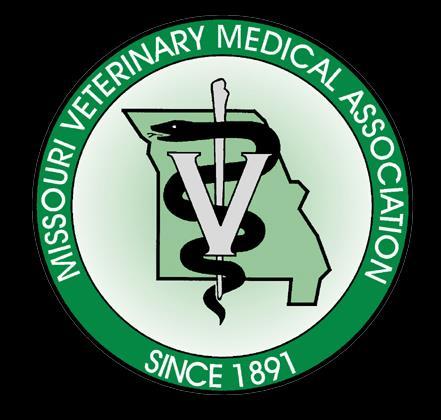
Communication and understanding between the state and district levels is vital.
As an Officer or Representative of your District, it is important, for the good of your district colleagues, to know your role and your district’s role in the Missouri Veterinary Medical Association, as well as what resources and opportunities you can expect from the MVMA office to help you in your duties.
This two-way street of giving and receiving can only build a stronger organization for all concerned.
Page | 1
Page | 2 Table of contents District Officer Elections 3 Summary of Duties 3 District President Veterinarian of the Year Award MVMA Committee Appointments District Delegate to the MVMA Executive Board 3-4 Temporary District Delegate to the MVMA Executive Board 4 At-Large Delegate 4 Resources for Your District 5 District Mailings MVMA Academy C.E. MVMA District Services Program 6 Calendar and Deadlines 7 Other Roles of the District 8 Notice of Meetings Preparation Needed for District Meetings 8 Minutes Communication 10 MVMA Magazine MVMA Website www.movma.org MVMA District Officer Handbook Executive Report E-Newsletter Mo. Academy of Veterinary Practice C.E. Approval Request Form 11 Policy & Procedures 12-13 District Map 14 Certificate of Completion 15 Academy Information 16
DISTRICT OFFICER ELECTIONS
The MVMA should be notified of any change in district officer positions. Elections usually take place at the last or first meeting of the year. The traditional times for leadership change in each district can be found on page 8. If this has changed, the MVMA office should be notified.
As a professional courtesy when your terms end, please make the transition to your successor as smooth as possible by giving them all necessary information and documents to continue to improve and build upon your efforts as a district officer.
SUMMARY OF DUTIES
District President Veterinarian of the Year Award
It is suggested the District President select his/her own nominating chair or committee on the district level, or that this position traditionally be the immediate past district president. This nominating committee or chair could then be responsible for nominating a candidate from their district for the Veterinarian of the Year Award, and to oversee the process, with the help of spouse, friends and the MVMA office, to gather information and then to fill out the application and submit it to the MVMA office by the August 15 deadline.
MVMA Committees
Each year, the MVMA President-Elect appoints the members that will serve on all the MVMA Committees in the coming year. These appointed members begin their term with the Annual Meeting in January when the MVMA President-Elect becomes President.
In most cases, the committees, by the MVMA constitution, should have a representative from each district. It is very important for the President-Elect to have input from the districts on these appointments as needed. The Delegate, and/or District Officers may be called upon by the President-Elect to help fill out the committees with qualified candidates representing all the districts.
A list of all committee memberships with district affiliation indicated can be found in the MVMA Leadership Directory published in the spring edition of the MVMA Quarterly.
District Delegate to the MVMA Executive Board
The district delegate to the MVMA Executive Board is designated by district leadership. The term of the Delegate is 3 years, and they may serve no more than two consecutive terms. They must reside or work in the district and be an active member of the MVMA in good standing. Vacancies are expected to be filled by the district at its next meeting for the balance of the unexpired term.
Duties of the delegate include attendance at all board meetings, usually in January, April, and October. If attendance is not possible, it is very important to recruit a temporary alternate delegate to attend the meeting.
Page | 3
In addition, the delegate should attend all district meetings and report on MVMA activities. Input should be solicited at the district meeting for feedback to the MVMA Executive Board at its next meeting.
Delegates should be informed of AVMA Council and Committee positions available and help the MVMA identify potential interested parties in their district for these positions.
Temporary District Delegate to the MVMA Executive Board duties
The Temporary Delegate stands in for the Delegate who is not able to fulfill a duty. The Delegate shall forward the temporary Delegate the board packet they received and notify MVMA of the temporary Delegate’s attendance. A Delegate is encouraged to bring a potential temporary Delegate to any meeting. Both will receive the minutes afterward.
At Large Delegates
The district VMA can submit a nomination for an MVMA Board At Large Delegate position by April 15.
At Large Delegates will be elected on a statewide ballot. Candidates should apply at the MVMA Office. Candidates with the top three vote totals are elected. There is no limit to the number of candidates that may be nominated. The number of At Large Delegates serving in any one year may range from zero to three.
https://www.movma.org/page/delegate
● Serves at least a one-year term, and no more than two consecutive one-year terms.
● Appears on ballot with officer elections.
● No limit to the number of candidates running.
● Those three receiving the most votes are elected.
● If fewer than three candidates (including zero candidates) run, then unfilled At-Large Delegate seats will be vacant for one year.
● Serves as an active voting Executive Board Member at three board meetings: January, April and September. Board meetings are generally four to six hours.
● Serve as a liaison to the membership at large.
● The Executive Board will be comprised of the five officers, nine district delegates, and three at-large delegates.
See also: MVMA Committees and AVMA Positions under Delegate duties.
Page | 4
RESOURCES FOR YOUR DISTRICT District Mailings
It is the responsibility of each district to pay for their district meeting notice mailings. However, the MVMA office can make this task very efficient and cost-effective. One of the district leadership should simply fax or email the specifics of their meeting at least four weeks prior to the date of the meeting. The MVMA prepares a flyer, and e-mails it either to all MVMA members in their district, or only to paid members in their district. This second option is only available if the district has informed the MVMA which of the members in their area have paid. It is recommended to send notices to all members, so that non-paid members can come to the meeting where they will have exposure to the district organization, and be more inclined to become a paid member. A Paper mailing can be sent to the districts for a very reasonable cost.
These procedures are superseded by the MVMA District Service Program if the district has chosen to participate. This option is outlined on page 6.
MVMA Academy Continuing Education
Speakers Bureau, C.E. Certificates and Dollars to your district
It is highly recommended that the District take advantage of the MVMA’s continuing education arm, the Academy. The Academy provides a Speaker’s Bureau (included in your handbook) to help districts secure high-quality speakers. In addition, the Academy will “approve” continuing education according to its guidelines. It is recommended that districts submit the Academy C.E. Approval Request Form to the MVMA office at least four weeks in advance so it can be included on the meeting notice, which should be distributed two to three weeks in advance. (Speaker’s Bureau speakers are pre-approved)
After approval, and prior to the meeting, the MVMA will supply the district with Certificate of Completion forms to be issued to those attending. A pass-around sign-up sheet for recording the names and addresses will also be supplied. These names and addresses can be used as your attendance roster but do not need to be turned into the MVMA.
No one is trying to replace the practice of a company sponsoring a district meeting. We appreciate our partners in industry. The idea is to offer a rock-solid continuing education program in addition to the company’s brief presentation. This will strengthen the meeting and build attendance, which is good for all parties concerned. Speakers from our Partners for Progress have been included under the “Non-University” section of the Speakers Bureau.
For more information on the Academy Continuing Education program, see the MVMA Academy Policies and Procedures document included in your handbook.
The MVMA District Service Program Option
For districts participating in this initiative, MVMA collects $25 in district dues and provides the following services:
Page | 5
MVMA District Meeting Services Program
The MVMA communicates with the district president to:
● Establish the dates for the district meetings and potential locations in the coming year
● Establish topics and potential speakers
The MVMA then:
● Issues a brief newsletter for the district, perhaps with a message from the district leadership, upcoming meeting times/dates/locations, and a call to pay dues.
● Works with MVMA Partners for Progress and other CE providers/Sponsors to establish a presenter and account for the meal costs.
● Promotes district membership and collects dues.
● Make guarantees for the meal as necessary, provide an RSVP clearinghouse for respondents, ensure restaurant guarantees match expected attendance.
● Provide a meeting agenda for district officers, and CE forms for attendees.
District leadership:
● Encourages district membership
● Gives timely feedback to MVMA for meeting planning
● Takes responsibility for running the meeting on site
● Distributes CE forms ensuring that a log is kept of each person receiving a CE form, and collects CE surveys
● Provides input for MVMA to put together the one-page District E-newsletter
Page | 6
CALENDAR AND DEADLINES
January Delegate and/or Alternate Delegate attends MVMA Board Meeting at the MVMA Annual Meeting
February Recruit At-Large Delegate candidates by April 15.
April Determine Veterinarian of the Year Nomination and fill out application due in August.
At-Large Delegate candidate should fill out nominee form by April 15.
Delegate or Alternate Delegate attends MVMA Board Meeting
Review the revised version of the District Officer Handbook
Announce to members to express their interest in a candidacy for a statewide officer position.
May Announce to members to express their interest in serving on an MVMA committee
August VET. OF YEAR APPLICATION SHOULD BE SUBMITTED TO MVMA OFFICE BY AUGUST 15.
September Delegate or Alternate Delegate attends MVMA Board Meeting
December AVMA Council Nominations considered
Make sure MVMA has the latest information on your district’s officers and other information for the district.
Each Year after Officer Elections Notify the MVMA of new officers
At least 6 Weeks prior to a district Meeting
Immediately after District Meeting
Fax meeting notice draft to office
Submit Academy C.E. Approval Request Form
Send completed program surveys to MVMA office
Send minutes or a synopsis of meeting to MVMA office
Page | 7
OTHER roles of the district
Notice of Meetings
Whether the MVMA office does the mailing of the district meeting notice or not, it is important that the office be informed of the dates of upcoming district meetings. These meetings can then be publicized in our newsletter and on our website calendar to draw participation from outside the area. In addition, MVMA leadership is then aware of the meeting and can, in some cases, plan to attend.
Some districts have traditional dates to meet. Some of these are as follows. Please contact the MVMA office if you know that any of the following is incorrect.
DISTRICT OFFICER ELECTIONS MEETINGS
NORTHWEST November/December
Approximately every 3 months
NORTH CENTRAL November/December 2nd Thursday; spring & fall
NORTHEAST November/December
2nd Thursday; spring, summer, fall
GREATER KANSAS CITY
Election in November, installation of officers in February
Board mtgs: 2nd Tuesday of each month (except for Dec. & July)
C.E. mtgs: 3rd Thursday each month (except June & July)
WEST CENTRAL
November/December 2nd Saturday every other month beginning w/ Jan.
Scientific meetings: 1st Friday of Oct through April
GREATER ST. LOUIS
Elections in April, induction of officers in May
Social Family meetings: September & April Seminars: Sundays in February
EAST CENTRAL
SOUTHWEST
SOUTHEAST
November/December
November/December
Quarterly, on Thursdays
Large Animal - winter/summer
Small Animal - spring/fall
Page | 8
fall meeting
spring meeting
November/December 1
1
Preparation Suggested for District Meetings
o Name Tags
o Agenda
o Introduction of those present
o Treasurer’s report
o Minutes of last meeting
o Reports from the district delegate
o Reports from MVMA representative if present
o Reports from college of veterinary medicine if present
o Recognition of sponsor if applicable
o Old business and new business
o Next meeting
o Introduction of speaker and CE program (if applicable)
o Adjournment
o Record minutes and provide to MVMA office. These will be published in the MVMA Quarterly Magazine.
o Have a nominating committee with a rotating membership of recent officers
o Agenda items throughout the year
o Election of Officers
o Veterinarian of the year nominee
o At-Large Delegate nominee
Minutes
Though each district keeps its own minutes, it is strongly suggested that copies of the minutes be sent to the MVMA office where they can also be filed. At the least, a synopsis of the meeting should be provided to the MVMA for printing in the newsletter. The MVMA Executive Director tries to attend as many district meetings as possible. The Executive Director’s capacity at District Meetings, however, is not as a recorder. The District Secretary must keep good minutes of the meeting, especially concerning votes and official actions, and file and distribute them appropriately.
Page | 9
COMMUNICATION
MVMA Magazine
The MVMA Quarterly magazine is published four times per year.
Spring 2022
Summer 2022
Fall 2022
Winter 2022-2023
The MVMA Website
10 March 15
15 June 18
15 September 25
5 November 20
The MVMA Website will contain much information and many helpful links for those online. District meetings and notices will be posted on the calendar. You may view the website at www.movma.org
The MVMA District Officer Handbook
This handbook will be updated and distributed each year in April. The MVMA office will send the current Handbook to any individual who has been identified as a newly elected district officer. The MVMA Executive Board will review and approve this handbook each year.
Executive Report E-Newsletter
The Executive Report is sent via email in the months the Quarterly is not published: February, April, May, July, August, September, November.
Your input is vital
The information in this Handbook is only as good as the communication between the districts and the state office. If you identify any errors in this document, please let us know so that they may be corrected for the next printing.
Page | 10
Issue Ad & article deadline Mail Date
February
May
August
October
Missouri Veterinary Medical Association Academy
GSL, GKC & WC C. E. Approval Request Form
Name of Presentation:
Nature of Presentation (check all descriptive words that apply) Lecture Wet Lab Demonstration Seminar
Date(s): Time:
Location(s):
MVMA District Speaker Sponsored By:
Presenter:
Presenter bio/qualifications (attaching detailed information is encouraged):
Is this Presentation: Invitation Only Open to all Vets Open to Vet Techs
Would you like a notification sent to MVMA members in the district: Yes No
Number of actual hours of duration Lecture Wet lab
Percent of presentation commercial
Percent of presentation non-commercial _____________
RSVP TO: By: / /
Contact Information: (Please Check) WORK / FAX / EMAIL / ALL
CONTACT INFORMATION FOR PERSON SUBMITTING THIS FORM
NAME: TELEPHONE:
EMAIL:
FAX: EMAIL THIS FORM TO LMUHLENBRUCH@MOVMA.ORG; FAX TO 573-659-7175, TO THE ATTENTION OF LORI MUHLENBRUCH AT LEAST 30 DAYS PRIOR TO EVENT
Page | 11
Continuing Education Approval Policy and Procedures
The Missouri Veterinary Medical Association Academy “approves” continuing education that is judged to meet the Academy standards. This “Academy Approved” C.E. is recognized by the Missouri Veterinary Medical (licensing) Board as provided for in the Missouri Veterinary Medical Board Rules under 4 CSR 270-4.042 (8)(H).
The Academy Guidelines consist of the following:
Scientific Presentation by a Veterinarian
1 hour credit awarded for 50 minutes of presentation
Scientific Presentation with no more than 50% Commercial content given by a veterinarian
Scientific Pres. with more than 50% Commercial content or presentation by a non-veterinarian
1 hour credit awarded for 50 minutes of presentation
½ hour credit awarded for 50 minutes of presentation
1 hour credit awarded for 50 minutes of presentation
Wet Labs Presentation by a Veterinarian
Practice Management Presentations by appropriate professional
1 hour credit awarded for 50 minutes of presentation
The above categories are guidelines; final determination of credit hours is at the discretion of the Academy President.
The Academy, working through the MVMA office, makes a determination, after reviewing all submitted materials, as to the validity of the proposed workshop, seminar, or prepared material as worthwhile and therefore “approved” continuing education for veterinary medicine.
All communication should be conducted through the MVMA office.
C.E. Approval Request Form
District VMA’s interested in receiving Academy approval for a continuing education presentation must submit the Academy C.E. Approval Request Form to the MVMA office prior to presentation of the program. Programs will not be approved if C.E. Application Request Form is submitted after presentation of the program.
Certificate of Approval
Upon approval, the Academy will send an official written approval of the course to the sponsoring district, which should then be retained in its files. The Certificate of Approval is not for distribution to the individual attendees for their proof of completion.
Page | 12
Certificate of Completion
Upon approval, the Academy will send an official Certificate of Completion to the sponsoring district. The attendees take the certificate with them for their files so they may produce it should the licensing board audit them.
The hours approved for each course are recorded at the MVMA office to be the final authority on how many hours were approved for that course on those specific dates.
The Academy will provide a Certificate of Completion only for meetings where the Academy, the MVMA or an MVMA District VMA is the sponsoring organization. Other sponsoring organizations can borrow the Academy format to create their own certificates of completion.
Following the event:
It is necessary that the Academy surveys be distributed at the meeting, that they be completed by the attendees, collected at the end of the meeting, and sent to the MVMA office at 2500 Country Club Drive, Jefferson City, MO 65109. The Academy will use the survey results to compare with the information provided on the C.E. Approval Request Form. The extent to which the completed surveys are returned following the event may be used as a factor in future C.E. approvals. It is no longer necessary to send the names and addresses of the participants to the MVMA office.
The event will be registered at the MVMA office as being on the official list of continuing education programs approved by the Academy.
Events must be re-submitted for approval each year for C.E. being offered February through January, but the Academy must receive the date and location of each occurrence of the program.
Attached are:
● The Missouri Veterinary Medical (licensing) Board Rules on the Continuing Education Requirement
● The Academy C.E. Approval Request Form
● The Academy Certificate of Approval
● A generic Certificate of Completion*
● Academy Brochure explaining the principles and goals of the Academy
*The MVMA provides a Certificate of Completion for meetings where the Academy, the MVMA or an MVMA District VMA is the sponsoring organization.
Page | 13
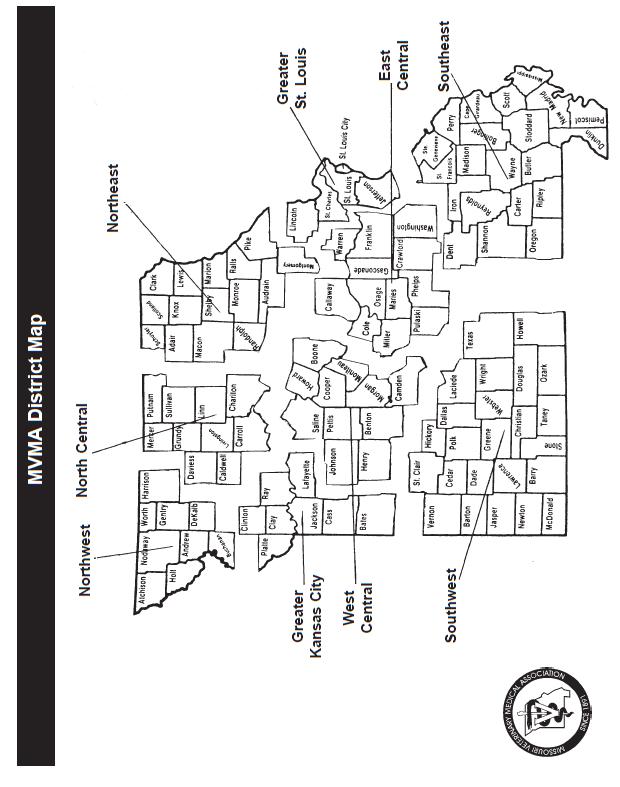
Page | 14
Certificate of Completion
(For Individual Attendee's File)
THE MISSOURI VETERINARY MEDICAL ASSOCIATION ACADEMY CERTIFIES THAT:
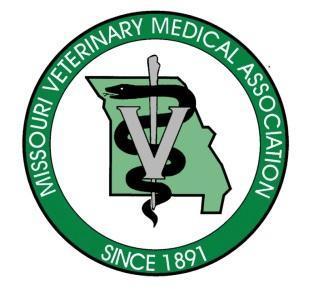
Name:
Address:
City/State/Zip: Completed the Following Continuing Education Program:
Presentation Titles: Adequan Canine (Polysulfated Glycosaminoglycan)
ID: #812
CE Hours: 2hour(s)
Date: April 16, 2020
Location: Hereford House, Leawood, KS
Speaker: Dr. Donald Doss
KCVMA certifies they have received approval from the MVMA Academy to award 2 hour(s) of Academy Approved Continuing Education for this program. Attendees must retain this Certificate of Completion in their files and be able to produce it in the event of an audit of C.E. hours by the Missouri Veterinary Medical Board during the license renewal process.

Page | 15
The Academy
The Missouri Veterinary Medical Association Academy is Missouri’s honor society for veterinarians and serves as the continuing education advisory committee to the MVMA.
• Membership provides an avenue by which to set yourself apart in the eyes of colleagues and clients.
• The Academy sets an exemplary standard for continuing education.
• The Academy supports district CE through sponsorship of the Speakers Bureau and assists with planning content for the MVMA convention and online webinar series.
Membership
Membership is free. MVMA members must obtain a minimum of 40 CE hours per year (see Benefits chart above).
Benefits
Free Annual Membership Certificate
Eligible to purchase economical professional display plaque
Benefits
Page | 16
MVMA Member Only
Ability to Rollover Extra Hours to
Year Fetch dvm360 Conference Registration Discount 5% 10% Recognition
MVMA & Academy Member
Next
in MVMA newsletter and online
MVMA Member Only
Fetch dvm360 Conference Registration Discount 5% 10% Recognition
MVMA & Academy Member Only
Ability to Rollover Extra Hours to Next Year
in MVMA newsletter and online
Free Annual Membership Certificate
Eligible to purchase economical professional display plaque
For more MVMA Academy
Information
Name Address
City State Zip Phone: (H)
Phone: (W)
Email:
Clip and mail to: Missouri Veterinary Medical Association 2500 Country Club Drive Jefferson City, MO 65109
or fax to: 573-659-7175
To Apply Obtain CE
• Live lectures, conventions, online webinars, journal readings, etc.
Complete Application
• Available online
• Submit application by Mail
Recent Graduate Exemptions
• See website: www.movma.org/
.
Page | 17
Missouri Veterinary Medical Association
2500 Country Club Drive
Jefferson City, MO 65109
Phone - 573-636-8612
Fax - 573-659-7175
www.movma.org
mvma@movma.org
Page | 18

Page | 19
I
127
T E M 10
MISSOURI VETERINARY MEDICAL ASSOCIATION CONSTITUTION
ARTICLE I. NAME
The name of the Association shall be the Missouri Veterinary Medical Association, Ltd., and, hereinafter, referred to as the MVMA. The MVMA shall be incorporated in the State of Missouri under the general not-forprofit corporation law.
ARTICLE II. LOCATION
The principal office of the MVMA shall be in the City of Jefferson, County of Cole, State of Missouri.
ARTICLE III. DURATION
The duration of the MVMA shall be perpetual.
ARTICLE IV. OBJECTIVES
The objectives of the MVMA shall be to:
(1) improve and advance the science and profession of veterinary medicine;
(2) promote high educational and ethical standards within the veterinary medical profession;
(3) foster and develop the professional interests and welfare of its members;
(4) protect the health and welfare of all animals;
(5) protect the public against diseases transmissible from animal to human;
(6) educate the public concerning animal health;
(7) cooperate with all organizations, agencies and persons whose objectives are consistent with those of the MVMA.
ARTICLE V. PROPERTY
The MVMA is not formed for pecuniary profit or gain and no money or properties received by the MVMA shall be paid to any member, or to any person, during the life of the MVMA, except as compensation for property purchased or services rendered.
1
ARTICLE VI. MEMBERSHIP
Membership in the MVMA shall be limited to graduate veterinarians or persons closely associated with the veterinary profession of the MVMA and shall be subject to the Constitution, Bylaws, and Principles of Veterinary Medical Ethics as may be adopted by the MVMA.
ARTICLE VII. OFFICERS
Officers of the MVMA shall be a President, President-Elect, Vice President, Board Chairperson, and a Secretary-Treasurer who shall be elected from the membership and an Executive Board member from each of the district associations as provided in the bylaws. Other officers and employees may serve as provided in the Bylaws.
ARTICLE VIII. AMENDMENTS
The Constitution may be amended by the submission of the proposed amendment in the form of a written petition, signed by twenty-five (25) voting members, to the Executive Board, or an amendment may be submitted by the majority vote of a quorum of the Executive Board. The Executive Board shall cause the proposed amendment to be published in the MVMA Newsletter thirty days (30) prior to the mailing of a ballot to all voting members. A two-thirds (2/3’s) favorable vote of the members responding to the mailed ballot shall be necessary for the adoption of the amendment. Amendments shall become effective immediately upon adoption unless otherwise specified.
ARTICLE IX. DISSOLUTION
In the event of the dissolution of this corporation, all of its corporate assets subject to distribution on dissolution shall be distributed and conveyed to an organization or to organizations having the same or similar purposes and objectives as are the purposes and objectives of the corporation and which said distributee or distributees shall be entitled to tax exemption under present Section 501 (c) (6) of the Internal Revenue Code 1986 and no part of the assets of the corporation shall be distributed to members of this corporation. The Executive Board shall oversee the dissolution of the corporation.
2
MISSOURI VETERINARY MEDICAL ASSOCIATION BYLAWS
ARTICLE I. MEMBERSHIP
Section 1. Qualifications
Membership in the MVMA shall consist of veterinarians, except for Associate, Collegiate, Partner, and Honorary membership as specified by these Bylaws, who:
(a) are graduates of colleges or schools of veterinary medicine, recognized by the American Veterinary Medical Association;
(b) have applied for membership and been accepted and
(c) agree to comply with the MVMA Bylaws and AVMA Principles of Veterinary Medical Ethics
Section 2. Active
Active members are those veterinarians who qualify for membership as specified in these Bylaws. They shall enjoy all the privileges of the MVMA. Each Active member shall have one vote. Active members shall pay dues in the amount established by the general membership.
Applications for new Active membership must be accompanied by annual dues or agreement to pay full dues plus applicable charges via electronic means as outlined in the corporate policy manual approved by the Executive Board.
Active members, in good standing, of other state veterinary medical associations who pursue a livelihood in veterinary medicine in Missouri and meet all other requirements for membership, may be granted “Active” membership by transfer. These veterinarians shall be exempt from payment of dues to the MVMA during the year of transfer provided dues of like membership have been paid in full to the veterinary medical association of another state.
Section 3. Active New Graduates
Collegiate members, who reside in Missouri, automatically become Active New Graduates upon graduation from veterinary college. They shall have the same qualifications and privileges described under “Active.” First year
3
Active New Graduates shall be exempt from dues. The July falling between 5 and 15 months after their graduation date, Active New Graduates residing in Missouri shall pay one-third (1/3) of Active members’ dues. The July falling between 17 and 27 months after their graduation date Active New Graduates residing in Missouri shall pay two-thirds (2/3) of Active member dues. Starting the July falling between 29 and 39 months after their graduation date full Active member dues shall be paid.
Section 4. Retired
Any Active members who have retired completely from the practice of veterinary medicine and who are not eligible for Lifetime membership may make application for Retired membership by notification to the Executive Board. Retired members shall have all privileges of Active members. Retired members shall pay dues in the amount established by the general membership.
Section 5. Lifetime
(A) Any Active or Retired member of the MVMA who has been a member of the veterinary profession for at least forty (40) years and an MVMA member for at least ten (10) years is eligible for Lifetime membership. Lifetime members shall have all privileges of Active members. Lifetime members shall be dues exempt.
(B) Any Non-Resident member of the MVMA who has been a member of the veterinary profession for at least forty (40) years and an MVMA member for at least ten (10) years is eligible for Lifetime membership. Non-Resident Lifetime members shall have all privileges of Active members except for voting rights. Non-Resident Lifetime members shall be dues exempt.
Section 6. Associate
Associate members shall be bona fide representatives of companies, institutions, or organizations serving veterinarians or having a definite interest in veterinary medicine. Associate membership shall be limited to persons not holding veterinary degrees or those holding veterinary degrees from colleges not recognized by the AVMA. Associate members in good standing shall have all privileges of the MVMA except they shall have no
4
vote and shall not hold elective office. Associate members shall pay the same dues as established for Active members.
Section 7. Non-Resident
Active members who discontinue making their livelihood in Missouri may become Non-Resident members by notifying the Executive Board. Veterinarians making their livelihood from veterinary medicine in other states may be proposed as Non-Resident members upon making application. Non-Resident members in good standing shall have all privileges of the MVMA except they shall have no vote and shall not hold elective office. Non-Resident members shall pay dues in the amount established by the general membership.
Non-Resident members who begin making their livelihood in veterinary medicine in Missouri shall automatically become Active members. If annual dues have not been paid at the time of location change, NonResident members shall pay Active member dues for the current year.
Section 8. Armed Forces
In the event of compulsory, temporary military service, the Executive Board will develop a special category for complimentary membership for those falling under this category.
Section 9. Collegiate
Collegiate membership shall be limited to full time students in the curriculum of veterinary medicine; veterinary interns and residents; and fulltime graduate students who are also veterinarians in the College of Veterinary Medicine, University of Missouri. Collegiate members shall be dues exempt.
Collegiate members shall have all privileges of membership except they shall have no vote and shall not hold elective office. Collegiate members shall be automatically transferred to Active New Graduates, Active, or NonResident membership as the situation dictates at the time of program completion.
5
Section 10. Honorary
Honorary members shall be individuals who have rendered distinguished or meritorious service to the veterinary medical profession. Honorary membership may be proposed by any Active member and granted by a majority of votes cast by the Executive Board. Honorary members shall have all privileges of Active membership except they shall have no vote and shall not hold elective office. Honorary members shall be dues exempt.
Section 11. Partner
Partner members shall be a non–veterinarian spouse, family member, or widow/widower of a veterinarian or veterinary student who is sponsored by an Active, Retired, or Lifetime member in good standing. Partner members in good standing shall have all the privileges of Active membership except they shall have no vote and shall not hold elective office. Partner members shall pay dues in the amount established by the general membership.
ARTICLE II. APPLICATION FOR MEMBERSHIP
Section 1. Form
Application for the various membership categories (except Retired, Lifetime, and Honorary membership) shall be submitted on a form furnished by the MVMA.
Section 2. Fees
Initial membership applications must be accompanied by the appropriate membership dues or agreement to pay as outlined in the MVMA Policy Manual approved by the Executive Board.
Section 3. Procedure
Applications will be reviewed by the Vice-President, or his or her designee, who will have the sole discretion to approve or disapprove the application based on the requirements for membership outlined in these bylaws. The Vice-President or designee may refer new member applications to the Executive Board for approval if questions of eligibility cannot be determined.
6
ARTICLE III. MEMBERSHIP DUES
Section 1. Dues Structure
A. The dues year shall be the same as the calendar year.
B. Annual dues shall be payable as outlined in the MVMA Policy Manual as approved by the Executive Board.
C. Upon recommendation of the Budget Committee the amount of dues shall be approved by a majority vote cast by the Executive Board and require approval by a two-thirds (2/3) favorable vote of the membership present at any regular meeting or special meeting.
D. Lifetime, Collegiate and Honorary members shall be dues exempt.
E. Dues discounts and incentives will be governed by a 2/3 vote of the Executive Board and reflected in the MVMA Policy Manual.
Section 2. Delinquency
Members whose dues are not paid in accordance with the MVMA Policy Manual shall forfeit their membership thirty (30) days after notification has been mailed to their last known address by the MVMA.
Section 3. Reinstatement
Members dropped from the rolls because of delinquent dues may be reinstated by approval of the Executive Board upon payment of current year dues and a reinstatement fee set by the Executive Board.
ARTICLE IV. OFFICERS
Section 1. Composition
The officers of the MVMA shall consist of a President, President-Elect, Vice President, Secretary-Treasurer, and Board Chairperson (Immediate Past President).
Section 2. Term
The President, President-Elect, Vice President, Board Chairperson, and Secretary-Treasurer shall be elected for a term of one (1) year or until successors are elected and assume office. Officers shall serve through the
7
MVMA annual convention general membership meeting subsequent to the one at which they were elected. The President-Elect succeeds automatically to the office of the President. The President succeeds automatically to the office of Board Chairperson.
Section 3. Qualifications
To be eligible for office, candidates for President-Elect, Vice President, and Secretary-Treasurer must have been active members in good standing of the MVMA for at least three (3) years total prior to standing for election, live or work in the state of Missouri, and agree to serve if elected.
Section 4. Nominations
A Nominations Committee shall be formed annually consisting of one member from each district association. The Board Chairperson shall chair the Committee. The Committee shall nominate at least two (2) members for the office of Vice President and at least one (1) each for the offices of President-Elect and Secretary-Treasurer and zero (0) to one (1) or more nominees for at large delegates. The slate of candidates must be approved by the Board of Governors These nominations shall be published on the MVMA website and/or in the MVMA Quarterly newsletter by July 1. Additional nominations for an office or at large delegate may be made by a written petition signed by twenty-five (25) voting members submitted on or before August 1. All nominees must meet the necessary qualifications for office.
Section 5. Election
By September 1, a mail ballot listing the nominees with their biographical information and a specially marked envelope shall be sent to each voting member of the MVMA. Ballot shall be returned in the specially marked envelopes furnished by the MVMA and only one ballot shall be in the envelope. If there is more than one ballot in an envelope, then all ballots in that envelope shall be declared null and void. Ballots must be returned to the MVMA office postmarked no later than October 1 and tallied by an impartial party as approved by the Nominations Committee Chairperson. Candidates who receive a majority of the votes cast shall be elected. In the event of a tie vote for any office, final results shall be determined by an additional ballot vote of members present at the MVMA annual general
8
membership meeting. Alternately the balloting may be conducted electronically if approved by the Executive Board.
Section 6. Filling Vacancies
Vacancies in the office of President, President-Elect, Vice President, Board Chairperson, or Secretary-Treasurer occurring between elections shall be filled by Executive Board action.
Section 7. Duties of the Officers
A. President
The President shall be the chief elected executive officer of the MVMA and is responsible to:
(1) preside at MVMA general membership meetings;
(2) serve as a member of the Executive Board;
(3) Serve as Chairperson of the Board of Governors;
(4) appoint and charge all MVMA committees unless otherwise provided in the bylaws;
(5) be an ex-officio member of all committees;
(6) report to the Executive Board on matters pertaining to the goals and accomplishments of the MVMA;
(7) serve as a member of the MVMA Budget Committee;
(8) install newly-elected officers at the conclusion of term of office in the absence of an AVMA official;
(9) succeed automatically to the office of Board Chairperson;
(10)keep the Executive Director fully informed.
B. President-Elect
The President-Elect is responsible to:
(1) perform duties of the President in the absence of the President;
(2) serve as a member of the Executive Board and Board of Governors;
(3) serve as Chairperson of the Convention Program Committee and shall appoint that Committee;
(4) serve as a member of the Budget Committee;
9
(5) submit a list of tentative committee appointments for the coming year to the Executive Board at the fall meeting;
(6) Appoint the MVMA Academy Vice President
(7) perform such other duties as may be prescribed by the President or Executive Board;
(8) succeed automatically to the office of President;
(9) keep the Executive Director fully informed.
C. Vice President
The Vice President is responsible to:
(1) perform the duties of the President and President-Elect in their absence;
(2) serve as a member of the Executive Board, Board of Governors and Budget Committee;
(3) serve as Co-Chairperson of the Membership Committee;
(4) perform other duties as requested by the President and Executive Board
(5) serve as Vice Chairperson of the Convention Program Committee
(6) keep the Executive Director fully informed.
D. Secretary-Treasurer
The Secretary-Treasurer is responsible to:
(1) serve as recording secretary at meetings of the Executive Board, Board of Governors, Budget Committee, and MVMA general membership meetings;
(2) oversee the retention and security of all documents of the MVMA as outlined in the document retention policy.
(3) serve as a member of the Executive Board, Board of Governors, and Budget Committee;
(4) be custodian of all funds of the MVMA, responsible for the executive director’s proper accounting of all receipts and disbursements and maintenance of a file of all vouchers and invoices in accordance with the document retention policy.
(5) review the financial reports of the MVMA monthly and make detailed reports of the financial status of the MVMA at every regular session of the Executive Board and regular meetings of the MVMA membership;
10
(6) be authorized to sign checks;
(7) turn over all funds, property and records to successor;
(8) keep the Executive Director fully informed.
E. Board Chairperson
The Board Chairperson is responsible to:
(1) Serve as Chairperson of the Executive Board;
(2) Serve as Chairperson of the Nominations Committee;
(3) Serve as Chairperson of the Budget Committee;
(4) Serve as a member of the Board of Governors;
(5) Serve as Chairperson of the Long Range Planning Committee;
(6) Perform other duties as requested by the President;
(7) Keep the Executive Director fully informed.
(8) Serve as co-chairperson to the membership committee
ARTICLE V. EXECUTIVE BOARD
Section 1. Composition
The Executive Board shall consist of the President, President-Elect, Vice President, Secretary-Treasurer, Board Chairperson, a student board member and alternate student board member (both non-voting), a Delegate representing each of the district associations in the State and up to three at large delegates. At large delegates serve a one year term, and cannot run for more than two consecutive terms. Each member of the Board shall have (1) vote. Members are not eligible to serve as both an officer and delegate. The Executive Director, unless excused, shall attend all meetings of the Executive Board in an advisory capacity.
Section 2. Election and Tenure
Executive Board Delegates shall be elected by those voting members residing in the respective MVMA districts specified in Article VII, Section 1, of these Bylaws. The term shall be for three (3) years, and they may serve no more than two (2) consecutive three (3) year terms. The District Delegate must reside or work in the district which they represent and be an Active member of the MVMA in good standing. Vacancies in office shall be filled by the district association at its next meeting for the balance of the unexpired term. Delegates who cannot attend are encouraged to appoint a
11
temporary alternate delegate to attend in their place. Temporary alternate delegates have all the privileges and responsibility of the delegate for one meeting only.
Alternate delegates elected prior to February 1, 2019, will be grandfathered to serve out what remains of their three-year term.
At Large Delegates will be elected on a statewide ballot. Candidates for At Large Delegate will be nominated per Article IV Section 4. Candidates with the top three vote totals are elected. There is no limit to the number of candidates that may be nominated. The number of At Large Delegates serving in any one year may range from zero to three.
Section 3. Meetings
The Executive Board shall meet at least three (3) times per year – one being during the MVMA annual convention. It shall also meet as deemed necessary and called by the Board Chairperson or by any three (3) members of the Executive Board. At least seven (7) days advance notice shall be given to members of the Executive Board. Business may be conducted by mail, electronic mail, conference call, or web meeting when necessary.
Section 4. Quorum
A two-thirds (2/3) majority of the voting members of the Executive Board shall constitute a quorum.
Section 5. Duties of the Executive Board
The Executive Board shall be the administrative body of the MVMA and shall, in principle, be the voice of the members. The Executive Board is responsible to:
(a) have complete charge of the MVMA’s property and financial affairs;
(b) be charged with carrying out the provisions of these bylaws;
(c) elect and advise the MVMA Delegate and Alternate Delegate to the American Veterinary Medical Association;
(d) approve honorary memberships;
(e) act on matters referred by committees;
12
(f) act on amendments proposed for the Constitution and Bylaws;
(g) employ and outline duties of Executive Director as kept in the policy manual;
(h) employ and outline duties of legislative consultant;
(i) request written reports from representatives of allied professional groups to report on activities concerning the profession prior to the regular meetings of the Executive Board and, if deemed necessary, request specific representatives to appear before the Executive Board to provide counsel at meetings;
(j) approve site and time of the annual convention, business meetings, and any special convention or meetings;
(k) take any emergency action that must be taken that must be taken by the MVMA when it is not possible to obtain approval of the membership;
(l) fill vacancies in office occurring between elections by appointment;
(m) perform other functions as may be requested by the Board Chairperson;
Section 6. Duties of Executive Director
The Executive Director shall be the chief paid executive of the MVMA and responsible for the administration of the MVMA affairs. The Executive Director shall be responsible to the Executive Board. Duties and responsibilities of the Executive Director shall be outlined by the Executive Board in a policy manual which shall be updated each year. An annual performance review of the Executive Director shall be conducted each year by the Board of Governors.
ARTICLE VI. BOARD OF GOVERNORS
Section 1. Composition
The Board of Governors shall be composed of the President, PresidentElect, Vice-President, Secretary-Treasurer, and Board Chairperson. The Executive Director, unless excused, shall attend all meetings of the Board of Governors in an advisory capacity.
Section 2. Duties of the Board of Governors
The Board of Governors is responsible to:
13
(a) have general supervision of the business for the MVMA between regular and special meetings of the Executive Board;
(b) act as the MVMA Budget Committee;
(c) serve as members of the Long Range Planning Committee;
(d) be empowered to act for and exercise the duties and authority of the Executive Board in an emergency situation only when contact with each member of the Executive Board is not possible;
(e) oversee the operation of the MVMA office and action of the Executive Director;
(f) approve the slate of candidates;
(g) conduct other business as necessary for normal operations of the MVMA;
(h) keep the Executive Board fully informed.
Section 3. Meetings
Meetings of the Board of Governors shall be at the call of the President or at the request of two (2) officers. Business may be conducted by mail, web meeting, telephone, or electronic communication. All action taken shall be verified and minutes taken as necessary.
Section 4. Quorum
A majority of the Board of Governors constitutes a quorum.
ARTICLE VII. DISTRICT DELEGATES AND ALTERNATES
Section 1. District Boundaries
A. The district associations shall be named as specified below and will be comprised of that part of Missouri designated by the following counties:
a. Northwest – Atchison, Andrew, Buchanan, Dekalb, Gentry, Harrison, Holt, Nodaway, and Worth counties;
b. North Central – Caldwell, Carroll, Chariton, Davies, Grundy, Linn, Livingston, Mercer, Putnam, and Sullivan counties;
c. Northeast – Adair, Audrain, Clark, Lewis, Macon, Monroe, Montgomery, Marion, Knox, Pike, Ralls, Randolph, Schuyler, Scotland, and Shelby counties;
14
d. Greater Kansas City – Bates, Cass, Clay, Clinton, Jackson, Lafayette, Platte, and Ray counties;
e. West Central – Benton, Boone, Camden, Cooper, Henry, Howard, Johnson, Moniteau, Morgan, Pettis, and Saline counties;
f. East Central – Callaway, Cole, Crawford, Franklin, Gasconade, Maries, Miller, Osage, Phelps, Pulaski, Warren, and Washington counties;
g. Greater St. Louis – Jefferson, Lincoln, St. Charles, and St. Louis counties, and St. Louis City;
h. Southwest – Barry, Barton, Cedar, Christian, Dade, Dallas, Douglas, Greene, Jasper, Laclede, Lawrence, Howell, Hickory, McDonald, Newton, Ozark, Polk, St. Clair, Stone, Taney, Texas, Vernon, Webster, and Wright counties;
i. Southeast – Bollinger, Butler, Cape Girardeau, Carter, Dent, Dunklin, Iron, Madison, Mississippi, New Madrid, Oregon, Pemiscot, Reynolds, Perry, Ripley, St. Francois, Ste. Genevieve, Scott, Shannon, Stoddard, and Wayne counties;
Each MVMA District shall be represented by (1) delegate, who shall have one (1) vote.
Section 2. Duties of District Delegates
The District Delegates shall:
a. represent the views of their constituents and be voting members of the Executive Board;
b. inform the district membership of actions pending and actions taken by the Executive Board;
c. appoint a temporary Delegate to serve in the absence of the Delegate from any regular or called meeting of the Executive Board.
Section 3. Duties of Temporary Alternate Delegates
The Temporary Alternate Delegates shall:
Be considered voting members of the Executive Board and report back to the District Delegate.
15
Section 4. Nomination and Election
The nominations and elections of the district delegates shall be staggered with nominations and elections conducted for delegates in the three (3) district associations whose terms will be expiring at the close of the annual convention each year. The Executive Director shall notify the district associations of the need for nomination and election of a delegate to represent their respective districts.
Section 5. Student Board Members
A student board member and alternate student board member will be appointed and serve through the remaining tenure of their college career. These positions are non-voting. The selection process for student board members will be set forth in the MVMA policy manual.
ARTICLE VIII. MVMA DELEGATE AND ALTERNATE DELEGATE TO THE AMERICAN VETERINARY MEDICAL ASSOCIATON (AVMA)
Section 1. Election
Members of the MVMA shall be informed of upcoming vacancies in the office of MVMA Delegate and Alternate Delegate at least sixty (60) days prior to an Executive Board meeting by notice in the MVMA newsletter and/or website and E Newsletter and members may submit nominations for candidates at least thirty (30) days prior to that Executive Board meeting.
The MVMA Delegate and Alternate Delegate to the AVMA shall be elected by the Executive Board for a four (4) year term each effective immediately upon election. The Delegate and Alternate Delegate may serve no more than two (2) consecutive four (4) year terms.
Section 2. Qualifications
Any veterinarian who has been an Active member of the MVMA for five (5) consecutive years prior to appointment and who is a member of the AVMA is eligible for election as AVMA Delegate or Alternate Delegate.
Section 3. Vacancy
16
Any vacancy shall be filled by an election of the Executive Board.
Section 4. Removal
The Delegate and/or Alternate Delegate to the AVMA may be removed by a ballot two-thirds (2/3’s) of the votes cast by the Executive Board.
Section 5. Duties
The Delegate and Alternate Delegate to the AVMA shall:
a. serve as ex-officio members of the Executive Board and inform the Board on matters to be considered by the AVMA House of Delegates;
b. seek executive Board direction and represent the MVMA accordingly at all meetings of the AVMA House of Delegates;
c. report on actions of the AVMA House of Delegates at the next meeting of the Executive Board or sooner if necessary;
d. inform the Executive Board sufficiently prior to deadlines on AVMA nominations and other matters to allow appropriate action;
e. perform other duties as requested by the Executive Board.
ARTICLE IX. GENERAL MEMBERSHIP MEETINGS
Section 1. Time and Location
One (1) general membership meeting is to be held during the Annual Convention at such time and location as set by the Executive Board. A second general membership meeting may be held at a time and place as designated by the Executive Board.
Section 2. Special Meetings
The call, time, and location for special meetings of the general membership shall be approved by two-thirds (2/3’s) vote of the entire Executive Board. Notification of special meetings must be sent in writing to the membership at least thirty (30) days prior to the meeting.
Section 3. Quorum
17
Twenty-five (25) members of the MVMA shall constitute a quorum for the transaction of business.
ARTICLE X. COMMITTEES
Section 1. Appointment and Composition
The President shall appoint the Chairperson of all standing and special committees except the Budget, Convention Program, Membership, and Nominations Committee.
The President shall appoint members needed to complete the respective committees. The President will make every effort to maintain a balanced representation from each of the districts. The district delegate should be made aware of pending vacancies. Appointments should be made within that district as interest is shown. Each standing committee shall have no less than three (3) members.
Section 2. Term of Chairpersons
The appointment of committee Chairpersons will be for one (1) year and become effective during the annual convention except the Chairperson of the Legislative Committee whose term will become effective on October 1 of each year. Committee Chairpersons may be removed from committees by the MVMA President with the advice and counsel of the Board of Governors.
Section 3. Term for Standing Committees
Appointment shall be for a term of three (3) years with one-third (1/3) of the committee members retiring each year. One-third (1/3) of the committee members shall be appointed to three (3) year terms annually unless otherwise specified by these Bylaws. (These terms do not apply to members of the Budget, Convention Program, Membership, and Nominations Committees.) All standing committees, other than Legislative, shall begin efforts during the MVMA annual convention.
Section 4. Meetings and Reports
18
Committee activities shall be planned and budgeted for annually and submitted to the Executive Board. Committees shall hold at least one (1) meeting during the year and shall submit an annual report to the Executive Board prior to the MVMA annual convention. Reports of current committee activity shall be made at regularly scheduled Executive Board meetings as necessary. Committee Chairpersons shall notify the Executive Director for aid in scheduling meetings, notifying committee members, and conducting committee work.
Section 5. Standing Committees
(A) Standing Committees may be modified by the Executive Board and should be published in the current MVMA Policy Manual.
(B) The Executive Board may establish or dissolve a standing committee by a two-thirds (2/3) vote.
(C) All actions of standing committees are subject to approval of the MVMA Executive Board.
Section 6. Task Forces
Task Forces may be appointed by the President as needed to carry out the functions of the MVMA. Task Forces shall make reports to the Executive Board and MVMA in the same manner as Standing Committees. A task force should develop a specific set of objectives to be completed. If the objectives are completed, the President should generally declare the task force disbanded. If the objectives have not been clearly completed within a three-year period, the task force will be either re-appointed, or disbanded by the Board. All actions of task forces are subject to approval of the MVMA Executive Board. Task Forces may be initiated and dissolved at the pleasure of the President.
ARTICLE XI. MVMA ACADEMY
The MVMA Academy shall be the continuing education arm of the MVMA. The Academy shall be administered by a committee of two, consisting of a President and Vice President. The Vice President will be appointed by the incoming MVMA President-Elect, and will assist the MVMA President-Elect with the Convention Planning Committee. The Vice President automatically assumes the position of the Academy President the next year. All actions of the Academy are subject to approval of the MVMA
19
Executive Board. The Academy shall submit an annual report to the MVMA Executive Board and general membership.
ARTICLE XII. FISCAL PROCEDURES
Section 1. Fiscal Year
The MVMA’s fiscal year shall begin January 1 and end December 31.
Section 2. Financial Review
A financial review shall be conducted annually by a Certified Public Accountant.
Section 3. Security Bond
The MVMA Secretary-Treasurer and MVMA office staff shall be covered by a security bond, the amount to be determined by the Executive Board. The expense of the bond shall be assumed by the MVMA.
Section 4. Disbursements
All disbursements of MVMA funds shall be made by checks or electronic transfer drawn on the MVMA account in accordance with board policy.
Section 5. Revenues
All MVMA revenues shall be received by the Executive Director and deposited in the name of the MVMA. The Secretary-Treasurer shall oversee all account transactions.
Section 6. Annual Budget
A budget for the ensuing fiscal year shall be presented annually to the Executive Board by the Budget Committee. The Budget Committee shall have the obligation to justify spending variances within the budget.
Section 7.
Investments
20
Revenues in excess of current operating needs may be invested by the Secretary-Treasurer until such time as needed for operating expenses. The amount, specific nature, and length of all investments shall be determined by the Secretary-Treasurer and Executive Director.
Section 8. Reserve Fund
The MVMA will work toward maintaining an annual reserve fund of 100% of the collected annual dues of the preceding year, at least 40% which will be liquid assets. In the event of an emergency and general revenue is not available, reserve fund money may be used in accordance with the MVMA Policy Manual.
ARTICLE XIII. AMENDMENT OF THE BYLAWS
The bylaws may be amended by the submission of the proposed amendment in the form of a written petition, signed by twenty-five (25) voting members, to the Executive Board, or an amendment may be submitted by the majority vote of a quorum of the Executive Board. The Executive Board shall cause the proposed amendment to be published in the MVMA Newsletter thirty (30) days prior to the mailing of a ballot to all voting members. A two-thirds (2/3) favorable vote of the members responding to the mailed ballot shall be necessary for the adoption of the amendment. Amendments shall become effective immediately upon adoption unless otherwise specified. Alternately, the ballot may be conducted electronically if approved by the Executive Board.
ARTICLE XIV. SUSPENSION OF THE BYLAWS
The Bylaws may be suspended at any meeting when a motion for suspension is presented, in writing, and adopted by a two-thirds (2/3) favorable vote of the members present at the business meeting.
ARTICLE XV. CODE OF ETHICS
The MVMA Code of Ethics shall be the same as the Principles of Veterinary Medical Ethics of the American Veterinary Medical Association.
ARTICLE XVI. PARLIAMENTARY AUTHORITY
21
The rules contained in the current edition of Roberts Rules of Order Newly Revised shall govern the MVMA in all cases to which they are applicable and in which cases they are not inconsistent with these Bylaws and any other special rules of order the MVMA may adopt.
ARTICLE XVII. ORDER OF BUSINESS
The of general membership meetings shall include the following agenda items:
Call to order. Adoption of the Minutes of the Previous Meeting, Treasurer’s Report and Adoption, Report of the Executive Board, Old Business, New Business, Nominations for or Announcement of Election of Officers, and Adjournment.
ARTICLE XVIII. INDEMNIFICATION AND INSURANCE
Section 1. Indemnification
Any officer or member of the governing body of the MVMA shall be immune from personal liability for any civil damages arising from acts performed in his/her official capacity as provided for in Chapter 537 of the Missouri Revised Statutes.
No officer or member of the MVMA shall be personally liable for any obligations or for any duties or obligations arising out of any acts or conduct of said officer or member performed for or on behalf of the MVMA. The MVMA shall and does hereby indemnify and hold harmless its directors, officers, employees and agents on any cases arising out of any acts or conduct performed for or on behalf of the MVMA.
Section 2. Insurance
MVMA may purchase and maintain insurance on behalf of any person who is, or was, a director, officer, or employee against any liability asserted against such person or incurred by such person in any such capacity or arising out of such person’s status as such.
22
I T
11 151
E M
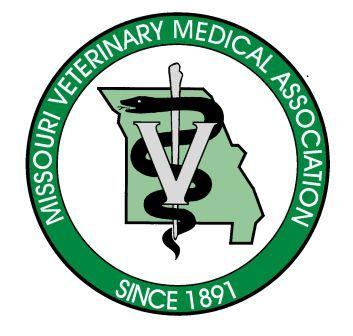
0 Committee Chair Handbook 2023 Missouri Veterinary Medical Association 2500 Country Club Drive Jefferson City, MO 65109 www.movma.org mvma@movma.org 573-659-7175 573-636-8612 Fax Revised November 2022
1 Table of Contents Memberships & Terms 2 Purpose & Relationship to Board & Other Committees 2 Meetings 3 Committee Chair Responsibilities 3 Web Meetings/Conference Calls 4 Annual Meeting 5 Verbally Reporting to the Executive Board 5 Interest Group 5 Website 5 Committee Membership Information 5 MVMA Staff 5 Leadership 6 Forums 6 Contact Resources 6
Introduction
Thank you for your participation in the Missouri Veterinary Medical Association. The membership and leadership of the MVMA applauds your willingness to take on this leadership role for the greater good of your profession. This document has been compiled as a resource to help you outline and achieve your goals as a committee chair and the overall goals of your committee.
Structure Memberships and Terms
MVMA committees are made up of members serving three-year terms. Each year onethird of the committee is generally reappointed or replaced. Standing committee membership generally represents the MVMA districts. Task forces are less rigid in their membership. Task force members are selected for specific experience or knowledge versus geographic representation. Standing committee chairs serve one-year terms and serve at the pleasure of the incoming president who appointed them. Task forces have a more static membership. Task force chairs serve for the life of the task force, generally. Task forces are appointed for a maximum of three years before it is re-evaluated and either continued, dissolved or transitioned to a standing committee.
Purpose and Relationship to Board and Other Committees
Committees and Task Forces take the initiative in the area under their charge to set the agenda or to take on issues assigned by the President or Executive Board. The Executive Board relies on its committees and task forces to scan the environment for emerging issues under their topic or area of focus, then to investigate, discuss in depth, take action and implement with appropriate reporting and periodic approval by the Executive Board. The President is an ex-officio member of each committee and participates in meetings as is practical. The President-Elect is invited to participate in all committee meetings. The President serves as the Executive Board representative in committee oversight between board meetings. The President will use the Board of Governors (officers) as a reference committee on timely issues of importance.
Many issues with which committees deal are not silo issues. Because of this, it is necessary for committees to communicate horizontally with and delegate to other committees. Task Forces develop policy and the Legislative committee implements the legislative strategy to achieve those policies. All committees are asked to contribute agenda items to the Legislative Policy Forum so that legislative strategies can be made and overall priorities can be developed.
2
Meetings
Committees are encouraged to meet as often as needed throughout the year but chairs should take the initiative to establish at least two meetings per year at a minimum.
Committee Chair Responsibilities
The committee chairs are responsible for the following:
• Background yourself on the issues and concerns of the committee
• Initiate committee meetings by contacting the Executive Director
• Review minutes and manage follow up with parties who have committed to tasks.
• Make either brief report (written or oral) to the MVMA Executive Board at the annual meeting.
• MVMA staff will solicit brief summaries of committee activity in February each year for publication and distribution to the membership.
• Take note of your committee members’ attendance, interest and input so that you may give appropriate assistance to the next president when committee appointments are made.
• Review the responsibility of your particular committee each year and adjust as necessary. In the case of a task force this entails establishing a purpose and objectives which, if accomplished, would be cause for the task force’s dissolution.
• It is very important to be in communication with the Executive Director at all times. The Executive Director should be integral to planning and implementation of all meetings, projects, budgetary items, actions and activities.
• Every two years committee chairs are asked to review their committee activities to ensure they are in alignment with the MVMA strategic Plan. This is usually done at the committee’s meeting at convention in January. The chair then presents a brief report at the spring MVMA Leadership conference every other spring. Alternatively, this can be a written report. The board then considers all proposed changes and determines the final wording of the Strategic Plan.
3
Procedures
Web Meetings/Conference Calls
All meetings are combination webinars/conference calls. Attendees can participate only by phone if they wish but the staff will run a web meeting concurrently so documents and the agenda can be reviewed by all who are at their computer. The committee chair initiates a conference call/web meeting by contacting the Executive Director. Committee chair provides agenda items at that time.
The committee chair is encouraged to work with the Executive Director to invite appropriate individuals outside of the committee as a resource to participate in the meeting.
The Committee chair and MVMA staff establish a meeting time based on committee member input This entails the use of “Doodle” an online surveying tool that efficiently identifies the days and times that will result n the best attendance. MVMA staff issues a call to meeting with participation instructions. MVMA staff must be present on meetings as the moderator in order for the meeting to be initiated.
Committee members are sent an email for the call to meeting. This is preferably done at least two weeks prior to the meeting. Three days prior to the meeting another email is sent. Ideally, the day of the meeting, an email reminder is done by MVMA staff.
One of the MVMA staff will initiate the meeting as the moderator. Control of the screen can be passed to any participant. The committee chair and members will join the call as participants not as the moderator.
Once on the call staff will assist in taking roll before turning the call over to the committee chair to run the meeting. The committee chair should outline the agenda and ask for additional agenda items. As discussion is held the committee chair should be very vigilant of the time. Most conference calls have maximum participation for only sixty to seventy-five minutes. Generally, no conference call will go longer than one hour The last seven or eight minutes of the meeting should be reserved for review. This review should include the major points that will be included in the minutes, including the following:
o Committee consensus points on each issue discussed.
o Individual commitments made for future actions by each individual.
Minutes
In general conference calls and meetings are recorded in order for minutes to be produced. At the discretion of the committee chair, the committee chair may generate the minutes if he or she so desires. Recordings of meetings and their transcripts are retained only for a period of time sufficient to ensure that the minutes published are complete and accurate. Recordings and transcripts are not archived. However, after committee meetings, the chair is provided with draft of minutes of the meeting and, upon request, the transcription. The chair is asked to make sure the minutes reflect all relevant actions of the committee.
4
Annual Meeting
Each fall the MVMA staff will communicate with the committee chairs concerning the need and timing and location of a face-to-face meeting of the committee at the MVMA annual convention. Also communicated at that time will be the need for a written request for any input or approval of activities or funding the committee needs from the Executive Board. Agendas should be developed by the committee chair in conjunction with the Executive Director and distributed prior to the annual meeting. The committee meeting schedules are sent out to all committee members prior to the annual convention.
Committee meetings at the convention are generally recorded by MVMA staff for the production of minutes. Small blank tent cards are provided for each committee member to identify themselves at the committee meeting.
Verbally Reporting to the Executive Board
If desired, the committee chair can request to address the board during its meeting.
Tools Interest Group
All MVMA members are given the opportunity to join an interest group. Each committee comprises an interest group. These individuals have expressed an interest in the issues your committee is addressing. By being part of the interest group, these individuals offer themselves as a sounding board. They are offered an opportunity to receive the minutes of the committee. We are exploring new ways to utilize these groups of individuals. One avenue is for committee chairs to have an email sent to members of their interest groups to bounce ideas off of them, or to pose questions. This should help the committee get a broader sense of the membership on an issue or to spawn ideas that the committee may not have thought of. It is also fertile ground for recruiting new committee members.
Website
Each committee is assigned a page on the member side of the website where their materials can be downloaded and reviewed by committee members and other MVMA members. If possible, it is useful to have these pages open during a web meeting, or to review prior to a meeting. This is an excellent resource to handle very large documents.
Committee Member Information
All committee members should make sure they have uploaded their photo to the MVMA website so they can be identified by other committee members.
MVMA Staff
The MVMA staff stands ready to assist you in clerical or investigatory functions for your committee. We ask that you not delegate volunteer recruitment to staff, nor other duties that are most appropriately those of the committee chair or other members.
5
Leadership
Every two years a Missouri Leadership Conference and Orientation is held. This meeting is geared to committee chairs, district officers, board members and other leadership. We encourage you to attend this meeting when offered to receive a complete orientation, and to hone your leadership skills. The strategic plan is reviewed at this meeting.
Roster
For a list of your committee members, find the Leadership Directory--Board & Committee Rosters under the Resources tab of the website. You will find the link to this too under Groups...
Contact Resources
Also make good use of the online membership directory and the website to communicate with your fellow MVMA leaders and members about anything on which you would like advice or input. You are among a supportive community of veterinarians dedicated to your success.
6
I T
12 159
E M
MISSOURI VETERINARY MEDICAL PRACTICE ACT
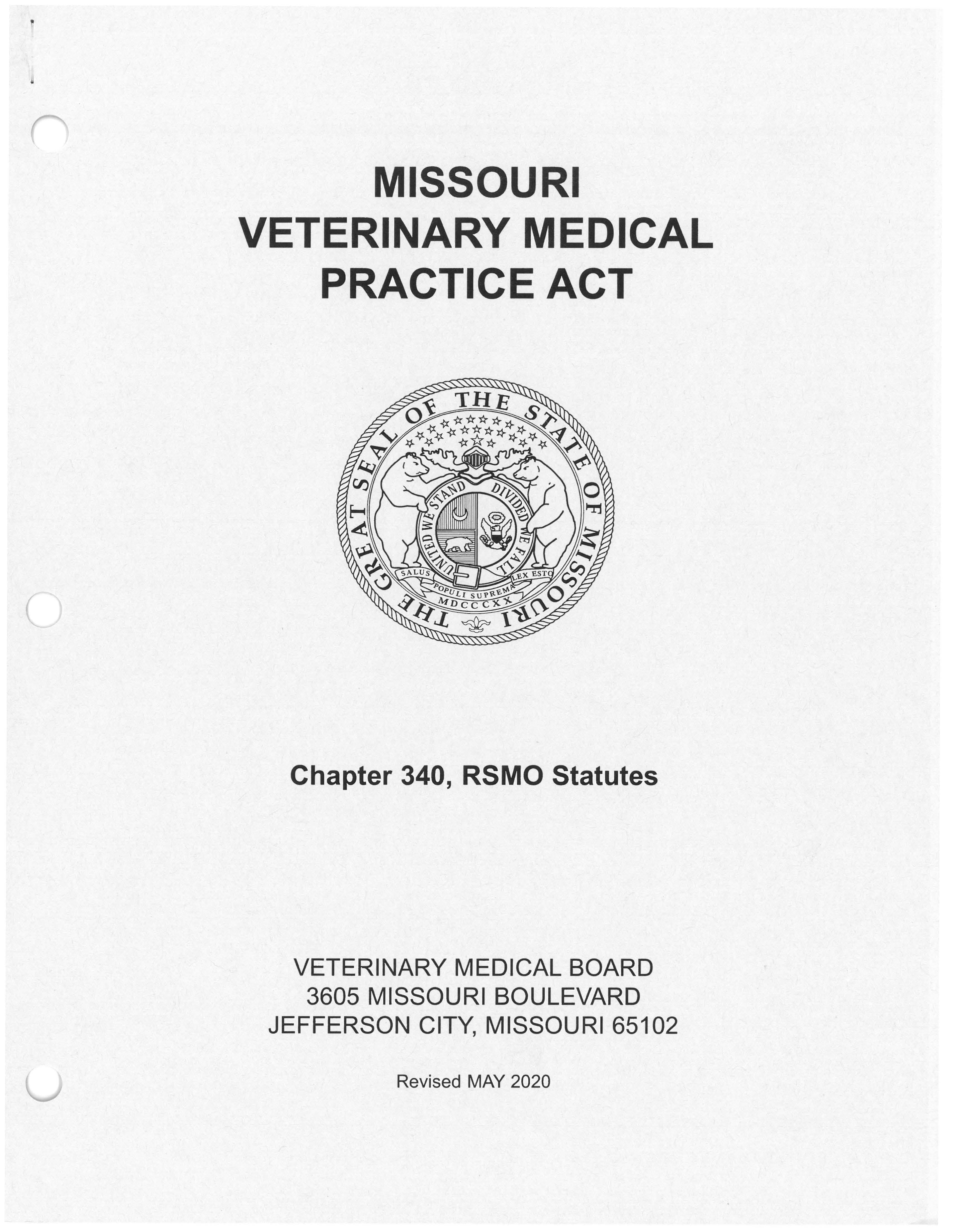
Chapter 340, RSMO Statutes
VETERINARY MEDICAL BOARD
3605 MISSOURI BOULEVARD
JEFFERSON CITY, MISSOURI 65102
Revised MAY 2020
Chlora Lindley-Myers, Director
Department of Commerce and Insurance
Sarah Ledgerwood, Interim Director
Division of Professional Registration
Veterinary Medical Board
Division of Professional Registration
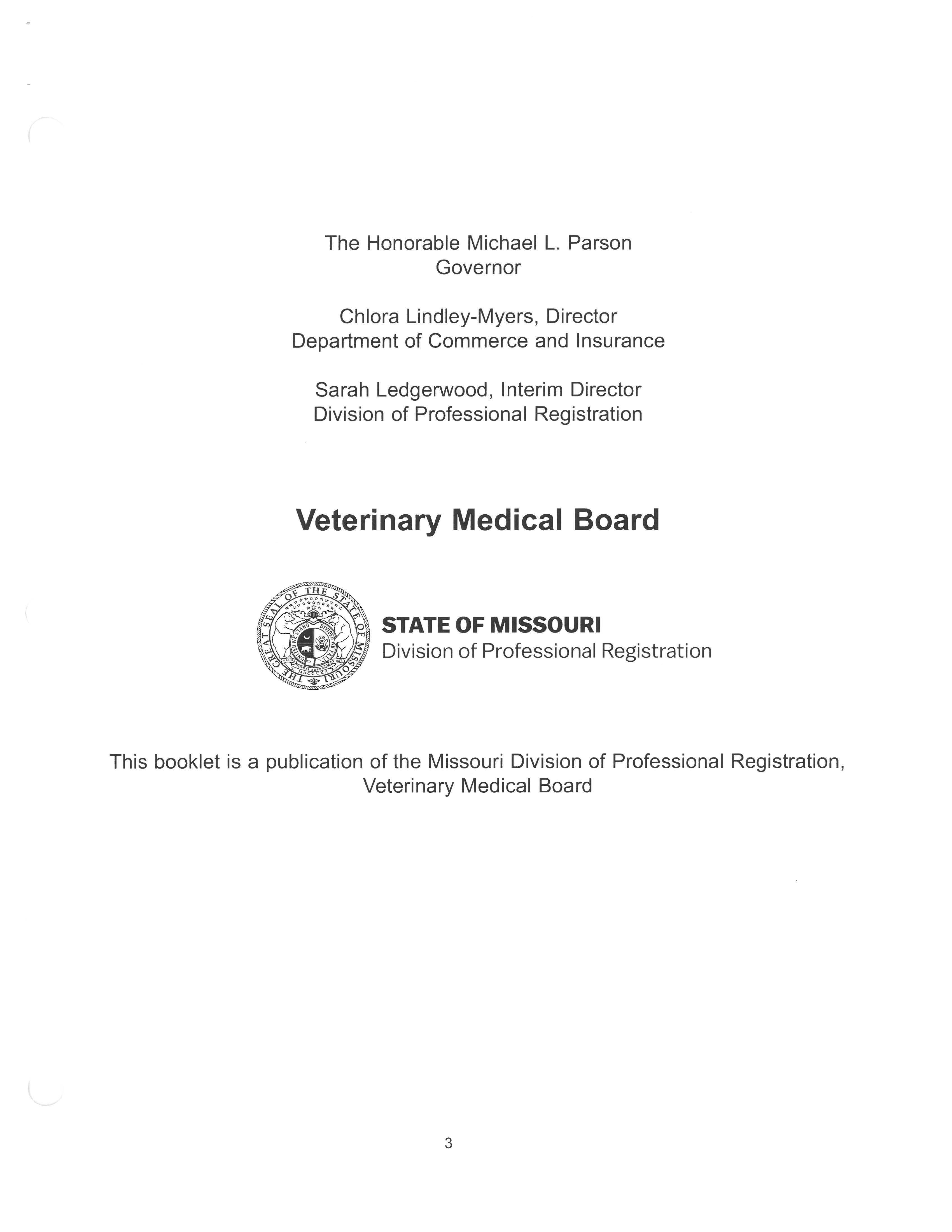 The Honorable Michael L. Parson Governor
STATE OF MISSOURI
The Honorable Michael L. Parson Governor
STATE OF MISSOURI
This booklet is a publication of the
3
Missouri Division of Professional Registration, Veterinary Medical Board

4
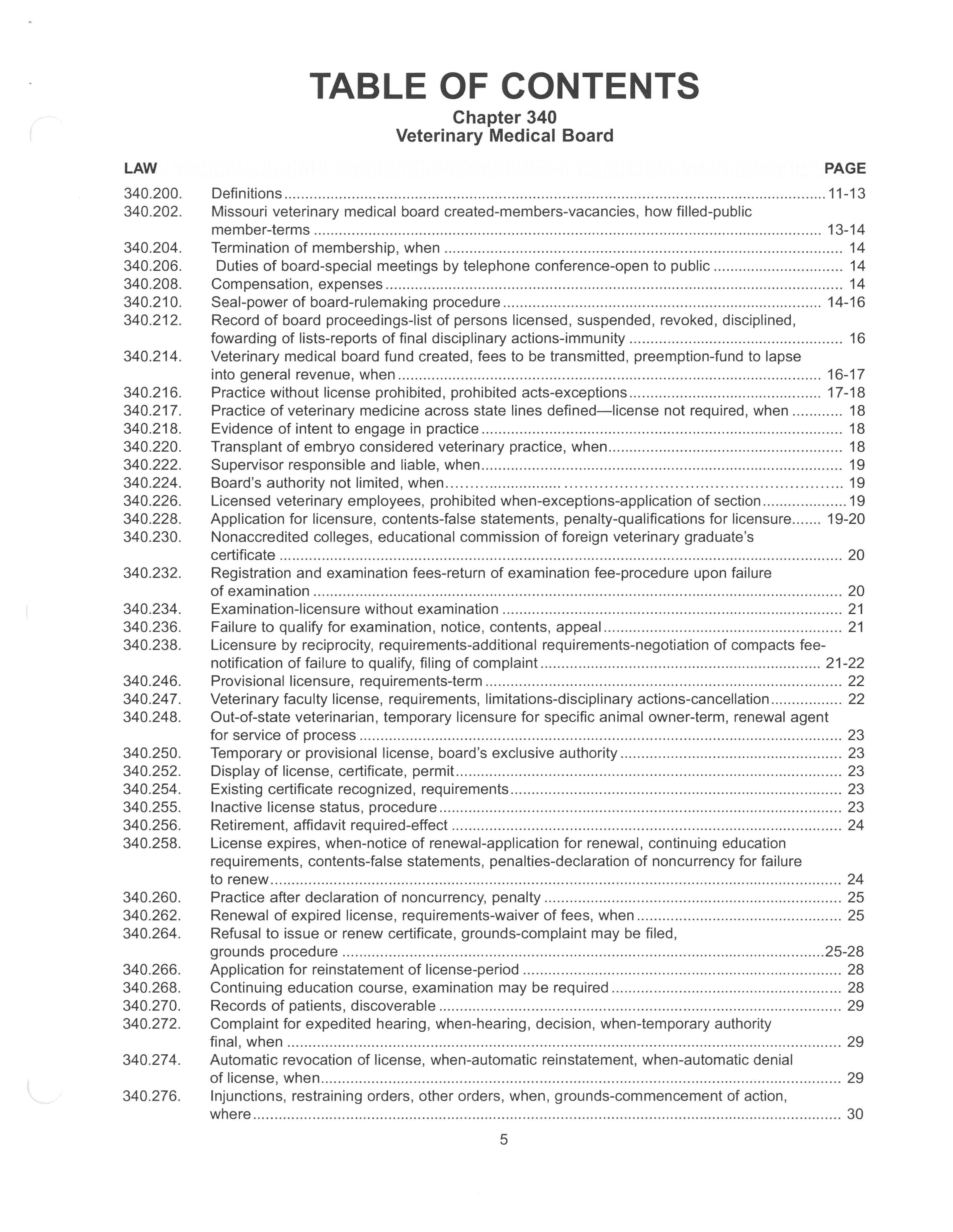
LAW 340.200. 340.202. 340.204. 340.206. 340.208. 340.210. 340.212. 340.214. 340 216. 340.217. 340.218. 340.220. 340.222. 340.224. 340.226. 340.228. 340.230. 340.232. 340 .234. 340.236 340.238. 340.246. 340.247. 340.248. 340.250. 340.252. 340.254. 340.255. 340.256. 340.258. 340.260. 340.262. 340.264. 340.266. 340.268. 340.270. 340.272. 340.274. 340.276. TABLE
CONTENTS Chapter 340 Veterinary Medical Board PAGE Definitions 11-13 Missouri veterinary medical board created-members-vacancies, how filled-public member-terms 13-14 Termination of membership, when 14 Duties of board-special meetings by telephone conference-open to public 14 Compensation, expenses .......................................................................................................... .. . 14 Seal-power of board-rulemaking procedure 14-16 Record of board proceedings-list of persons licensed, suspended, revoked, disciplined, fowarding of lists-reports of final disciplinary actions-immunity 16 Veterinary medical board fund created, fees to be transmitted, preemption-fund to lapse into general revenue, when 16-17 Practice without license prohibited, prohibited acts-exceptions 17-18 Practice of veterinary medicine across state lines defined-license not required, when ............ 18 Evidence of intent to engage in practice 18 Transplant of embryo considered veterinary practice, when 18 Supervisor responsible and liable, when .......... .... .................................. .... .......... .... .................... 19 Board's authority not limited, when 19 Licensed veterinary employees, prohibited when-exceptions-application of section 19 Application for licensure, contents-false statements, penalty-qualifications for licensure 19-20 Nonaccredited colleges, educational commission of foreign veterinary graduate's certificate 20 Registration and examination fees-return of examination fee-procedure upon failure of examination 20 Examination-licensure without examination ................................................................................. 21 Failure to qualify for examination, notice, contents, appeal 21 Licensure by reciprocity, requirements-additional requirements-negotiation of compacts feenotification of failure to qualify, filing of complaint ................................................................... 21-22 Provisional licensure, requirements-term 22 Veterinary faculty license, requirements, limitations-disciplinary actions-cancellation 22 Out-of-state veterinarian, temporary licensure for specific animal owner-term, renewal agent for service of process 23 Temporary or provisional license, board's exclusive authority 23 Display of license, certificate, permit ........................................... .. ............................................... 23 Existing certificate recognized, requirements 23 Inactive license status, procedure 23 Retirement, affidavit required-effect 24 License expires, when-notice of renewal-application for renewal, continuing education requirements, contents-false statements, penalties-declaration of noncurrency for failure to renew 24 Practice after declaration of non currency, penalty 25 Renewal of expired license, requirements-waiver of fees, when 25 Refusal to issue or renew certificate, grounds-complaint may be filed, grounds procedure 25-28 Application for reinstatement of license-period 28 Continuing education course, examination may be required 28 Records of patients, discoverable 29 Complaint for expedited hearing, when-hearing, decision, when-temporary authority final, when ............................................................................................................................ ... .. ... 29 Automatic revocation of license, when-automatic reinstatement, when-automatic denial of license, when 29 Injunctions, restraining orders, other orders, when, grounds-commencement of action, where 30 5
OF
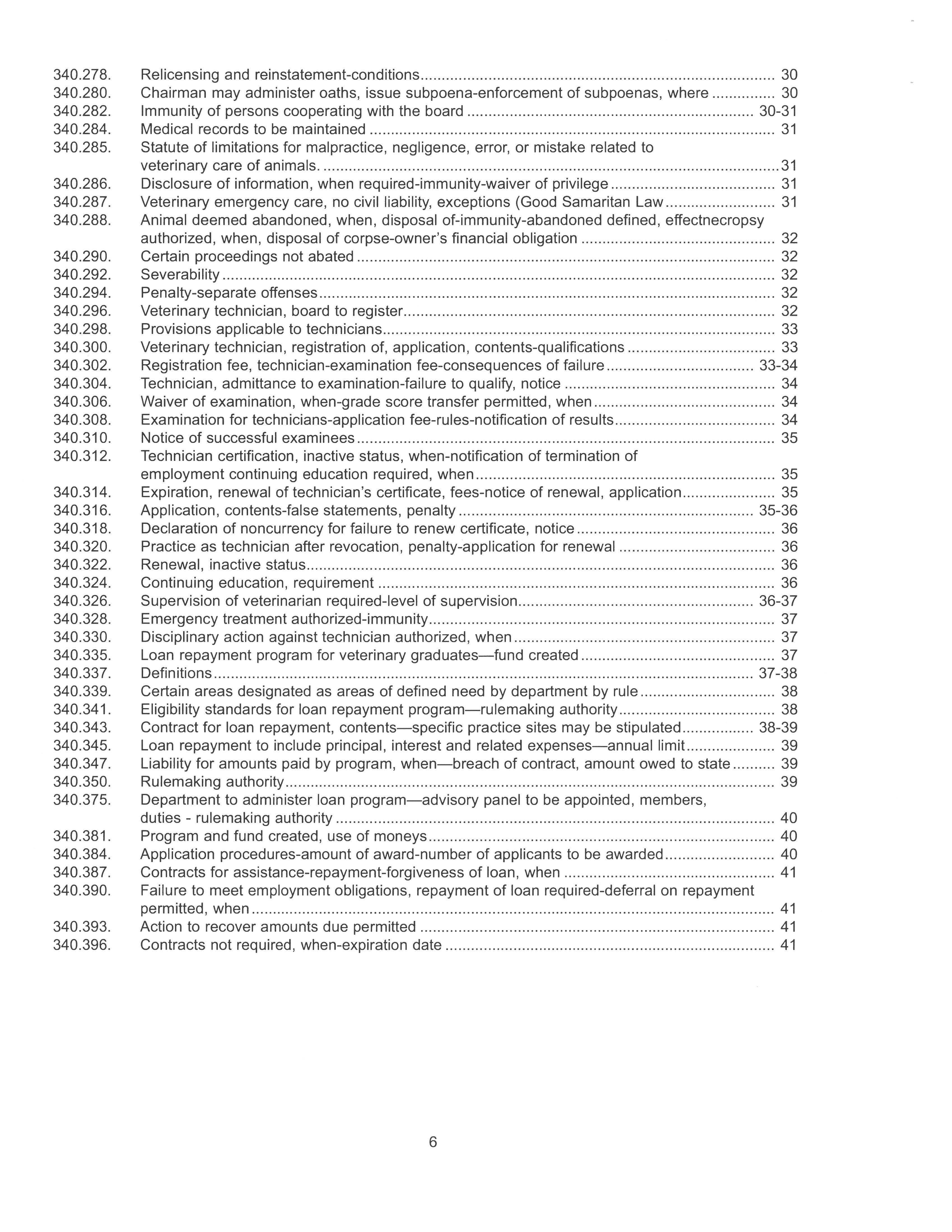
340.278. 340.280. 340.282. 340.284. 340.285. 340.286. 340.287. 340.288. 340.290. 340.292. 340.294. 340.296. 340.298. 340.300. 340.302. 340.304. 340.306. 340.308. 340.310. 340.312. 340.314. 340.316. 340.318. 340.320. 340.322. 340.324. 340.326. 340.328. 340.330. 340.335. 340.337. 340.339. 340.341. 340.343. 340.345. 340.347. 340.350. 340.375. 340.381. 340.384. 340.387. 340.390. 340.393. 340.396. Relicensing and reinstatement-conditions 30 Chairman may administer oaths, issue subpoena-enforcement of subpoenas, where 30 Immunity of persons cooperating with the board .................................................................... 30-31 Medical records to be maintained 31 Statute of limitations for malpractice, negligence, error, or mistake related to veterinary care of animals 31 Disclosure of information, when required-immunity-waiver of privilege 31 Veterinary emergency care, no civil liability, exceptions (Good Samaritan Law 31 Animal deemed abandoned, when, disposal of-immunity-abandoned defined, effectnecropsy authorized, when, disposal of corpse-owner's financial obligation 32 Certain proceedings not abated ................................................................................................... 32 Severability 32 Penalty-separate offenses 32 Veterinary technician, board to register. 32 Provisions applicable to technicians ............................................................................................. 33 Veterinary technician, registration of, application, contents-qualifications 33 Registration fee, technician-examination fee-consequences of failure 33-34 Technician, admittance to examination-failure to qualify, notice 34 Waiver of examination, when-grade score transfer permitted, when 34 Examination for technicians-application fee-rules-notification of results 34 Notice of successful examinees 35 Technician certification, inactive status, when-notification of termination of employment continuing education required, when 35 Expiration, renewal of technician's certificate, fees-notice of renewal, application 35 Application, contents-false statements, penalty 35-36 Declaration of noncurrency for failure to renew certificate, notice 36 Practice as technician after revocation, penalty-application for renewal 36 Renewal, inactive status 36 Continuing education, requirement .............................................................................................. 36 Supervision of veterinarian required-level of supervision 36-37 Emergency treatment authorized-immunity 37 Disciplinary action against technician authorized, when 37 Loan repayment program for veterinary graduates-fund created 37 Definitions 37-38 Certain areas designated as areas of defined need by department by rule ................................ 38 Eligibility standards for loan repayment program-rulemaking authority 38 Contract for loan repayment, contents-specific practice sites may be stipulated 38-39 Loan repayment to include principal, interest and related expenses-annual limit.. ................... 39 Liability for amounts paid by program, when-breach of contract, amount owed to state 39 Rulemaking authority 39 Department to administer loan program-advisory panel to be appointed, members, duties- rulemaking authority 40 Program and fund created, use of moneys 40 Application procedures-amount of award-number of applicants to be awarded 40 Contracts for assistance-repayment-forgiveness of loan, when .................................................. 41 Failure to meet employment obligations, repayment of loan required-deferral on repayment permitted, when 41 Action to recover amounts due permitted .................................................................................... 41 Contracts not required, when-expiration date 41 6
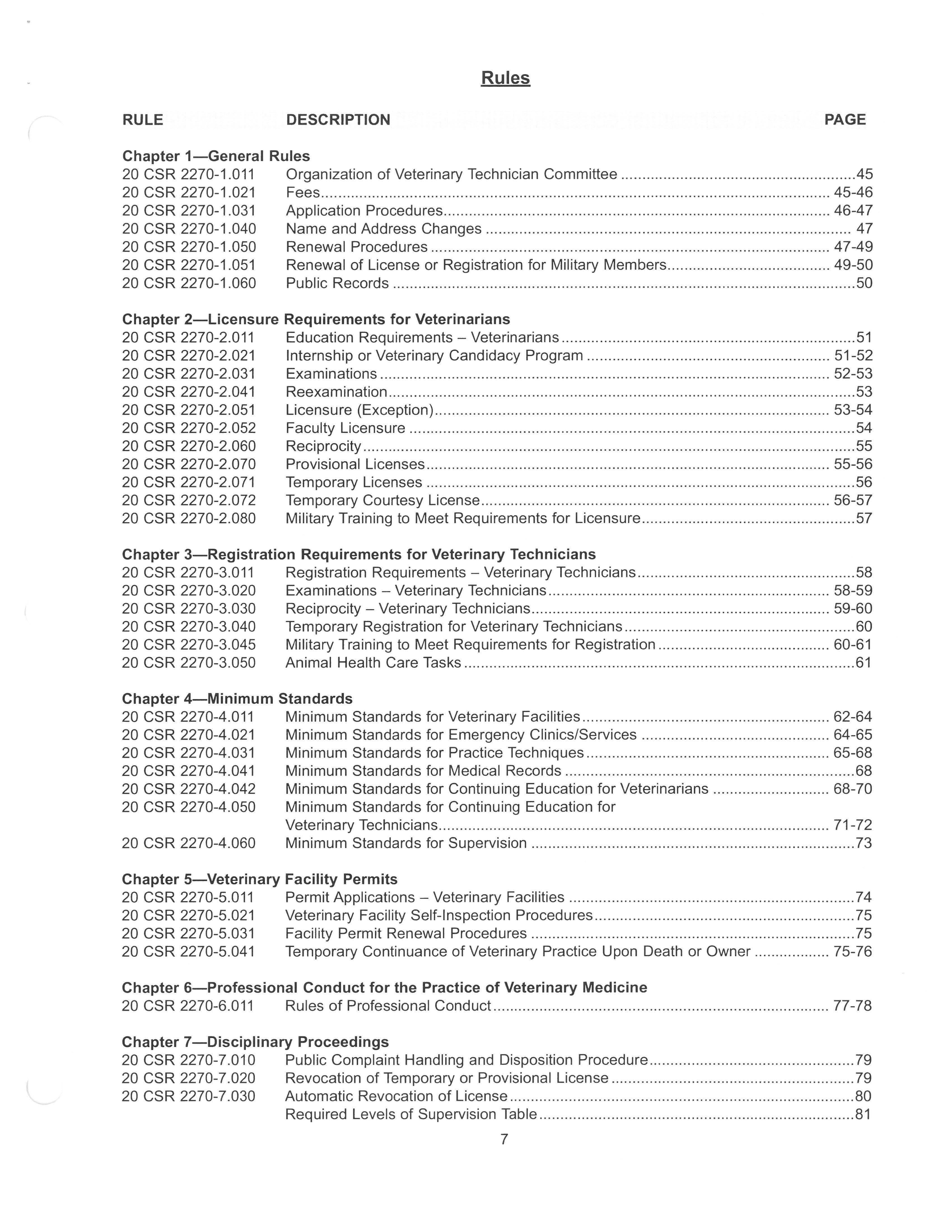
RULE DESCRIPTION PAGE Chapter 1-General Rules 20 CSR 2270-1.011 Organization of Veterinary Technician Committee .45 20 CSR 2270-1.021 Fees 45-46 20 CSR 2270-1.031 Application Procedures 46-47 20 CSR 2270-1.040 Name and Address Changes 47 20 CSR 2270-1.050 Renewal Procedures .......................... ..................................................................... 47-49 20 CSR 2270-1.051 Renewal of License or Registration for Military Members 49-50 20 CSR 2270-1.060 Public Records 50 Chapter 2-Licensure Requirements for Veterinarians 20 CSR 2270-2.011 Education Requirements- Veterinarians 51 20 CSR 2270-2.021 Internship or Veterinary Candidacy Program 51-52 20 CSR 2270-2.031 Examinations ........................................................................................................... 52-53 20 CSR 2270-2.041 Reexamination 53 20 CSR 2270-2.051 Licensure (Exception) 53-54 20 CSR 2270-2.052 Faculty Licensure ..........................................................................................................54 20 CSR 2270-2.060 Reciprocity 55 20 CSR 2270-2.070 Provisional Licenses 55-56 20 CSR 2270-2.071 Temporary Licenses 56 20 CSR 2270-2.072 Temporary Courtesy License 56-57 20 CSR 2270-2.080 Military Training to Meet Requirements for Licensure 57 Chapter 3-Registration Requirements for Veterinary Technicians 20 CSR 2270-3.011 Registration Requirements- Veterinary Technicians 58 20 CSR 2270-3.020 Examinations -Veterinary Technicians ................................. ........ .......................... 58-59 20 CSR 2270-3.030 Reciprocity- Veterinary Technicians 59-60 20 CSR 2270-3.040 Temporary Registration for Veterinary Technicians 60 20 CSR 2270-3.045 Military Training to Meet Requirements for Registration ......................................... 60-61 20 CSR 2270-3.050 Animal Health Care Tasks 61 Chapter 4-Minimum Standards 20 CSR 2270-4.011 Minimum Standards for Veterinary Facilities 62-64 20 CSR 2270-4.021 Minimum Standards for Emergency Clinics/Services 64-65 20 CSR 2270-4.031 Minimum Standards for Practice Techniques 65-68 20 CSR 2270-4.041 Minimum Standards for Medical Records 68 20 CSR 2270-4.042 Minimum Standards for Continuing Education for Veterinarians ............................ 68-70 20 CSR 2270-4.050 Minimum Standards for Continuing Education for Veterinary Technicians 71-72 20 CSR 2270-4.060 Minimum Standards for Supervision .............. ... .. .. ........................................................ 73 Chapter 5-Veterinary Facility Permits 20 CSR 2270-5.011 Permit Applications- Veterinary Facilities 74 20 CSR 2270-5.021 Veterinary Facility Self-Inspection Procedures .75 20 CSR 2270-5.031 Facility Permit Renewal Procedures 75 20 CSR 2270-5.041 Temporary Continuance of Veterinary Practice Upon Death or Owner .................. 75-76 Chapter 6-Professional Conduct for the Practice of Veterinary Medicine 20 CSR 2270-6.011 Rules of Professional Conduct. 77-78 Chapter 7-Disciplinary Proceedings 20 CSR 2270-7.010 Public Complaint Handling and Disposition Procedure 79 20 CSR 2270-7.020 Revocation of Temporary or Provisional License 79 20 CSR 2270-7.030 Automatic Revocation of License 80 Required Levels of Supervision Table 81 7
Rules

STATUTES
CHAPTER 340
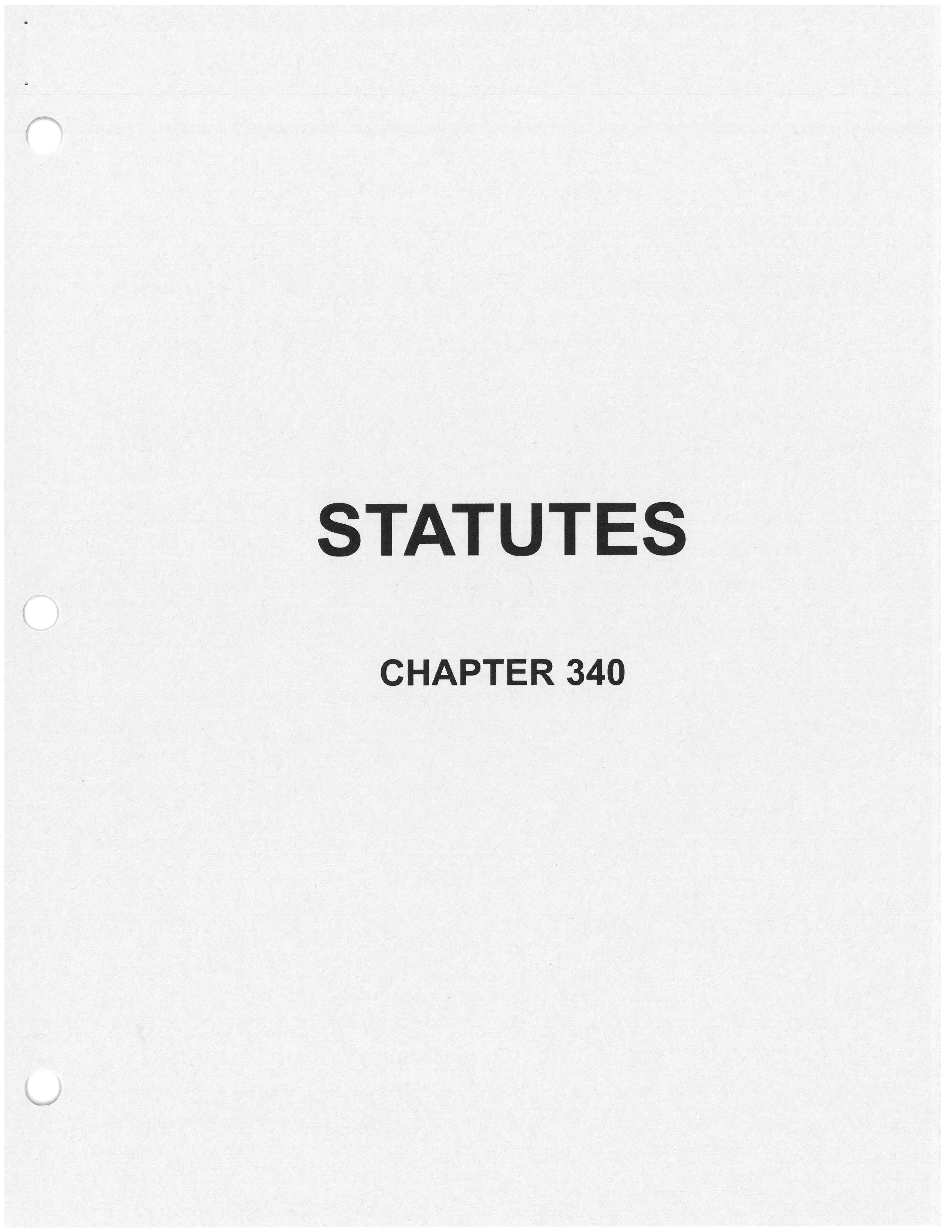

CHAPTER 340 MISSOURI VETERINARY MEDICAL BOARD
340. 200. Definitions. When used in sections 340.200 to 340.330, the following terms mean :
(1) "Accredited school of veterinary medicine", any veterinary college or division of a university or college that offers the degree of doctor of veterinary medicine or its equivalent and is accredited by the American Veterinary Medical Association (AVMA);
(2) "Animal", any wild, exotic or domestic, living or dead animal or mammal other than man, including birds, fish and reptiles;
(3) "Applicant", an individual who files an application to be licensed to practice veterinary medicine or to be registered as a veterinary technician;
(4) "Appointed member of the board", regularly appointed members of the Missouri veterinary medical board, not including the state veterinarian who serves on the board ex officio;
(5) "Board", the Missouri veterinary medical board;
(6) "Consulting veterinarian", a veterinarian licensed in another state, country or territory who gives advice or demonstrates techniques to a licensed Missouri veterinarian or group of licensed Missouri veterinarians;
(7) "ECFVG certificate", a certificate issued by the American Veterinary Medical Association Educational Commission for Foreign Veterinary Graduates or its successor. The certificate must indicate that the holder of the certificate has demonstrated knowledge and skill equivalent to that possessed by a graduate of an accredited school of veterinary medicine;
(8) "Emergency", when an animal has been placed in a life-threatening condition and immediate treatment is necessary to sustain life or where death is imminent and action is necessary to relieve pain or suffering ;
(9) "Faculty member", full professors, assistant professors, associate professors , clinical instructors and residents but does not include interns or adjunct appointments;
(1 0) "Foreign veterinary graduate", any person, including foreign nationals and American citizens, who has received a professional veterinary medical degree from an AVMA listed veterinary college located outside the boundaries of the United States, its territories or Canada , that is not accredited by the AVMA;
(11) "license", any permit, approval, registration or certificate issued or renewed by the board;
(12) "Licensed veterinarian", an individual who is validly and currently licensed to practice veterinary medicine in Missouri as determined by the board in accordance with the requirements and provisions of sections 340.200 to 340.330;
(13) "Minimum standards", standards as set by board rule and which establish the minimum requirements for the practice of veterinary medicine in the state of Missouri as are consistent with the intent and purpose of sections 340.200 to 340.330;
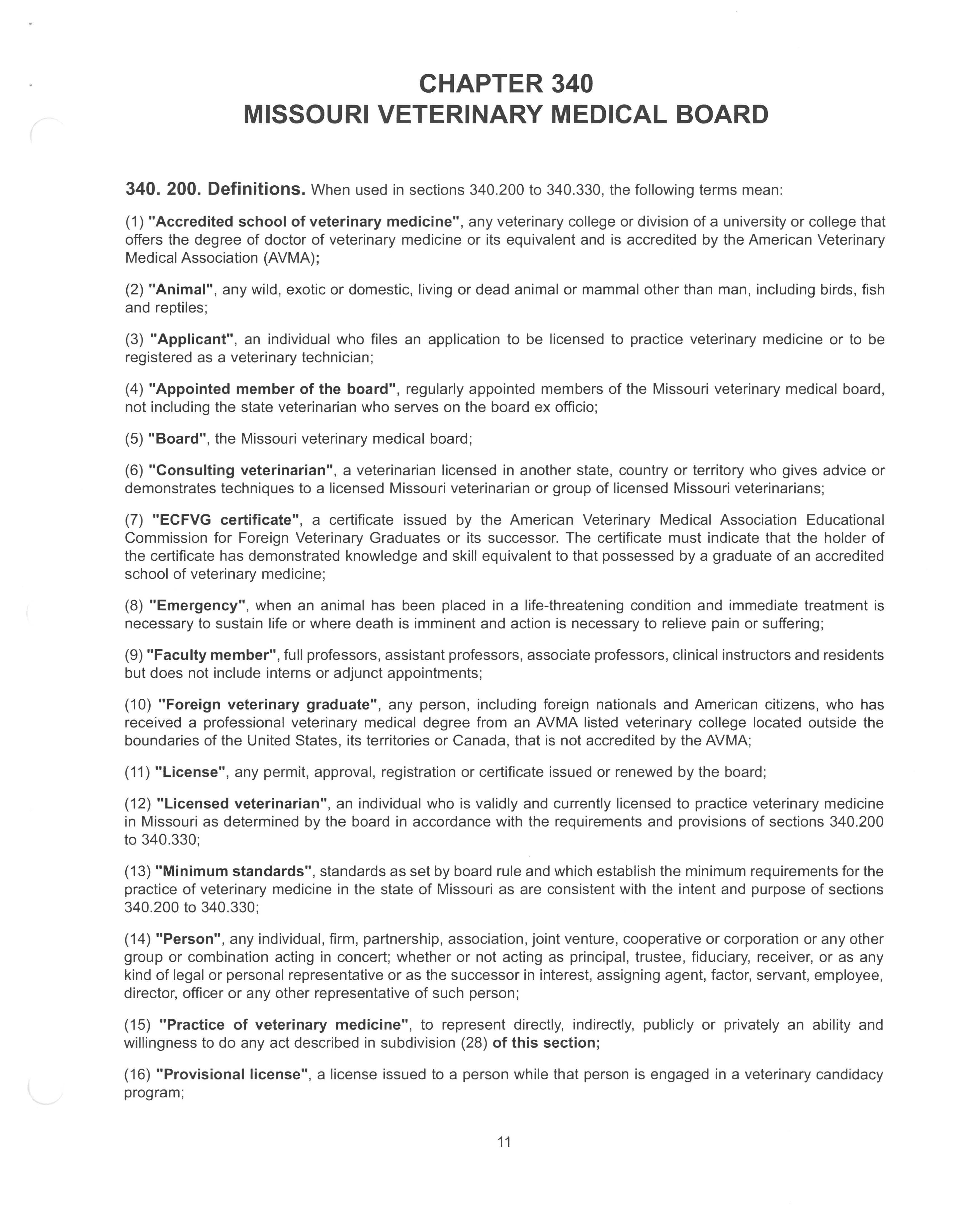
(14) "Person", any individual, firm, partnership, association, joint venture, cooperative or corporation or any other group or combination acting in concert; whether or not acting as principal , trustee , fiduciary, receiver, or as any kind of legal or personal representative or as the successor in interest, assigning agent, factor, servant, employee, director, officer or any other representative of such person;
(15) "Practice of veterinary medicine", to represent directly, indirectly, publicly or privately an ability and willingness to do any act described in subdivision (28) of this section;
(16) "Provisional license", a license issued to a person while that person is engaged in a veterinary candidacy program;
11
(17) "Registered veterinary technician", a person who is formally trained for the specific purpose of assisting a licensed veterinarian with technical services under the appropriate level of supervision as is consistent with the particular delegated animal health care task;
(18) "Supervision":
(a) "Immediate supervision", the licensed veterinarian is in the immediate area and within audible and visual range of the animal patient and the person treating the patient;
(b) "Direct supervision", the licensed veterinarian is on the premises where the animal is being treated and is quickly and easily available and the animal has been examined by a licensed veterinarian at such times as acceptable veterinary medical practice requires consistent with the particular delegated animal health care task;
(c) "Indirect supervision", the licensed veterinarian need not be on the premises but has given either written or oral instructions for the treatment of the animal patient or treatment protocol has been established and the animal has been examined by a licensed veterinarian at such times as acceptable veterinary medical practice requires consistent with the particular delegated health care task; provided that the patient is not in a surgical plane of anesthesia and the licensed veterinarian is available for consultation on at least a daily basis;
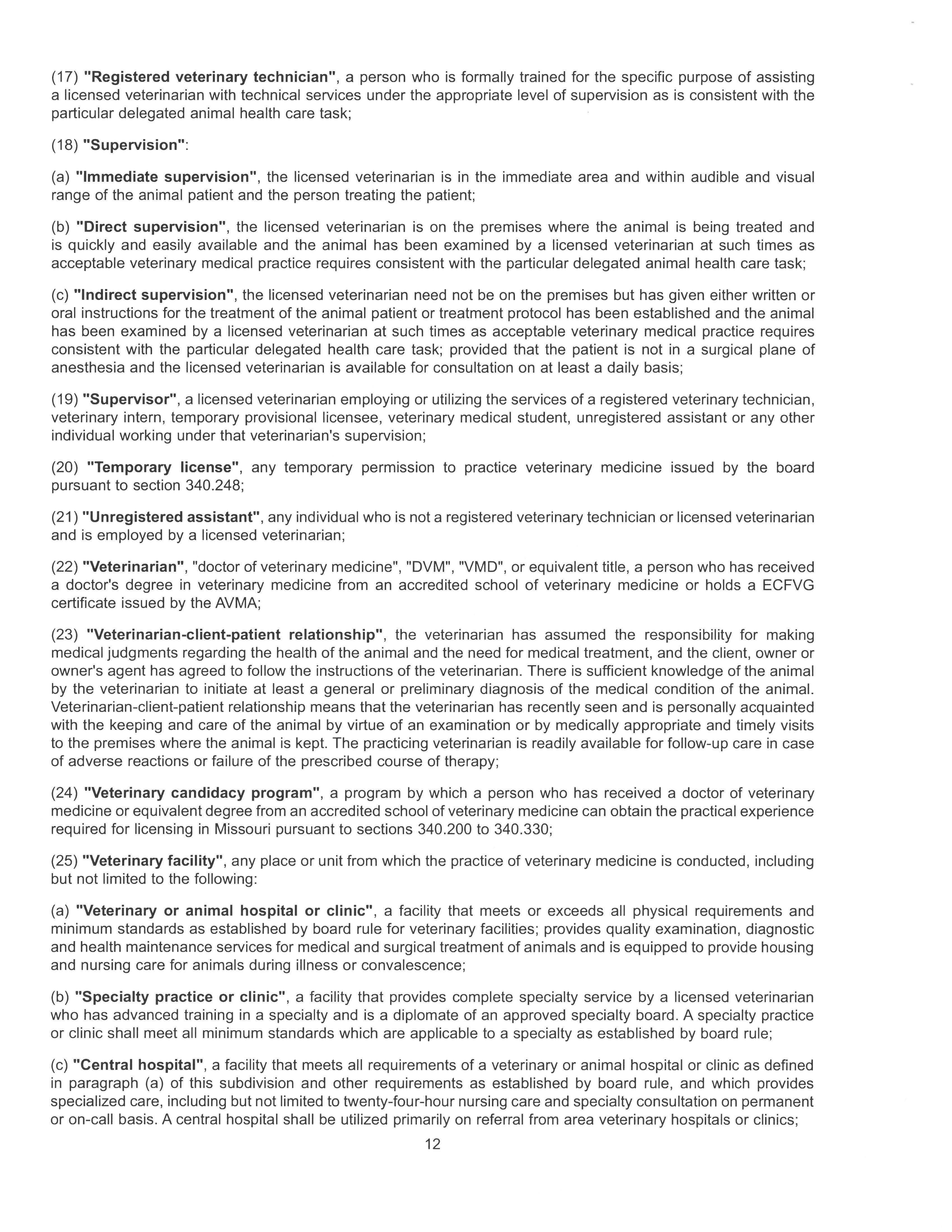
(19) "Supervisor", a licensed veterinarian employing or utilizing the services of a registered veterinary technician, veterinary intern, temporary provisional licensee, veterinary medical student, unregistered assistant or any other individual working under that veterinarian's supervision;
(20) "Temporary license", any temporary permission to practice veterinary medicine issued by the board pursuant to section 340.248;
(21) "Unregistered assistant", any individual who is not a registered veterinary technician or licensed veterinarian and is employed by a licensed veterinarian;
(22) "Veterinarian", "doctor of veterinary medicine", "DVM", "VMD", or equivalent title, a person who has received a doctor's degree in veterinary medicine from an accredited school of veterinary medicine or holds a ECFVG certificate issued by the AVMA;
(23) "Veterinarian-client-patient relationship", the veterinarian has assumed the responsibility for making medical judgments regarding the health of the animal and the need for medical treatment, and the client, owner or owner's agent has agreed to follow the instructions of the veterinarian. There is sufficient knowledge of the animal by the veterinarian to initiate at least a general or preliminary diagnosis of the medical condition of the animal. Veterinarian-client-patient relationship means that the veterinarian has recently seen and is personally acquainted with the keeping and care of the animal by virtue of an examination or by medically appropriate and timely visits to the premises where the animal is kept. The practicing veterinarian is readily available for follow-up care in case of adverse reactions or failure of the prescribed course of therapy;
(24) "Veterinary candidacy program", a program by which a person who has received a doctor of veterinary medicine or equivalent degree from an accredited school of veterinary medicine can obtain the practical experience required for licensing in Missouri pursuant to sections 340.200 to 340.330;
(25) "Veterinary facility", any place or unit from which the practice of veterinary medicine is conducted, including but not limited to the following:
(a) "Veterinary or animal hospital or clinic", a facility that meets or exceeds all physical requirements and minimum standards as established by board rule for veterinary facilities; provides quality examination, diagnostic and health maintenance services for medical and surgical treatment of animals and is equipped to provide housing and nursing care for animals during illness or convalescence;
(b) "Specialty practice or clinic", a facility that provides complete specialty service by a licensed veterinarian who has advanced training in a specialty and is a diplomate of an approved specialty board. A specialty practice or clinic shall meet all minimum standards which are applicable to a specialty as established by board rule;
(c) "Central hospital", a facility that meets all requirements of a veterinary or animal hospital or clinic as defined in paragraph (a) of this subdivision and other requirements as established by board rule, and which provides specialized care, including but not limited to twenty-four-hour nursing care and specialty consultation on permanent or on-call basis. A central hospital shall be utilized primarily on referral from area veterinary hospitals or clinics; 12
(d) "Satellite, outpatient or mobile small animal clinic", a supportive facility owned by or associated with and has ready access to a full-service veterinary hospital or clinic or a central hospital providing all mandatory services and meeting all physical requirements and minimum standards as established by sections 340 200 to 340.330 or by board rule;
(e) "Large animal mobile clinic", a facility that provides examination, diagnostic and preventive medicine and minor surgical services for large animals not requiring confinement or hospitalization;
(f) "Emergency clinic", a facility establ ished to receive patients and to treat illnesses and injuries of an emergency nature;
(26) "Veterinary candidate", a person who has received a doctor of veterinary medicine or equivalent degree from an accredited school or college of veterinary medicine and who is working under the supervision of a boardapproved licensed veterinarian;
(27) "Veterinary intern", a person who has received a doctor of veterinary medicine or equivalent degree from an accredited school or college of veterinary medicine and who is participating in additional clinical training in veterinary medicine to prepare for AVMA-recognized certification or specialization;
(28) "Veterinary medicine", the science of diagnosing, treating, changing, alleviating, rectifying, curing or preventing any animal disease, deformity, defect, injury or other physical or mental condition, including , but not limited to, the prescription or administration of any drug, medicine, biologic, apparatus, application, anesthesia or other therapeutic or diagnostic substance or technique on any animal, including , but not limited to, acupuncture, dentistry, animal psychology, animal chiropractic, theriogenology, surgery, both general and cosmetic surgery, any manual, mechanical, biological or chemical procedure for testing for pregnancy or for correcting sterility or infertility or to render service or recommendations with regard to any of the procedures in this paragraph;
(29) "Veterinary student preceptee", a person who is pursuing a veterinary degree in an accredited school of veterinary medicine which has a preceptor program and who has completed the academic requirements of such program.
(L 1992 H.B 878 § 1, A.L 1999 S.B 424, A.L 2004 H B. 869)
340.202. Missouri veterinary medical board created--members--vacancies, how filled--
public member--terms.
1. There is hereby created a board to be known as the "Missouri Veterinary Medical Board". The board shall consist of the state veterinarian, who shall serve ex officio, and five appointed members, including a voting public member. Not more than three of the appointed members shall be of the same political party. Each appointed member, other than the public member, of the board shall be a United States citizen, a taxpaying resident of the state of Missouri for one year, a graduate of an accredited school of veterinary medicine, and shall have been lawfully engaged in the actual practice of veterinary medicine in the state of Missouri for no less than five years next preceding the date of the member's* appointment.
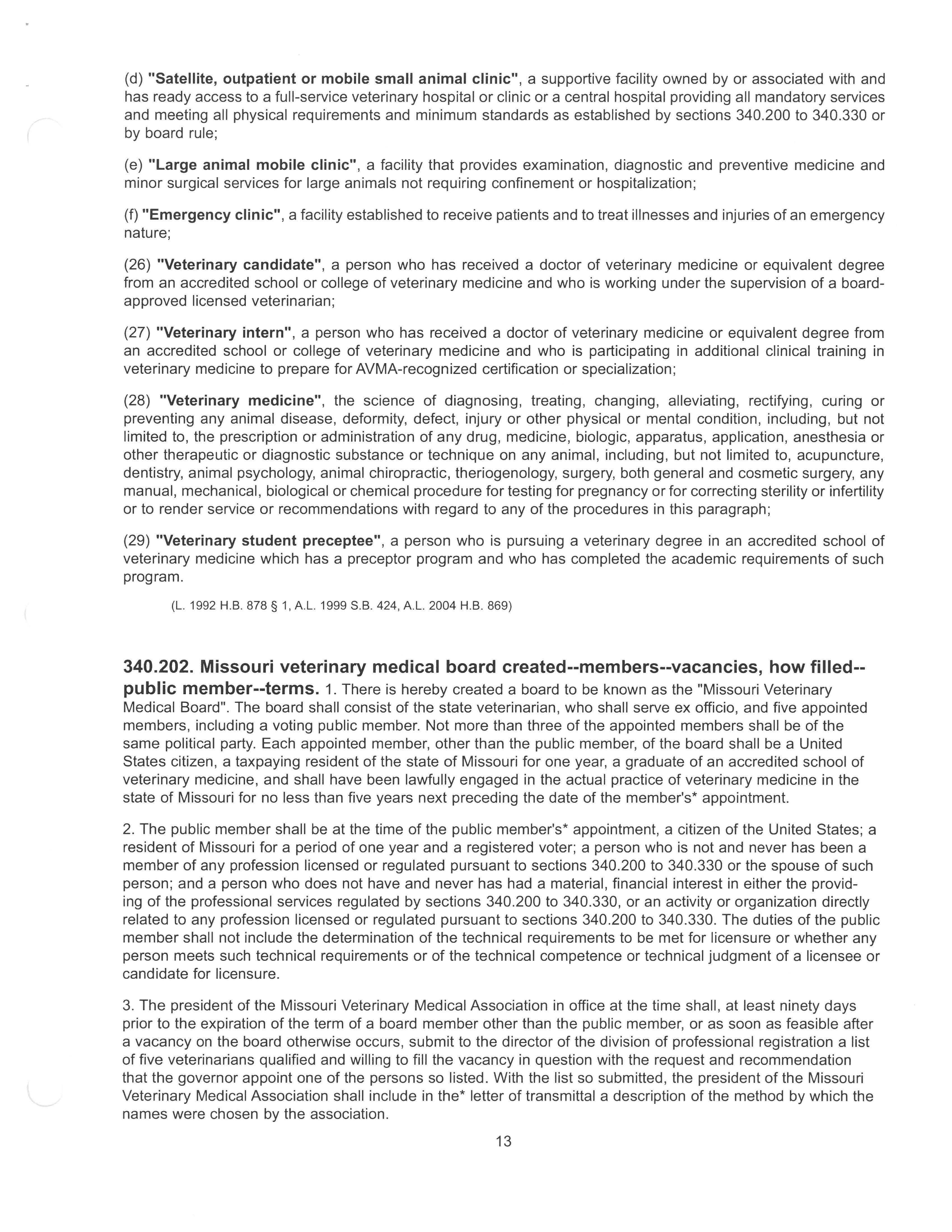
2. The public member shall be at the time of the public member's* appointment, a citizen of the United States; a resident of Missouri for a period of one year and a registered voter; a person who is not and never has been a member of any profession licensed or regulated pursuant to sections 340.200 to 340.330 or the spouse of such person; and a person who does not have and never has had a material, financial interest in either the providing of the professional services regulated by sections 340.200 to 340.330, or an activity or organization directly related to any profession licensed or regulated pursuant to sections 340.200 to 340.330. The duties of the public member shall not include the determination of the technical requirements to be met for licensure or whether any person meets such technical requirements or of the technical competence or technical judgment of a licensee or candidate for licensure.
3. The president of the Missouri Veterinary Medical Association in office at the time shall, at least ninety days prior to the expiration of the term of a board member other than the public member, or as soon as feasible after a vacancy on the board otherwise occurs, submit to the director of the division of professional registration a list of five veterinarians qualified and willing to fill the vacancy in question with the request and recommendation that the governor appoint one of the persons so listed. With the list so submitted , the president of the Missouri Veterinary Medical Association shall include in the* letter of transmittal a description of the method by which the names were chosen by the association.
13
4. All members, including the public member, shall be chosen from lists submitted by the director of the division of professional registration. All appointments shall be made by the governor with the advice and consent of the senate. Before entering into the* term of office , each member shall file a written oath to discharge the member's* official duties in a faithful manner with the secretary of state.
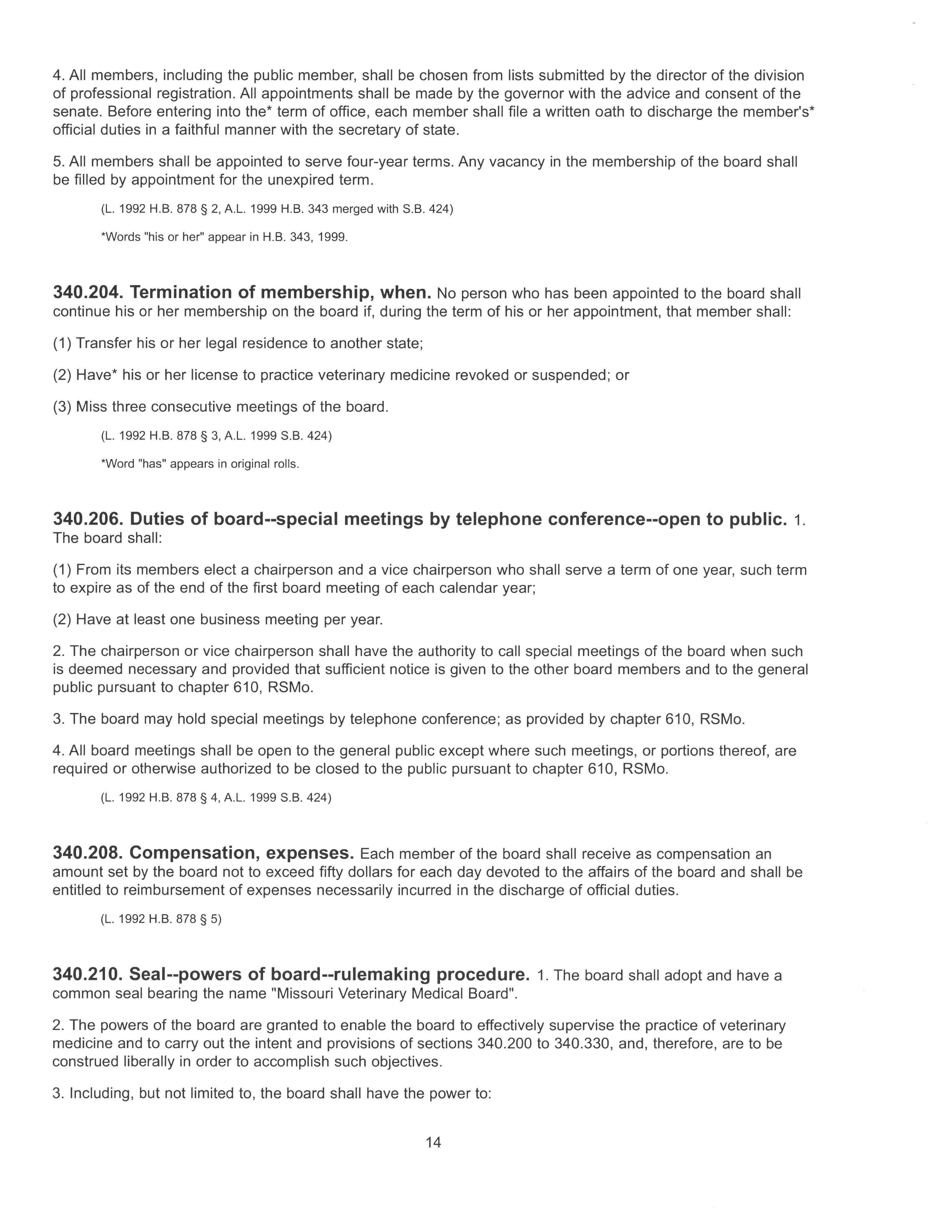
5. All members shall be appointed to serve four-year terms. Any vacancy in the membership of the board shall be filled by appointment for the unexpired term.
(L 1992 H B. 878 § 2, A L 1999 H.B. 343 merged with S.B. 424)
*Words "his or her" appear in H B. 343, 1999.
340.204. Termination of membership, when. No person who has been appointed to the board shall continue his or her membership on the board if, during the term of his or her appointment, that member shall:
(1) Transfer his or her legal residence to another state;
(2) Have* his or her license to practice veterinary medicine revoked or suspended; or
(3) Miss three consecutive meetings of the board.
(L 1992 H B 878 § 3, A.L 1999 S.B. 424)
*Word "has" appears in original rolls
340.206. Duties of board--special meetings by telephone conference--open to public. 1. The board shall:
(1) From its members elect a chairperson and a vice chairperson who shall serve a term of one year, such term to expire as of the end of the first board meeting of each calendar year;
(2) Have at least one business meeting per year.
2. The chairperson or vice chairperson shall have the authority to call special meetings of the board when such is deemed necessary and provided that sufficient notice is given to the other board members and to the general public pursuant to chapter 610, RSMo.
3. The board may hold special meetings by telephone conference; as provided by chapter 610, RSMo.
4. All board meetings shall be open to the general public except where such meetings, or portions thereof, are required or otherwise authorized to be closed to the public pursuant to chapter 610, RSMo.
(L 1992 H.B. 878 § 4, A.L. 1999 S B. 424)
340.208. Compensation, expenses. Each member of the board shall receive as compensation an amount set by the board not to exceed fifty dollars for each day devoted to the affairs of the board and shall be entitled to reimbursement of expenses necessarily incurred in the discharge of official duties
(L 1992 H B. 878 § 5)
340.210. Seal--powers of board--rulemaking procedure. 1 The board shall adopt and have a common seal bearing the name "Missouri Veterinary Medical Board".
2. The powers of the board are granted to enable the board to effectively supervise the practice of veterinary medicine and to carry out the intent and provisions of sections 340.200 to 340.330, and, therefore, are to be construed liberally in order to accomplish such objectives.
3. Including, but not limited to, the board shall have the power to:
14
(1) Examine and determine the qualifications and fitness of applicants for a license to practice veterinary medicine in this state;
(2) Issue, renew, deny, suspend, revoke, or place on probation any license, certificate, authority or permit to practice or assist in the practice of veterinary medicine in this state, or to otherwise discipline or assess civil monetary penalties or order restitution, or other actions consistent with the provisions of sections 340.200 to 340.330 and the rules adopted thereunder;
(3) Conduct investigations of complaints or other investigations as deemed necessary by the board for the purpose of discovering violations of* sections 340.200 to 340.330 or grounds for disciplining any person licensed or regulated under sections 340.200 to 340.330, and to contract for or appoint persons or committees to assist in such investigations;
(4) Hold hearings, issue subpoenas and take testimony bearing on the records of applicants for licensing or licensees who may be under consideration by the board for discipline and to issue final orders of the board on such matters that come before the board;
(5) Issue permits to and, upon complaint by any person, inspect any veterinary facility utilized by any practicing veterinarian or from which the practice of veterinary medicine is conducted. Such inspection shall not include any vehicle used in the practice of veterinary medicine, unless the board has received a complaint regarding such vehicle, then the board may inspect the vehicle. Such inspection shall be made by the board, a board member or other authorized representatives as appointed by the board. The results of the inspection shall be reported to the board, on forms prescribed by the board, the purpose of which shall be to ensure compliance with the provisions of sections 340.200 to 340.330 or board rules promulgated thereunder for such facilities or for seeking disciplinary action in all instances where the board has reason to believe there are or may be violations of such provisions or rules;
(6) Provide registration for veterinary technicians, temporary licensees and provisional licensees and to adopt rules concerning the training, supervision and service limits, and continuing education of such persons while employed or acting under the supervision of licensed veterinarians and to have exclusive jurisdiction in determining the eligibility and qualification requirements and in granting or refusing to grant any registration, certificate or license for any such person or to discipline any person so registered or licensed under the provisions of sections 340.200 to 340.330 or by board rule;
(7) Fix by board rule minimum standards for, but not limited to, the practice of veterinary medicine, medical records, emergency services, radiological services, dispensed drug labeling, nursing care, veterinary facilities, sanitation and sterilization, veterinarian-client-patient relationships, and continuing education;
(8) Employ full- or part-time personnel, including an executive director, professional, clerical or special personnel as necessary to effectuate the provisions of sections 340.200 to 340 330 and to rent or purchase any necessary space, equipment and supplies within available appropriations;
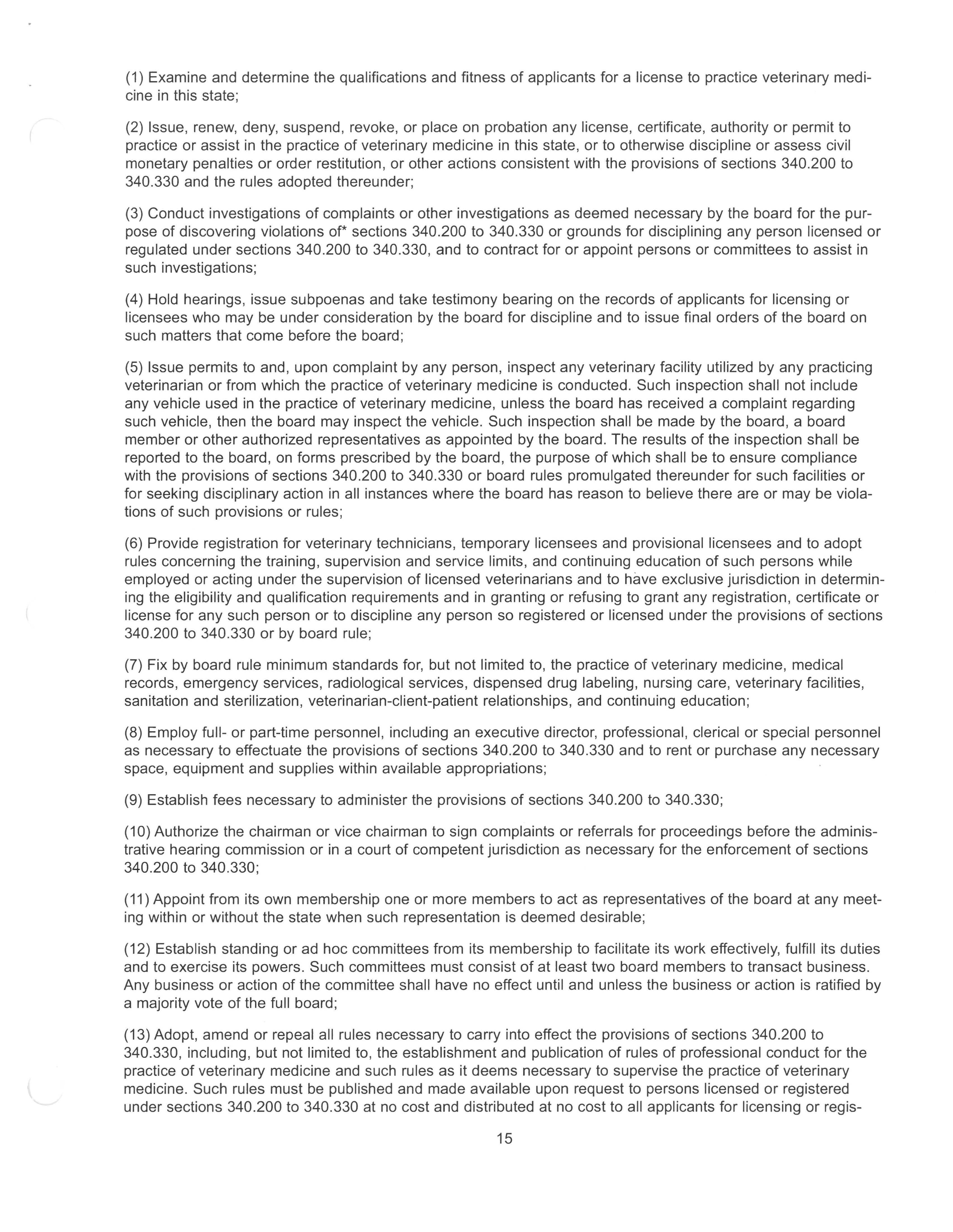
(9) Establish fees necessary to administer the provisions of sections 340.200 to 340.330;
(10) Authorize the chairman or vice chairman to sign complaints or referrals for proceedings before the administrative hearing commission or in a court of competent jurisdiction as necessary for the enforcement of sections 340.200 to 340.330;
(11) Appoint from its own membership one or more members to act as representatives of the board at any meeting within or without the state when such representation is deemed desirable;
(12) Establish standing or ad hoc committees from its membership to facilitate its work effectively, fulfill its duties and to exercise its powers. Such committees must consist of at least two board members to transact business. Any business or action of the committee shall have no effect until and unless the business or action is ratified by a majority vote of the full board;
(13) Adopt, amend or repeal all rules necessary to carry into effect the provisions of sections 340.200 to 340.330, including, but not limited to, the establishment and publication of rules of professional conduct for the practice of veterinary medicine and such rules as it deems necessary to supervise the practice of veterinary medicine. Such rules must be published and made available upon request to persons licensed or registered under sections 340.200 to 340.330 at no cost and distributed at no cost to all applicants for licensing or regis-
15
tration under sections 340.200 to 340.330. Any proposed rulemaking, revision or amendment thereto, shall be accomplished in accordance with the requirements and provisions of chapter 536, RSMo;
(14) Assist the attorney general in any proper action to oust from practice unlawful practitioners or remove from practice licensed or registered persons in violation of any provision of sections 340.200 to 340.330 or board rule and assist with any prosecution for criminal violations of sections 340.200 to 340.330; and
(15) Enter into contracts with any entity, public or private, for the purpose of having examinations prepared, graded, evaluated, proctored, or for any other examination service deemed desirable or necessary by the board.
4. No rule or portion of a rule promulgated under the authority of this chapter shall become effective unless it has been promulgated pursuant to the provisions of chapter 536, RSMo.
(L. 1992 H.B. 878 § 6, A.L. 1993 S.B. 52, A.L. 1995 S.B 3, A.L. 1999 S.B. 424)
*Word "of' does not appear in original rolls
340.212. Record of board proceedings--list of persons licensed, suspended, revoked, disciplined, forwarding of lists--reports of final disciplinary actions--immunity.
1. The board shall cause the executive director to prepare and maintain a written record of all board proceedings whether or not such proceedings are formal, informal, open or closed to the public. All records so prepared and maintained and other documents or reports incorporated therein shall be open to the public except where specifically required or allowed to be closed to the public pursuant to chapter 610, RSMo.
2. Other provisions of section 324.001, RSMo, to the contrary notwithstanding, the board shall publish a list of the names and addresses of all persons who hold licenses under the provisions of sections 340.200 to 340.330, and shall publish a list of all persons whose licenses have been suspended, revoked, surrendered, restricted, denied, withheld, or otherwise disciplined, whether voluntarily or not. The board shall mail a copy of such list to any person, agency or professional association upon request and payment of a fee necessary for photocopying and postage as established by board rule. The board may forward such lists at no charge and upon its own motion for the purpose of voluntary interstate exchange of information or to other administrative or law enforcement agencies acting within the scope of their statutory authority, whether the same be interstate or intrastate.
3. Other provisions of section 324.001, RSMo, to the contrary notwithstanding, the board shall prepare and make available to the public a report upon the final disciplinary actions taken by the board or denial of licensure. Such report shall set forth findings of fact, grounds for such denial or discipline, names of board members who were present, and any resulting order or directive of the board; the same to apply whether or not discipline or denial is voluntarily agreed to by the licensee or applicant. Whenever a person possessing a license voluntarily enters chemical or alcohol treatment and monitoring programs for purposes of rehabilitation by informal agreement with the board, the action shall not be reported with any other actions taken or agreed to between the board and the licensee or applicant.
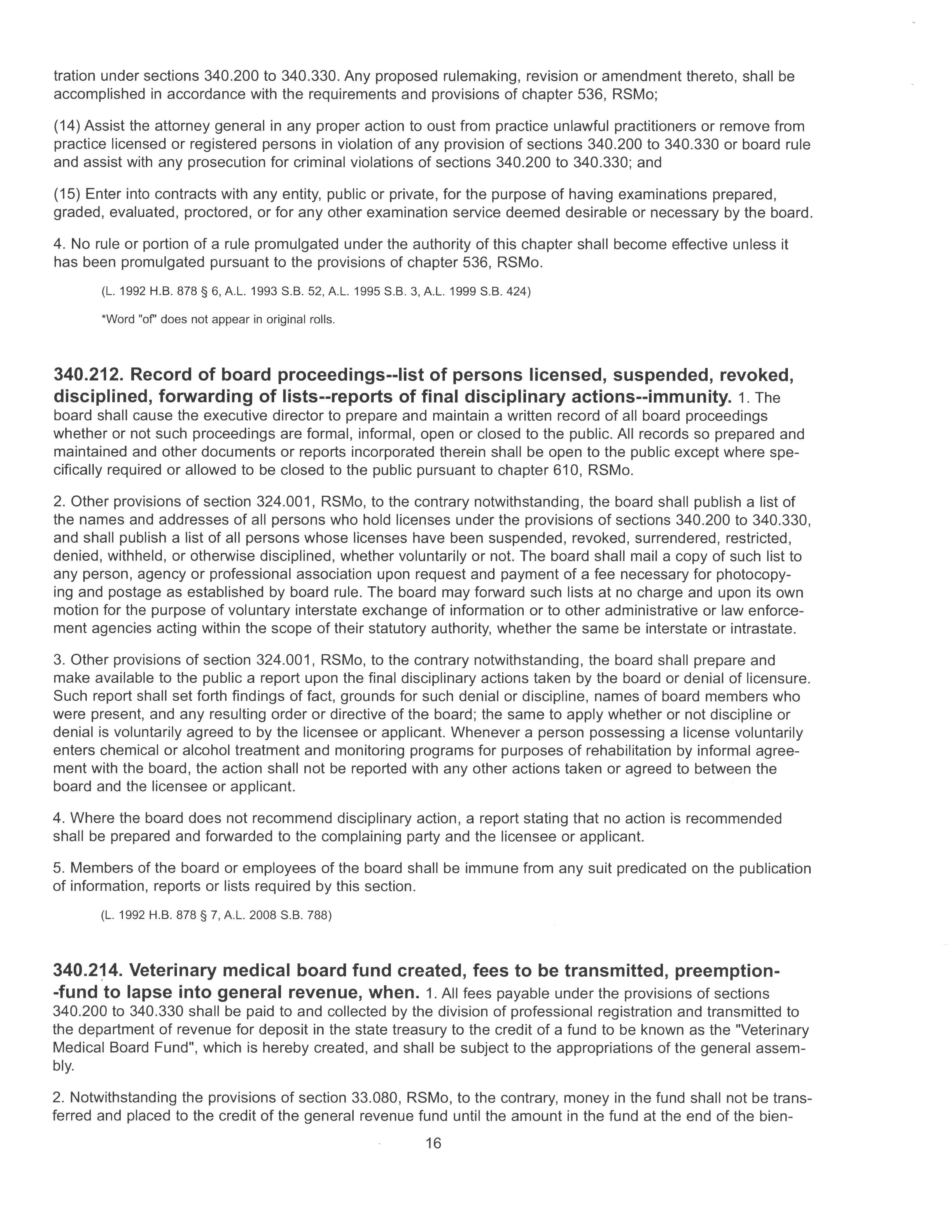
4. Where the board does not recommend disciplinary action, a report stating that no action is recommended shall be prepared and forwarded to the complaining party and the licensee or applicant.
5. Members of the board or employees of the board shall be immune from any suit predicated on the publication of information, reports or lists required by this section.
(L. 1992 H.B. 878 § 7, A.L 2008 S.B. 788)
Veterinary medical board fund created, fees to be transmitted, preemption-fund to lapse into general revenue, when. 1. All fees payable under the provisions of sections 340.200 to 340.330 shall be paid to and collected by the division of professional registration and transmitted to the department of revenue for deposit in the state treasury to the credit of a fund to be known as the "Veterinary Medical Board Fund", which is hereby created, and shall be subject to the appropriations of the general assembly.
2. Notwithstanding the provisions of section 33.080, RSMo, to the contrary, money in the fund shall not be transferred and placed to the credit of the general revenue fund until the amount in the fund at the end of the bien-
16
nium exceeds two times the amount of the appropriation from the board's funds for the preceding fiscal year or, if the board requires by rule permit renewal less frequently than yearly, then three times the appropriation from the board's funds for the preceding fiscal year. The amount, if any, in the fund which shall lapse is that amount in the fund which exceeds the appropriate multiple of the appropriations to the board for the preceding fiscal year.
3. The fees prescribed by sections 340.200 to 340.330 shall be exclusive, and notwithstanding any other provision of law, no municipality may require any person licensed under the provisions of sections 340.200 to 340.330 to furnish any bond, pass any examination, or pay any license fee or occupational tax relative to practicing his or her profession.
(L. 1992 H B. 878 § 8, A.L. 1993 H.B 127, A L. 1999 S.B. 424)
340. 216. Practice without license prohibited, prohibited acts--exceptions.
1. It is unlawful for any person not licensed as a veterinarian under the provisions of sections 340.200 to 340.330 to practice veterinary medicine or to do any act which requires knowledge of veterinary medicine for valuable consideration, or for any person not so licensed to hold himself or herself out to the public as a practitioner of veterinary medicine by advertisement, the use of any title or abbreviation with the person's name, or otherwise; except that nothing in sections 340.200 to 340.330 shall be construed as prohibiting:
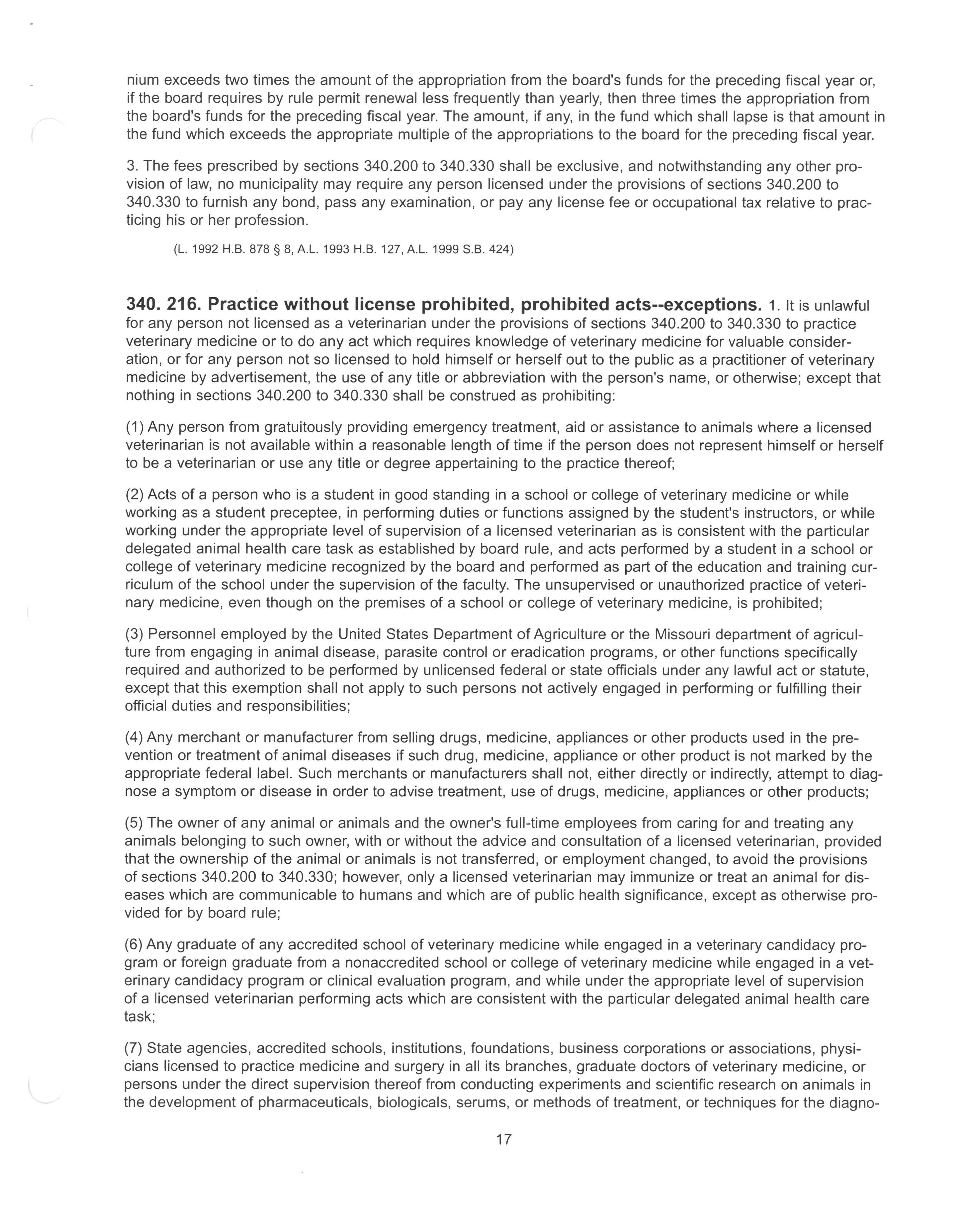
(1) Any person from gratuitously providing emergency treatment, aid or assistance to animals where a licensed veterinarian is not available within a reasonable length of time if the person does not represent himself or herself to be a veterinarian or use any title or degree appertaining to the practice thereof;
(2) Acts of a person who is a student in good standing in a school or college of veterinary medicine or while working as a student preceptee, in performing duties or functions assigned by the student's instructors, or while working under the appropriate level of supervision of a licensed veterinarian as is consistent with the particular delegated animal health care task as established by board rule, and acts performed by a student in a school or college of veterinary medicine recognized by the board and performed as part of the education and training curriculum of the school under the supervision of the faculty. The unsupervised or unauthorized practice of veterinary medicine, even though on the premises of a school or college of veterinary medicine, is prohibited;
(3) Personnel employed by the United States Department of Agriculture or the Missouri department of agriculture from engaging in animal disease, parasite control or eradication programs, or other functions specifically required and authorized to be performed by unlicensed federal or state officials under any lawful act or statute, except that this exemption shall not apply to such persons not actively engaged in performing or fulfilling their official duties and responsibilities;
(4) Any merchant or manufacturer from selling drugs, medicine, appliances or other products used in the prevention or treatment of animal diseases if such drug, medicine, appliance or other product is not marked by the appropriate federal label. Such merchants or manufacturers shall not, either directly or indirectly, attempt to diagnose a symptom or disease in order to advise treatment, use of drugs, medicine, appliances or other products;
(5) The owner of any animal or animals and the owner's full-time employees from caring for and treating any animals belonging to such owner, with or without the advice and consultation of a licensed veterinarian, provided that the ownership of the animal or animals is not transferred, or employment changed, to avoid the provisions of sections 340.200 to 340.330; however, only a licensed veterinarian may immunize or treat an animal for diseases which are communicable to humans and which are of public health significance, except as otherwise provided for by board rule;
(6) Any graduate of any accredited school of veterinary medicine while engaged in a veterinary candidacy program or foreign graduate from a nonaccredited school or college of veterinary medicine while engaged in a veterinary candidacy program or clinical evaluation program, and while under the appropriate level of supervision of a licensed veterinarian performing acts which are consistent with the particular delegated animal health care task;
(7) State agencies, accredited schools, institutions, foundations, business corporations or associations, physicians licensed to practice medicine and surgery in all its branches, graduate doctors of veterinary medicine, or persons under the direct supervision thereof from conducting experiments and scientific research on animals in the development of pharmaceuticals, biologicals, serums, or methods of treatment, or techniques for the diagno-
17
sis or treatment of human ailments, or when engaged in the study and development of methods and techniques directly or indirectly applicable to the problems of the practice of veterinary medicine;
(8) Any veterinary technician, duly registered by, and in good standing with, the board from administering medication , appliances or other products for the treatment of animals while under the appropriate level of supervision as is consistent with the delegated animal health care task; and
(9) A consulting veterinarian while working in a consulting capacity in Missouri while under the immediate supervision of a veterinarian licensed and in good standing under sections 340.200 to 340.330.
2. Nothing in sections 340.200 to 340.330 shall be construed as limiting the board's authority to provide other exemptions or exceptions to the requirements of licensing as the board may find necessary or appropriate under its rulemaking authority.
(L. 1992 H.B 878 § 9, A.L 1999 S B 424)
340.217. Practice of veterinary medicine across state lines defined--license not required, when. 1. No person registered as a veterinarian in Missouri shall engage in the practice of veterinary medicine, as authorized in this chapter, across state lines, except as herein provided.
2. For purposes of this chapter, the "practice of veterinary medicine across state lines" means:
(1) The rendering of a written or otherwise documented veterinary medical opinion concerning the diagnosis or treatment of a patient within this state by a veterinarian located outside this state as a result of transmission of individual patient data by electronic, telephonic, or other means from within this state or any other state to such veterinarian or veterinarian's agent; or
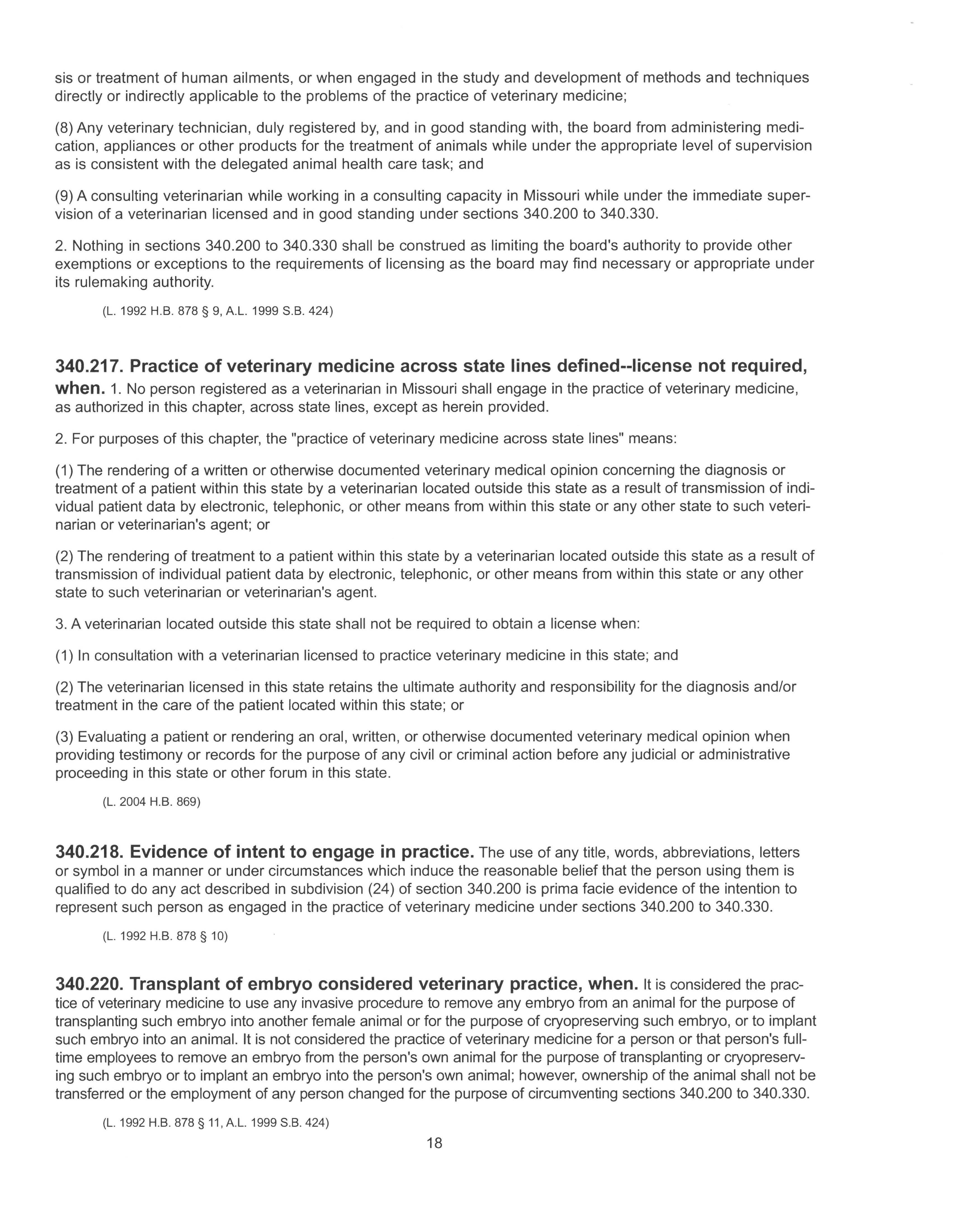
(2) The rendering of treatment to a patient within this state by a veterinarian located outside this state as a result of transmission of individual patient data by electronic, telephonic, or other means from within this state or any other state to such veterinarian or veterinarian's agent.
3. A veterinarian located outside this state shall not be required to obtain a license when :
(1) In consultation with a veterinarian licensed to practice veterinary medicine in this state; and
(2) The veterinarian licensed in this state retains the ultimate authority and responsibility for the diagnosis and/or treatment in the care of the patient located within this state; or
(3) Evaluating a patient or rendering an oral , written, or otherwise documented veterinary medical opinion when providing testimony or records for the purpose of any civil or criminal action before any judicial or administrative proceeding in this state or other forum in this state.
(L. 2004 H.B 869)
340.218. Evidence of intent to engage in practice. The use of any title, words, abbreviations, letters or symbol in a manner or under circumstances which induce the reasonable belief that the person using them is qualified to do any act described in subdivision (24) of section 340 200 is prima facie evidence of the intention to represent such person as engaged in the practice of veterinary medicine under sections 340.200 to 340.330.
(L. 1992 H B 878 § 10)
340.220. Transplant of embryo considered veterinary practice, when. It is considered the practice of veterinary medicine to use any invasive procedure to remove any embryo from an animal for the purpose of transplanting such embryo into another female animal or for the purpose of cryopreserving such embryo, or to implant such embryo into an animal. It is not considered the practice of veterinary medicine for a person or that person's fulltime employees to remove an embryo from the person's own animal for the purpose of transplanting or cryopreserving such embryo or to implant an embryo into the person's own animal; however, ownership of the animal shall not be transferred or the employment of any person changed for the purpose of circumventing sections 340.200 to 340.330.
(L. 1992 H B. 878 § 11 , A.L. 1999 S B 424)
18
340.222. Supervisor responsible and liable, when. A supervisor, as defined in subdivision (19) of section 340.200 , is individually and separately responsible and liable for the performance of the acts delegated to and the omissions of the veterinary technician , veterinary medical candidate , temporary licensee, veterinary med ical preceptee, unregistered assistant or any other individual working under his or her supervision. Nothing in this section shall be construed to relieve veterinary technicians, veterinary medical candidates, provisional licensees, temporary licensees, veterinary medical preceptees or unregistered assistants of any responsibility or liability for any of their own acts or omissions.
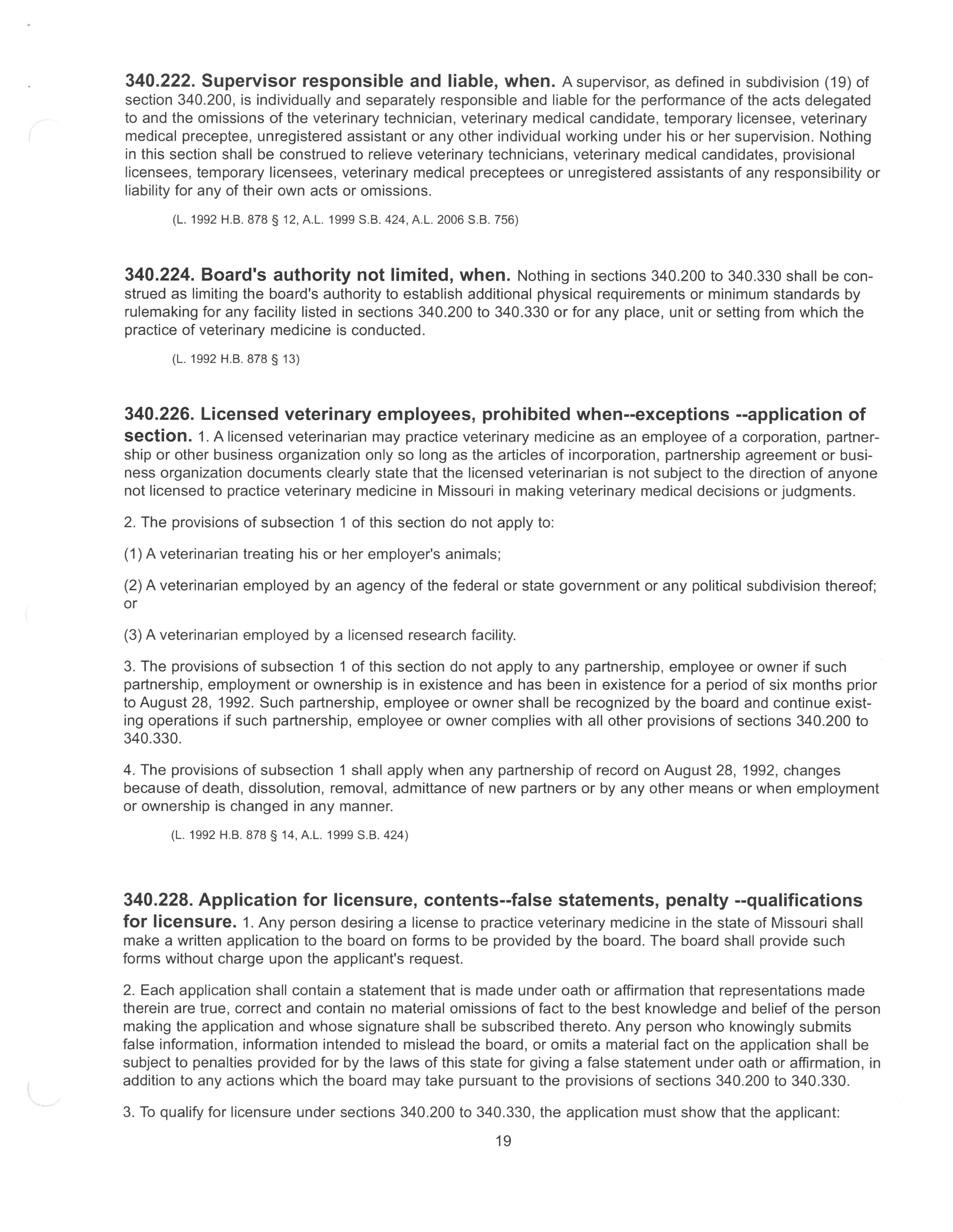
340.224. Board's authority not limited, when. Nothing in sections 340.200 to 340.330 shall be construed as limiting the board's authority to establish additional physical requirements or minimum standards by rulemaking for any facility listed in sections 340.200 to 340.330 or for any place, unit or setting from which the practice of veterinary medicine is conducted.
(L 1992 H B 878 § 13)
340.226. Licensed veterinary employees, prohibited when--exceptions --application of
section.
1. A licensed veterinarian may practice veterinary medicine as an employee of a corporation, partnership or other business organization only so long as the articles of incorporation, partnership agreement or business organization documents clearly state that the licensed veterinarian is not subject to the direction of anyone not licensed to practice veterinary medicine in Missouri in making veterinary medical decisions or judgments.
2. The provisions of subsection 1 of this section do not apply to:
(1) A veterinarian treating his or her employer's animals;
(2) A veterinarian employed by an agency of the federal or state government or any political subdivision thereof; or
(3) A veterinarian employed by a licensed research facility.
3. The provisions of subsection 1 of this section do not apply to any partnership , employee or owner if such partnership, employment or ownership is in existence and has been in existence for a period of six months prior to August 28 , 1992. Such partnership, employee or owner shall be recognized by the board and continue existing operations if such partnership, employee or owner complies with all other provisions of sections 340.200 to 340.330.
4 The provisions of subsection 1 shall apply when any partnership of record on August 28 , 1992, changes because of death, dissolution, removal, admittance of new partners or by any other means or when employment or ownership is changed in any manner.
(L. 1992 H B 878 § 14, A.L 1999 S B 424)
340.228. Application for licensure, contents--false statements, penalty --qualifications for licensure.
1 Any person desiring a license to practice veterinary medicine in the state of Missouri shall make a written application to the board on forms to be provided by the board. The board shall provide such forms without charge upon the applicant's request.
2. Each application shall contain a statement that is made under oath or affirmation that representations made therein are true, correct and contain no material omissions of fact to the best knowledge and belief of the person making the application and whose signature shall be subscribed thereto. Any person who knowingly submits false information , information intended to mislead the board, or omits a material fact on the application shall be subject to penalties provided for by the laws of this state for giving a false statement under oath or affirmation , in addition to any actions which the board may take pursuant to the provisions of sections 340.200 to 340.330
3. To qualify for licensure under sections 340.200 to 340.330, the appl ication must show that the applicant:
(L 1992 H B. 878 § 12, A L. 1999 S.B 424 , A.L 2006 S.B. 756)
19
(1) Is a person of good moral character;
(2) Is a graduate of an accredited school of veterinary medicine;
(3) Has completed a veterinary candidacy program after graduation under the supervision of a veterinarian licensed and in good standing in any state, territory or district of the United States. The supervising veterinarian shall submit an affidavit to the board stating that the applicant has satisfactorily completed the veterinary candidacy program. If the applicant submits satisfactory proof that he or she has completed a student preceptor program recognized and approved by the board before graduation, the board may waive the veterinary candidacy requirement; and
(4) Has passed an examination or examinations as prescribed by board rule. The examination or examinations shall be designed to test the examinee's knowledge of, and proficiency in, subjects and techniques commonly taught in schools of veterinary medicine, the requirements of sections 340.200 to 340.330, other related statutes and administrative rules and other material as determined by the board. An examinee must demonstrate scientific, practical and legal knowledge sufficient to establish for the board that the examinee is competent to practice veterinary medicine. The examination or examinations will only be given in the English language. Applications for examination shall be in writing, on a form furnished by the board and shall include evidence satisfactory to the board that the applicant possesses the qualifications set forth in this section.
4. The board may require such other information and proof of a person's fitness as it deems necessary.
(L 1992 H B. 878 § 15, A L 1999 S B. 424)
340.230. Nonaccredited colleges, educational commission of foreign veterinary graduate's certificate. Graduates of nonaccredited colleges of veterinary medicine located outside the United States, its territories and Canada shall furnish proof which is satisfactory to the board that the applicant has :
(1) Earned and currently holds an Educational Commission of Foreign Veterinarian Graduate (ECFVG) certificate provided by the AVMA;
(2) Completed a veterinary candidacy program; and
(3) Passed the national certifying examination or examinations with a score at least equal to the passing score required for licensure in Missouri.
(L. 1992 H.B 878 § 16, A L. 1994 H B 1317 merged with S B. 587, A.L 1999 S.B 424)
340.232. Registration and examination fees--return of examination fee --procedure upon failure of examination. 1. The application shall be accompanied by registration and examination fees as established by board rule pursuant to section 340.210. The registration fee shall not be returned if the applicant is admitted to the practice of veterinary medicine but shall be deemed to include payment of the registration fee for the remainder of the licensing period in which the applicant is admitted.
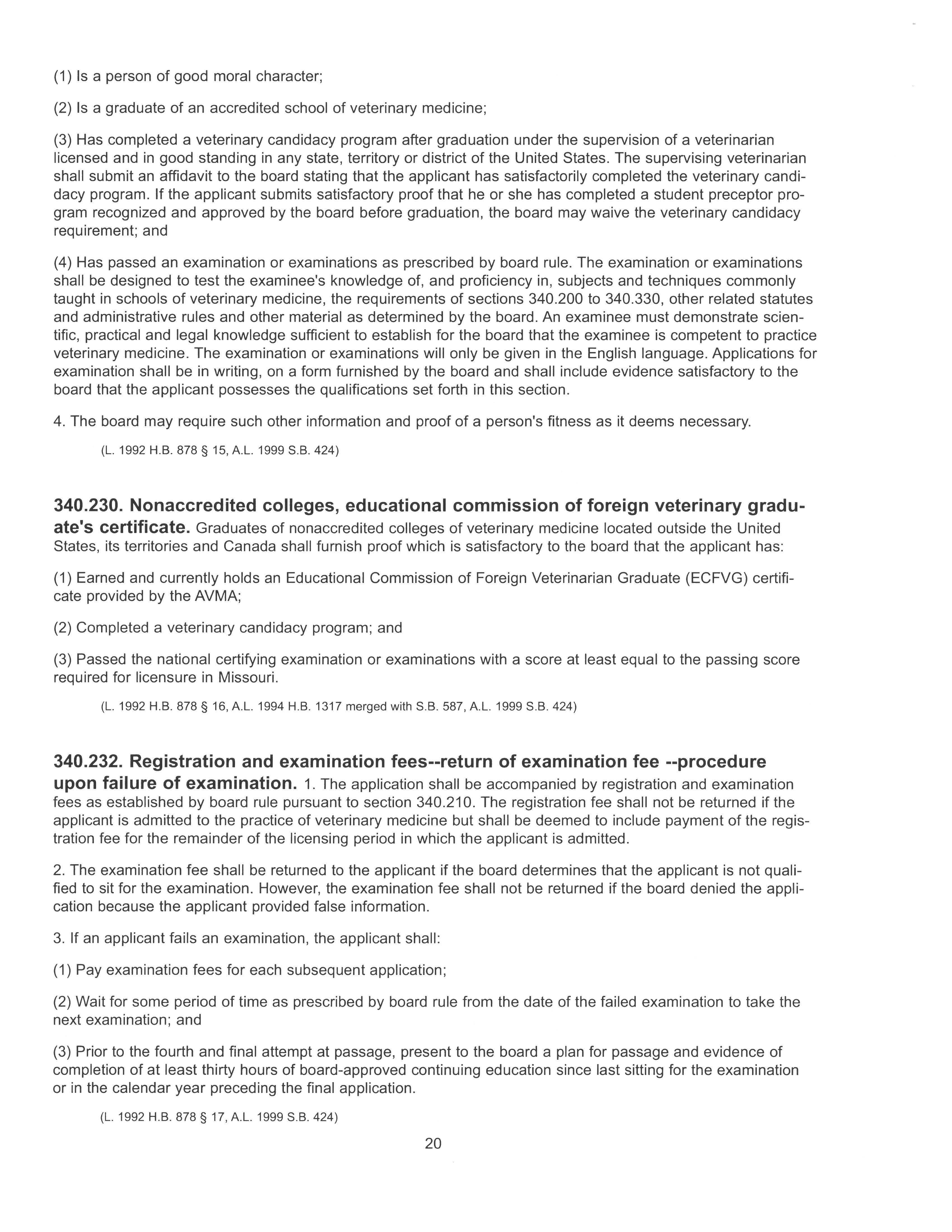
2 The examination fee shall be returned to the applicant if the board determines that the applicant is not qualified to sit for the examination. However, the examination fee shall not be returned if the board denied the application because the applicant provided false information.
3. If an applicant fails an examination, the applicant shall:
(1) Pay examination fees for each subsequent application;
(2) Wait for some period of time as prescribed by board rule from the date of the failed examination to take the next examination; and
(3) Prior to the fourth and final attempt at passage, present to the board a plan for passage and evidence of completion of at least thirty hours of board-approved continuing education since last sitting for the examination or in the calendar year preceding the final application.
(L 1992 H B 878 § 17, A L. 1999 S.B. 424)
20
340.234. Examination--licensure without examination.
1. If the board determines that the applicant possesses the proper qualifications as set forth in subsection 3 of section 340.228, it shall admit the applicant to the next scheduled examination.
2. Applicants shall submit an application and the registration and examination fees as required by rule of the board.
3. The board shall establish the requirements for a passing score on the examination. In order for a previous examination score to be transferred for a current licensing period, the score must have been received within five years prior to the application. If that passing score was not received within three attempts, the board may require the applicant to appear before the board or submit evidence that the applicant has completed at least thirty hours of board-approved continuing education. The board shall have sole discretion on whether to accept for transfer a score from another state's licensing authority.
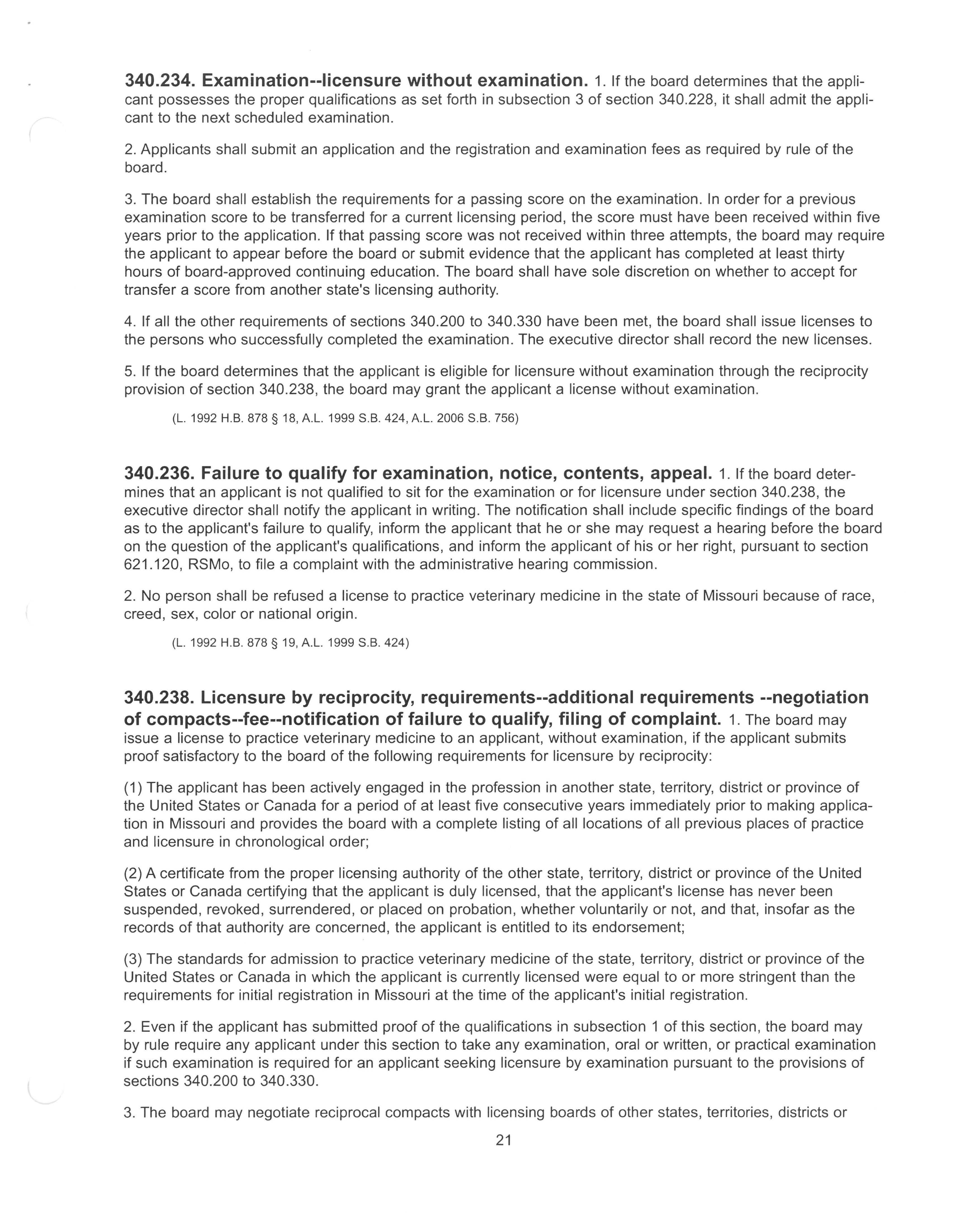
4. If all the other requirements of sections 340.200 to 340.330 have been met, the board shall issue licenses to the persons who successfully completed the examination. The executive director shall record the new licenses.
5. If the board determines that the applicant is eligible for licensure without examination through the reciprocity provision of section 340.238, the board may grant the applicant a license without examination.
(L. 1992 H.B 878 § 18, A.L. 1999 S.B 424, A.L. 2006 S B 756)
340.236. Failure to qualify for examination, notice, contents, appeal.
1. If the board determines that an applicant is not qualified to sit for the examination or for licensure under section 340.238, the executive director shall notify the applicant in writing. The notification shall include specific findings of the board as to the applicant's failure to qualify, inform the applicant that he or she may request a hearing before the board on the question of the applicant's qualifications, and inform the applicant of his or her right, pursuant to section 621.120, RSMo, to file a complaint with the administrative hearing commission.
2. No person shall be refused a license to practice veterinary medicine in the state of Missouri because of race, creed, sex, color or national origin.
(L 1992 H B 878 § 19, A.L. 1999 S B 424)
340.238. Licensure by reciprocity, requirements--additional requirements --negotiation of compacts--fee--notification of failure to qualify, filing of complaint.
1. The board may issue a license to practice veterinary medicine to an applicant, without examination, if the applicant submits proof satisfactory to the board of the following requirements for licensure by reciprocity:
(1) The applicant has been actively engaged in the profession in another state, territory, district or province of the United States or Canada for a period of at least five consecutive years immediately prior to making application in Missouri and provides the board with a complete listing of all locations of all previous places of practice and licensure in chronological order;
(2) A certificate from the proper licensing authority of the other state, territory, district or province of the United States or Canada certifying that the applicant is duly licensed, that the applicant's license has never been suspended, revoked, surrendered, or placed on probation, whether voluntarily or not, and that, insofar as the records of that authority are concerned, the applicant is entitled to its endorsement;
(3) The standards for admission to practice veterinary medicine of the state, territory, district or province of the United States or Canada in which the applicant is currently licensed were equal to or more stringent than the requirements for initial registration in Missouri at the time of the applicant's initial registration .
2. Even if the applicant has submitted proof of the qualifications in subsection 1 of this section, the board may by rule require any applicant under this section to take any examination, oral or written, or practical examination if such examination is required for an applicant seeking licensure by examination pursuant to the provisions of sections 340.200 to 340.330.
3. The board may negotiate reciprocal compacts with licensing boards of other states, territories, districts or 21
provinces of the United States or Canada for admission to the practice of veterinary medicine.
4. To determine the admission standards of other states, territories, districts or provinces of the United States or Canada, the executive director shall gather information as directed by the board pertaining to such standards. The board may contract with persons to assist the board in obtaining and evaluating such information and material.
5. The board may issue a license upon payment of a fee for licensure by reciprocity, if the applicant meets the requirements of this section and other provisions of sections 340.200 to 340.330.
6. If the board determines that an applicant is not qualified to be licensed under this section, the executive director shall immediately notify the applicant in writing. The notification shall include specific findings of the board as to the applicant's failure to qualify under this section, that the applicant may request a hearing before the board on the question of the applicant's qualifications, that the applicant may otherwise be considered for licensure after examination as provided in section 340.240* and of the applicant's right pursuant to section 621.120, RSMo, to file a complaint with the administrative hearing commission.
(L. 1992 H B. 878 § 20, A.L 1999 S B 424)
*Section 340.240 was repealed by S.B 424, 1999.
340.246. Provisional licensure, requirements--term. A provisional license may be issued to a qualified applicant for licensure pending examination results and completion of the veterinary candidacy program, or who has otherwise applied for licensure by grade transfer, reciprocity, or examination, if the applicant meets all other required qualifications for licensure in sections 340.200 to 340.330; provided that the applicant is working under the supervision of a licensed veterinarian in good standing. Such supervision shall be consistent with the delegated animal health care task. A provisional license shall expire one year after the date of issuance. A provisional license shall not be issued to individuals applying for faculty licensure.
(L. 1992 H.B. 878 § 23, A.L. 1999 S.B 424 , A.L 2004 H B 869)
340.247.
Veterinary faculty license, requirements, limitations --disciplinary actions--
cancellation.
1. Notwithstanding any other provisions of law to the contrary, the board may issue a veterinary faculty license to any qualified applicant associated with the University of Missouri-Columbia, College of Veterinary Medicine and involved in the instructional program of either undergraduate or graduate veterinary medical students, subject to the following conditions:
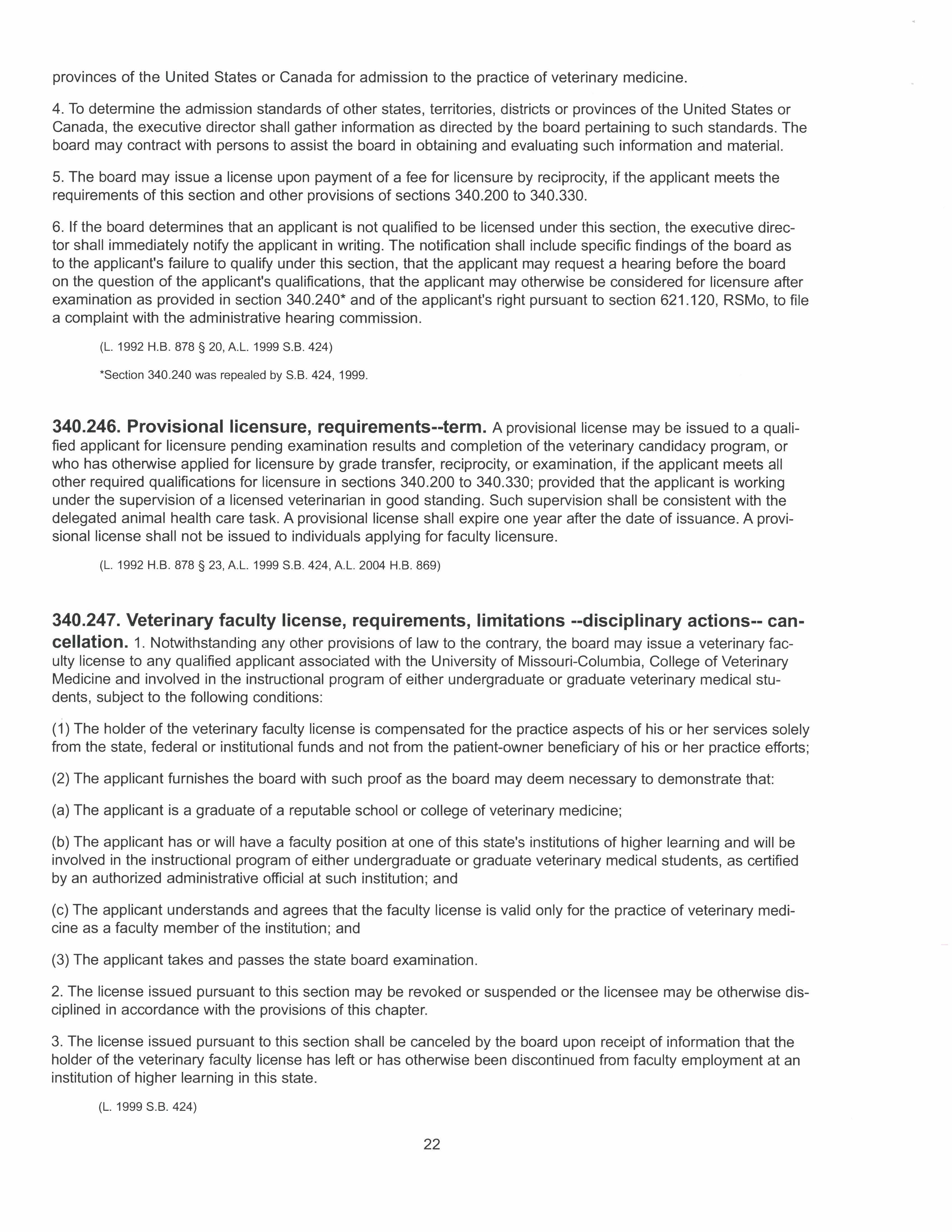
(1) The holder of the veterinary faculty license is compensated for the practice aspects of his or her services solely from the state, federal or institutional funds and not from the patient-owner beneficiary of his or her practice efforts;
(2) The applicant furnishes the board with such proof as the board may deem necessary to demonstrate that:
(a) The applicant is a graduate of a reputable school or college of veterinary medicine;
(b) The applicant has or will have a faculty position at one of this state's institutions of higher learning and will be involved in the instructional program of either undergraduate or graduate veterinary medical students, as certified by an authorized administrative official at such institution; and
(c) The applicant understands and agrees that the faculty license is valid only for the practice of veterinary medicine as a faculty member of the institution; and
(3) The applicant takes and passes the state board examination.
2. The license issued pursuant to this section may be revoked or suspended or the licensee may be otherwise disciplined in accordance with the provisions of this chapter.
3. The license issued pursuant to this section shall be canceled by the board upon receipt of information that the holder of the veterinary faculty license has left or has otherwise been discontinued from faculty employment at an institution of higher learning in this state.
(L. 1999 S.B 424)
22
340.248. Out-of-state veterinarian, temporary licensure for specific animal owner--term, renewal--agent for service of process. 1. If a licensed veterinarian of another state is not under discipline or investigation, the board may issue a temporary license to such veterinarian exclusively to permit the veterinarian to provide veterinary medical services for a specific animal owner in Missouri. The license is limited to the animals of the specific owner identified in the application. The temporary license shall expire one hundred twenty days after it is issued. Upon request of the applicant, the board may renew the temporary license for an additional ninety days.
2. When a licensed veterinarian of another state applies for a temporary license under this section, the applicant shall designate the secretary of state as the applicant's agent for the purpose of service of process in any action or proceeding against the applicant arising out of any transaction or operation connected with, or incidental to, the practice of veterinary medicine pursuant to such temporary license.
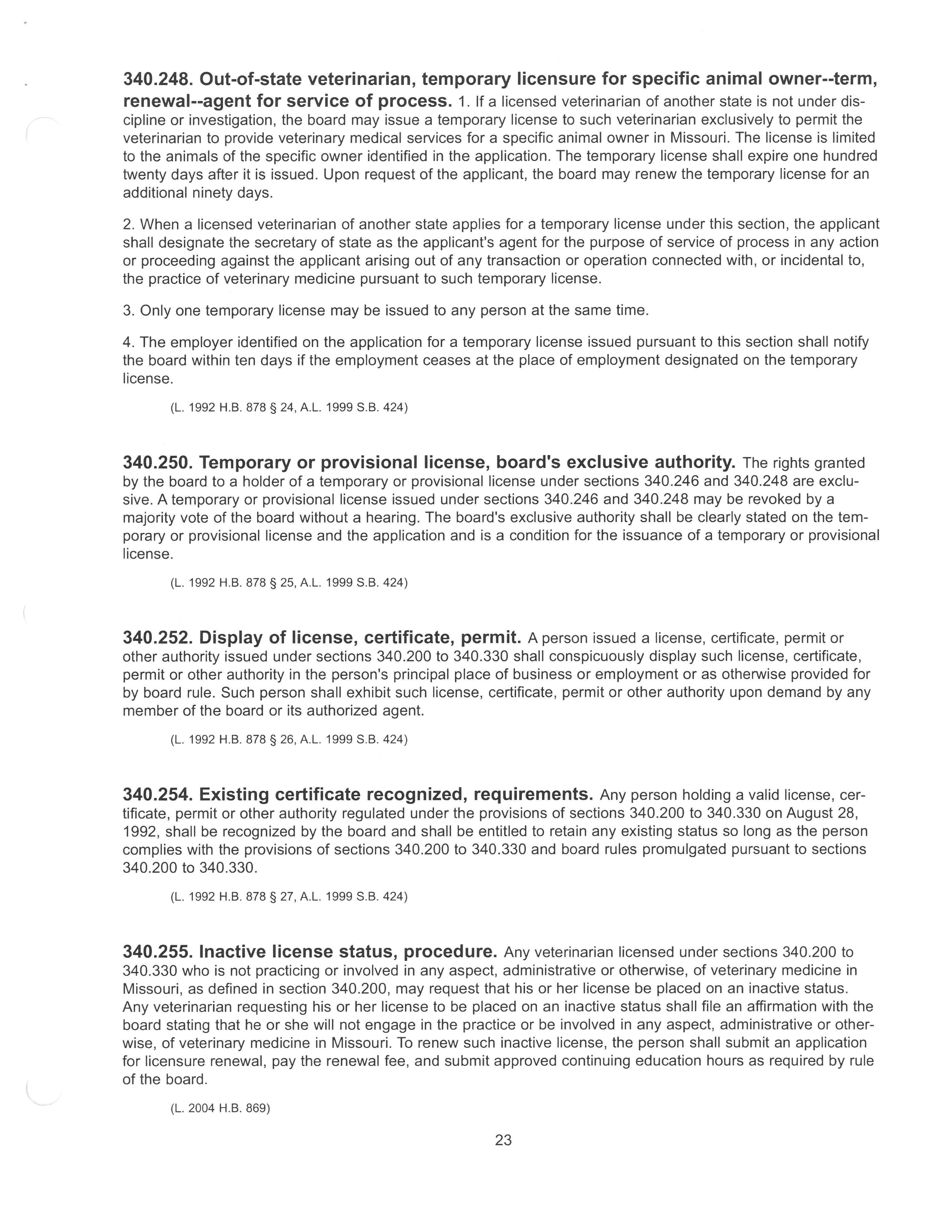
3. Only one temporary license may be issued to any person at the same time.
4. The employer identified on the application for a temporary license issued pursuant to this section shall notify the board within ten days if the employment ceases at the place of employment designated on the temporary license.
(L. 1992 H.B. 878 § 24, A.L. 1999 S.B. 424)
340.250. Temporary or provisional license, board's exclusive authority. The rights granted by the board to a holder of a temporary or provisional license under sections 340.246 and 340.248 are exclusive. A temporary or provisional license issued under sections 340.246 and 340.248 may be revoked by a majority vote of the board without a hearing. The board's exclusive authority shall be clearly stated on the temporary or provisional license and the application and is a condition for the issuance of a temporary or provisional license.
(L. 1992 H B. 878 § 25, A L. 1999 S B 424)
340.252. Display of license, certificate, permit. A person issued a license, certificate, permit or other authority issued under sections 340.200 to 340.330 shall conspicuously display such license, certificate, permit or other authority in the person's principal place of business or employment or as otherwise provided for by board rule. Such person shall exhibit such license, certificate, permit or other authority upon demand by any member of the board or its authorized agent.
(L. 1992 H.B 878 § 26, A.L 1999 S B. 424)
340.254. Existing certificate recognized, requirements. Any person holding a valid license, certificate, permit or other authority regulated under the provisions of sections 340.200 to 340.330 on August 28, 1992, shall be recognized by the board and shall be entitled to retain any existing status so long as the person complies with the provisions of sections 340.200 to 340.330 and board rules promulgated pursuant to sections 340.200 to 340.330.
(L. 1992 H B 878 § 27, A.L. 1999 S.B. 424)
340.255. Inactive license status, procedure. Any veterinarian licensed under sections 340.200 to 340.330 who is not practicing or involved in any aspect, administrative or otherwise, of veterinary medicine in Missouri, as defined in section 340.200, may request that his or her license be placed on an inactive status. Any veterinarian requesting his or her license to be placed on an inactive status shall file an affirmation with the board stating that he or she will not engage in the practice or be involved in any aspect, administrative or otherwise, of veterinary medicine in Missouri. To renew such inactive license, the person shall submit an application for licensure renewal, pay the renewal fee, and submit approved continuing education hours as required by rule of the board.
(L. 2004 H.B. 869)
23
340.256. Retirement, affidavit required--effect. Any person licensed under sections 340.200 to 340.330 who retires from any profession regulated by sections 340.200 to 340.330 shall file an affidavit stating the date of retirement and any other information required by the board in order to verify such retirement. Any person filing the affidavit as required by this section, does not need to renew his or her license as required by section 340.258. If such person decides to again practice his or her profession, the person must renew his or her license prior to performing any act or practice regulated by sections 340.200 to 340.330.
(L. 1992 H.B. 878 § 28, A.L. 1999 S.B. 424)
340.258. License expires, when--notice of renewal--application for renewal, continuing education requirements, contents--false statements, penalties--declaration of noncurrency for failure to renew. 1. Every license issued under the provisions of sections 340.200 to 340.330 shall expire annually or as otherwise established by board rule but may be renewed by the licensee upon application to the board for renewal and payment of renewal fees, subject to the provisions of this section. The board shall not renew any license unless the licensee provides satisfactory evidence that he or she has complied with the board's minimum requirements for continuing education.
2. At least thirty days prior to the expiration date, the executive director shall send a notice of renewal and an application for renewal to each licensee of record. The notice and application shall be mailed to the licensee's last known business address. Neither the failure to mail nor the failure to receive the notice and application shall relieve any licensee of the duty to make application for renewal or to pay the necessary renewal fee. The failure to mail or to receive the notice and application will not exempt the licensee from the penalties provided by sections 340.200 to 340.330 for failure to promptly renew such license.
3. The applicant shall disclose on the application for renewal:
(1) Applicant's full name;
(2) Applicant's business and residence addresses;
(3) Date and number of applicant's license;
(4) Any disciplinary actions taken against the applicant by any state, territory or district of the United States, or federal agency;
(5) Any felony criminal convictions;
(6) Any continuing educational credits; and
(7) Any other information deemed necessary by the board to assess the applicant's fitness for license renewal.
4. The application shall be made under oath or affirmation and subject to penalties provided for making a false statement under oath or affirmation. Such penalties are in addition to and not in lieu of any penalty or other discipline provided for in sections 340.200 to 340.330.
5. If a licensee fails to submit an application and fees within thirty days of expiration of his or her license, the executive director shall notify the licensee that the application and fees have not been received and that the licensee's failure to respond within ten days will result in * his or her license being declared noncurrent. The notification required by this subsection shall be by certified mail, return receipt requested, to the licensee's last known business and residence addresses. If the application and fees are not received within ten days after the return receipt is received, the licensee's license shall be declared noncurrent. The executive director shall give notice to the licensee by certified mail, return receipt requested, at the licensee's last known business and residence addresses that his or her license has been declared noncurrent and that the licensee shall not practice veterinary medicine until he or she applies for reinstatement and pays the required fees.
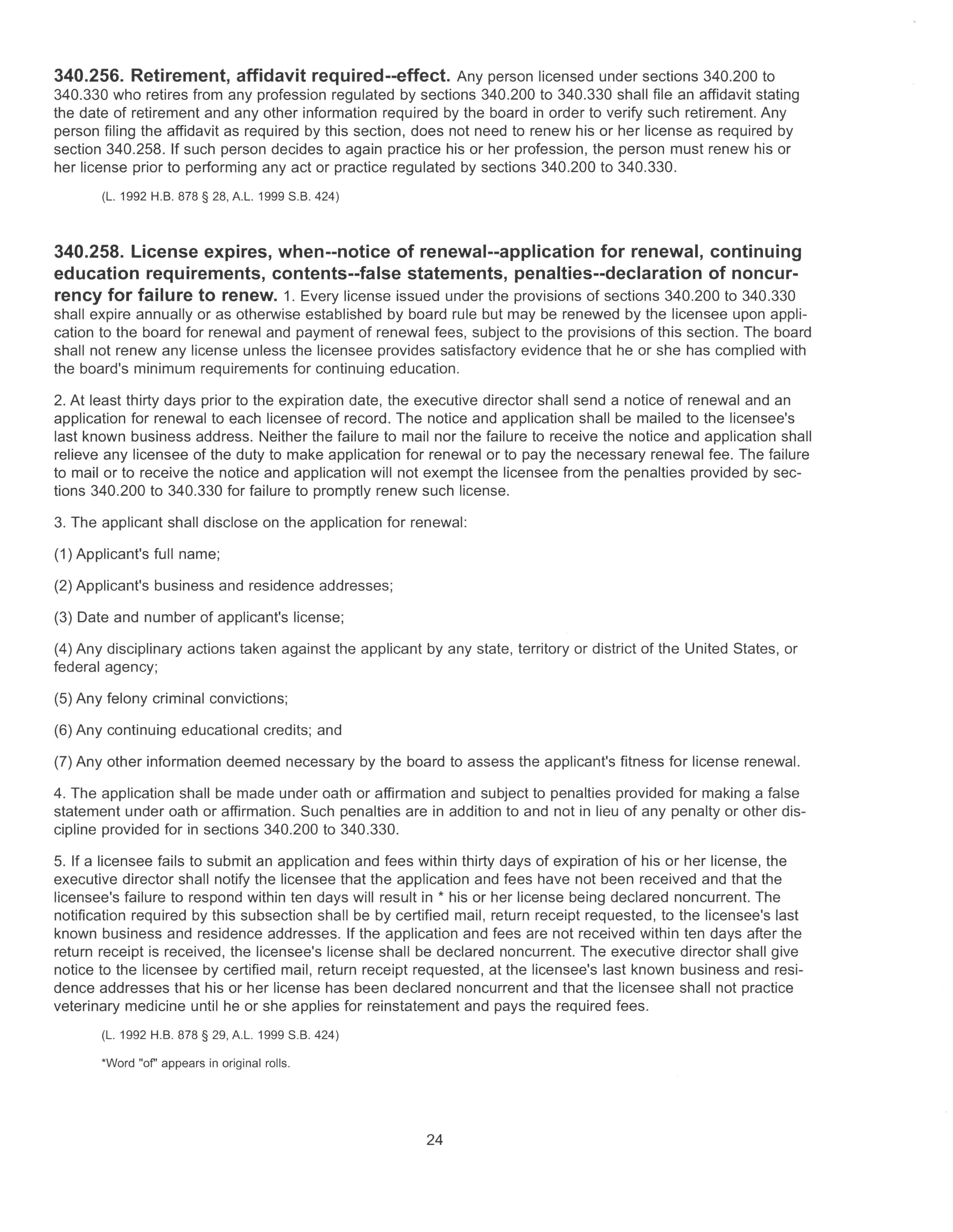
(L 1992 H B. 878 § 29, A.L 1999 S B. 424)
*Word "of' appears in original rolls
24
340.260. Practice after declaration of noncurrency, penalty. If any person practices veterinary medicine after his or her license is declared noncurrent pursuant to subsection 5 of section 340.258, he or she is subject to criminal prosecution as provided in sections 340.200 to 340.330. Such criminal prosecution shall be in addition to any penalty or other discipline provided for in sections 340.200 to 340.330.
(L
340.262. Renewal of expired license, requirements--waiver of fees, when. If a person is otherwise eligible to renew his or her license, the person may renew an expired license within two years of the date of expiration. To renew such expired license, the person shall submit an application for renewal, pay the renewal fee, pay a delinquent renewal fee, pay a penalty fee, and submit approved continuing education hours as required by rule of the board. Upon a finding of extenuating circumstances, the board may waive the payment of the penalty fee; however, nothing in this section shall be construed as requiring such waiver. If more than two years have lapsed since the date the license expired, the license may not be renewed. The holder of such expired license must apply under the procedures for a new license pursuant to sections 340.200 to 340.330.
(L
340.264. Refusal to issue or renew certificate, grounds--complaint may be filed, grounds-- procedure.
1. The board may refuse to issue or renew any certificate of registration or authority, permit or license required pursuant to sections 340.200 to 340.330 for one or any combination of causes stated in subsection 2 of this section. The board shall notify the applicant in writing of the reasons for the refusal and shall advise the applicant of his or her right to file a complaint with the administrative hearing commission as provided by chapter 621, RSMo.
2. The board may file a complaint with the administrative hearing commission as provided by chapter 621 , RSMo, against any holder of any certificate of registration or authority, permit or license required by sections 340.200 to 340.330 or any person who has failed to renew or has surrendered his or her certificate of registration or authority, permit or license for any one or combination of the following causes:
(1) Use of any controlled substance, as defined in chapter 195, RSMo, or alcoholic beverage to an extent that such use impairs a person's ability to perform the work of any profession licensed or regulated by sections 340.200 to 340.330;
(2) The person has been finally adjudicated and found guilty, or entered a plea of guilty or nolo contendere, in a criminal prosecution under the laws of any state, territory, district of the United States, or the United States, for any offense reasonably related to the qualifications, functions or duties of any profession licensed or regulated under sections 340.200 to 340 330 or for any offense for which an essential element is fraud, dishonesty or an act of violence, or for any offense involving moral turpitude, whether or not sentence is imposed;
(3) Use of fraud, deception, misrepresentation or bribery in securing any certificate of registration or authority, permit or license issued pursuant to sections 340.200 to 340.330 or in obtaining permission to take any examination given or required pursuant to sections 340.200 to 340.330;
(4) Misconduct, fraud, misrepresentation, dishonesty, unethical conduct or unprofessional conduct in the performance of the functions or duties of any profession licensed or regulated by sections 340.200 to 340.330, including, but not limited to:
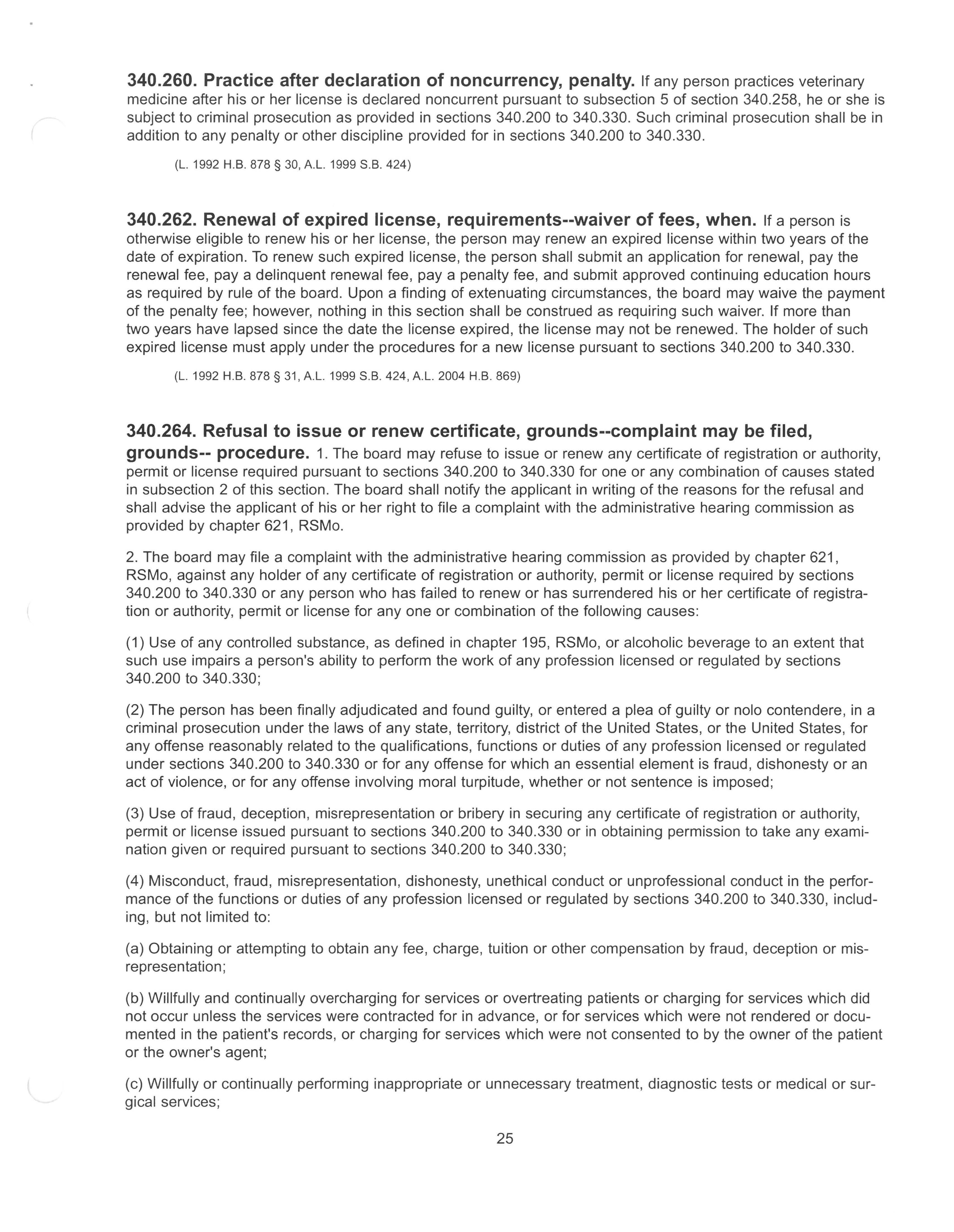
(a) Obtaining or attempting to obtain any fee, charge, tuition or other compensation by fraud , deception or misrepresentation;
(b) Willfully and continually overcharging for services or overtreating patients or charging for services which did not occur unless the services were contracted for in advance, or for services which were not rendered or documented in the patient's records, or charging for services which were not consented to by the owner of the patient or the owner's agent;
(c) Willfully or continually performing inappropriate or unnecessary treatment, diagnostic tests or medical or surgical services;
1992 H B 878 § 30, A.L. 1999 S B. 424)
1992 H B 878 § 31 , A.L 1999 S B
A L 2004 H.B
424 ,
869)
25
(d) Attempting, directly or indirectly, by intimidation, coercion or deception to obtain or retain a patient or discourage the owner from seeking a second opinion or consultation;
(e) Delegating professional responsibilities to a person who is not qualified by training, skill, competency, age, experience, registration or licensure to perform such responsibilities;
(f) Misrepresenting that any disease or ailment can be cured by a method, procedure, treatment, medicine or device;
(g) Performing or prescribing medical services which have been declared by board rule to be of no medical value;
(h) Final disciplinary action by any professional veterinary medical association or society or licensed hospital or clinic or medical staff of such hospital or clinic in this state or any other state or territory, whether agreed to voluntarily or not, and including, but not limited to, any removal, suspension, limitation, surrender, or restriction of a license or staff or hospital or clinic privileges, failure to renew such privileges or license for cause, or other final disciplinary action, if the action was related to unprofessional conduct, professional incompetence, malpractice or any other violation of sections 340.200 to 340.330;
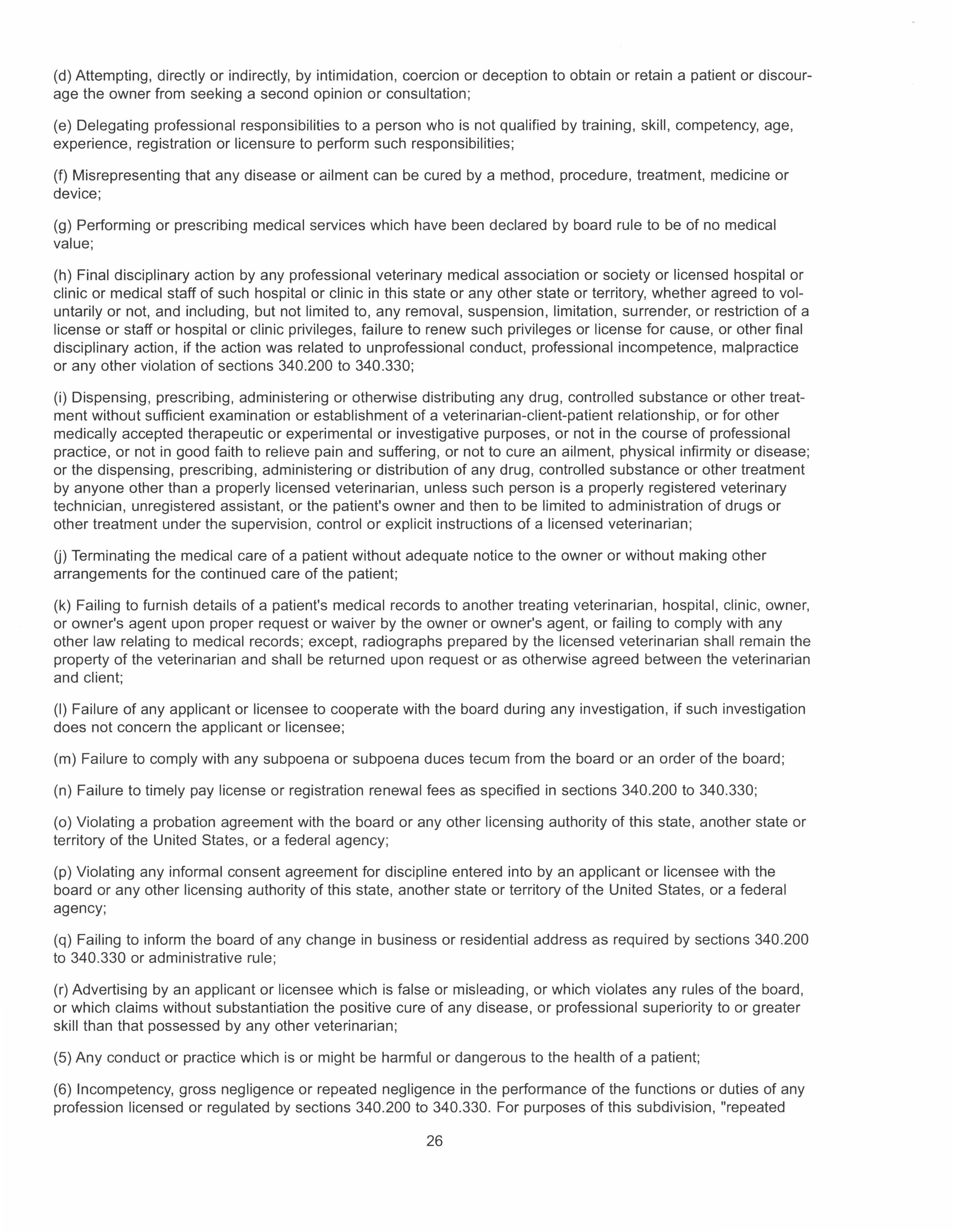
(i) Dispensing, prescribing, administering or otherwise distributing any drug, controlled substance or other treatment without sufficient examination or establishment of a veterinarian-client-patient relationship, or for other medically accepted therapeutic or experimental or investigative purposes, or not in the course of professional practice, or not in good faith to relieve pain and suffering, or not to cure an ailment, physical infirmity or disease; or the dispensing, prescribing, administering or distribution of any drug, controlled substance or other treatment by anyone other than a properly licensed veterinarian, unless such person is a properly registered veterinary technician, unregistered assistant, or the patient's owner and then to be limited to administration of drugs or other treatment under the supervision, control or explicit instructions of a licensed veterinarian;
U) Terminating the medical care of a patient without adequate notice to the owner or without making other arrangements for the continued care of the patient;
(k) Failing to furnish details of a patient's medical records to another treating veterinarian, hospital, clinic, owner, or owner's agent upon proper request or waiver by the owner or owner's agent, or failing to comply with any other law relating to medical records; except, radiographs prepared by the licensed veterinarian shall remain the property of the veterinarian and shall be returned upon request or as otherwise agreed between the veterinarian and client;
(I) Failure of any applicant or licensee to cooperate with the board during any investigation, if such investigation does not concern the applicant or licensee;
(m) Failure to comply with any subpoena or subpoena duces tecum from the board or an order of the board;
(n) Failure to timely pay license or registration renewal fees as specified in sections 340.200 to 340.330;
(o) Violating a probation agreement with the board or any other licensing authority of this state, another state or territory of the United States, or a federal agency;
(p) Violating any informal consent agreement for discipline entered into by an applicant or licensee with the board or any other licensing authority of this state, another state or territory of the United States, or a federal agency;
(q) Failing to inform the board of any change in business or residential address as required by sections 340.200 to 340.330 or administrative rule;
(r) Advertising by an applicant or licensee which is false or misleading, or which violates any rules of the board, or which claims without substantiation the positive cure of any disease, or professional superiority to or greater skill than that possessed by any other veterinarian;
(5) Any conduct or practice which is or might be harmful or dangerous to the health of a patient;
(6) Incompetency, gross negligence or repeated negligence in the performance of the functions or duties of any profession licensed or regulated by sections 340.200 to 340.330. For purposes of this subdivision, "repeated
26
negligence" means the failure, on more than one occasion, to use that degree of skill and learning ordinarily used under the same or similar circumstances by members of the profession;
(7) Violation of, or attempting to violate, directly or indirectly, or assisting, or enabling any person to violate, any provisions of sections 340.200 to 340.330, or any lawful rule or regulation adopted pursuant to sections 340.200 to 340.330;
(8) Impersonation of any person holding a certificate of registration or authority, permit or license or allowing any person to use his certificate of registration or authority, permit, license or diploma from any school;
(9) Revocation, suspension, restriction, modification, limitation, reprimand, warning, censure, probation or other final disciplinary action against the holder of, or applicant for, a license or registration or other right to practice any profession regulated by sections 340.200 to 340.330 or by another state, territory, federal agency or country, whether or not voluntarily agreed to by the licensee or applicant, including, but not limited to:
(a) Denial of licensure or registration;
(b) Surrender of the license or registration;
(c) Allowing the license or registration to expire or lapse; or
(d) Discontinuing or limiting the practice of veterinary medicine while subject to an investigation or while actually under investigation by any licensing authority, medical facility, insurance company, court, agency of the state or federal government, or employer;
(10) Being adjudged incapacitated or disabled by a court of competent jurisdiction;
(11) Assisting or enabling any person to practice or offer to practice any profession licensed or regulated by sections 340.200 to 340.330 who is not licensed or registered and currently eligible to practice under sections 340.200 to 340.330, or knowingly performing any act which aids, assists, procures, advises, or encourages any person to practice veterinary medicine who is not licensed or registered and currently eligible to practice under sections 340.200 to 340.330;
(12) Issuance of a certificate of registration or authority, permit or license based upon a material mistake of fact;
(13) Failure to obtain, renew or display a valid certificate, license, permit or notice if required;
(14) Violation of the drug laws or rules and regulations of this state, any other state, territory, or the federal government;
(15) Knowingly or recklessly making or causing to be made, or aiding or abetting in the making of a false statement or documentation in connection with the birth, death, or health of any animal, executed in connection with the practice of his or her profession or failure to file such statements or documents with the proper officials of the federal or state government as provided by law or any rule promulgated under sections 340.200 to 340.330;
(16) Soliciting patronage in person or by agents, under his or her own name or under the name of another, actual or pretended, in such a manner as to confuse, deceive or mislead the public as to the need or appropriateness of animal health care or services or the qualifications of an individual person or persons to diagnose, render, or perform such animal health care services;
(17) Failure or refusal to properly guard against contagious, infectious or communicable diseases or the spread thereof;
(18) Maintaining an unsanitary office or facility, or performing professional services under unsanitary conditions with due consideration given to the place where the services are rendered;
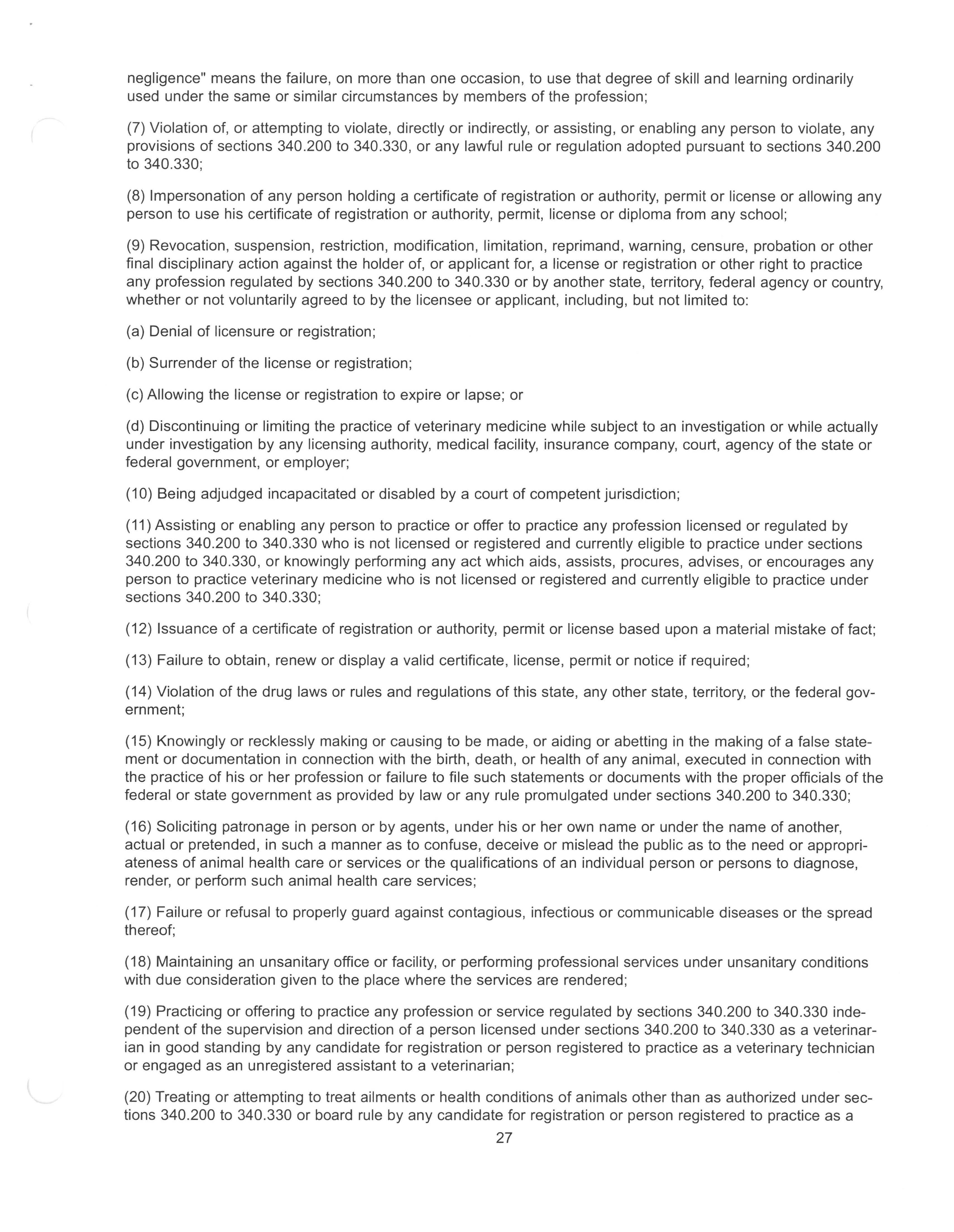
(19) Practicing or offering to practice any profession or service regulated by sections 340.200 to 340.330 independent of the supervision and direction of a person licensed under sections 340.200 to 340.330 as a veterinarian in good standing by any candidate for registration or person registered to practice as a veterinary technician or engaged as an unregistered assistant to a veterinarian;
(20) Treating or attempting to treat ailments or health conditions of animals other than as authorized under sections 340.200 to 340.330 or board rule by any candidate for registration or person registered to practice as a 27
veterinary technician or engaged as an unregistered assistant to a licensed veterinarian;
(21) A pattern of personal use or consumption of any controlled substance unless it is prescribed, dispensed or administered by a licensed physician;
(22) Any revocation, suspension, surrender, limitation or restriction of any controlled substance authority, whether agreed to voluntarily or not;
(23) Being unable to practice as a veterinarian or veterinary technician with reasonable skill and safety to patients because of illness, drunkenness, excessive use of drugs, narcotics, chemicals, or as a result of any mental or physical condition;
(24) Violation of any professional trust or confidence;
(25) Failing to obtain or renew any facility permit or to maintain mandatory requirements or minimum standards for any such facility as required by sections 340.200 to 340.330 or board rule.
3. If the board files a complaint pursuant to subsection 2 of this section, the proceedings shall be conducted in accordance with the provisions of chapter 621, RSMo. If the administrative hearing commission finds that grounds provided in this section are met, the board may either singly or in combination:
(1) Warn, censure or place the person named in the complaint on probation on such terms and conditions as the board deems appropriate for a period not to exceed ten years;
(2) Suspend such license, certificate or permit for a period not to exceed three years;
(3) Restrict or limit the license, certificate or permit for an indefinite period of time;
(4) Revoke such license, certificate or permit;
(5) Administer a public or private reprimand;
(6) Deny the application for a license;
(7) Permanently withhold issuance of a license or certificate;
(8) Require the applicant or licensee to submit to the care, counseling or treatment of physicians designated by the board at the expense of the person to be examined;
(9) Require the person to attend such continuing educational courses and pass such examinations as the board may direct.
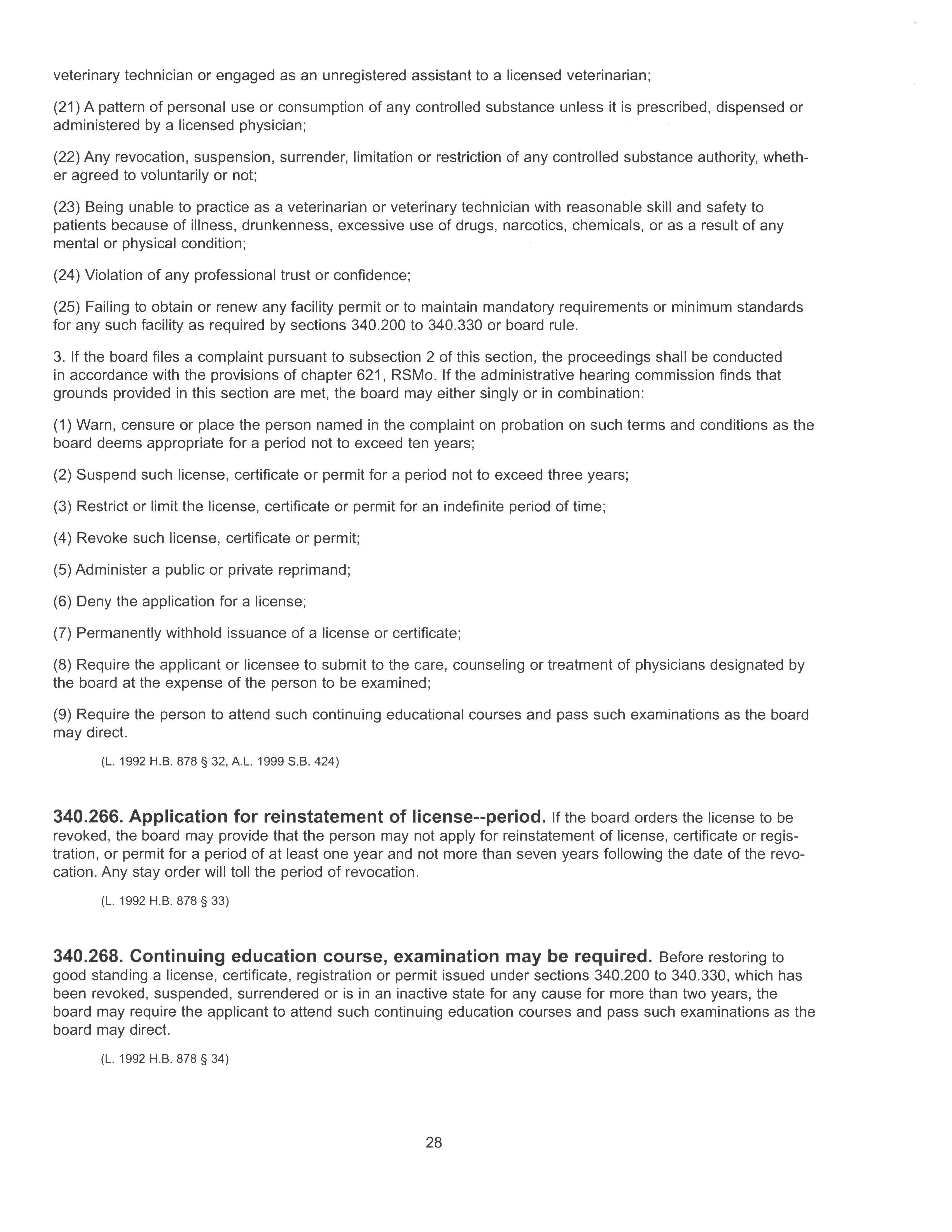
(L. 1992 H.B. 878 § 32, A.L. 1999 S.B. 424)
340.266. Application for reinstatement of license--period. If the board orders the license to be revoked, the board may provide that the person may not apply for reinstatement of license, certificate or registration, or permit for a period of at least one year and not more than seven years following the date of the revocation. Any stay order will toll the period of revocation.
(L. 1992 H.B. 878 § 33)
340.268. Continuing education course, examination may be required. Before restoring to good standing a license, certificate, registration or permit issued under sections 340.200 to 340.330, which has been revoked, suspended, surrendered or is in an inactive state for any cause for more than two years, the board may require the applicant to attend such continuing education courses and pass such examinations as the board may direct.
(L. 1992 H.B. 878 § 34) 28
340.270. Records of patients, discoverable. In any investigation, hearing or other proceeding to determine a licensee's or applicant's fitness to practice, or in any investigation of a complaint before the board, any record relating to any patient of the licensee or applicant is discoverable by the board and admissible as evidence notwithstanding any privilege to the contrary which such licensee, applicant, or record custodian might otherwise invoke.
(L 1992 H.B. 878 § 35)
340.272. Complaint for expedited hearing, when--hearing, decision, when --temporary authority final, when. 1. If the board, after notice and hearing, concludes that a person has committed an act or is engaging in a course of conduct which would be grounds for disciplinary action under section 340.264 and such act or course of conduct constitutes a clear and present danger to the public health, safety or welfare, the board may file a complaint before the administrative hearing commission requesting an expedited hearing and specifying the activities which give rise to the danger and the nature of the proposed restriction or suspension of the person's license.
2. The administrative hearing commission shall conduct a preliminary hearing within fifteen days after service of a complaint pursuant to subsection 1 of this section, to determine whether the alleged activities appear to constitute a clear and present danger to the public health, safety or welfare which justifies that the person's license be immediately restricted or suspended. The administrative hearing commission shall issue its decision immediately after the hearing and either grant the board the authority to suspend or restrict the license or dismiss the action.
3. If the administrative hearing commission grants the board temporary authority to restrict or suspend the license, the temporary authority shall become final if the person does not request a full hearing within thirty days of the preliminary hearing. If the person requests a full hearing, the administrative hearing commission shall set a date for the hearing pursuant to chapter 621, RSMo.
(L. 1992 H B. 878 § 36)
340.274. Automatic revocation of license, when--automatic reinstatement, when --automatic denial of license, when. 1. A license issued under sections 340.200 to 340.330 shall be automatically revoked following a review of the record of the proceedings by the board and upon a formal motion of the board:
(1) When the final trial proceedings are concluded where a person has been adjudicated and found guilty, or has entered a plea of guilty or nolo contendere whether or not a sentence is imposed:
(a) In a felony criminal prosecution under the laws of this state, the laws of any other state, territory or district of the United States, or the United States for any offense reasonably related to the qualifications, functions or duties of the person licensed under sections 340.200 to 340.330;
(b) For any felony offense, for which an essential element is fraud, dishonesty or an act of violence; or
(c) For any felony offense involving moral turpitude;
(2) Upon the final and unconditional revocation or surrender of the person's license to practice the same profession in another state, territory or district of the United States upon grounds for which revocation is authorized in this state.
2. The license of such person shall be automatically reinstated if the conviction, judgment or revocation is set aside upon final appeal in any court of competent jurisdiction.
3. Any person who has been denied a license, certificate, permit or other authority to practice a profession in another state, if such profession in this state is regulated pursuant to sections 340.200 to 340.330, shall automatically be denied a license to practice such profession in this state; however, the board may establish qualifications whereby such person may be qualified and licensed to practice such profession in this state.
(L. 1992 H B. 878 § 37)
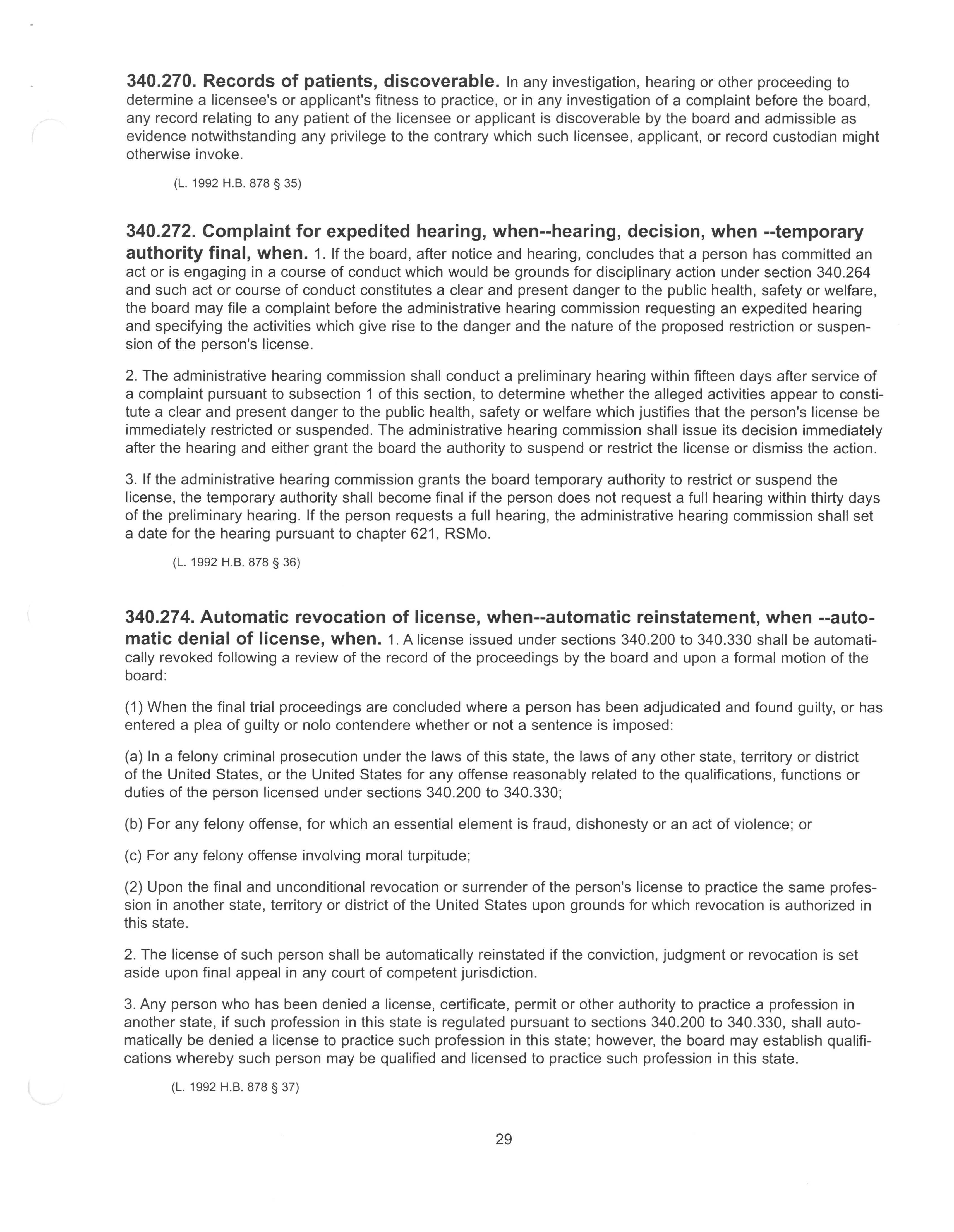
29
340. 276. Injunctions, restraining orders, other orders, when, grounds --commencement of action, where. 1. Upon application by the board, and the necessary burden having been met, a court of general jurisdiction may grant an injunction, restraining order or other order as may be appropriate to enjoin a person from:
(1) Offering to engage or engaging in the performance of any acts or practice for which a license, certificate, permit or other authority is required by sections 340.200 to 340.330 upon a showing that such acts or practices were performed or offered to be performed* without a license, certificate, permit or other authority; or
(2) Engaging in any practice authorized by a license, certificate, permit or other authority issued pursuant to sections 340.200 to 340.330 upon a showing that the holder presents a substantial probability of serious danger to the health, safety or welfare of any resident of the state or client or patient of the licensee.
2. Any such action shall be commenced either in the county in which such conduct occurred or in the county where the defendant resides. Any action brought under this section shall be in addition to and not in lieu of any penalty or other discipline provided for by sections 340.200 to 340.330 and may be brought concurrently with other actions to enforce sections 340.200 to 340.330.
(L 1992 H.B. 878 § 38)
*Words "to perform" appear in original rolls rather than "to be performed".'
340.278. Relicensing and reinstatement--conditions.
1. Upon written application to the board showing cause justifying relicensing and reinstatement, any person whose license has been revoked or suspended by the board may be relicensed or reinstated at any time without examination by a majority vote of the full board.
2. Nothing in subsection 1 of this section shall be construed as requiring the board to reinstate a license due to a showing of justification. Such relicensing or reinstatement is within the sole discretion of the board.
3. The board may condition such reinstatement or relicensing as it deems appropriate under the circumstances, including, but not limited to, restricting or limiting the person's practice or placing the person on probation under terms and conditions set by the board.
(L. 1992 H.B. 878 § 39)
340.280. Chairman may administer oaths, issue subpoena--enforcement of subpoenas, where.
1. The chairman or vice chairman of the board may administer oaths, subpoena witnesses, issue subpoenas duces tecum and require production of documents and records pertaining to complaints or investigations. Subpoenas, including subpoenas duces tecum, shall be served by a person so authorized to serve subpoenas of courts of records. In lieu of requiring attendance of a person to produce original documents in response to a subpoena duces tecum, the board may require sworn copies of such documents to be filed with it or delivered to its designated representative.
2. The board may enforce its subpoenas, including a subpoena duces tecum, by applying to a circuit court of Cole County, the county of investigation, hearing or proceeding, or any county where the person resides or may be found, for an order upon any person who shall fail to obey a subpoena to show cause why such subpoena should not be enforced. The order and a copy of the application therefor shall be served upon the person in the same manner as a summons in a civil action. If the circuit court, after a hearing, determines that the subpoena should be sustained and enforced, such court shall proceed to enforce the subpoena in the same manner as though the subpoena had been issued in a civil case in the circuit court.
(L. 1992 H.B 878 § 40)
340.282. Immunity of persons cooperating with the board. Any person who in good faith and without malice reports, provides information or cooperates in any manner with the board, or assists the board in any manner, including, but not limited to, applicants or licensees, whether or not the applicant or licensee is the subject of an investigation, record custodians, consultants, attorneys, board members, agents, employees, staff or expert witnesses, in the course of any investigation, hearing or other proceeding conducted by or before the 30
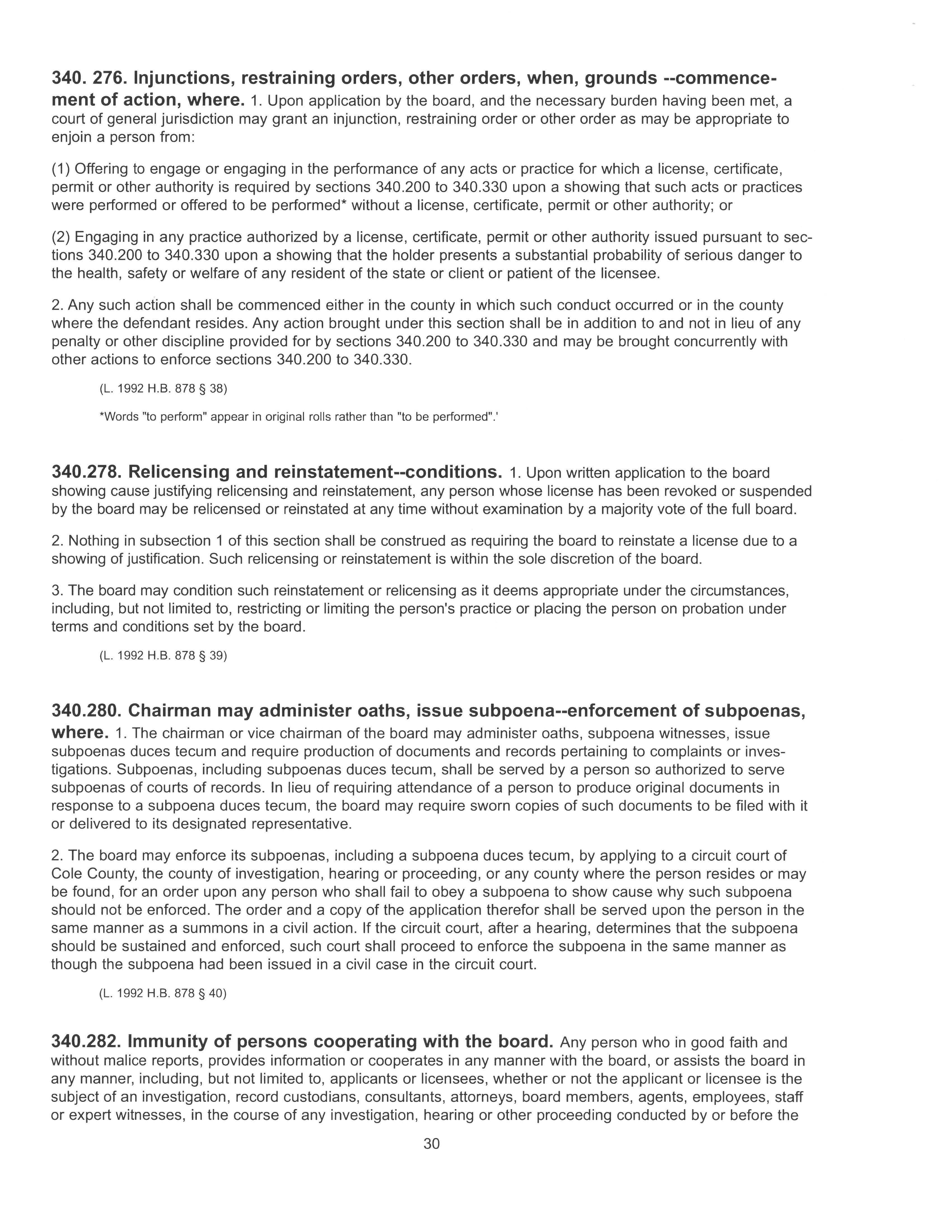
board pursuant to the provisions of sections 340.200 to 340.330 hall not be subject to an action for civil damages and no cause of action shall arise against him as a result thereof.
(L. 1992 H.B 878 § 41)
340.284. Medical records to be maintained. Any person who provides veterinary medical services shall prepare and maintain medical records for any patient. Such records shall meet or exceed the minimum standards as established by board rule.
(L. 1992 H.B. 878 § 42)
340.285. Statute of limitations for malpractice, negligence, error, or mistake related to veterinary care of animals. -All actions against veterinarians treating animals and any other entity providing veterinary services for animals, and all employees of any of the foregoing acting in the course and scope of their employment, for damages for malpractice, negligence, error, or mistake related to the veterinary care of animals shall be brought within two years from the date of occurrence of the act of neglect complained of, except that:
(1) In cases in which the act of neglect complained of is introducing and negligently permitting any foreign object to remain within the body of a living animal, the action shall be brought within two years from the date of the discovery of such alleged negligence or from the date on which the owner of an animal in the exercise of ordinary care should have discovered such alleged negligence, whichever date occurs first; and
(2) In cases in which the act of neglect complained of is the negligent failure to inform, the action shall be brought within two years from the date of the discovery of such alleged negligent failure to inform or from the date on which the owner of the animal in the exercise of ordinary care should have discovered such alleged negligent failure to inform, whichever date first occurs; except that, no such action shall be brought for any negligent failure to inform about the results of medical tests performed more than two years before August 28, 2017. For purposes of this subdivision, the act of neglect based on the negligent failure to inform the owner of the animal of the results of medical tests shall not include the act of informing the owner of the animal of erroneous test results.
(L. 2017 S.B. 88)
340.286. Disclosure of information, when required--immunity--waiver of privilege.
1. Except as otherwise provided for under section 340.270 or by board rule, no veterinarian licensed under the provisions of sections 340.200 to 340.330 shall be required to disclose any information concerning the veterinarian's care of an animal, except on written authorization or other waiver by the veterinarian's client or on appropriate court order or subpoena or as may be required to ensure compliance with any other federal or state law.
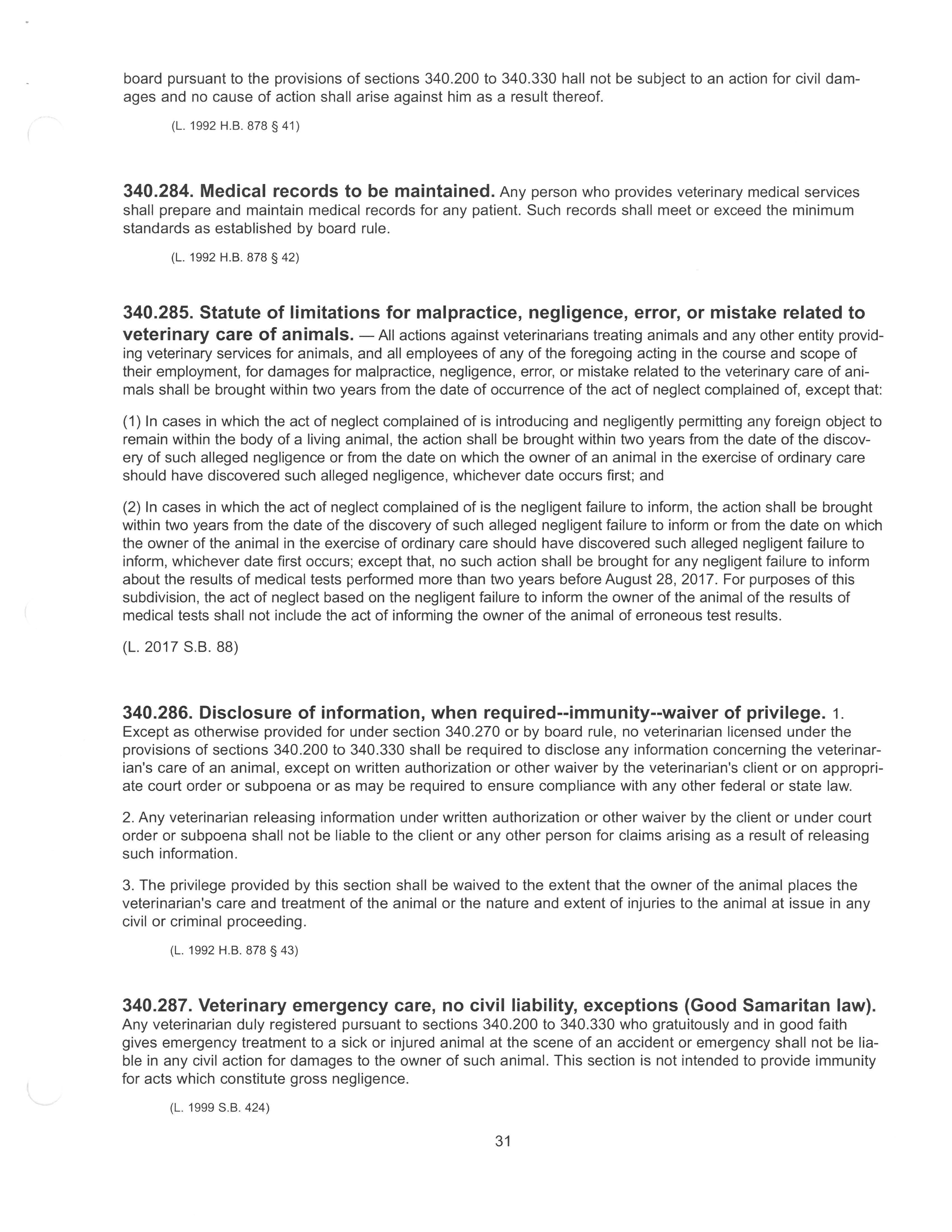
2. Any veterinarian releasing information under written authorization or other waiver by the client or under court order or subpoena shall not be liable to the client or any other person for claims arising as a result of releasing such information.
3. The privilege provided by this section shall be waived to the extent that the owner of the animal places the veterinarian's care and treatment of the animal or the nature and extent of injuries to the animal at issue in any civil or criminal proceeding.
(L. 1992 H B 878 § 43)
340.287. Veterinary emergency care, no civil liability, exceptions {Good Samaritan law).
Any veterinarian duly registered pursuant to sections 340.200 to 340.330 who gratuitously and in good faith gives emergency treatment to a sick or injured animal at the scene of an accident or emergency shall not be liable in any civil action for damages to the owner of such animal. This section is not intended to provide immunity for acts which constitute gross negligence.
(L. 1999 S.B. 424)
31
340.288.
1. Any animal placed in the custody of a licensed veterinarian for treatment, boarding or other care, which is unclaimed by its owner or its owner's agent for more than ten days after written notice by certified mail, return receipt requested, is sent to the owner or owner's agent at the person's last known address shall be deemed to be abandoned. Such abandoned animal may be turned over to the nearest humane society or animal shelter, or otherwise disposed of or destroyed by the licensed veterinarian in a humane manner.
2. If notice is sent pursuant to subsection 1 of this section, the licensed veterinarian or any custodian of such abandoned animal is relieved of any further liability for disposal. If a licensed veterinarian follows the procedures of this section, the veterinarian shall not be subject to disciplinary action under sections 340.200 to 340.330 unless such licensed veterinarian fails to provide the proper notification to the owner or owner's agent.
3. For the purposes of this section, the term "abandoned" means to forsake entirely, to neglect or refuse to provide or perform legal obligations for the care and support of an animal, or to refuse to pay for treatment or other services without an assertion of good cause. Such abandonment shall constitute the relinquishment of all rights and claims by the owner to such animal.
4. If an animal should die while in the custody of a licensed veterinarian for the purpose of treatment, boarding or other care, the licensed veterinarian may perform necropsy after reasonable attempts to notify he owner and obtain permission have failed. The licensed veterinarian shall maintain or otherwise store the corpse for a period of at least three days following such death or three days after notification to the owner, whichever is longer, after which time the corpse may be disposed of in any lawful manner.
5. The disposal of an abandoned or deceased animal shall not relieve the owner or owner's agent of any financial obligation incurred for treatment, boarding or other care provided by the veterinarian.
(L. 1992 H.B. 878 § 44, A.L. 1999 S B. 424)
340.290. Certain proceedings not abated. No judicial or administrative proceeding pending prior to August 28, 1992, shall be abated as a result of the repeal of chapter 340 and the enactment of sections 340.200 to 340.330.
(L. 1992 H.B. 878 § 45)
340.292. Severability. If any clause, sentence, paragraph, section or part of sections 340.200 to 340.330 or the application thereof to any person or circumstances shall for any reason be adjudged by any court of competent jurisdiction to be unconstitutional or invalid, such judgment shall not affect, impair or invalidate the remainder thereof, and the application thereof to other persons or circumstances, but shall be confined in its operation to the clause, sentence or paragraph, section or part thereof involved in the controversy, in which such judgment shall have been rendered and to the person or circumstances involved, except as provided in section 340.210.
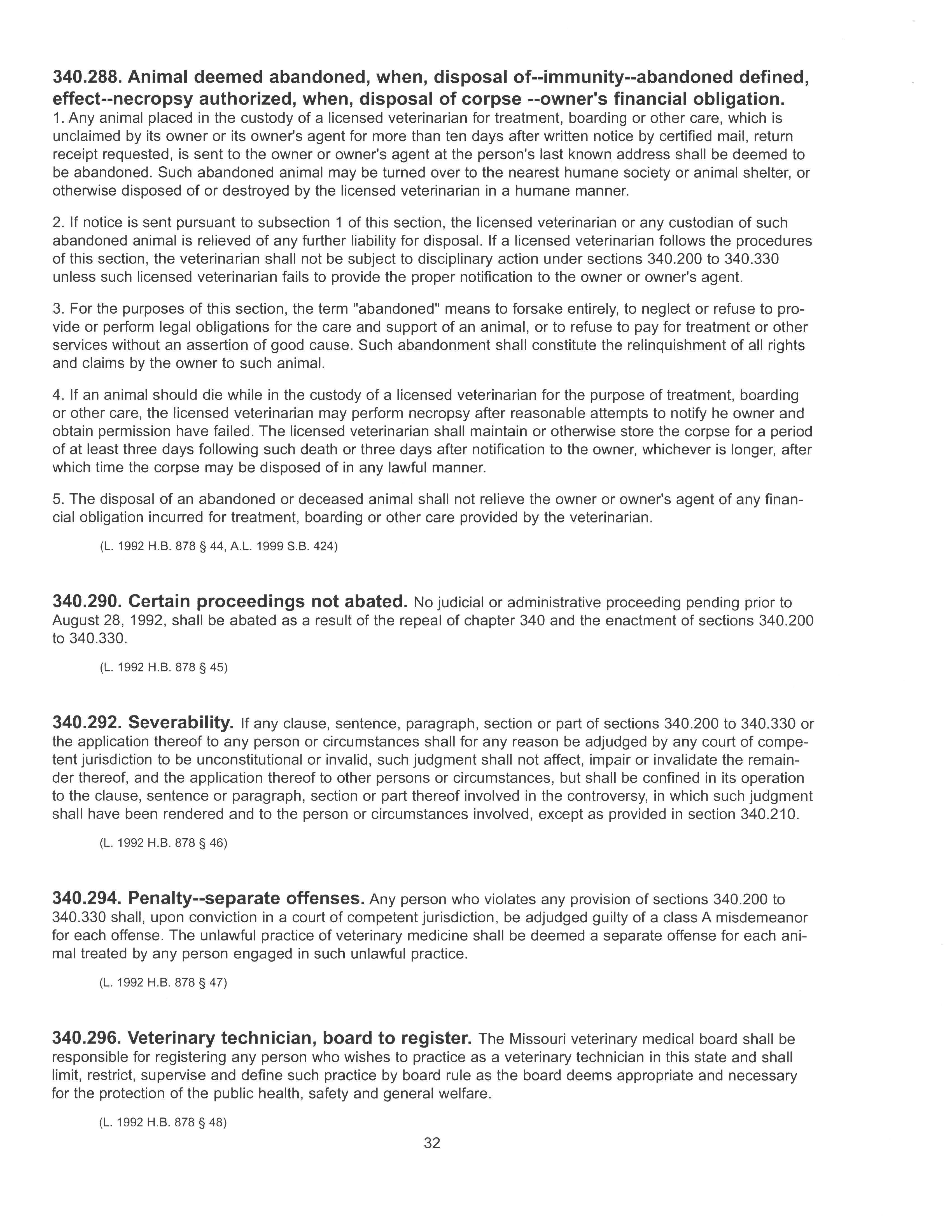
(L. 1992 H.B. 878 § 46)
340.294. Penalty--separate offenses. Any person who violates any provision of sections 340.200 to 340.330 shall, upon conviction in a court of competent jurisdiction, be adjudged guilty of a class A misdemeanor for each offense. The unlawful practice of veterinary medicine shall be deemed a separate offense for each animal treated by any person engaged in such unlawful practice.
(L. 1992 H.B. 878 § 47)
340.296. Veterinary technician, board to register. The Missouri veterinary medical board shall be responsible for registering any person who wishes to practice as a veterinary technician in this state and shall limit, restrict, supervise and define such practice by board rule as the board deems appropriate and necessary for the protection of the public health, safety and general welfare.
(L. 1992 H.B 878 § 48)
Animal deemed abandoned, when, disposal of--immunity--abandoned defined, effect--necropsy authorized, when, disposal of corpse --owner's financial obligation.
32
340.298. Provisions applicable to technicians. All provisions of sections 340 200 to 340 296 shall be applicable to licensed veterinarians and registered veterinary technicians , except as otherwise specifically provided for in sections 340.298 to 340 330. Whenever the term "veterinarian" or "veterinary practice" is used in sections 340.200 to 340.300, it shall mean veterinary technician or the practice of a veterinary technician.
(L. 1992 H B. 878 § 49)
340.300. Veterinary technician, registration of, application, contents --qualifications.
1. Any person desiring to be registered as a veterinary technician in the state of Missouri shall submit a written application to the board. Such application shall be on forms furnished by the board without charge.
2. Each application shall contain a statement that is made under oath or affirmation that representations made therein are true, correct and contain no material omissions of fact to the best knowledge and belief of the person making the application and whose signature shall be subscribed thereto. Any person who knowingly submits false information, information intended to mislead the board, or omits a material fact on the application shall be subject to penalties provided for by the laws of this state for giving a false statement under oath or affirmation; such penalty is in addition to and not in lieu of any action which the board takes pursuant to the provisions of sections 340.200 to 340.330
3. To qualify to be registered as a veterinary technician pursuant to this section, the application must show that the applicant:
(1) Is at* least eighteen years of age;
(2) Is of good moral character;
(3) Has successfully completed a college level course of study in veterinary technology in a school having a curriculum approved by the board or a college level course in the care and treatment of animals which is accredited by the AVMA; and
(4) Has passed an examination or examinations as prescribed by board rule. The examination or examinations shall be designed to test the examinee's knowledge of, proficiency in, subjects and techniques commonly taught in schools providing a curriculum in veterinary technology, familiarity with the requirements of sections 340.200 to 340.330, related statutes and board rules, and other material as determined by the board. An examinee must demonstrate scientific, practical and legal knowledge sufficient to establish to the board that the applicant is competent to practice as a veterinary technician. Applications for examination shall be in writing, on a form furnished by the board and shall include evidence satisfactory to the board that the applicant possesses the qualifications set forth in subdivisions (1 ), (2) and (3) of this subsection.
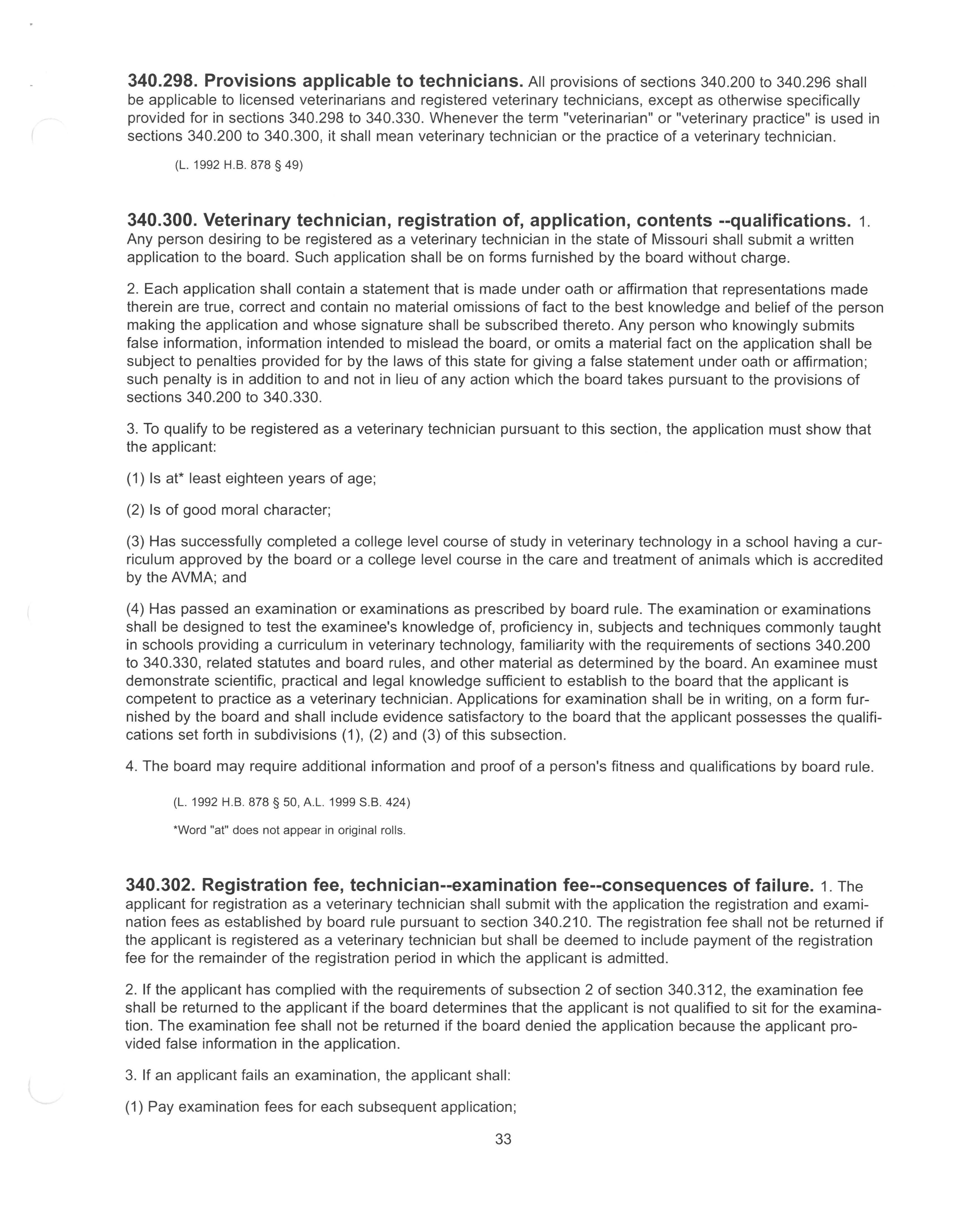
4. The board may require additional information and proof of a person's fitness and qualifications by board rule
(L 1992 H B. 878 §50 , A L. 1999 S B 424)
*Word "at" does not appear in original rolls
340.302. Registration fee, technician--examination fee--consequences of failure.
1. The applicant for registration as a veterinary technician shall submit with the application the registration and examination fees as established by board rule pursuant to section 340.210. The registration fee shall not be returned if the applicant is registered as a veterinary technician but shall be deemed to include payment of the registration fee for the remainder of the registration period in which the applicant is admitted.
2. If the applicant has complied with the requirements of subsection 2 of section 340.312, the examination fee shall be returned to the applicant if the board determines that the applicant is not qualified to sit for the examination. The examination fee shall not be returned if the board denied the application because the applicant provided false information in the application.
3. If an applicant fails an examination, the applicant shall:
(1) Pay examination fees for each subsequent application;
33
(2) Wait for some period of time as prescribed by board rule from the date of the failed examination to take the next examination; and
(3) Prior to the fourth and final attempt at passage, present to the board, for approval, a plan for passage and evidence of completion of at least ten hours of board-approved continuing education taken since the last examination since last sitting for the examination or in the calendar year preceding the final application.
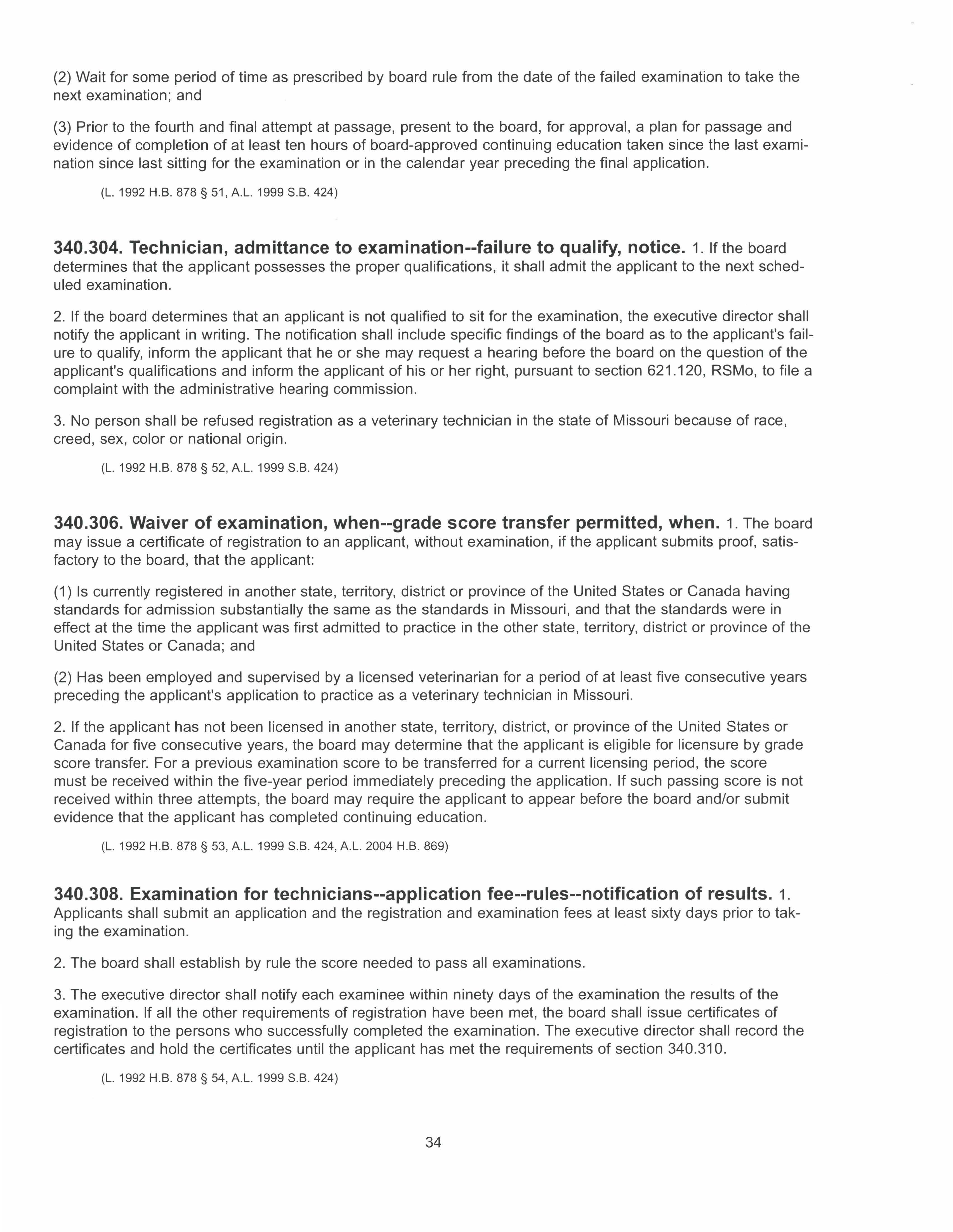
(L. 1992 H.B. 878 §51, A.L 1999 S.B. 424)
340.304. Technician, admittance to examination--failure to qualify, notice.
1. If the board determines that the applicant possesses the proper qualifications, it shall admit the applicant to the next scheduled examination.
2. If the board determines that an applicant is not qualified to sit for the examination, the executive director shall notify the applicant in writing. The notification shall include specific findings of the board as to the applicant's failure to qualify, inform the applicant that he or she may request a hearing before the board on the question of the applicant's qualifications and inform the applicant of his or her right, pursuant to section 621.120, RSMo, to file a complaint with the administrative hearing commission.
3. No person shall be refused registration as a veterinary technician in the state of Missouri because of race, creed, sex, color or national origin.
(L. 1992 H.B. 878 §52, A L. 1999 S.B. 424)
340.306. Waiver of examination, when--grade score transfer permitted, when.
1. The board may issue a certificate of registration to an applicant, without examination, if the applicant submits proof, satisfactory to the board, that the applicant:
(1) Is currently registered in another state, territory, district or province of the United States or Canada having standards for admission substantially the same as the standards in Missouri, and that the standards were in effect at the time the applicant was first admitted to practice in the other state, territory, district or province of the United States or Canada; and
(2) Has been employed and supervised by a licensed veterinarian for a period of at least five consecutive years preceding the applicant's application to practice as a veterinary technician in Missouri.
2. If the applicant has not been licensed in another state, territory, district, or province of the United States or Canada for five consecutive years, the board may determine that the applicant is eligible for licensure by grade score transfer. For a previous examination score to be transferred for a current licensing period, the score must be received within the five-year period immediately preceding the application. If such passing score is not received within three attempts, the board may require the applicant to appear before the board and/or submit evidence that the applicant has completed continuing education.
(L. 1992 H.B. 878 §53, A L. 1999 S.B. 424, A.L. 2004 H B. 869)
340.308. Examination for technicians--application fee--rules--notification of results.
1. Applicants shall submit an application and the registration and examination fees at least sixty days prior to taking the examination.
2. The board shall establish by rule the score needed to pass all examinations.
3. The executive director shall notify each examinee within ninety days of the examination the results of the examination. If all the other requirements of registration have been met, the board shall issue certificates of registration to the persons who successfully completed the examination. The executive director shall record the certificates and hold the certificates until the applicant has met the requirements of section 340.310.
(L. 1992 H B. 878 §54, A.L. 1999 S B. 424)
34
340.310. Notice to successful examinees. The board shall send a letter, signed by the board chairperson or vice chairperson, to all successful examinees for registration as a veterinary technician ; however, the board shall not send a certificate of registration until the applicant has submitted proof of employment and supervision by a licensed* veterinarian. Upon receipt of such proof, the executive director shall issue the certificate of registration.
(L 1992 H B 878 §55)
*Word "byveterinared" appears in original rolls, an apparent printing error
340.312. Technician certification, inactive status, when--notification of termination of employment--continuing education required, when. 1. If the technician leaves the employment or supervision of the licensed veterinarian and is not employed by or supervised by another licensed veterinarian within thirty days of the termination of his or her employment, the technician's certificate shall be placed on inactive status. It is the responsibility of the technician to inform the executive director within thirty days of termination of his or her employment. It is grounds for revocation of the technician's certificate if he or she fails to notify the executive director of such termination.
2. Any veterinary technician in the state of Missouri whose certificate has been on inactive status will be required to complete the required continuing education credits in accordance with rules of the board, pay all fees and meet all other requirements of sections 340.200 to 340.330 and board rules for registration as a veterinary technician.
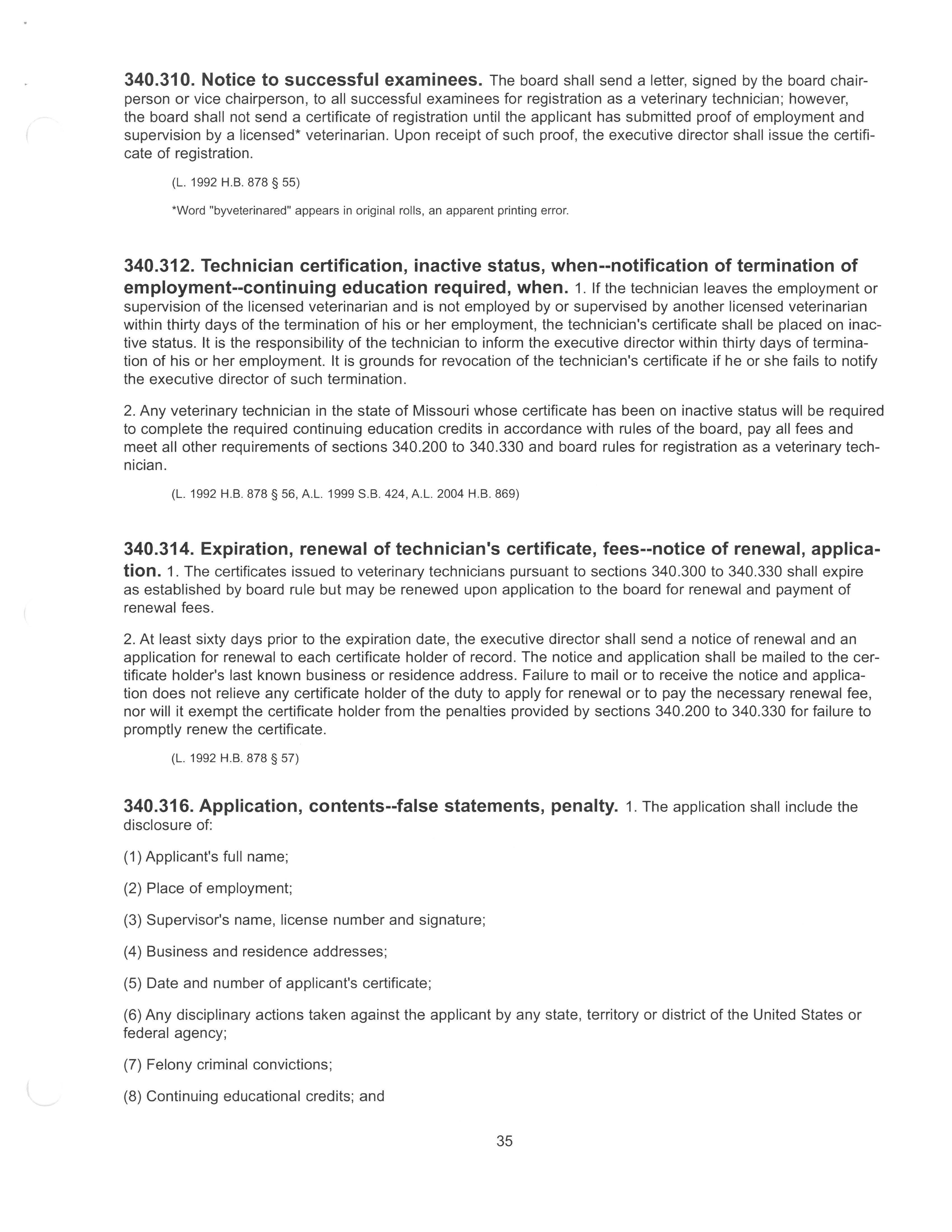
(L. 1992 H.B 878 §56, A.L 1999 S.B 424, A L 2004 H B. 869)
340.314. Expiration, renewal of technician's certificate, fees--notice of renewal, application. 1. The certificates issued to veterinary technicians pursuant to sections 340.300 to 340 330 shall expire as established by board rule but may be renewed upon application to the board for renewal and payment of renewal fees.
2. At least sixty days prior to the expiration date, the executive director shall send a notice of renewal and an application for renewal to each certificate holder of record. The notice and application shall be mailed to the certificate holder's last known business or residence address. Failure to mail or to receive the notice and application does not relieve any certificate holder of the duty to apply for renewal or to pay the necessary renewal fee, nor will it exempt the certificate holder from the penalties provided by sections 340.200 to 340.330 for failure to promptly renew the certificate.
(L 1992 H.B. 878 §57)
340.316. Application, contents--false statements, penalty. 1. The application shall include the disclosure of:
(1) Applicant's full name;
(2) Place of employment;
(3) Supervisor's name, license number and signature;
(4) Business and residence addresses ;
(5) Date and number of applicant's certificate;
(6) Any disciplinary actions taken against the applicant by any state, territory or district of the United States or federal agency;
(7) Felony criminal convictions;
(8) Continuing educational credits; and 35
(9) Other information deemed necessary by the board to assess the applicant's fitness for certificate renewal.
2 The appl ication shall be made under oath or affirmation by the applicant. The applicant is subject to penalties provided for under the laws of this state for making a false statement under an oath or affirmation, which shall be in addition to and not in lieu of any penalty or other discipline provided for by sections 340.200 to 340.330.
(l. 1992 H B 878 §58)
340.318. Declaration of noncurrency for failure to renew certificate, notice. If a certificate holder fails to submit an application and fees within thirty days of expiration of the certificate, the executive director shall notify the certificate holder that the application and fees have not been received and that the certificate holder's failure to respond within ten days will result in his or her certificate being declared noncurrent. The notification shall be sent by certified mail, return receipt requested , to the certificate holder's last known business and residence addresses. If the application and fee is not received within ten days after the return receipt is received, the certificate shall be declared noncurrent and the executive director shall notify the certificate holder of such declaration by certified mail, return receipt requested, at the certificate holder's last known business and residence addresses that his or her certification has been declared noncurrent and that the certificate holder shall not practice as a veterinary technician until he or she applies for reinstatement and pays the required fees.
(l. 1992 H B 878 §59, A.L. 1999 S.B. 424)
340.320. Practice as technician after revocation, penalty--application for renewal. 1. Any person who practices as a veterinary technician after his or her certificate has been revoked pursuant to section 340 318 is in violation of sections 340.200 to 340.330 and subject to criminal prosecution as provided for under sections 340.200 to 340.330. Such criminal penalty shall be in addition to and not in lieu of any penalty or other discipline provided for under sections 340.200 to 340.330.
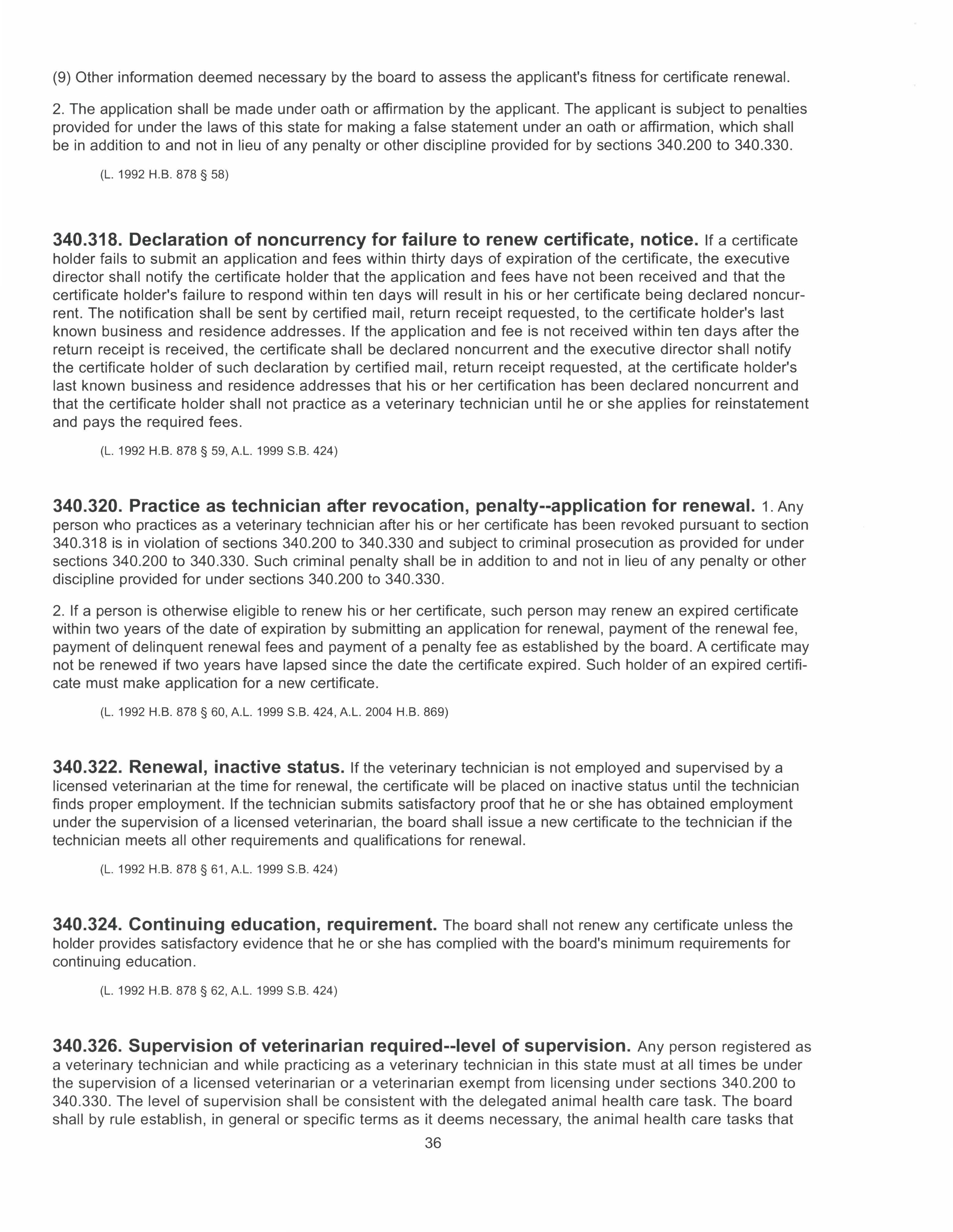
2. If a person is otherwise eligible to renew his or her certificate, such person may renew an expired certificate within two years of the date of expiration by submitting an application for renewal, payment of the renewal fee, payment of delinquent renewal fees and payment of a penalty fee as established by the board. A certificate may not be renewed if two years have lapsed since the date the certificate expired. Such holder of an expired certificate must make application for a new certificate. (L.
340.322. Renewal, inactive status. If the veterinary technician is not employed and supervised by a licensed veterinarian at the time for renewal, the certificate will be placed on inactive status until the technician finds proper employment. If the technician submits satisfactory proof that he or she has obtained employment under the supervision of a licensed veterinarian, the board shall issue a new certificate to the technician if the technician meets all other requirements and qualifications for renewal.
(l
340.324. Continuing education, requirement. The board shall not renew any certificate unless the holder provides satisfactory evidence that he or she has complied with the board's minimum requirements for continuing education.
(L. 1992 H B 878 § 62 , A.L 1999 S B 424)
340.326. Supervision of veterinarian required--level of supervision. Any person registered as a veterinary technician and while practicing as a veterinary technician in this state must at all times be under the supervision of a licensed veterinarian or a veterinarian exempt from licensing under sections 340.200 to 340.330 The level of supervision shall be consistent with the delegated animal health care task The board shall by rule establish, in general or specific terms as it deems necessary, the animal health care tasks that 36
1992 H B 878 § 60, A.L. 1999 S B 424, A L. 2004 H B. 869)
1992 H B 878 § 61 , A L 1999 S B 424)
veterinary technicians may provide and the level of supervision that is required by the licensed veterinarian for any delegated health care task.
(L 1992 H B 878 § 63)
340.328. Emergency treatment authorized--immunity. Any veterinary technician duly registered pursuant to sections 340.200 to 340.330 who gratuitously and in good faith gives emergency treatment to a sick or injured animal at the scene of an accident or emergency shall not be in violation of sections 340.200 to 340.330 and shall not be liable in any civil action for damages to the owner of such animal. This section is not intended to provide immunity for acts which constitute gross negligence.
(L. 1992 H.B. 878 § 64)
340.330. Disciplinary action against technician authorized, when. The provisions and causes of actions as set forth under section 340.264 are applicable to veterinary technicians in all respects. The board may, also, take disciplinary action against a veterinary technician if the technician:
(1) Solicits patients from any licensed veterinarian;
(2) Solicits or receives any form of compensation from any person for services rendered other than from the veterinarian under whom the technician is employed;
(3) Willfully or negligently divulges a professional confidence or discusses a veterinarian's diagnosis or treatment without the express permission of the veterinarian; or
(4) Demonstrates a manifest incapability or incompetence to perform as a veterinary technician.
(L. 1992 H.B 878 § 65)
340.335. Loan repayment program for veterinary graduates--fund created.
1. Sections 340.335 to 340.350 establish a loan repayment program for graduates of approved veterinary medical schools who practice in areas of defined need and shall be known as the "Large Animal Veterinary Medicine Loan Repayment Program".
2. The "Large Animal Veterinary Medicine Loan Repayment Program Fund" is hereby created in the state treasury. All funds recovered from an individual pursuant to section 340.34 7 and all funds generated by loan repayments and penalties received pursuant to section 340.347 shall be credited to the fund. The moneys in the fund shall be used by the department of agriculture to provide loan repayments pursuant to section 340.343 in accordance with sections 340.335 to 340.350.
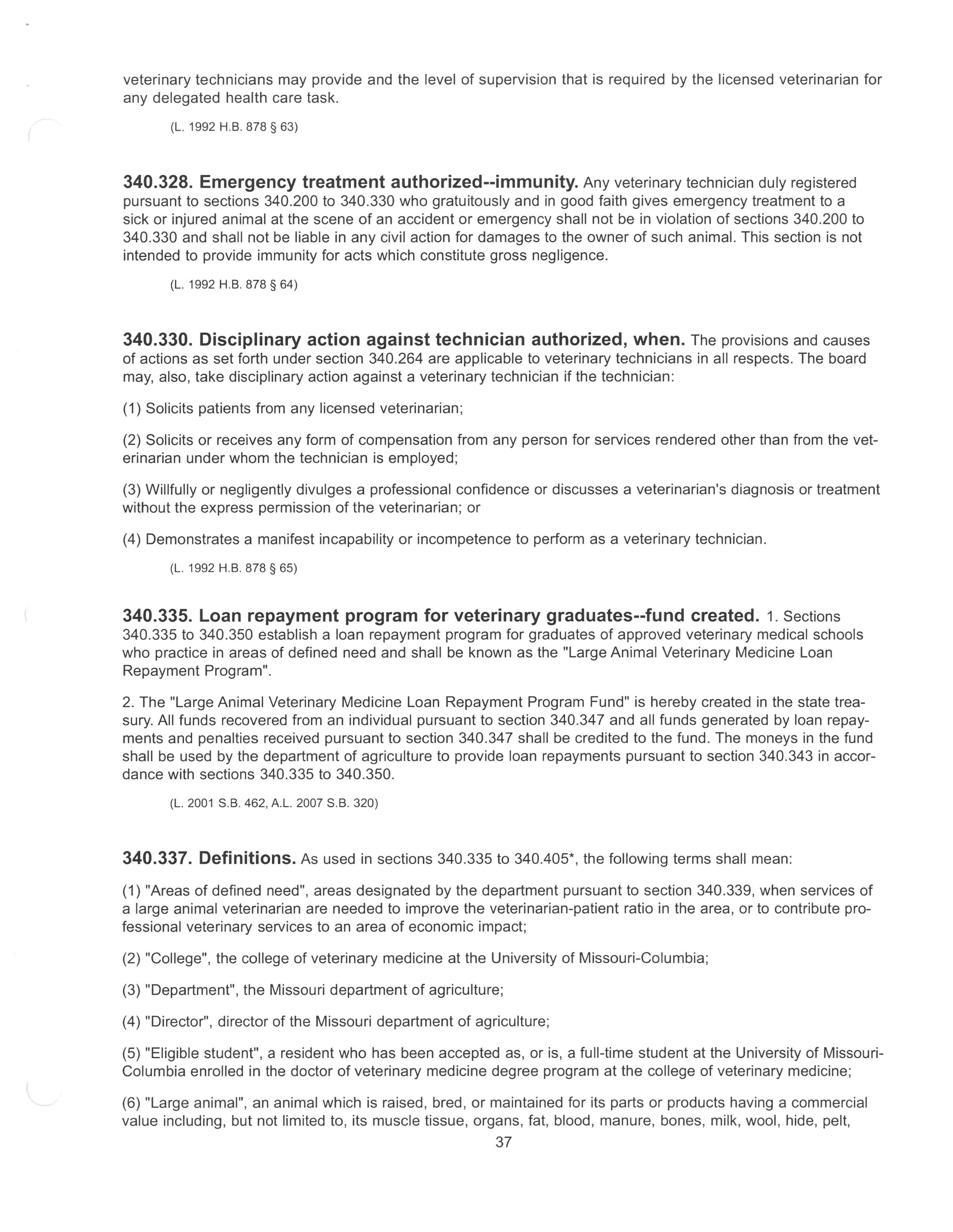
(L 2001 S.B 462, A.L. 2007 S.B 320)
340.337. Definitions. As used in sections 340.335 to 340.405*, the following terms shall mean:
(1) "Areas of defined need", areas designated by the department pursuant to section 340.339, when services of a large animal veterinarian are needed to improve the veterinarian-patient ratio in the area, or to contribute professional veterinary services to an area of economic impact;
(2) "College", the college of veterinary medicine at the University of Missouri-Columbia;
(3) "Department", the Missouri department of agriculture;
(4) "Director", director of the Missouri department of agriculture;
(5) "Eligible student", a resident who has been accepted as, or is, a full-time student at the University of MissouriColumbia enrolled in the doctor of veterinary medicine degree program at the college of veterinary medicine;
(6) "Large animal", an animal which is raised, bred, or maintained for its parts or products having a commercial value including, but not limited to, its muscle tissue, organs, fat, blood, manure, bones, milk, wool, hide, pelt, 37
feathers, eggs, semen, or embryos;
(7) "Large animal veterinarian", veterinarians licensed pursuant to this chapter, engaged in general or large animal practice as their primary focus of practice, and who have a substantial portion of their practice devoted to large animal veterinary medicine;
(8) "Qualified applicant", an eligible student approved by the department for participation in the large animal veterinary student loan program established by sections 340.381 to 340.396;
(9) "Qualified employment", employment as a large animal veterinarian and where a substantial portion of business involves the treatment of large animals on a full-time basis in Missouri located in an area of need as determined by the department of agriculture. Qualified employment shall not include employment with a large-scale agribusiness enterprise, corporation, or entity. Any forgiveness of such principal and interest for any qualified applicant engaged in qualified employment on a less than full-time basis may be prorated to reflect the amounts provided in this section;
(10) "Resident", any person who has lived in this state for one or more years for any purpose other than the attending of an educational institution located within this state. (L. 2001 S.B. 462, A.L. 2007 S.B. 320, A.L. 2008 S.B. 931)
*Section 340.405 was repealed by S.B. 931, 2008.
340.339. Certain areas designated as areas of defined need by department by rule. The department shall designate counties, communities or sections of rural areas as areas of defined need as determined by the department by rule.
(L 2001 S.B. 462, A.L. 2007 S.B. 320)
340.341. Eligibility standards for loan repayment program--rulemaking authority. 1. The department shall adopt and promulgate rules establishing standards for determining eligible students for loan repayment pursuant to sections 340.335 to 340.350. Such standards shall include, but are not limited to the following:
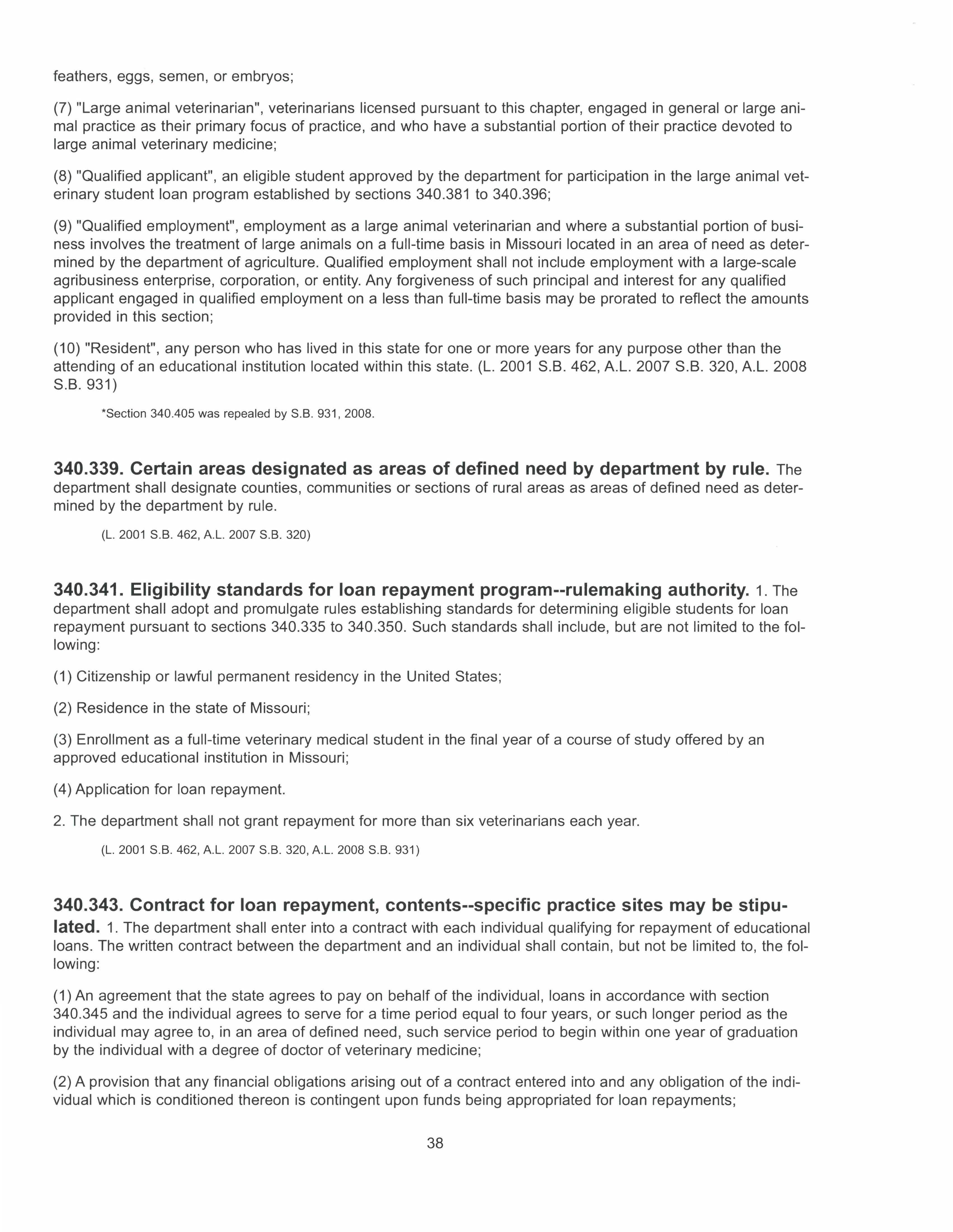
(1) Citizenship or lawful permanent residency in the United States;
(2) Residence in the state of Missouri;
(3) Enrollment as a full-time veterinary medical student in the final year of a course of study offered by an approved educational institution in Missouri;
(4) Application for loan repayment.
2. The department shall not grant repayment for more than six veterinarians each year.
(L. 2001 S.B. 462, A.L 2007 S B. 320, A L 2008 S.B. 931)
340.343.
Contract for loan repayment, contents--specific practice
sites may be
stipu-
lated. 1. The department shall enter into a contract with each individual qualifying for repayment of educational loans. The written contract between the department and an individual shall contain, but not be limited to, the following:
(1) An agreement that the state agrees to pay on behalf of the individual, loans in accordance with section 340.345 and the individual agrees to serve for a time period equal to four years, or such longer period as the individual may agree to, in an area of defined need, such service period to begin within one year of graduation by the individual with a degree of doctor of veterinary medicine;
(2) A provision that any financial obligations arising out of a contract entered into and any obligation of the individual which is conditioned thereon is contingent upon funds being appropriated for loan repayments;
38
(3) The area of defined need where the person will practice;
(4) A statement of the damages to which the state is entitled for the individual's breach of the contract;
(5) Such other statements of the rights and liabilities of the department and of the individual not inconsistent with sections 340 335 to 340.350.
2. The department may stipulate specific practice sites contingent upon department-generated large animal veterinarian need priorities where applicants shall agree to practice for the duration of their participation in the program.
(L. 2001 S B. 462, A.L. 2007 S.B 320)
340.345. Loan repayment to include principal, interest and related expenses--annual limit.
1. A loan payment provided for an individual pursuant to a written contract under the large animal veterinary medicine loan repayment program shall consist of payment on behalf of the individual of the principal, interest and related expenses on government and commercial loans received by the individual for tuition , fees, books, laboratory and living expenses incurred by the individual.
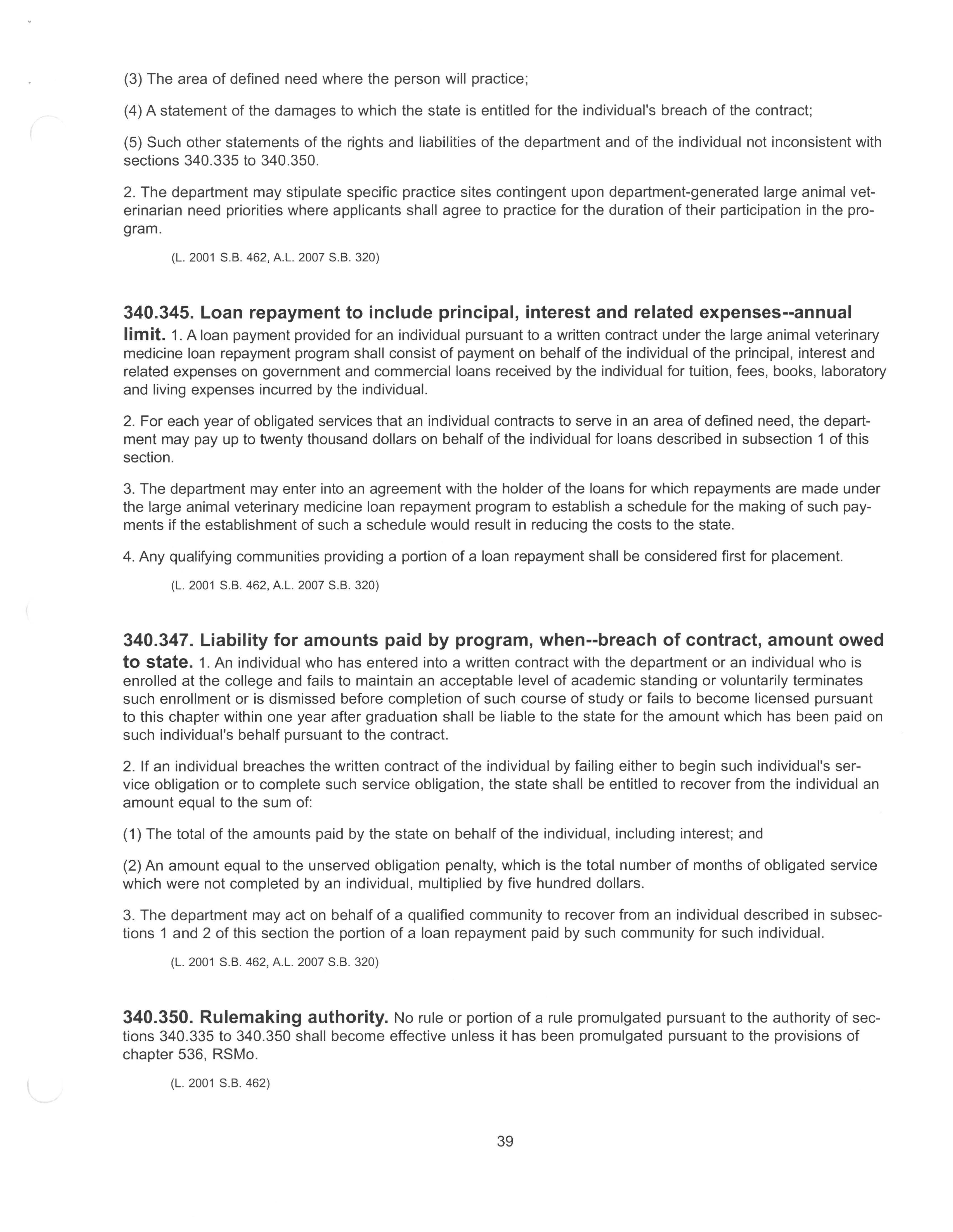
2. For each year of obligated services that an individual contracts to serve in an area of defined need, the department may pay up to twenty thousand dollars on behalf of the individual for loans described in subsection 1 of this section.
3. The department may enter into an agreement with the holder of the loans for which repayments are made under the large animal veterinary medicine loan repayment program to establish a schedule for the making of such payments if the establishment of such a schedule would result in reducing the costs to the state.
4. Any qualifying communities providing a portion of a loan repayment shall be considered first for placement.
(L 2001 S B. 462, A.L. 2007 S.B. 320)
340.347. Liability for amounts paid by program, when--breach of contract, amount owed to state.
1. An individual who has entered into a written contract with the department or an individual who is enrolled at the college and fails to maintain an acceptable level of academic standing or voluntarily terminates such enrollment or is dismissed before completion of such course of study or fails to become licensed pursuant to this chapter within one year after graduation shall be liable to the state for the amount which has been paid on such individual's behalf pursuant to the contract.
2. If an individual breaches the written contract of the individual by failing either to begin such individual's service obligation or to complete such service obligation, the state shall be entitled to recover from the individual an amount equal to the sum of:
(1) The total of the amounts paid by the state on behalf of the individual, including interest; and
(2) An amount equal to the unserved obligation penalty, which is the total number of months of obligated service which were not completed by an individual , multiplied by five hundred dollars.
3. The department may act on behalf of a qualified community to recover from an individual described in subsections 1 and 2 of this section the portion of a loan repayment paid by such community for such individual.
(L. 2001 S.B. 462, A.L 2007 S B 320)
340.350. Rulemaking authority. No rule or portion of a rule promulgated pursuant to the authority of sections 340.335 to 340.350 shall become effective unless it has been promulgated pursuant to the provisions of chapter 536 , RSMo.
(L 2001 S B 462)
39
340.375. Department to administer loan program--advisory panel to be appointed, members, duties--rulemaking authority. 1. The department of agriculture shall implement and administer the large animal veterinary medicine loan repayment program established under sections 340.335 to 340.350, and the large animal veterinary student loan program established under sections 340.381 to 340.396.
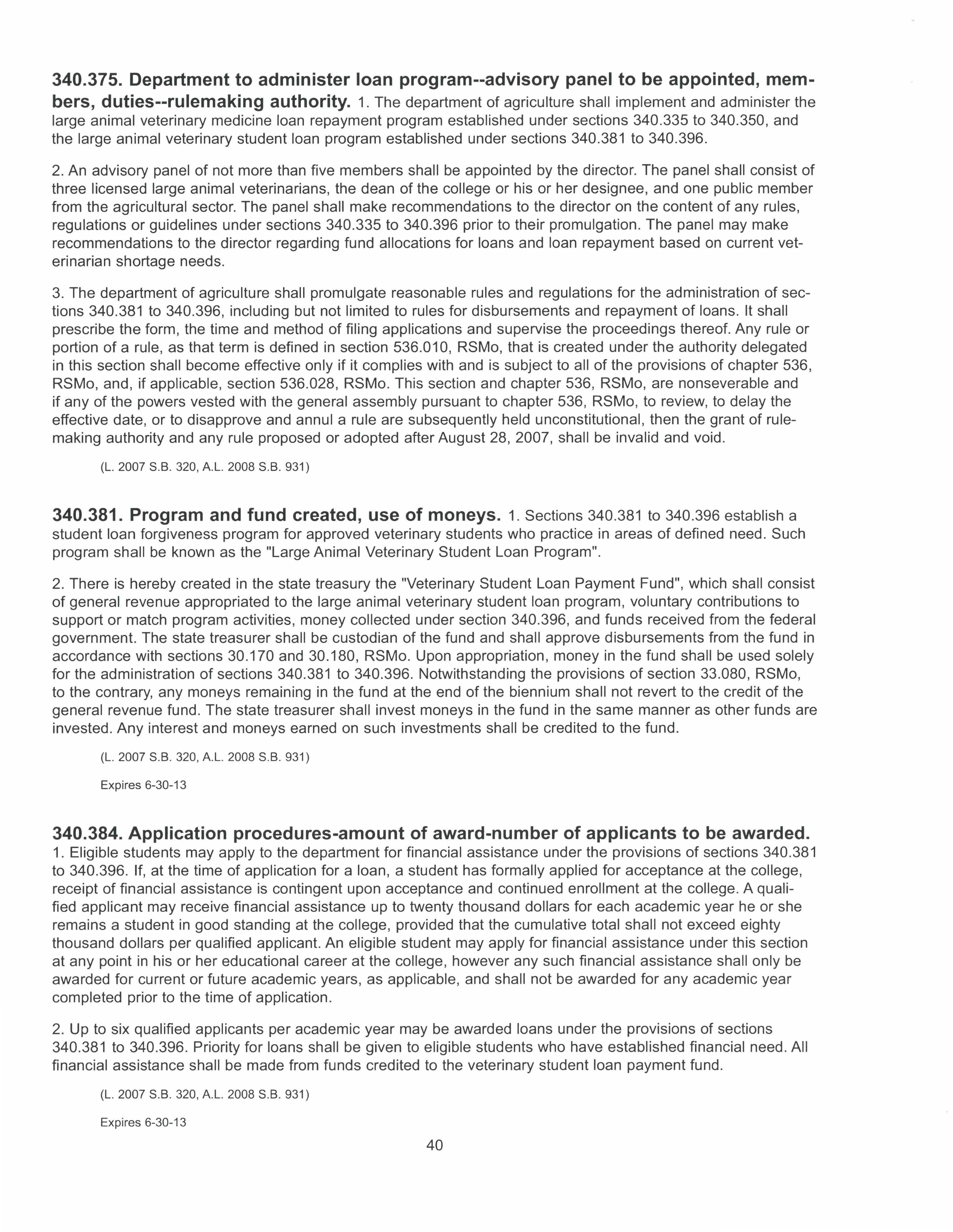
2. An advisory panel of not more than five members shall be appointed by the director. The panel shall consist of three licensed large animal veterinarians, the dean of the college or his or her designee, and one public member from the agricultural sector. The panel shall make recommendations to the director on the content of any rules, regulations or guidelines under sections 340.335 to 340.396 prior to their promulgation. The panel may make recommendations to the director regarding fund allocations for loans and loan repayment based on current veterinarian shortage needs.
3. The department of agriculture shall promulgate reasonable rules and regulations for the administration of sections 340.381 to 340.396, including but not limited to rules for disbursements and repayment of loans. It shall prescribe the form, the time and method of filing applications and supervise the proceedings thereof. Any rule or portion of a rule, as that term is defined in section 536.010, RSMo, that is created under the authority delegated in this section shall become effective only if it complies with and is subject to all of the provisions of chapter 536, RSMo, and, if applicable, section 536.028, RSMo. This section and chapter 536, RSMo, are nonseverable and if any of the powers vested with the general assembly pursuant to chapter 536, RSMo, to review, to delay the effective date, or to disapprove and annul a rule are subsequently held unconstitutional, then the grant of rulemaking authority and any rule proposed or adopted after August 28, 2007, shall be invalid and void.
(l. 2007 S.B. 320, A L. 2008 S B. 931)
340.381. Program and fund created, use of moneys.
1. Sections 340.381 to 340.396 establish a student loan forgiveness program for approved veterinary students who practice in areas of defined need. Such program shall be known as the "Large Animal Veterinary Student Loan Program".
2. There is hereby created in the state treasury the "Veterinary Student Loan Payment Fund", which shall consist of general revenue appropriated to the large animal veterinary student loan program, voluntary contributions to support or match program activities, money collected under section 340.396, and funds received from the federal government. The state treasurer shall be custodian of the fund and shall approve disbursements from the fund in accordance with sections 30.170 and 30.180, RSMo. Upon appropriation, money in the fund shall be used solely for the administration of sections 340.381 to 340.396. Notwithstanding the provisions of section 33.080, RSMo, to the contrary, any moneys remaining in the fund at the end of the biennium shall not revert to the credit of the general revenue fund. The state treasurer shall invest moneys in the fund in the same manner as other funds are invested. Any interest and moneys earned on such investments shall be credited to the fund.
(l 2007 S.B. 320, A.L. 2008 S B 931) Expires 6-30-13
340.384. Application procedures-amount of award-number of applicants to be awarded.
1. Eligible students may apply to the department for financial assistance under the provisions of sections 340.381 to 340.396. If, at the time of application for a loan, a student has formally applied for acceptance at the college, receipt of financial assistance is contingent upon acceptance and continued enrollment at the college. A qualified applicant may receive financial assistance up to twenty thousand dollars for each academic year he or she remains a student in good standing at the college, provided that the cumulative total shall not exceed eighty thousand dollars per qualified applicant. An eligible student may apply for financial assistance under this section at any point in his or her educational career at the college, however any such financial assistance shall only be awarded for current or future academic years, as applicable, and shall not be awarded for any academic year completed prior to the time of application.
2. Up to six qualified applicants per academic year may be awarded loans under the provisions of sections 340.381 to 340.396. Priority for loans shall be given to eligible students who have established financial need. All financial assistance shall be made from funds credited to the veterinary student loan payment fund.
(L. 2007 S.B. 320, A.L 2008 S B. 931) Expires 6-30-13
40
340.387. Contracts for assistance-repayment-forgiveness of loan, when.
1. The department of agriculture may enter into a contract with each qualified applicant receiving financial assistance under the provisions of sections 340.381 to 340.396. Such contract shall specify terms and conditions of loan forgiveness through qualified employment as well as terms and conditions for repayment of the principal and interest.
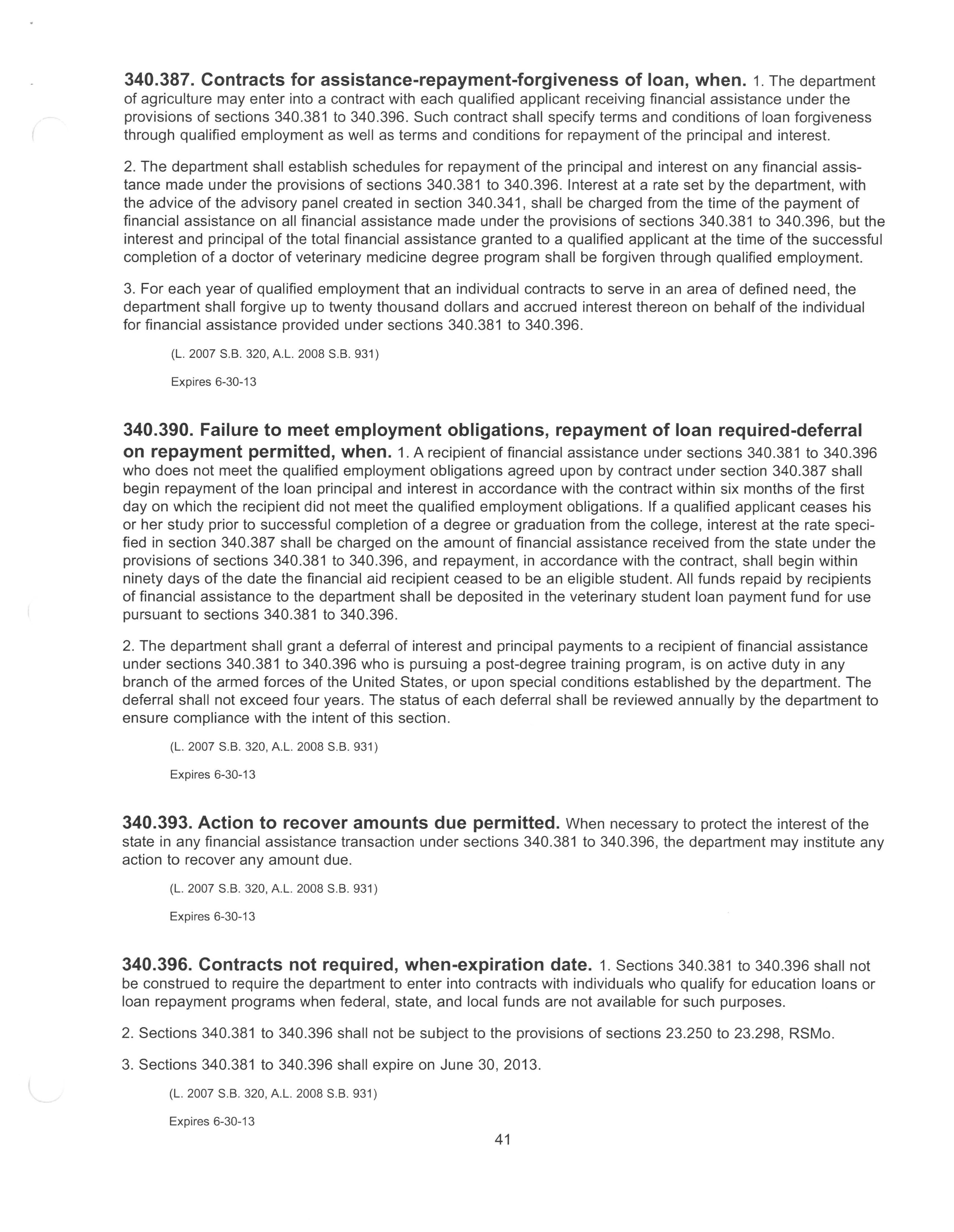
2. The department shall establish schedules for repayment of the principal and interest on any financial assistance made under the provisions of sections 340.381 to 340.396. Interest at a rate set by the department, with the advice of the advisory panel created in section 340.341, shall be charged from the time of the payment of financial assistance on all financial assistance made under the provisions of sections 340.381 to 340.396 , but the interest and principal of the total financial assistance granted to a qualified applicant at the time of the successful completion of a doctor of veterinary medicine degree program shall be forgiven through qualified employment.
3. For each year of qualified employment that an individual contracts to serve in an area of defined need, the department shall forgive up to twenty thousand dollars and accrued interest thereon on behalf of the individual for financial assistance provided under sections 340.381 to 340.396.
(L 2007 S.B. 320, A.L. 2008 S B. 931)
Expires 6-30-13
340.390. Failure to meet employment obligations, repayment of loan required-deferral on repayment permitted, when.
1. A recipient of financial assistance under sections 340.381 to 340.396 who does not meet the qualified employment obligations agreed upon by contract under section 340.387 shall begin repayment of the loan principal and interest in accordance with the contract within six months of the first day on which the recipient did not meet the qualified employment obligations. If a qualified applicant ceases his or her study prior to successful completion of a degree or graduation from the college, interest at the rate specified in section 340.387 shall be charged on the amount of financial assistance received from the state under the provisions of sections 340.381 to 340.396, and repayment, in accordance with the contract, shall begin within ninety days of the date the financial aid recipient ceased to be an eligible student. All funds repaid by recipients of financial assistance to the department shall be deposited in the veterinary student loan payment fund for use pursuant to sections 340.381 to 340.396.
2. The department shall grant a deferral of interest and principal payments to a recipient of financial assistance under sections 340.381 to 340.396 who is pursuing a post-degree training program, is on active duty in any branch of the armed forces of the United States, or upon special conditions established by the department. The deferral shall not exceed four years. The status of each deferral shall be reviewed annually by the department to ensure compliance with the intent of this section.
(L 2007 S.B. 320 , A.L. 2008 S B. 931)
Expires 6-30-13
340.393. Action to recover amounts due permitted. When necessary to protect the interest of the state in any financial assistance transaction under sections 340.381 to 340.396, the department may institute any action to recover any amount due.
(L 2007 S.B 320, A.L 2008 S B. 931)
Expires 6-30-13
340.396. Contracts not required, when-expiration date. 1. Sections 340.381 to 340.396 shall not be construed to require the department to enter into contracts with individuals who qualify for education loans or loan repayment programs when federal, state, and local funds are not available for such purposes.
2. Sections 340.381 to 340.396 shall not be subject to the provisions of sections 23.250 to 23.298, RSMo.
3. Sections 340.381 to 340.396 shall expire on June 30, 2013.
(L. 2007 S B 320, A.L 2008 S B. 931) Expires 6-30-13
41

RULES
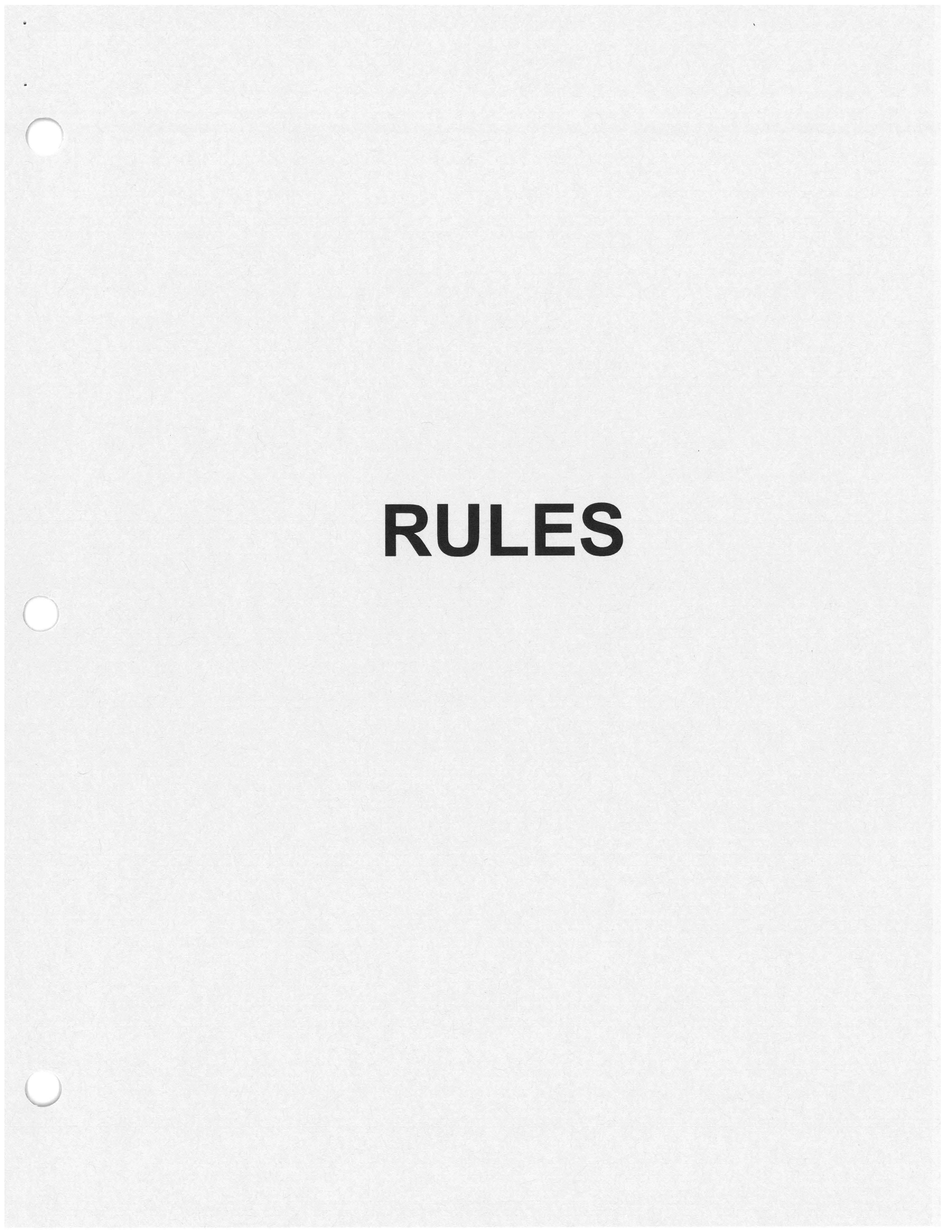

AND
Division 2270-Missouri Veterinary Medical Board Chapter 1-General Rules
20 CSR 2270-1.011 General Organization
PURPOSE: This rule specifies the duties of the board and describes its organization.
(1) The Missouri Veterinary Medical Board is a unit of the Division of Professional Registration of the Department of Commerce and Insurance.
(2) The board was established under section 340.202, RSMo, for the purpose of executing and enforcing Chapter 340, RSMo.
(3) The board consists of the state veterinarian, who serves ex officio, and five (5) appointed members, including a voting public member appointed by the governor for terms of four (4) years each. The board elects from its membership a chairperson and vice chairperson, each of whom serves for one (1) year.
(4) The board shall have at least one (1) business meeting per year. Three (3) members of the board constitutes a quorum for the transaction of business.
AUTHORITY· sections 340 208 and 340 210, RSMo 2016. *This rule originally filed as 4 CSR 270-1.011 Original rule filed Nov. 4 , 1992, effective July 8, 1993 Amended: Filed April 13, 2001, effective Oct. 30, 2001. Moved to 20 CSR 2270-1.011, effective Aug. 28, 2006. Amended: Filed July 25, 2018, effective Jan. 30, 2019.
*Original authority: 340.208, RSMo 1992 and 340.210, RSMo 1992, amended 1993, 1995, 1999.
20 CSR 2270-1.021 Fees
PURPOSE: This rule establishes the various fees authorized in Chapter 340 , RSMo.
(1) The following fees are established by the Missouri Veterinary Medical Board:
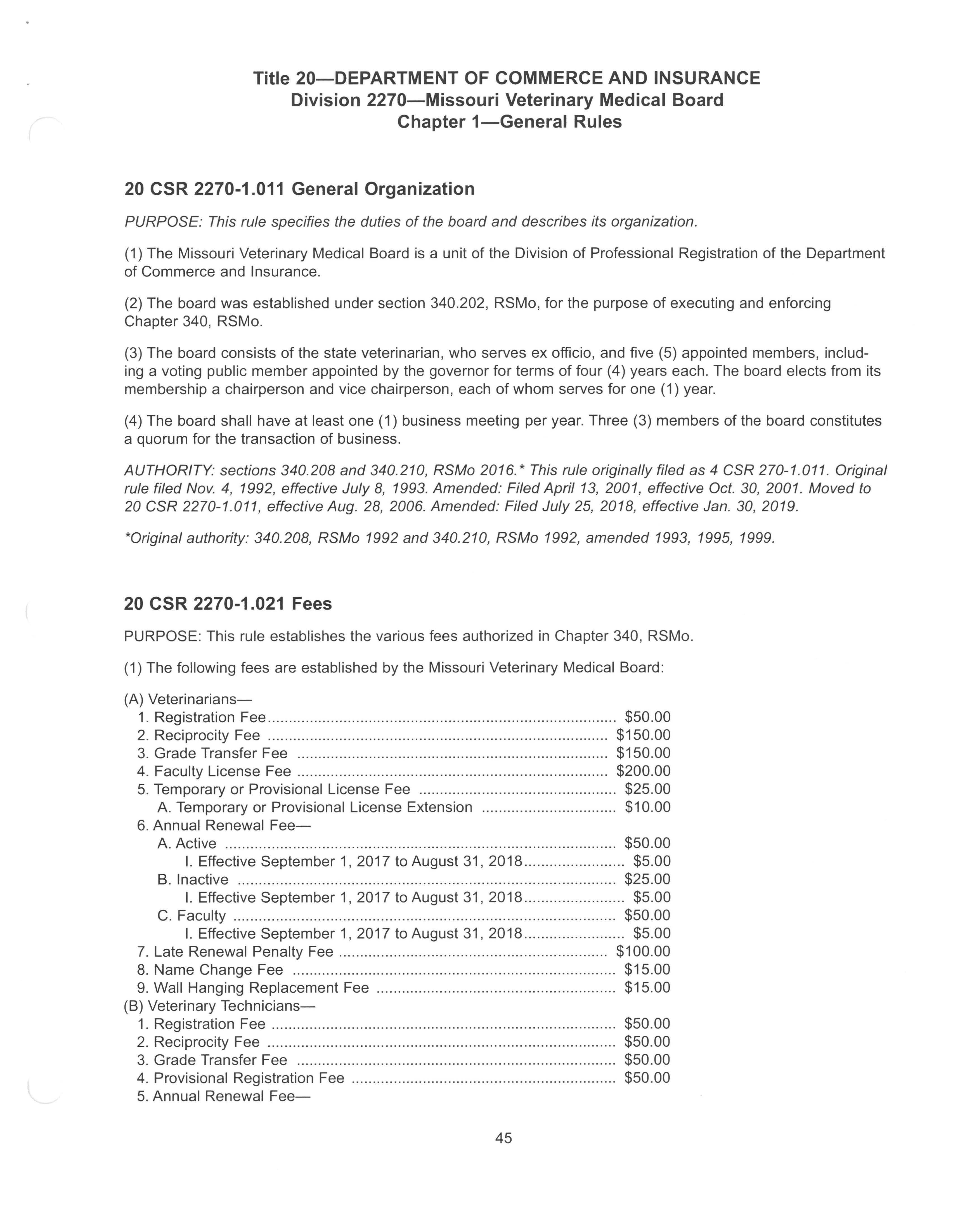
Title 20-DEPARTMENT
OF COMMERCE
INSURANCE
(A) Veterinarians1. Registration Fee .............. ..................................................................... $50.00 2. Reciprocity Fee $150.00 3. Grade Transfer Fee $150.00 4. Faculty License Fee ..... .... ........... ... .. ........................................... ...... $200.00 5. Temporary or Provisional License Fee $25.00 A. Temporary or Provisional License Extension $10.00 6. Annual Renewal FeeA. Active $50.00 I. Effective September 1, 2017 to August 31, 2018 ........................ $5.00 B. Inactive $25.00 I. Effective September 1, 2017 to August 31, 2018 $5.00 C. Faculty $50.00 I. Effective September 1, 2017 to August 31, 2018 $5.00 7. Late Renewal Penalty Fee $100.00 8. Name Change Fee $15.00 9. Wall Hanging Replacement Fee $15.00 (B) Veterinary Technicians1. Registration Fee $50.00 2. Reciprocity Fee ................................................................................... $50.00 3. Grade Transfer Fee $50.00 4. Provisional Registration Fee $50.00 5.Annual Renewal Fee45
(D)
(2) All fees, with the exception of those noted in section 340.232, RSMo, are nonrefundable.
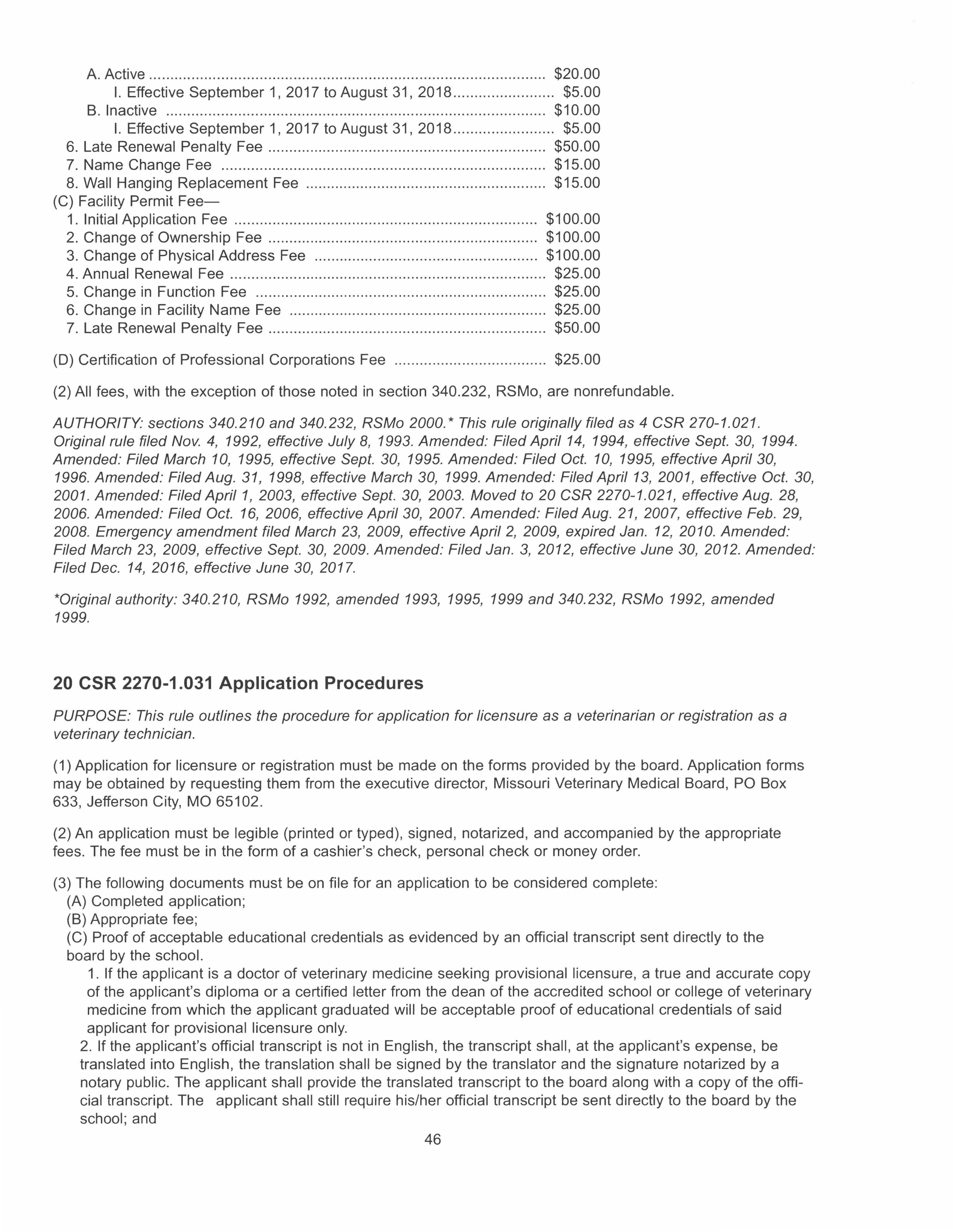
AUTHORITY" sections 340.210 and 340.232, RSMo 2000. *This rule originally filed as 4 CSR 270-1.021.
Original rule filed Nov. 4, 1992, effective July 8, 1993. Amended: Filed April 14, 1994, effective Sept. 30, 1994.
Amended: Filed March 10, 1995, effective Sept. 30, 1995. Amended: Filed Oct. 10, 1995, effective April 30, 1996. Amended: Filed Aug. 31, 1998, effective March 30, 1999. Amended: Filed April13, 2001, effective Oct. 30, 2001 Amended: Filed April1, 2003, effective Sept 30, 2003 Moved to 20 CSR 2270-1.021, effective Aug. 28, 2006. Amended: Filed Oct. 16, 2006, effective April 30, 2007. Amended: Filed Aug. 21, 2007, effective Feb. 29, 2008. Emergency amendment filed March 23, 2009, effective April 2, 2009, expired Jan. 12, 2010. Amended:
Filed March 23, 2009, effective Sept. 30, 2009. Amended: Filed Jan. 3, 2012, effective June 30, 2012. Amended: Filed Dec. 14, 2016, effective June 30, 2017.
*Original authority: 340.210, RSMo 1992, amended 1993, 1995, 1999 and 340.232, RSMo 1992, amended 1999
20 CSR 2270-1.031 Application Procedures
PURPOSE: This rule outlines the procedure for application for licensure as a veterinarian or registration as a veterinary technician.
(1) Application for licensure or registration must be made on the forms provided by the board. Application forms may be obtained by requesting them from the executive director, Missouri Veterinary Medical Board, PO Box 633, Jefferson City, MO 65102.
(2) An application must be legible (printed or typed), signed, notarized, and accompanied by the appropriate fees. The fee must be in the form of a cashier's check, personal check or money order.
(3) The following documents must be on file for an application to be considered complete:
(A) Completed application;
(B) Appropriate fee;
(C) Proof of acceptable educational credentials as evidenced by an official transcript sent directly to the board by the school.
1. If the applicant is a doctor of veterinary medicine seeking provisional licensure, a true and accurate copy of the applicant's diploma or a certified letter from the dean of the accredited school or college of veterinary medicine from which the applicant graduated will be acceptable proof of educational credentials of said applicant for provisional licensure only.
2. If the applicant's official transcript is not in English, the transcript shall, at the applicant's expense, be translated into English, the translation shall be signed by the translator and the signature notarized by a notary public. The applicant shall provide the translated transcript to the board along with a copy of the official transcript. The applicant shall still require his/her official transcript be sent directly to the board by the school; and
A. Active $20.00 I. Effective September 1, 2017 to August 31, 2018 $5.00 B. Inactive $10.00 I. Effective September 1, 2017 to August 31, 2018 $5.00 6. Late Renewal Penalty Fee $50.00 7. Name Change Fee $15.00 8. Wall Hanging Replacement Fee ........................... ................ ........... ... $15.00 (C) Facility Permit Fee1. Initial Application Fee $100.00 2. Change of Ownership Fee $100.00 3. Change of Physical Address Fee $100.00 4. Annual Renewal Fee $25.00 5. Change in Function Fee $25.00 6. Change in Facility Name Fee $25.00 7. Late Renewal Penalty Fee $50.00
of Professional Corporations Fee $25.00
Certification
46
(D) Two (2) current, standard passport photos, black and white or color, one and one-half inches by two inches (1.5" x 2.0"), with applicant's signature on the back of each.
(4) All forms must be completed and received by the board by the established deadline.
AUTHORITY· sections 340.210, 340.228, and 340.300, RSMo 2016. *This rule origi-nally filed as 4 CSR 2701.031. Original rule filed Nov. 4, 1992, effective July 8, 1993. Amended: Filed June 7, 1995, effective Dec. 30, 1995. Amended: Filed April 1, 2003, effective Sept. 30, 2003. Amended: Filed Dec. 1, 2005, effective June 30, 2006 Moved to 20 CSR 2270-1 031, effective Aug. 28 , 2006. Amended: Filed July 25, 2018, effec- five Jan. 30, 2019.
*Original authority: 340.210, RSMo 1992, amended 1993, 1995, 1999; 340.228, RSMo 1992, amended 1999; and 340.300, RSMo 1992, amended 1999
20 CSR 2270-1.040 Name and Address Changes
PURPOSE: This rule outlines the requirements for notifying the board of name and address changes.
(1) All individuals licensed as veterinarians or registered as veterinary technicians shall ensure that the license/ registration bears the current legal name of that individual.
(2) A licensee/registrant whose name is changed, within sixty (60) days of the effective change, shaii-
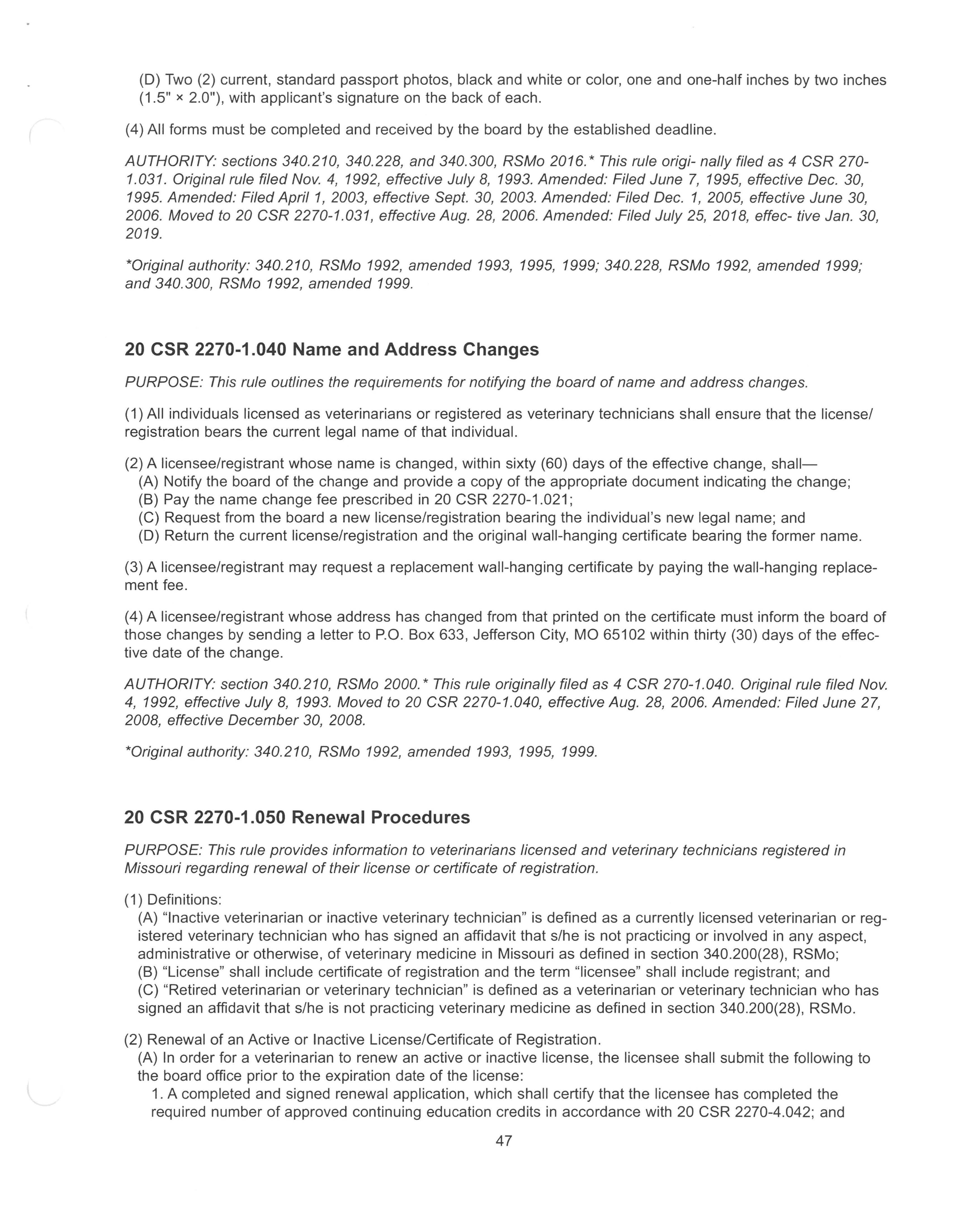
(A) Notify the board of the change and provide a copy of the appropriate document indicating the change;
(B) Pay the name change fee prescribed in 20 CSR 2270-1 021 ;
(C) Request from the board a new license/registration bearing the individual's new legal name; and
(D) Return the current license/registration and the original wall-hanging certificate bearing the former name.
(3) A licensee/registrant may request a replacement wall-hanging certificate by paying the wall-hanging replacement fee.
(4) A licensee/registrant whose address has changed from that printed on the certificate must inform the board of those changes by sending a letter to P.O. Box 633, Jefferson City, MO 65102 w ithin thirty (30) days of the effective date of the change.
AUTHORITY: section 340.210, RSMo 2000. *This rule originally filed as 4 CSR 270-1.040. Original rule filed Nov. 4, 1992, effective July 8, 1993. Moved to 20 CSR 2270-1.040, effective Aug. 28, 2006. Amended: Filed June 27, 2008, effective December 30, 2008
*Original authority: 340.210, RSMo 1992, amended 1993, 1995, 1999.
20 CSR 2270-1.050 Renewal Procedures
PURPOSE: This rule provides information to veterinarians licensed and veterinary technicians registered in Missouri regarding renewal of their license or certificate of registration.
(1) Definitions:
(A) "Inactive veterinarian or inactive veterinary technician" is defined as a currently licensed veterinarian or registered veterinary technician who has signed an affidavit that s/he is not practicing or involved in any aspect, administrative or otherwise, of veterinary medicine in Missouri as defined in section 340.200(28), RSMo;
(B) "License" shall include certificate of registration and the term "licensee" shall include registrant; and
(C) "Retired veterinarian or veterinary technician" is defined as a veterinarian or veterinary technician who has signed an affidavit that s/he is not practicing veterinary medicine as defined in section 340.200(28), RSMo.
(2) Renewal of an Active or Inactive License/Certificate of Registration.
(A) In order for a veterinarian to renew an active or inactive license, the licensee shall submit the following to the board office prior to the expiration date of the license:
1. A completed and signed renewal application, which shall certify that the licensee has completed the required number of approved continuing education credits in accordance with 20 CSR 2270-4.042 ; and 47
2. The appropriate renewal fee.
(B) In order for a veterinary technician to renew the active or inactive certificate of registration, the licensee shall submit the following to the board office prior to the expiration date of the registration:
1. A completed and signed renewal application, which has been signed by the supervising veterinarian and certifies that the licensee has completed the required number of approved continuing education credits in accordance with 20 CSR 2270-4.050; and
2. The appropriate renewal fee.
(C) If a veterinary technician is not employed under the supervision of a licensed veterinarian, his/her certificate of registration will be placed on an inactive status. An inactive veterinary technician shall sign an affidavit stating that s/he will not practice as a veterinary technician in Missouri and submit that affidavit with the renewal application and the appropriate fee to the board office.
(D) Failure to provide the requested information will result in the renewal application being returned to the licensee.
(E) Failure of a licensee to receive the notice and application to renew his/her license/registration shall not excuse him/her from the requirements of sections 340.258 or 340.314, RSMo to renew that license/certificate of registration.
(F) Failure to renew a license/registration, either active or inactive, within thirty (30) days of the license renewal date shall result in the license/certificate of registration being declared noncurrent as authorized by sections 340.258 and 340.314, RSMo.
(G) Any licensee who fails to renew his/her license/registration or whose license/certificate of registration has been declared noncurrent shall not perform or offer to perform any act for which a license is required.
(3) Restoration of a Noncurrent License/ Certificate of Registration.
(A) Any veterinarian whose license has been declared noncurrent under section 340.262, RSMo and who wishes to restore the license shall make application to the board by submitting the following within two (2) years of the license renewal date:
1. An application for renewal of licensure;
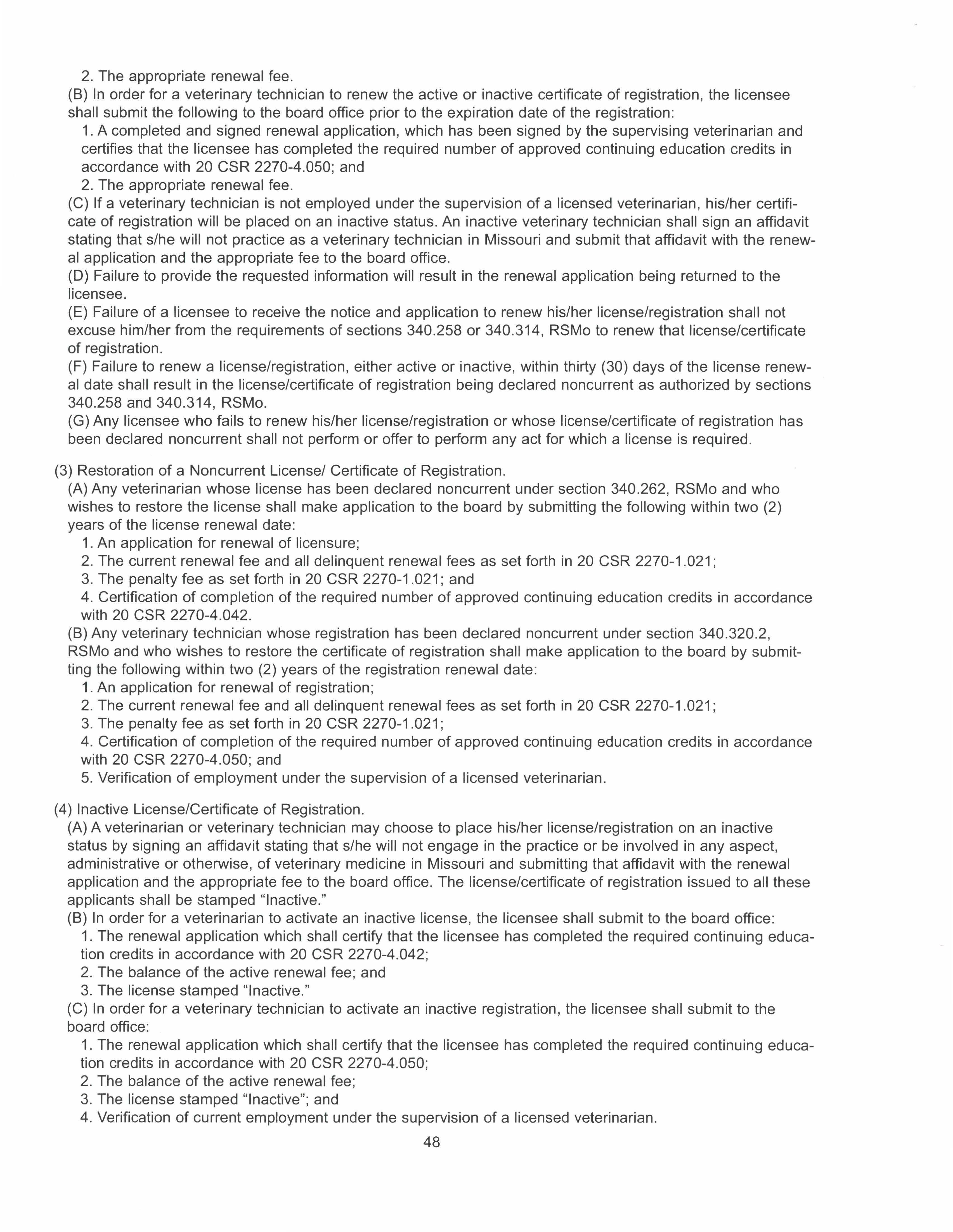
2. The current renewal fee and all delinquent renewal fees as set forth in 20 CSR 2270-1.021;
3. The penalty fee as set forth in 20 CSR 2270-1.021; and
4. Certification of completion of the required number of approved continuing education credits in accordance with 20 CSR 2270-4.042.
(B) Any veterinary technician whose registration has been declared noncurrent under section 340.320.2, RSMo and who wishes to restore the certificate of registration shall make application to the board by submitting the following within two (2) years of the registration renewal date:
1. An application for renewal of registration;
2. The current renewal fee and all delinquent renewal fees as set forth in 20 CSR 2270-1.021;
3. The penalty fee as set forth in 20 CSR 2270-1.021;
4. Certification of completion of the required number of approved continuing education credits in accordance with 20 CSR 2270-4.050; and
5. Verification of employment under the supervision of a licensed veterinarian.
(4) Inactive License/Certificate of Registration.
(A) A veterinarian or veterinary technician may choose to place his/her license/registration on an inactive status by signing an affidavit stating that s/he will not engage in the practice or be involved in any aspect, administrative or otherwise, of veterinary medicine in Missouri and submitting that affidavit with the renewal application and the appropriate fee to the board office. The license/certificate of registration issued to all these applicants shall be stamped "Inactive."
(B) In order for a veterinarian to activate an inactive license, the licensee shall submit to the board office:
1. The renewal application which shall certify that the licensee has completed the required continuing education credits in accordance with 20 CSR 2270-4.042;
2. The balance of the active renewal fee; and
3. The license stamped "Inactive."
(C) In order for a veterinary technician to activate an inactive registration, the licensee shall submit to the board office:
1. The renewal application which shall certify that the licensee has completed the required continuing education credits in accordance with 20 CSR 2270-4.050;
2. The balance of the active renewal fee;
3. The license stamped "Inactive"; and
4. Verification of current employment under the supervision of a licensed veterinarian.
48
(D) The board will issue an active license/certificate of registration, which shall be effective until the next regular renewal date. No penalty fee shall apply.
(5) Retired License/Certificate of Registration
(A) A veterinarian or veterinary technician may place his/her license/registration on a retired status by signing an affidavit stating the date of retirement and submitting that affidavit with the renewal application to the board office. No fee is required and no certificate will be issued. The retired status will prevent the license/registration from being declared noncurrent pursuant to section 340.258.5, RSMo.
(B) If a retired veterinarian decides to again practice veterinary medicine, s/he must submit to the board office a completed renewal application which shall certify that the licensee has completed the required continuing education credits in accordance with 20 CSR 2270-4.042 and the current renewal fee. The board will issue an active license which shall be effective until the next regular renewal date. No penalty fee shall apply. If it has been more than two (2) years since the retirement affidavit was submitted, evidence of ten (1 0) hours of continuing education for each year of retirement must be submitted with the renewal application. The board reserves the right pursuant to section 340.268, RSMo to direct any such applicant to take an examination(s) to reactivate his/her license.
(C) If a retired veterinary technician decides to again practice veterinary medicine, s/he shall submit to the board office a completed renewal application along with the current renewal fee. The renewal application shall verify current employment under the supervision of a licensed veterinarian and certify completion of the required number of approved continuing education credits in accordance with 20 CSR 2270-4.050. The board will issue an active registration which shall be effective until the next regular renewal date. No penalty fee shall apply. The board reserves the right pursuant to section 340.268, RSMo to direct any such applicant to take an examination(s) to reactivate his/her registration.
(D) Any retired veterinarian or veterinary technician or any veterinarian or veterinary technician with an inactive license is not currently eligible to practice in Missouri and will be subject to disciplinary action under sections 340.264, 340.294 and 340.330, RSMo if s/he practices or offers to practice in Missouri.
AUTHORITY: sections 340.210 340.258, 340.314, 340.322, 340.324 and 340.326, RSMo 2000 and 340.262, 340.312 and 340.320, RSMo Supp. 2007.* This rule originally filed as 4 CSR 270-1.050. Original rule filed Nov. 4, 1992, effective July 8, 1993. Amended: Filed April 14, 1994, effective Sept. 30, 1994. Rescinded and readopted: Filed April13, 2001, effective Oct. 30, 2001. Amended: Filed Dec. 1, 2005, effective June 30, 2006. Moved to 20 CSR 2270-1.050, effective Aug. 28, 2006. Amended: Filed Aug. 11, 2006, effective Jan 30, 2007 Amended: Filed June 27m 2008, effective Dec. 30, 2008.
*Original authority: 340.210, RSMo 1992, amended 1993, 1995, 1999; 340.258, RSMo 1992, amended 1999; 340.262, RSMo 1992, amended 1999, 2004; 340.312, RSMo 1992, amended 1999, 2004; 340.314, RSMo 1992; 340.320, RSMo 1992, amended 1999, 2004; 340.322, RSMo 1992, amended 1999; 340.324, RSMo 1992, amended 1999; and 340.326, RSMo 1992.
20 CSR 2270-1.051 Renewal of License or Registration for Military Members
PURPOSE: This rule sets forth the procedures for licensees and registrants who are members of any United States or State of Missouri military, pursuant to section 41.950, RSMo, who have served on active military duty, pursuant to section 41.950, RSMo. Specifically, the rule sets forth procedures for the renewal of a license or registration, for completing obligations of the board, and for discipline of a license or registration .
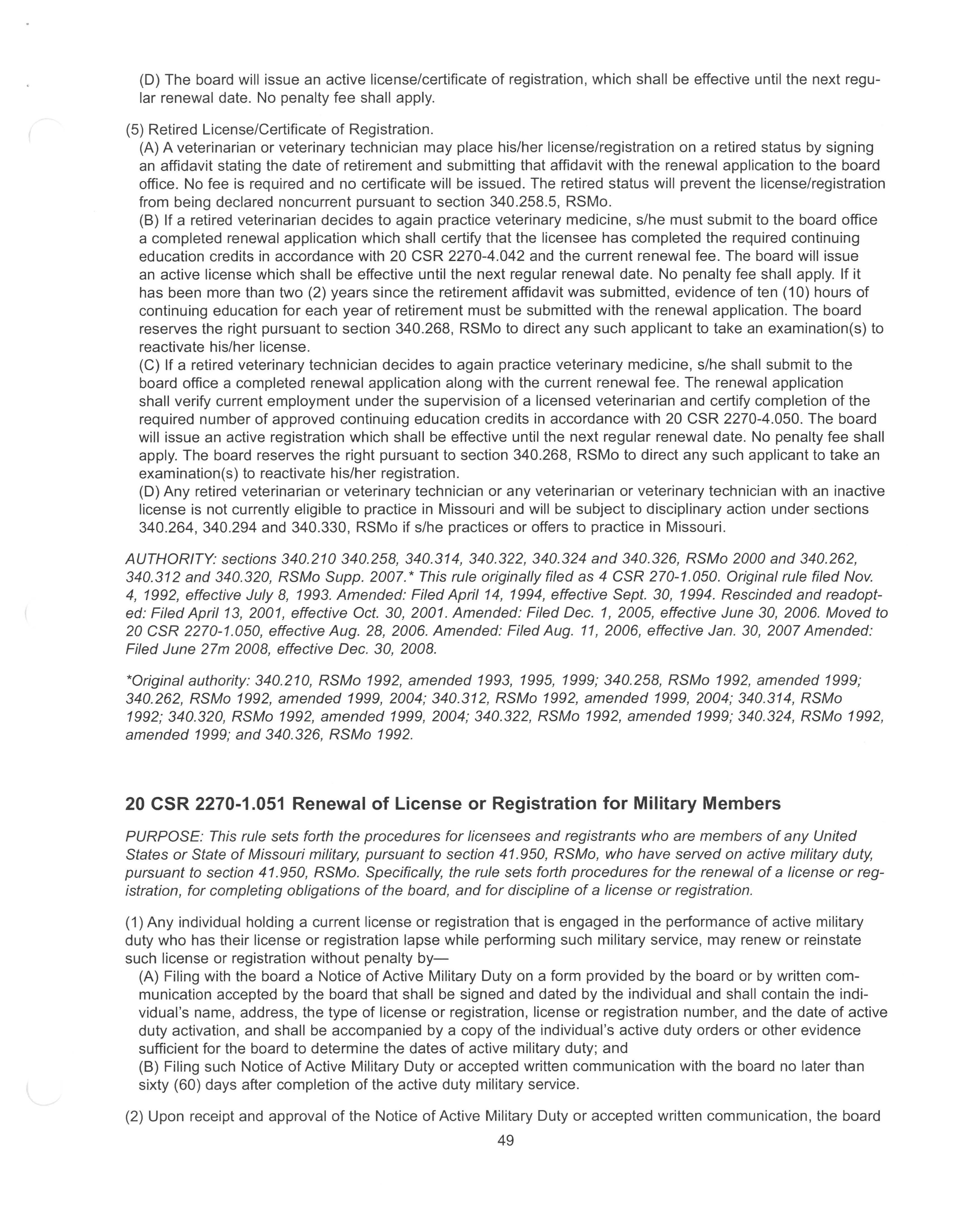
(1) Any individual holding a current license or registration that is engaged in the performance of active military duty who has their license or registration lapse while performing such military service, may renew or reinstate such license or registration without penalty by-
(A) Filing with the board a Notice of Active Military Duty on a form provided by the board or by written communication accepted by the board that shall be signed and dated by the individual and shall contain the individual's name, address, the type of license or registration, license or registration number, and the date of active duty activation, and shall be accompanied by a copy of the individual's active duty orders or other evidence sufficient for the board to determine the dates of active military duty; and
(B) Filing such Notice of Active Military Duty or accepted written communication with the board no later than sixty (60) days after completion of the active duty military service.
(2) Upon receipt and approval of the Notice of Active Military Duty or accepted written communication, the board 49
shall reinstate the individual's license or registration with no further requirements.
(3) If a licensee or registrant fails to take any required action or fails to meet any required obligation of the board while the licensee or registrant is on active military duty, the licensee or registrant shall have at least one hundred eighty (180) days after the end of his or her active military duty to take those actions or fulfill those obligations before any administrative action can be taken by the board.
(4) If the board desires to initiate disciplinary action, administrative action, or any other proceeding where the licensee or registrant is a necessary party and the licensee or registrant is on active military duty, the board shall stay such action or proceeding until at least sixty (60) days after the licensee or registrant returns from active duty.
AUTHORITY" sections 41.950 and 340.210, RSMo 2016. *Original rule filed Aug. 8, 2016, effective Feb. 28, 2017.
*Original authority: 41.950, RSMo 1991, amended 2007, 2009, 2011 and 340.210, RSMo 1992, amended 1993, 1995, 1999.
20 CSR 2270-1.060 Public Records
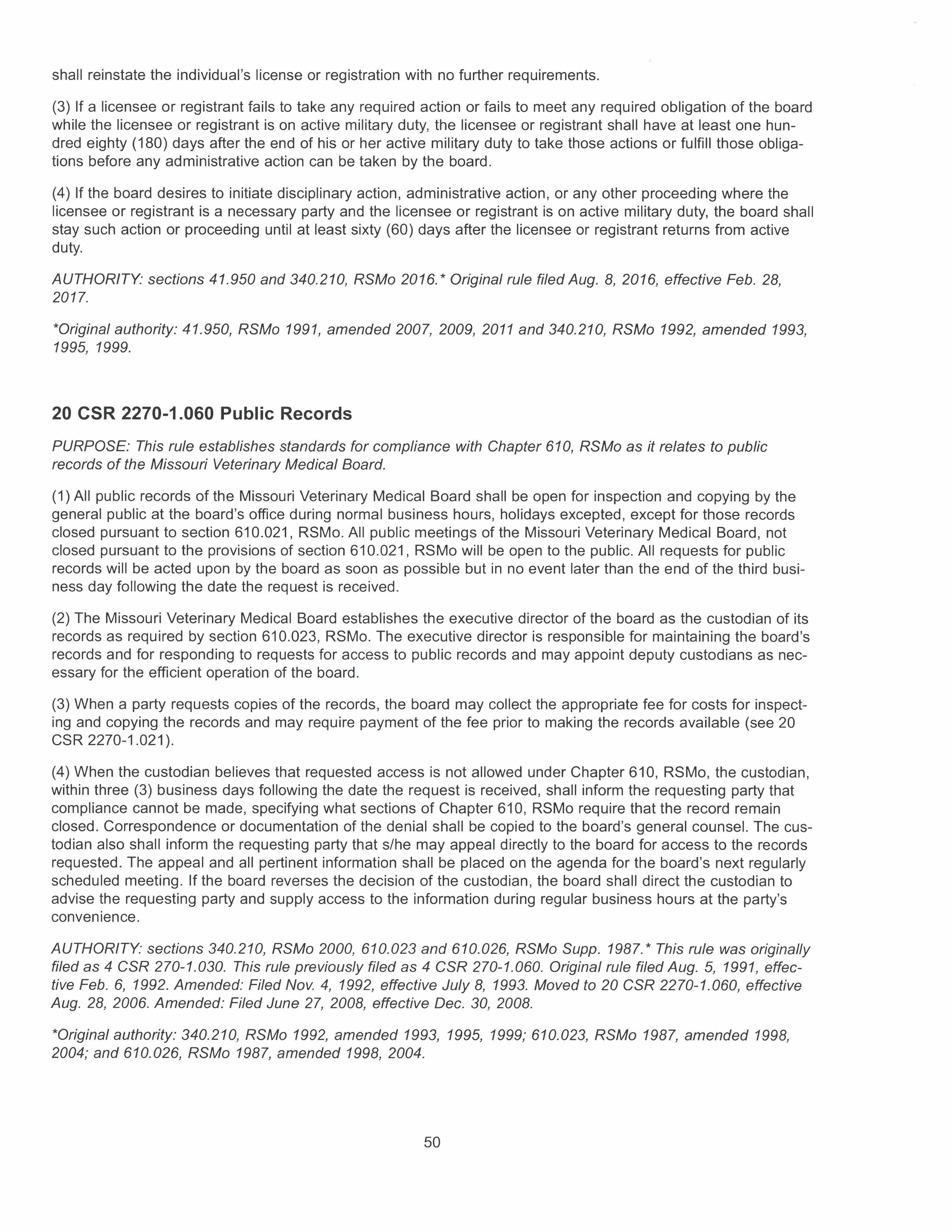
PURPOSE: This rule establishes standards for compliance with Chapter 610, RSMo as it relates to public records of the Missouri Veterinary Medical Board.
(1) All public records of the Missouri Veterinary Medical Board shall be open for inspection and copying by the general public at the board's office during normal business hours, holidays excepted, except for those records closed pursuant to section 610.021, RSMo. All public meetings of the Missouri Veterinary Medical Board, not closed pursuant to the provisions of section 610.021, RSMo will be open to the public. All requests for public records will be acted upon by the board as soon as possible but in no event later than the end of the third business day following the date the request is received.
(2) The Missouri Veterinary Medical Board establishes the executive director of the board as the custodian of its records as required by section 610.023, RSMo. The executive director is responsible for maintaining the board's records and for responding to requests for access to public records and may appoint deputy custodians as necessary for the efficient operation of the board.
(3) When a party requests copies of the records, the board may collect the appropriate fee for costs for inspecting and copying the records and may require payment of the fee prior to making the records available (see 20 CSR 2270-1.021 ).
(4) When the custodian believes that requested access is not allowed under Chapter 610, RSMo, the custodian, within three (3) business days following the date the request is received, shall inform the requesting party that compliance cannot be made, specifying what sections of Chapter 610, RSMo require that the record remain closed. Correspondence or documentation of the denial shall be copied to the board's general counsel. The custodian also shall inform the requesting party that s/he may appeal directly to the board for access to the records requested. The appeal and all pertinent information shall be placed on the agenda for the board's next regularly scheduled meeting. If the board reverses the decision of the custodian , the board shall direct the custodian to advise the requesting party and supply access to the information during regular business hours at the party's convenience.
AUTHORITY: sections 340.210, RSMo 2000, 610.023 and 610.026, RSMo Supp. 1987. *This rule was originally filed as 4 CSR 270-1.030. This rule previously filed as 4 CSR 270-1.060. Original rule filed Aug. 5, 1991, effective Feb. 6, 1992. Amended: Filed Nov. 4, 1992, effective July 8, 1993. Moved to 20 CSR 2270-1.060, effective Aug. 28, 2006. Amended: Filed June 27, 2008, effective Dec. 30, 2008.
*Original authority: 340.210, RSMo 1992, amended 1993, 1995, 1999; 610.023, RSMo 1987, amended 1998, 2004; and 610.026, RSMo 1987, amended 1998, 2004. 50
Title 20-DEPARTMENT OF COMMERCE AND
INSURANCE
Division 2270-Missouri Veterinary Medical Board
Chapter 2-Licensure Requirements for Veterinarians
20 CSR 2270-2.011 Educational Requirements
PURPOSE: This rule defines the educational requirements for an individual to be licensed as a veterinarian in Missouri.
(1) To meet the educational requirements for licensure to practice veterinary medicine in Missouri, an applicant must have received a doctor of veterinary medicine degree or its equivalent from a university or school that is accredited by the American Veterinary Medical Association (AVMA).
(2) In the alternative, an applicant must have graduated from an AVMA-Iisted, nonaccredited university or school of veterinary medicine located inside or outside the United States, its territories or Canada. This degree must be accompanied by proof satisfactory to the board that s/he has earned and currently holds an Educational Commission of Foreign Veterinary Graduate (ECFVG) certificate provided by the AVMA or its successor.
AUTHORITY: sections 340.210, 340.228 and 340.230, RSMo 2000. *This rule originally filed as 4 CSR 2702.011. Original rule filed Nov. 4, 1992, effective July 8, 1993. Amended: Filed April13, 2001, effective Oct. 30, 2001. Moved to 20 CSR 2270-2.011, effective Aug. 28, 2006.
*Original authority: 340.210, RSMo 1992, amended 1993, 1995, 1999; 340.228, RSMo 1992, amended 1999; and 340.230, RSMo 1992, amended 1994, 1999.
20 CSR 2270-2.021 Internship or Veterinary Candidacy Program
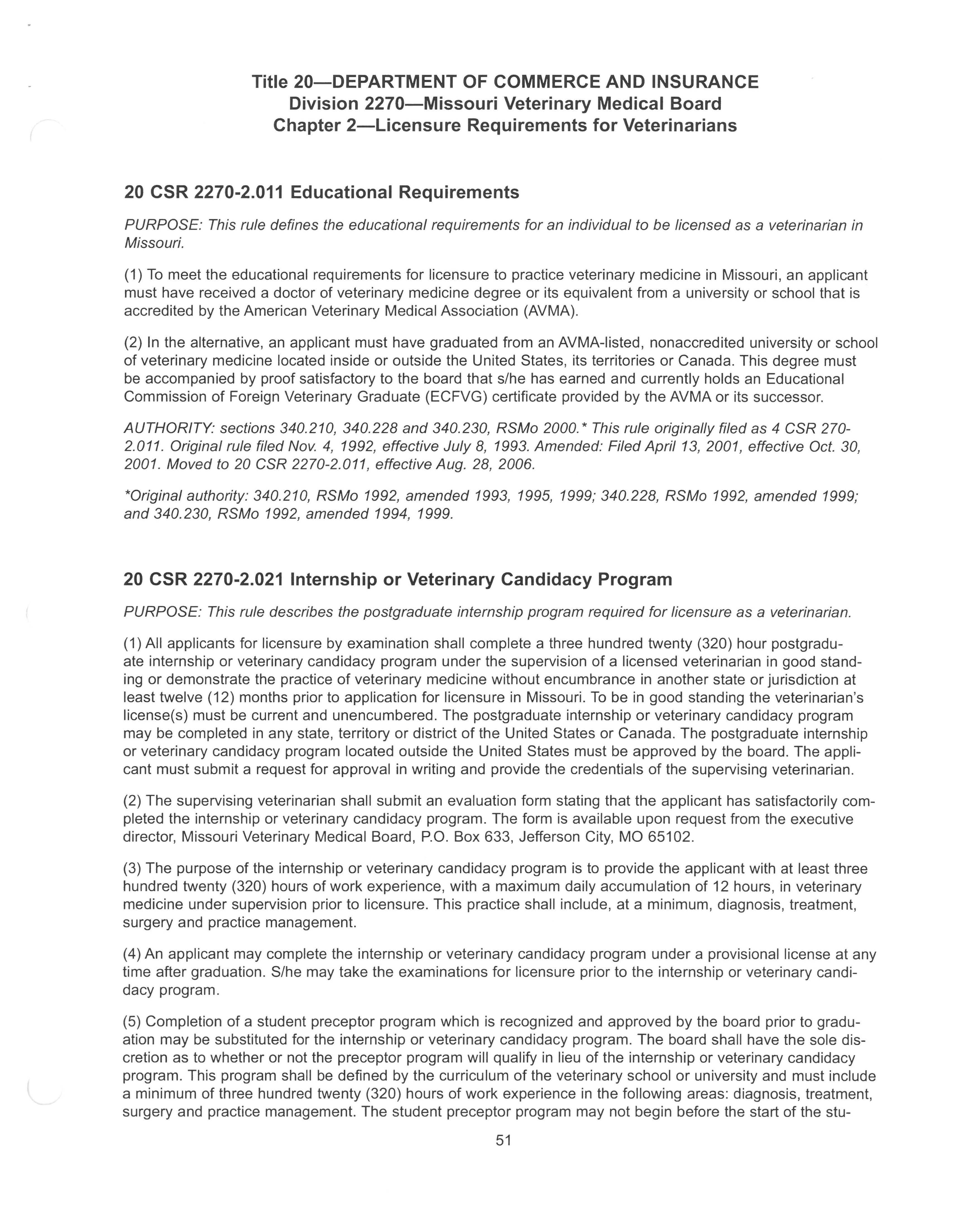
PURPOSE: This rule describes the postgraduate internship program required for licensure as a veterinarian.
(1) All applicants for licensure by examination shall complete a three hundred twenty (320) hour postgraduate internship or veterinary candidacy program under the supervision of a licensed veterinarian in good standing or demonstrate the practice of veterinary medicine without encumbrance in another state or jurisdiction at least twelve (12) months prior to application for licensure in Missouri. To be in good standing the veterinarian's license(s) must be current and unencumbered. The postgraduate internship or veterinary candidacy program may be completed in any state, territory or district of the United States or Canada. The postgraduate internship or veterinary candidacy program located outside the United States must be approved by the board. The applicant must submit a request for approval in writing and provide the credentials of the supervising veterinarian.
(2) The supervising veterinarian shall submit an evaluation form stating that the applicant has satisfactorily completed the internship or veterinary candidacy program. The form is available upon request from the executive director, Missouri Veterinary Medical Board, P.O. Box 633, Jefferson City, MO 65102.
(3) The purpose of the internship or veterinary candidacy program is to provide the applicant with at least three hundred twenty (320) hours of work experience, with a maximum daily accumulation of 12 hours, in veterinary medicine under supervision prior to licensure. This practice shall include, at a minimum, diagnosis, treatment, surgery and practice management.
(4) An applicant may complete the internship or veterinary candidacy program under a provisional license at any time after graduation. S/he may take the examinations for licensure prior to the internship or veterinary candidacy program.
(5) Completion of a student preceptor program which is recognized and approved by the board prior to graduation may be substituted for the internship or veterinary candidacy program. The board shall have the sole discretion as to whether or not the preceptor program will qualify in lieu of the internship or veterinary candidacy program. This program shall be defined by the curriculum of the veterinary school or university and must include a minimum of three hundred twenty (320) hours of work experience in the following areas: diagnosis, treatment, surgery and practice management. The student preceptor program may not begin before the start of the stu51
dent's third year and must be completed prior to the date of graduation or demonstration that the applicant has practiced in another state or jurisdiction for the preceding twelve (12) months prior to application for licensure in Missouri and that the applicant's license(s) in another state or jurisdiction has never been the subject of any disciplinary action. A student preceptor program located outside the United States must be preapproved by the board. The applicant must submit a request for approval in writing and provide the credentials of the supervising veterinarian.
(6) Any school or university that wishes to submit a student preceptorship program for board approval shall send a photocopy of the description of the program from the veterinary school's curriculum to the board office.
(7) For a student preceptorship to qualify in lieu of an internship or a veterinary candidacy program, an evaluation form must be submitted to the board office. The form is available upon request from the executive director, Missouri Veterinary Medical Board, P.O. Box 633, Jefferson City, MO 65102.
AUTHORITY. sections 340.200 and 340.246, RSMo Supp. 2007 and section 340.210, RSMo 2000. *This rule originally filed as 4 CSR 270-2.021. Original rule filed Nov. 4, 1992, effective June 1, 1994. Amended: Filed July 23, 1993, effective March 10, 1994. Amended: Filed April13, 2001, effective Oct. 30, 2001. Amended: Filed June 28, 2002, effective Dec. 30, 2002. Moved to 20 CSR 2270-2.021, effective Aug. 28, 2006. Amended: Filed May 14, 2007, effective Nov. 30, 2007. Amended: Filed July 9, 2008, effective Jan. 30, 2009.
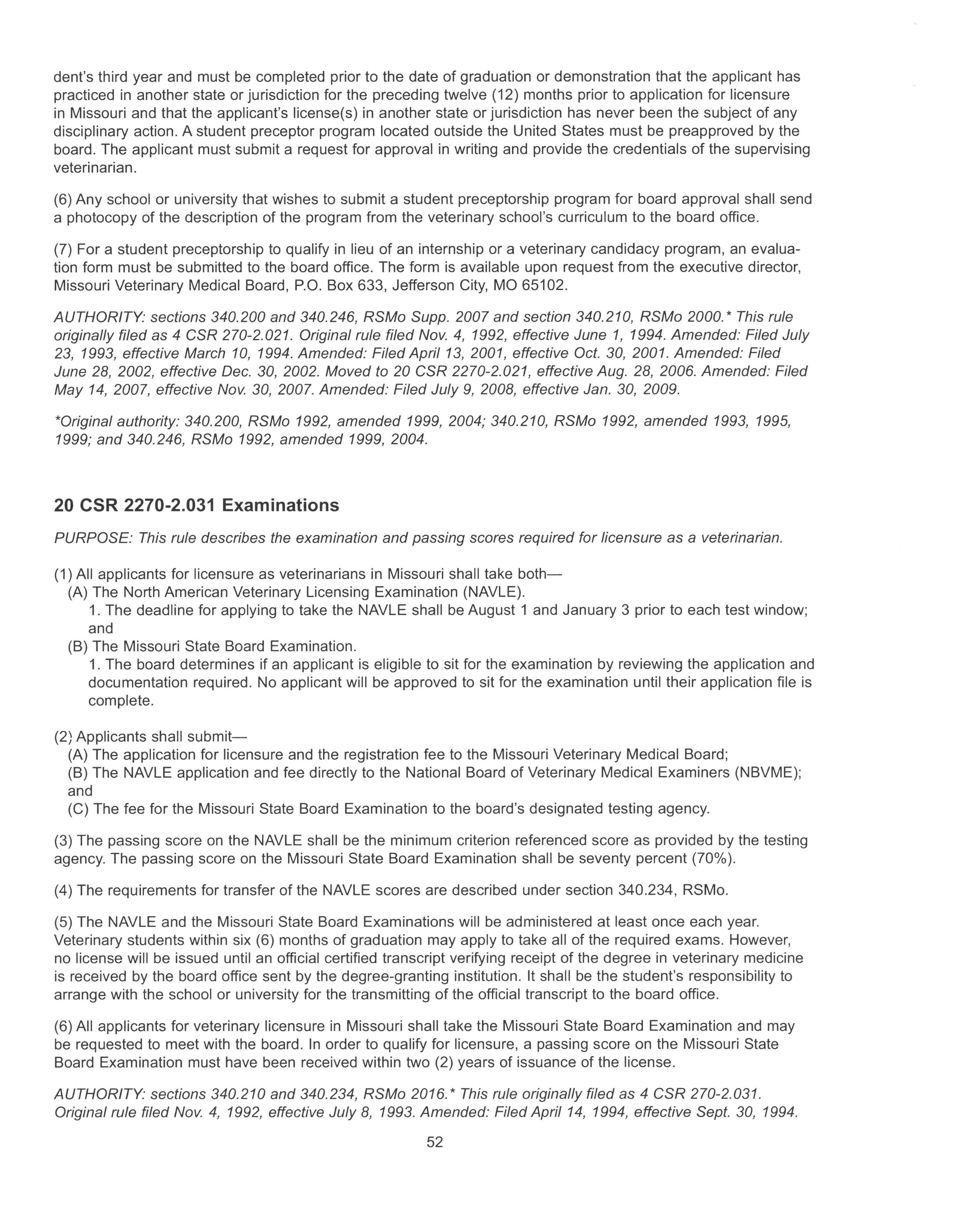
*Original authority: 340.200, RSMo 1992, amended 1999, 2004; 340.210, RSMo 1992, amended 1993, 1995, 1999; and 340.246, RSMo 1992, amended 1999, 2004.
20 CSR 2270-2.031 Examinations
PURPOSE: This rule describes the examination and passing scores required for licensure as a veterinarian.
(1) All applicants for licensure as veterinarians in Missouri shall take both-
(A) The North American Veterinary Licensing Examination (NAVLE).
1. The deadline for applying to take the NAVLE shall be August 1 and January 3 prior to each test window; and
(B) The Missouri State Board Examination.
1. The board determines if an applicant is eligible to sit for the examination by reviewing the application and documentation required. No applicant will be approved to sit for the examination until their application file is complete.
(2) Applicants shall submit-
(A) The application for licensure and the registration fee to the Missouri Veterinary Medical Board;
(B) The NAVLE application and fee directly to the National Board of Veterinary Medical Examiners (NBVME); and
(C) The fee for the Missouri State Board Examination to the board's designated testing agency.
(3) The passing score on the NAVLE shall be the minimum criterion referenced score as provided by the testing agency. The passing score on the Missouri State Board Examination shall be seventy percent (70%).
(4) The requirements for transfer of the NAVLE scores are described under section 340.234, RSMo.
(5) The NAVLE and the Missouri State Board Examinations will be administered at least once each year. Veterinary students within six (6) months of graduation may apply to take all of the required exams. However, no license will be issued until an official certified transcript verifying receipt of the degree in veterinary medicine is received by the board office sent by the degree-granting institution. It shall be the student's responsibility to arrange with the school or university for the transmitting of the official transcript to the board office.
(6) All applicants for veterinary licensure in Missouri shall take the Missouri State Board Examination and may be requested to meet with the board. In order to qualify for licensure, a passing score on the Missouri State Board Examination must have been received within two (2) years of issuance of the license.
AUTHORITY: sections 340.210 and 340.234, RSMo 2016. *This rule originally filed as 4 CSR 270-2.031. Original rule filed Nov. 4, 1992, effective July 8, 1993. Amended: Filed April 14, 1994, effective Sept. 30, 1994.
52
Amended: Filed July 31, 2000, effective Jan. 30, 2001. Moved to 20 CSR 2270-2.031, effective Aug. 28, 2006
Amended: Filed May 14, 2007, effective Nov. 30, 2007. Amended: Filed Nov. 21 , 2008, effective May 30, 2009.
Amended: Filed Jan. 3, 2012, effective June 30, 2012. Amended: Filed July 25, 2018, effective Jan . 30, 2019.
*Original authority: 340 210, RSMo 1992, amended 1993, 1995, 1999 and 340 234, RSMo 1992, amended 1999, 2006.
20 CSR 2270-2.041 Reexamination
PURPOSE: This rule outlines the requirements and procedures for retaking the licensure examination for veterinarians
(1) Any applicant who fails an examination for licensure as a veterinarian may be reexamined by making application to the board office and paying the appropriate nonrefundable examination fee and registration fee and provide two (2) additional photographs. The deadline for applying to retake the North American Veterinary Licensing Examination (NAVLE) shall be August 1 and January 3 prior to each test window and the Missouri State Board Examination shall be thirty (30) days prior to retaking the examination.
(2) Applicants shall submit-
(A) The application for licensure and the registration fee to the Missouri Veterinary Medical Board;
(B) The NAVLE application and fee directly to the National Board of Veterinary Medical Examiners (NBVME); and
(C) The fee for the Missouri State Board Examination to the board 's designated testing agency.
(3) Effective August 28, 1999, no person may take any examination more than four (4) times either in or out of Missouri to qualify for licensure in Missouri. Prior to making application for the fourth attempt at passage of the examination, the applicant shall schedule an appearance with the board to outline a continuing education program which shall be board-approved and completed prior to filing an application for the subsequent examination.
AUTHORITY· sections 340.210 and 340.232, RSMo 2016. *This rule originally filed as 4 CSR 270-2.041. Original rule file Nov 4, 1992, effective July 8, 1993. Amended: Filed April 14 , 1994, effective Sept 30, 1994. Amended: Filed July 31, 2000, effective Jan. 30, 2001. Moved to 20 CSR 2270-2.041, effective Aug. 28, 2006. Amended: Filed Nov. 21, 2008, effective May 30, 2009. Amended: Filed Jan. 3, 2012, effective June 30, 2012. Amended: Filed July 25, 2018, effective Jan. 30, 2019.
*Original authority: 340.210, RSMo 1992, amended 1993, 1995, 1999 and 340.232, RSMo 1992, amended 1999.
20 CSR 2270-2.051 Licensure (Exception)
PURPOSE: This rule provides for an exception to the requirements of licensure for university veterinary school or college faculty members who are graduates of non-American Veterinary Medical Association accredited universities and who do not have an Educational Commission of Foreign Veterinary Graduate certificate but are American Veterinary Medical Association board-certified .
(1) Faculty members at an American Veterinary Medical Association (AVMA)-accredited college or university who are AVMA board-certified but did not graduate from an AVMA-accredited college of veterinary medicine may apply to the board for a veterinary license under the following conditions:
(A) Achieving a passing score as defined in 20 CSR 2270-2 031 on the North American Veterinary Licensing Examination (NAVLE) and Missouri State Board examinations; and
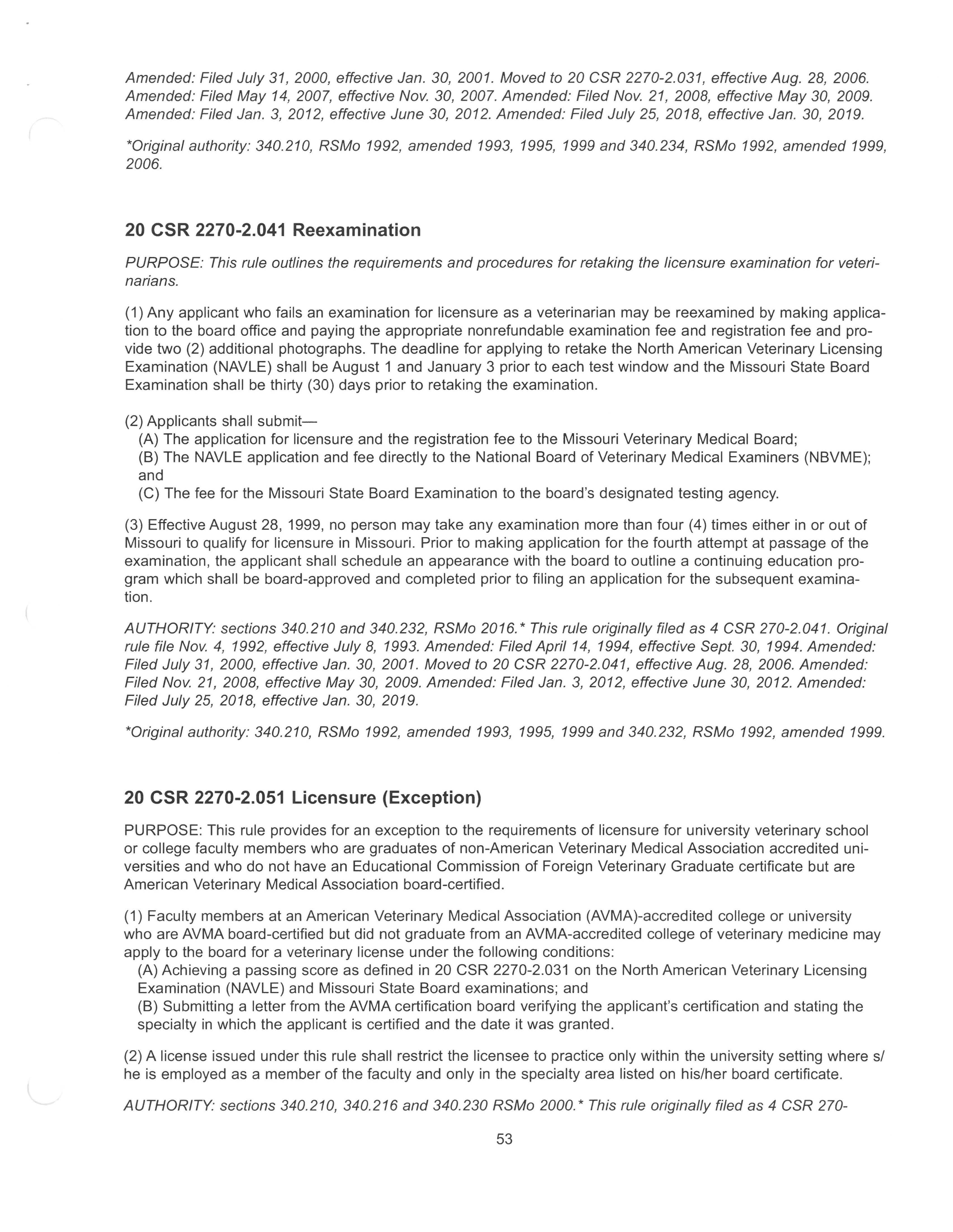
(B) Submitting a letter from the AVMA certification board verifying the applicant's certification and stating the specialty in which the applicant is certified and the date it was granted.
(2) A license issued under this rule shall restrict the licensee to practice only within the university setting where s/ he is employed as a member of the faculty and only in the specialty area listed on his/her board certificate.
AUTHORITY· sections 340 210, 340 216 and 340 230 RSMo 2000. *This rule originally filed as 4 CSR 270-
53
2.051. Original rule filed Nov. 4, 1992, effective July 8, 1993. Amended: Filed April1, 2003, effective Sept. 30, 2003. Moved to 20 CSR 2270-2.051, effective Aug. 28, 2006. Amended: Filed June 27, 2008, effective Dec. 30, 2008.
*Original authority: 340.210, RSMo 1992, amended 1993, 1995, 1999; 340.216, RSMo 1992, amended 1999; and 340.230, RSMo 1992, amended 1994, 1999.
20 CSR 2270-2.052 Faculty Licensure
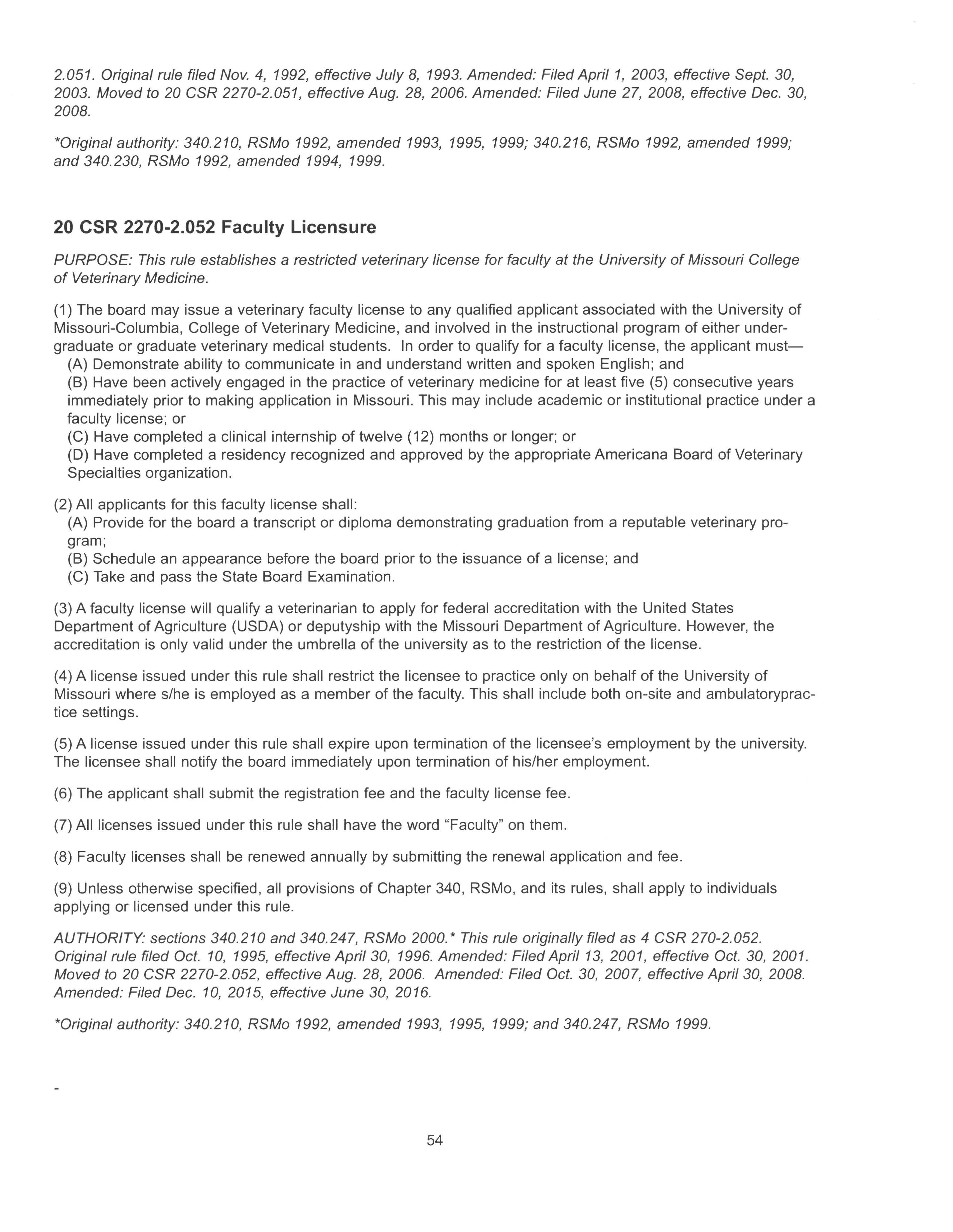
PURPOSE: This rule establishes a restricted veterinary license for faculty at the University of Missouri College of Veterinary Medicine.
(1) The board may issue a veterinary faculty license to any qualified applicant associated with the University of Missouri-Columbia, College of Veterinary Medicine, and involved in the instructional program of either undergraduate or graduate veterinary medical students. In order to qualify for a faculty license, the applicant must-
(A) Demonstrate ability to communicate in and understand written and spoken English; and
(B) Have been actively engaged in the practice of veterinary medicine for at least five (5) consecutive years immediately prior to making application in Missouri. This may include academic or institutional practice under a faculty license; or
(C) Have completed a clinical internship of twelve (12) months or longer; or
(D) Have completed a residency recognized and approved by the appropriate Americana Board of Veterinary Specialties organization.
(2) All applicants for this faculty license shall:
(A) Provide for the board a transcript or diploma demonstrating graduation from a reputable veterinary program;
(B) Schedule an appearance before the board prior to the issuance of a license; and
(C) Take and pass the State Board Examination.
(3) A faculty license will qualify a veterinarian to apply for federal accreditation with the United States Department of Agriculture (USDA) or deputyship with the Missouri Department of Agriculture. However, the accreditation is only valid under the umbrella of the university as to the restriction of the license.
(4) A license issued under this rule shall restrict the licensee to practice only on behalf of the University of Missouri where s/he is employed as a member of the faculty. This shall include both on-site and ambulatorypractice settings.
(5) A license issued under this rule shall expire upon termination of the licensee's employment by the university. The licensee shall notify the board immediately upon termination of his/her employment.
(6) The applicant shall submit the registration fee and the faculty license fee.
(7) All licenses issued under this rule shall have the word "Faculty" on them.
(8) Faculty licenses shall be renewed annually by submitting the renewal application and fee.
(9) Unless otherwise specified, all provisions of Chapter 340, RSMo, and its rules, shall apply to individuals applying or licensed under this rule.
AUTHORITY: sections 340.210 and 340.247, RSMo 2000. *This rule originally filed as 4 CSR 270-2.052.
Original rule filed Oct. 10, 1995, effective April30, 1996. Amended: Filed Apri/13, 2001, effective Oct. 30, 2001.
Moved to 20 CSR 2270-2.052, effective Aug. 28, 2006. Amended: Filed Oct. 30, 2007, effective April 30, 2008.
Amended: Filed Dec. 10, 2015, effective June 30, 2016.
*Original authority: 340.210, RSMo 1992, amended 1993, 1995, 1999; and 340.247, RSMo 1999.
54
20 CSR 2270-2.060 Reciprocity
PURPOSE: This rule provides information to those desiring licensure by reciprocity.
(1) To be licensed by reciprocity, section 340.238, RSMo, requires an applicant to have been actively engaged in the practice of the profession in another state, territory, district or province of the United States or Canada for at least five (5) consecutive years immediately prior to making application in Missouri.
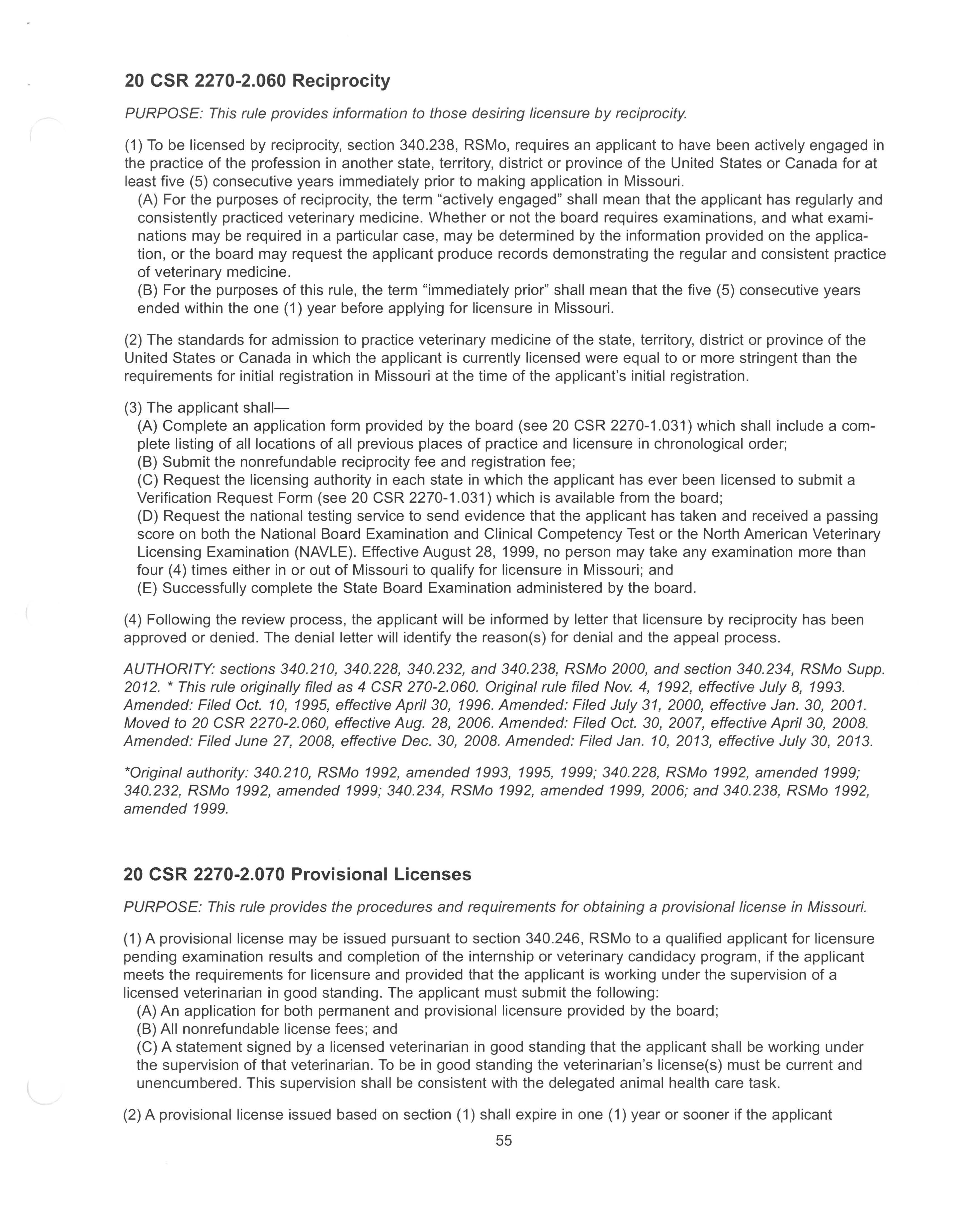
(A) For the purposes of reciprocity, the term "actively engaged" shall mean that the applicant has regularly and consistently practiced veterinary medicine. Whether or not the board requires examinations, and what examinations may be required in a particular case, may be determined by the information provided on the application, or the board may request the applicant produce records demonstrating the regular and consistent practice of veterinary medicine.
(B) For the purposes of this rule, the term "immediately prior" shall mean that the five (5) consecutive years ended within the one (1) year before applying for licensure in Missouri.
(2) The standards for admission to practice veterinary medicine of the state, territory, district or province of the United States or Canada in which the applicant is currently licensed were equal to or more stringent than the requirements for initial registration in Missouri at the time of the applicant's initial registration.
(3) The applicant shaii-
(A) Complete an application form provided by the board (see 20 CSR 2270-1.031) which shall include a complete listing of all locations of all previous places of practice and licensure in chronological order;
(B) Submit the nonrefundable reciprocity fee and registration fee;
(C) Request the licensing authority in each state in which the applicant has ever been licensed to submit a Verification Request Form (see 20 CSR 2270-1.031) which is available from the board;
(D) Request the national testing service to send evidence that the applicant has taken and received a passing score on both the National Board Examination and Clinical Competency Test or the North American Veterinary Licensing Examination (NAVLE). Effective August 28, 1999, no person may take any examination more than four (4) times either in or out of Missouri to qualify for licensure in Missouri; and
(E) Successfully complete the State Board Examination administered by the board.
(4) Following the review process, the applicant will be informed by letter that licensure by reciprocity has been approved or denied. The denial letter will identify the reason(s) for denial and the appeal process.
AUTHORITY· sections 340.210, 340.228, 340.232, and 340.238, RSMo 2000, and section 340.234, RSMo Supp. 2012. *This rule originally filed as 4 CSR 270-2.060. Original rule filed Nov. 4, 1992, effective July 8, 1993. Amended: Filed Oct. 10, 1995, effective April 30, 1996. Amended: Filed July 31, 2000, effective Jan. 30, 2001. Moved to 20 CSR 2270-2.060, effective Aug. 28, 2006. Amended: Filed Oct. 30, 2007, effective April30, 2008. Amended: Filed June 27, 2008, effective Dec. 30, 2008. Amended: Filed Jan. 10, 2013, effective July 30, 2013.
*Original authority: 340.210, RSMo 1992, amended 1993, 1995, 1999; 340.228, RSMo 1992, amended 1999; 340.232, RSMo 1992, amended 1999; 340.234, RSMo 1992, amended 1999, 2006; and 340.238, RSMo 1992, amended 1999.
20 CSR 2270-2.070 Provisional Licenses
PURPOSE: This rule provides the procedures and requirements for obtaining a provisional license in Missouri.
(1) A provisional license may be issued pursuant to section 340.246, RSMo to a qualified applicant for licensure pending examination results and completion of the internship or veterinary candidacy program, if the applicant meets the requirements for licensure and provided that the applicant is working under the supervision of a licensed veterinarian in good standing. The applicant must submit the following:
(A) An application for both permanent and provisional licensure provided by the board;
(B) All nonrefundable license fees; and
(C) A statement signed by a licensed veterinarian in good standing that the applicant shall be working under the supervision of that veterinarian. To be in good standing the veterinarian's license(s) must be current and unencumbered. This supervision shall be consistent with the delegated animal health care task.
(2) A provisional license issued based on section (1) shall expire in one (1) year or sooner if the applicant
55
becomes permanently licensed. A provisional license cannot be renewed.
(3) The provisional license will be sent to the supervisor.
(4) The supervisor identified on the provisional license application is responsible for the provisional licensee and shall notify the board within ten (1 0) days if the employment ceases at the place of employment designated on the provisional license.
(5) Only one (1) provisional license may be issued to any person at the same time.
(6) Provisional licensees are subject to the requirements of Chapter 340, RSMo and these rules.
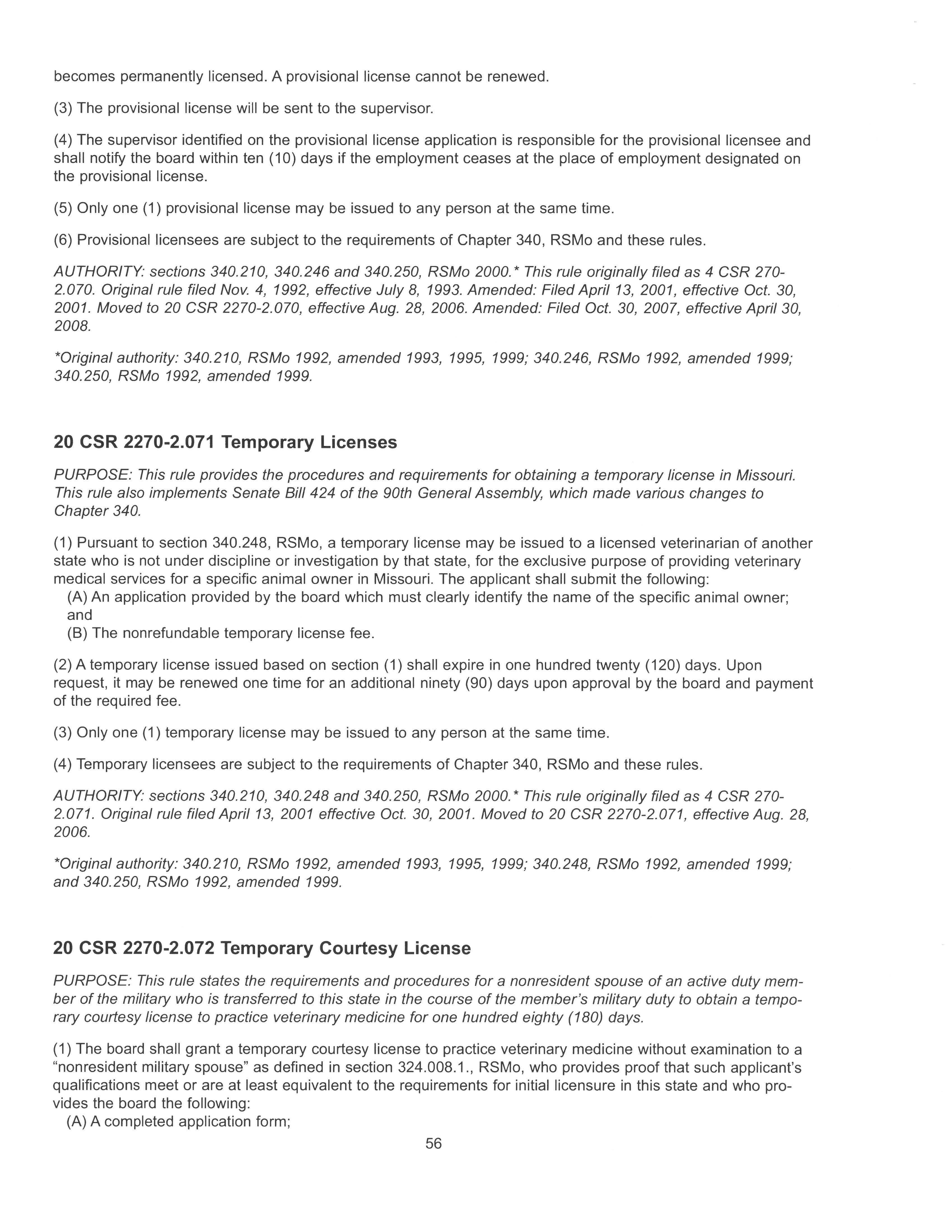
AUTHORITY· sections 340.210, 340.246 and 340.250, RSMo 2000. *This rule originally filed as 4 CSR 2702.070. Original rule filed Nov. 4, 1992, effective July 8, 1993. Amended: Filed Apri/13, 2001, effective Oct. 30, 2001. Moved to 20 CSR 2270-2.070, effective Aug. 28, 2006. Amended: Filed Oct. 30, 2007, effective Apri/30, 2008.
*Original authority: 340.210, RSMo 1992, amended 1993, 1995, 1999; 340.246, RSMo 1992, amended 1999; 340.250, RSMo 1992, amended 1999.
20 CSR 2270-2.071 Temporary Licenses
PURPOSE: This rule provides the procedures and requirements for obtaining a temporary license in Missouri. This rule also implements Senate Bill 424 of the 90th General Assembly, which made various changes to Chapter 340.
(1) Pursuant to section 340.248, RSMo, a temporary license may be issued to a licensed veterinarian of another state who is not under discipline or investigation by that state, for the exclusive purpose of providing veterinary medical services for a specific animal owner in Missouri. The applicant shall submit the following:
(A) An application provided by the board which must clearly identify the name of the specific animal owner; and
(B) The nonrefundable temporary license fee.
(2) A temporary license issued based on section (1) shall expire in one hundred twenty (120) days. Upon request, it may be renewed one time for an additional ninety (90) days upon approval by the board and payment of the required fee.
(3) Only one (1) temporary license may be issued to any person at the same time.
(4) Temporary licensees are subject to the requirements of Chapter 340, RSMo and these rules.
AUTHORITY· sections 340.210, 340.248 and 340.250, RSMo 2000. *This rule originally filed as 4 CSR 2702.071. Original rule filed April13, 2001 effective Oct. 30, 2001. Moved to 20 CSR 2270-2.071, effective Aug. 28, 2006.
*Original authority: 340.210, RSMo 1992, amended 1993, 1995, 1999; 340.248, RSMo 1992, amended 1999; and 340.250, RSMo 1992, amended 1999.
20 CSR 2270-2.072 Temporary Courtesy License
PURPOSE: This rule states the requirements and procedures for a nonresident spouse of an active duty member of the military who is transferred to this state in the course of the member's military duty to obtain a temporary courtesy license to practice veterinary medicine for one hundred eighty (180) days.
(1) The board shall grant a temporary courtesy license to practice veterinary medicine without examination to a "nonresident military spouse" as defined in section 324.008.1., RSMo, who provides proof that such applicant's qualifications meet or are at least equivalent to the requirements for initial licensure in this state and who provides the board the following:
(A) A completed application form;
56
(B) A non-refundable application fee, as established by the board pursuant to rule, made payable to the board;
(C) Verification sent directly to the board from the state, district, or territory from where the applicant holds a current and active license verifying that the applicant holds a current and active license;
(D) Proof that the applicant has been engaged in active practice in the state, district, or territory of the United States in which the applicant is currently licensed for at least two (2) years in the five (5) years immediately preceding this application;
(E) Verification sent directly to the board from the state, district, or territory of the United States in which the applicant was initially licensed verifying that-
1. The applicant is, or was at the time of licensure, in good standing;
2 The applicant has not committed an act in any jurisdiction that would have constituted grounds for the refusal, suspension, or revocation of a license or certificate to practice at the time the act was committed; and
3. The applicant has not been disciplined by a licensing or credentialing entity in another jurisdiction and is not the subject of an unresolved complaint, review procedure, or disciplinary proceeding by a licensing or credentialing entity in another jurisdiction;
(F) If the board is unable to determine if the licensing requirements of the state, district, or territory in which the applicant was initially licensed are equivalent to Missouri's licensing requirements, the applicant shall submit documentation regarding the licensing requirements equivalency;
(G) Any person applying for temporary licensure as a veterinarian, shall be required to take and pass the State Board Examination related to the practice of veterinary medicine; and
(H) Such additional information as the board may request to determine eligibility for a temporary courtesy license.
AUTHORITY: section 324.008.1., RSMo Supp. 2012. *Original rule filed Sept. 18, 2012, effective March 30, 2013.
*Original authority: 324.008, RSMo 2011.
20 CSR 2270-2.080 Military Training to Meet Requirements for Licensure
PURPOSE: This rule requires the board to accept evidence of military education, training, or service to be applied toward the requirements for licensure.
(1) Any applicant for licensure may, as part of the evidence of meeting the requisite educational and/or training requirements for licensure, submit evidence of military experience as a member of the military.
(2) The board shall review the evidence submitted and, if appropriate, make additional inquiry of the applicant to determine the scope and duties of the military experience to determine whether the military experience shall be counted towards the qualifications for licensure.
(3) In its review of the military experience, the board shall evaluate the content and nature of the military experience to determine whether that military experience shall count towards the education, training, or service requirements for licensure. The board shall construe liberally the military experience in determining whether it will count towards the education, training, or service requirements for licensure
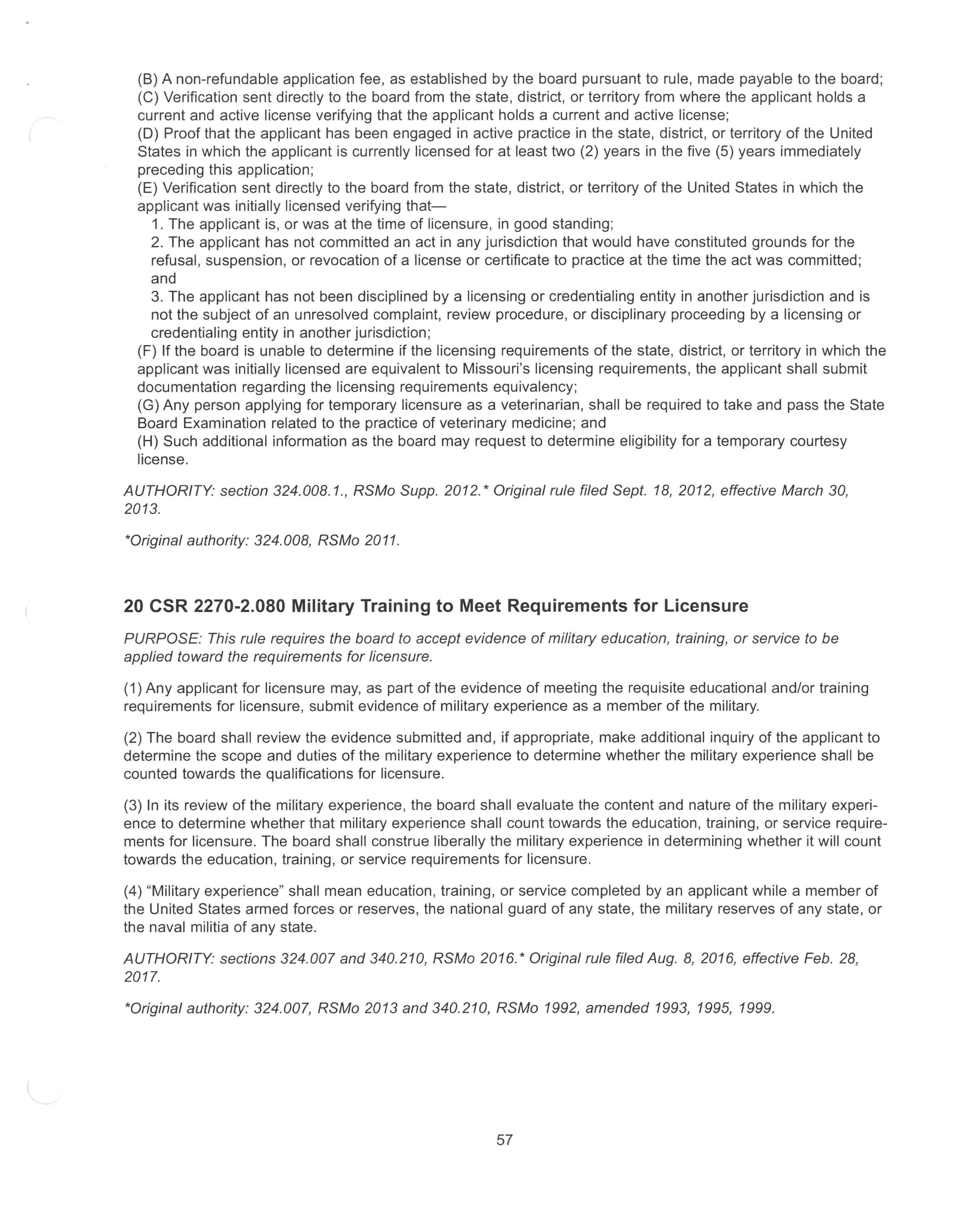
(4) "Military experience" shall mean education, training, or service completed by an applicant while a member of the United States armed forces or reserves, the national guard of any state, the military reserves of any state, or the naval militia of any state.
AUTHORITY: sections 324.007 and 340.210, RSMo 2016. *Original rule filed Aug. 8, 2016, effective Feb. 28, 2017.
*Original authority: 324.007, RSMo 2013 and 340.210, RSMo 1992, amended 1993, 1995, 1999.
57
Title 20-DEPARTMENT OF COMMERCE AND INSURANCE Division 2270-Missouri
Veterinary Medical Board
Chapter 3-Registration Requirements for Veterinary Technicians
20 CSR 2270-3.011 Registration Requirements
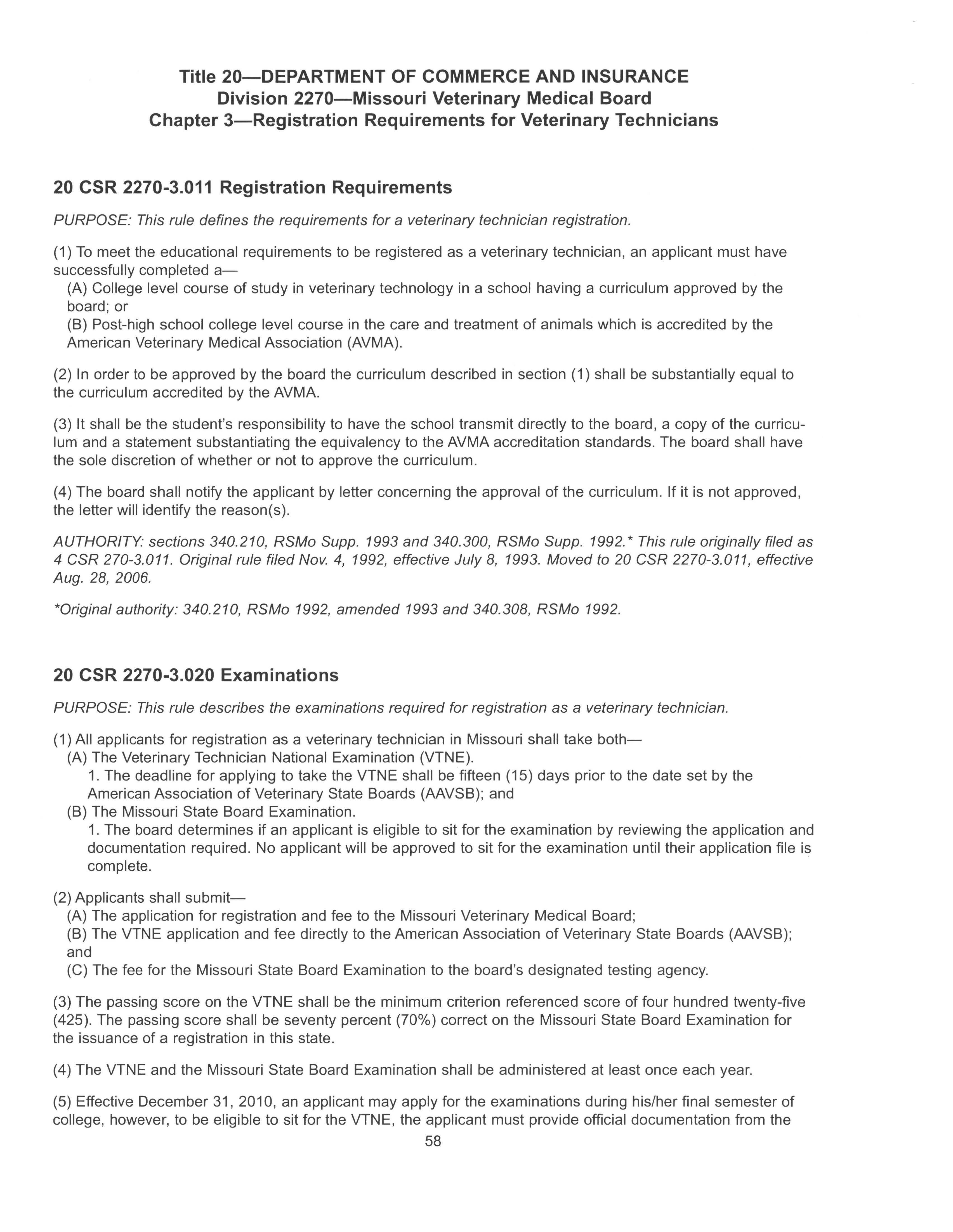
PURPOSE: This rule defines the requirements for a veterinary technician registration.
(1) To meet the educational requirements to be registered as a veterinary technician, an applicant must have successfully completed a-
(A) College level course of study in veterinary technology in a school having a curriculum approved by the board; or
(B) Post-high school college level course in the care and treatment of animals which is accredited by the American Veterinary Medical Association (AVMA).
(2) In order to be approved by the board the curriculum described in section (1) shall be substantially equal to the curriculum accredited by the AVMA.
(3) It shall be the student's responsibility to have the school transmit directly to the board, a copy of the curriculum and a statement substantiating the equivalency to the AVMA accreditation standards The board shall have the sole discretion of whether or not to approve the curriculum.
(4) The board shall notify the applicant by letter concerning the approval of the curriculum. If it is not approved, the letter will identify the reason(s).
AUTHORITY. sections 340.210, RSMo Supp. 1993 and 340.300, RSMo Supp 1992. *This rule originally filed as 4 CSR 270-3.011. Original rule filed Nov. 4, 1992, effective July 8, 1993. Moved to 20 CSR 2270-3.011, effective Aug. 28, 2006.
*Original authority: 340.210, RSMo 1992, amended 1993 and 340.308, RSMo 1992.
20 CSR 2270-3.020 Examinations
PURPOSE: This rule describes the examinations required for registration as a veterinary technician
(1) All applicants for registration as a veterinary technician in Missouri shall take both-
(A) The Veterinary Technician National Examination (VTNE).
1. The deadline for applying to take the VTNE shall be fifteen (15) days prior to the date set by the American Association of Veterinary State Boards (AAVSB); and
(B) The Missouri State Board Examination.
1. The board determines if an applicant is eligible to sit for the examination by reviewing the application and documentation required. No applicant will be approved to sit for the examination until their application file is complete.
(2) Applicants shall submit-
(A) The application for registration and fee to the Missouri Veterinary Medical Board;
(B) The VTNE application and fee directly to the American Association of Veterinary State Boards (AAVSB); and
(C) The fee for the Missouri State Board Examination to the board's designated testing agency.
(3) The passing score on the VTNE shall be the minimum criterion referenced score of four hundred twenty-five (425). The passing score shall be seventy percent (70%) correct on the Missouri State Board Examination for the issuance of a registration in this state.
(4) The VTNE and the Missouri State Board Examination shall be administered at least once each year.
(5) Effective December 31, 2010, an applicant may apply for the examinations during his/her final semester of college, however, to be eligible to sit for the VTNE, the applicant must provide official documentation from the 58
college verifying to the board that the applicant has graduated. However, no certificate of registration will be issued until an official transcript verifying receipt of the degree is received by the board office sent directly by the degree-granting institution. It shall be the applicant's responsibility to arrange with the school or college for the transmitting of the official transcript to the board office.
(6) Any applicant who fails either of the required examinations for registration as a veterinary technician may retake the failed examination(s) by notifying the board office and paying the appropriate nonrefundable examination fee and registration fee by the applicable deadline dates of the board. Test scores are valid and will be accepted by the board for a period not to exceed five (5) years.
(7) Effective August 28, 1999, no person may take either examination more than four (4) times either in or out of Missouri to qualify for registration in Missouri. Prior to making application for the fourth attempt at passage of an examination, the applicant shall schedule an appearance with the board to outline a continuing education program, which shall be board-approved and completed prior to filing application for the subsequent examination.
AUTHORITY: sections 340.210, 340.300, 340.302, and 340.308, RSMo 2016. *This rule originally filed as 4 CSR 270-3.020. Original rule filed Nov. 4, 1992, effective July 8, 1993. Amended: Filed April 14, 1994, effective Sept. 30, 1994. Amended: Filed March 10, 1995, effective Sept. 30, 1995. Amended: Filed April13, 2001, effective Oct. 30, 2001. Moved to 20 CSR 2270-3.020, effective Aug. 28, 2006. Amended: Filed April 8, 2009, effective Sept. 30, 2009. Amended: Filed Jan. 3, 2012, effective June 30, 2012. Amended: Filed July 25, 2018, effective Jan. 30, 2019.
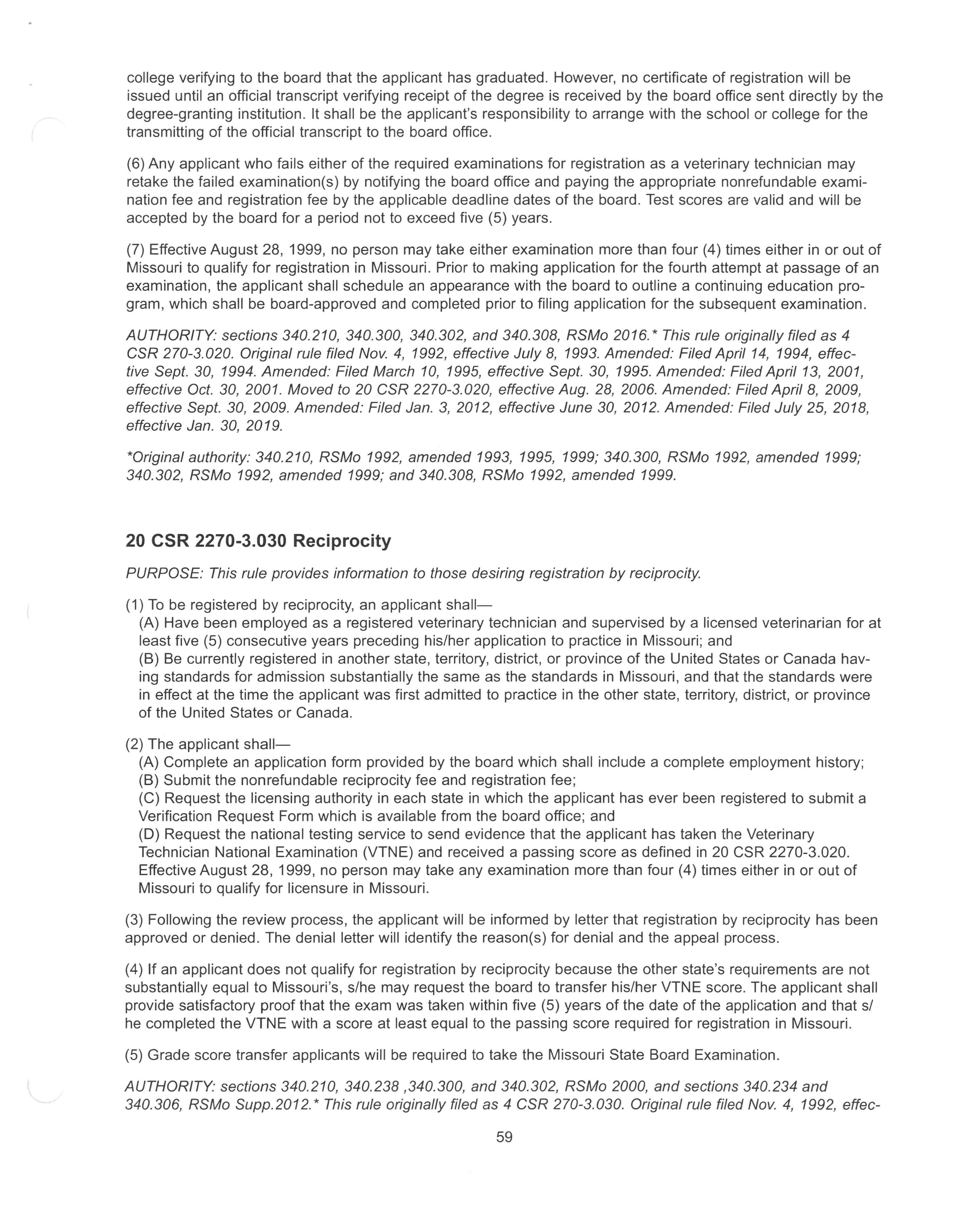
*Original authority: 340.210, RSMo 1992, amended 1993, 1995, 1999; 340.300, RSMo 1992, amended 1999; 340.302, RSMo 1992, amended 1999; and 340.308, RSMo 1992, amended 1999.
20 CSR 2270-3.030 Reciprocity
PURPOSE: This rule provides information to those desiring registration by reciprocity.
(1) To be registered by reciprocity, an applicant shaii-
(A) Have been employed as a registered veterinary technician and supervised by a licensed veterinarian for at least five (5) consecutive years preceding his/her application to practice in Missouri; and
(B) Be currently registered in another state, territory, district, or province of the United States or Canada having standards for admission substantially the same as the standards in Missouri, and that the standards were in effect at the time the applicant was first admitted to practice in the other state, territory, district, or province of the United States or Canada.
(2) The applicant shaii-
(A) Complete an application form provided by the board which shall include a complete employment history;
(B) Submit the nonrefundable reciprocity fee and registration fee;
(C) Request the licensing authority in each state in which the applicant has ever been registered to submit a Verification Request Form which is available from the board office; and
(D) Request the national testing service to send evidence that the applicant has taken the Veterinary Technician National Examination (VTNE) and received a passing score as defined in 20 CSR 2270-3.020. Effective August 28, 1999, no person may take any examination more than four (4) times either in or out of Missouri to qualify for licensure in Missouri.
(3) Following the review process, the applicant will be informed by letter that registration by reciprocity has been approved or denied. The denial letter will identify the reason(s) for denial and the appeal process.
(4) If an applicant does not qualify for registration by reciprocity because the other state's requirements are not substantially equal to Missouri's, s/he may request the board to transfer his/her VTNE score. The applicant shall provide satisfactory proof that the exam was taken within five (5) years of the date of the application and that s/ he completed the VTNE with a score at least equal to the passing score required for registration in Missouri.
(5) Grade score transfer applicants will be required to take the Missouri State Board Examination.
AUTHORITY: sections 340.210, 340.238,340.300, and 340.302, RSMo 2000, and sections 340.234 and 340.306, RSMo Supp.2012. *This rule originally filed as 4 CSR 270-3.030. Original rule filed Nov. 4, 1992, effec-
59
tive July 8, 1993. Amended: Filed March 10, 1995, effective Sept. 30, 1995. Amended: Filed April13, 2001, effective Oct. 30, 2001. Moved to 20 CSR 2270-3.030, effective Aug. 28, 2006. Amended: Filed June 27, 2008, effective Dec. 30, 2008. Amended: Filed Jan. 10, 2013, effective July 30, 2013.
*Original authority: 340.210, RSMo 1992, amended 1993, 1995, 1999; 340.234, RSMo 1992, amended 1999, 2006; 340.238, RSMo 1992, amended 1999; 340.300, RSMo 1992, amended 1999; 340.302, RSMo 1992, amended 1999; and 340.306, RSMo 1992, amended 1999, 2004.
20 CSR 2270-3.040 Temporary Registration for Veterinary Technicians
PURPOSE: This rule describes the requirements and procedures for getting a temporary registration for veterinary technicians.
(1) A temporary registration may be issued to a qualified applicant for registration pending examination results if the applicant meets the requirements for registration and provided that the applicant is working under the supervision of a licensed veterinarian in good standing. The applicant shall submit the following:
(A) An application provided by the board;
(B) The nonrefundable temporary registration fee; and
(C) A statement signed by a licensed veterinarian in good standing that the applicant shall be working under the supervision of that veterinarian. To be in good standing the veterinarian's license(s) must be current and unencumbered. This supervision shall be consistent with the delegated animal health care task.
(2) The supervisor identified on the temporary registration application is responsible for the temporary registrant and shall notify the board within ten (10) days if the employment ceases at the place of employment on the temporary certificate of registration.
(3) A temporary registration shall expire in one (1) year or sooner if the applicant becomes permanently registered. A temporary registration cannot be renewed.
(4) Temporary registrants are subject to the requirements of Chapter 340, RSMo and these rules.
AUTHORITY· sections 340.210, 340.246 and 340.298, RSMo 2000. *This rule originally filed as 4 CSR 2703.040. Original rule filed Nov. 4, 1992, effective July 8, 1993. Amended: Filed April13, 2001, effective Oct. 30, 2001. Moved to 20 CSR 2270-3.040, effective Aug. 28, 2006.
*Original authority: 340.210, RSMo 1992, amended 1993, 1995, 1999; 340.246, RSMo 1992, amended 1999; and 340.298, RSMo 1992.
20 CSR 2270-3.045 Military Training to Meet Requirements for Registration
PURPOSE: This rule requires the board to accept evidence of military education, training, or seNice to be applied toward the requirements for registration.
(1) Any applicant for registration may, as part of the evidence of meeting the requisite educational and/or training requirements for registration, submit evidence of military experience as a member of the military.
(2) The board shall review the evidence submitted and, if appropriate, make additional inquiry of the applicant to determine the scope and duties of the military experience to determine whether the military experience shall be counted towards the qualifications for registration.
(3) In its review of the military experience, the board shall evaluate the content and nature of the military experience to determine whether that military experience shall count towards the education, training, or service requirements for registration. The board shall construe liberally the military experience in determining whether it will count towards the education, training, or service requirements for registration.
(4) "Military experience" shall mean education, training, or service completed by an applicant while a member of the United States armed forces or reserves, the national guard of any state, the military reserves of any state, or the naval militia of any state.
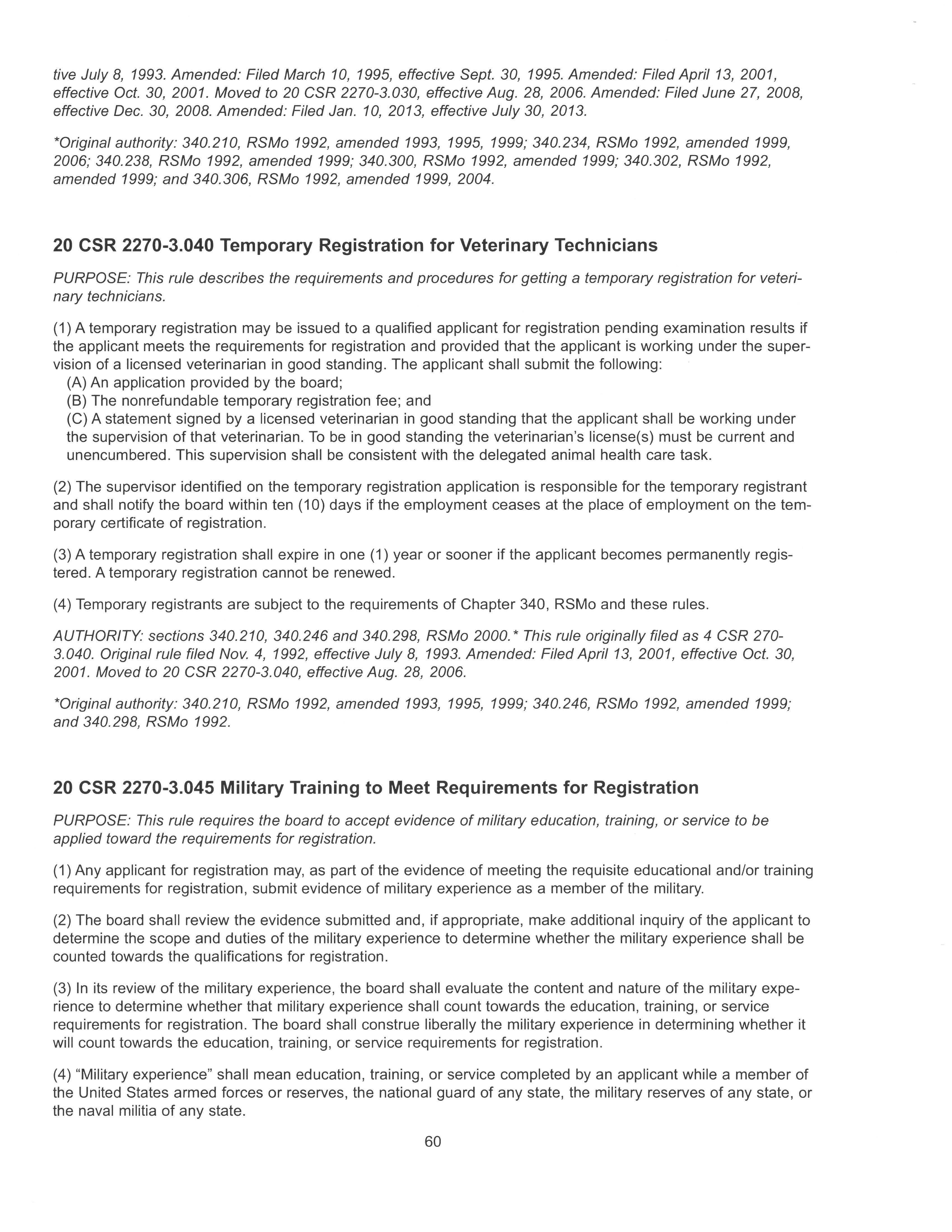
60
AUTHORITY· sections 324.007 and 340.210,RSMo 2016. *Original rule filed Aug. 8, 2016, effective Feb. 28, 2017.
*Original authority: 324.007, RSMo 2013 and 340 210,RSMo 1992, amended 1993, 1995, 1999
20 CSR 2270-3.050 Animal Health Care Tasks
PURPOSE: Th is rule describes the delegated animal health care tasks that veterinary technicians may perform and the level of supervision required for each.
(1) Unless specifically so provided by regulation, a registered veterinary technician shall not perform the following functions or any other activity which represents the practice of veterinary medicine or requires the knowledge, skill and training of a licensed veterinarian:
(A) Surgery;
(B) Diagnosis and prognosis of animal diseases; and
(C) Prescription of drugs, medicines or appliances.
(2) A registered veterinary technician in a veterinary or animal hospital or clinic setting may perform the following procedures under the direct supervision of a licensed veterinarian when done so pursuant to the order, control and full professional responsibility of the licensed veterinarian:
(A) Application of casts and splints; and
(B) Placement of indwelling intravenous catheters.
(3) Subject to the provisions of section (1 ), registered veterinary technicians in a veterinary or animal hospital or clinic setting may perform under the direct or indirect supervision of a licensed veterinarian other auxiliary animal health care tasks when done pursuant to the order, control and full professional responsibility of a licensed veterinarian.
AUTHORITY: sections 340.210 and 340.296, RSMo Supp 1993
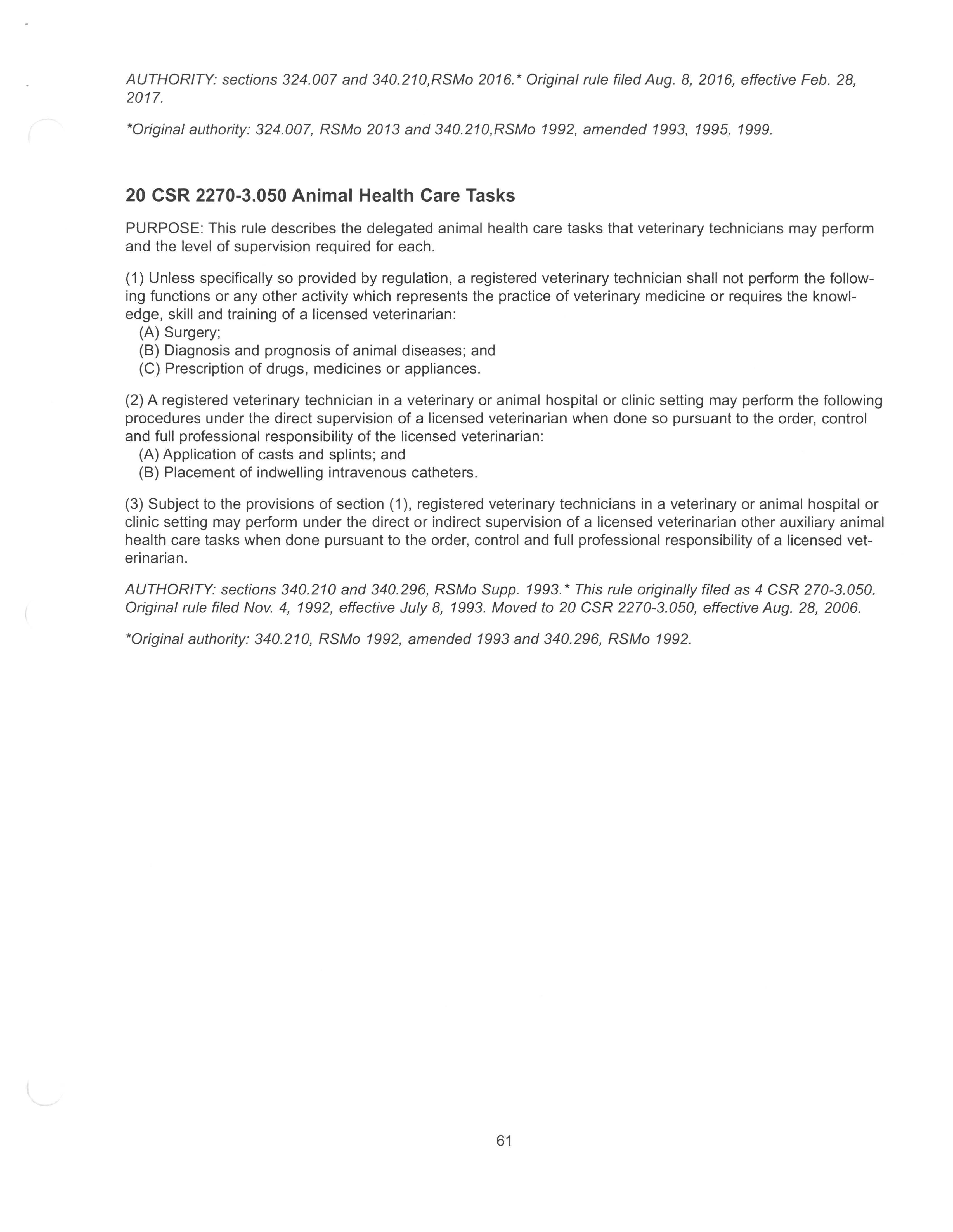
*This rule originally filed as 4 CSR 270-3.050. Original rule filed Nov. 4, 1992, effective July 8, 1993. Moved to 20 CSR 2270-3.050, effective Aug. 28, 2006.
*Original authority: 340.210, RSMo 1992, amended 1993 and 340.296 , RSMo 1992.
61
Title 20-DEPARTMENT OF COMMERCE AND INSURANCE Division 2270-Missouri Veterinary Medical Board Chapter 4-Minimum Standards
20 CSR 2270-4.011 Minimum Standards for Veterinary Facilities
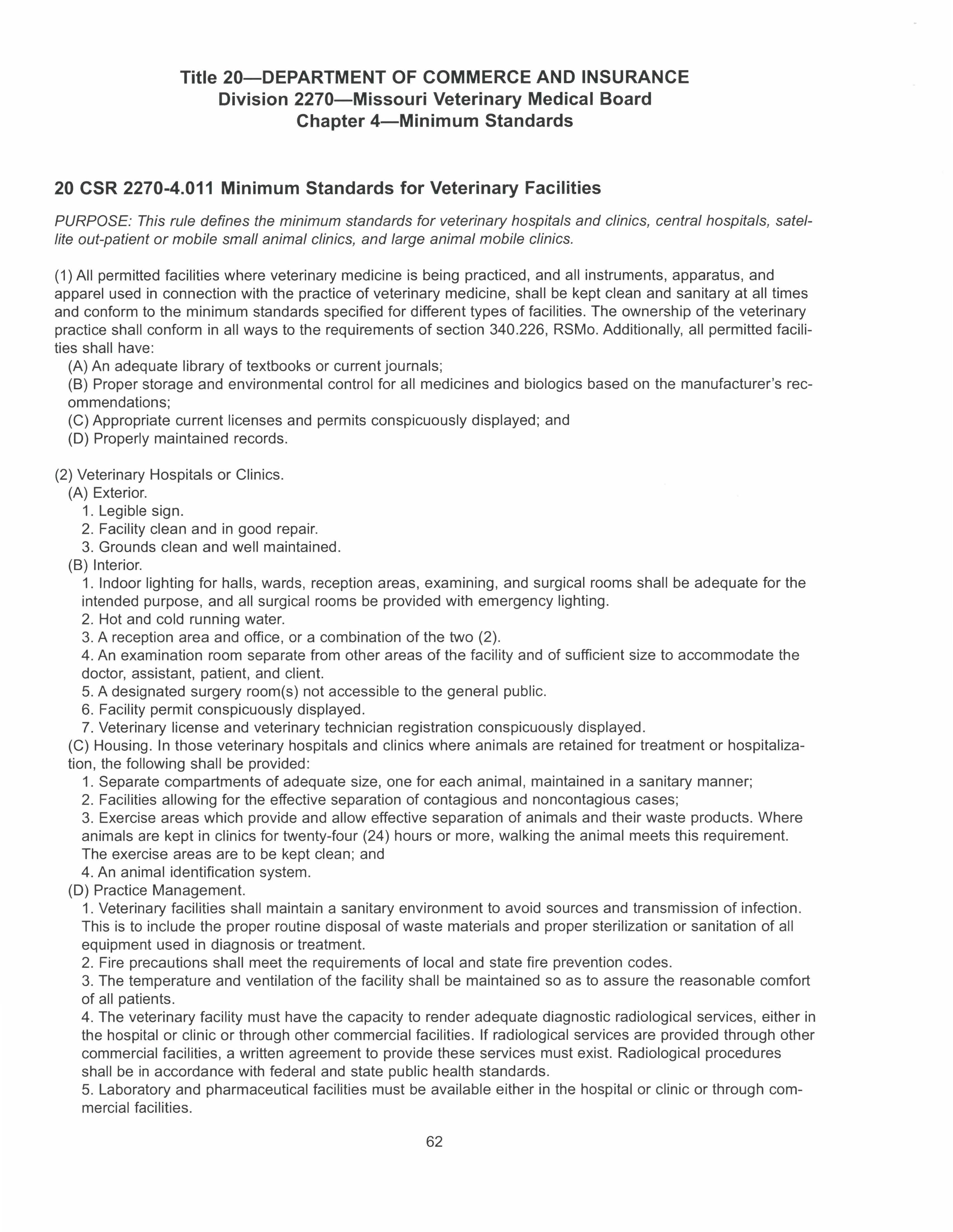
PURPOSE: This rule defines the minimum standards for veterinary hospitals and clinics, central hospitals, satellite out-patient or mobile small animal clinics, and large animal mobile clinics.
(1) All permitted facilities where veterinary medicine is being practiced, and all instruments, apparatus, and apparel used in connection with the practice of veterinary medicine, shall be kept clean and sanitary at all times and conform to the minimum standards specified for different types of facilities. The ownership of the veterinary practice shall conform in all ways to the requirements of section 340.226, RSMo. Additionally, all permitted facilities shall have:
(A) An adequate library of textbooks or current journals;
(B) Proper storage and environmental control for all medicines and biologics based on the manufacturer's recommendations;
(C) Appropriate current licenses and permits conspicuously displayed; and
(D) Properly maintained records.
(2) Veterinary Hospitals or Clinics.
(A) Exterior.
1. Legible sign.
2. Facility clean and in good repair.
3. Grounds clean and well maintained.
(B) Interior.
1. Indoor lighting for halls, wards, reception areas, examining, and surgical rooms shall be adequate for the intended purpose, and all surgical rooms be provided with emergency lighting.
2. Hot and cold running water.
3. A reception area and office, or a combination of the two (2).
4. An examination room separate from other areas of the facility and of sufficient size to accommodate the doctor, assistant, patient, and client.
5. A designated surgery room(s) not accessible to the general public.
6. Facility permit conspicuously displayed.
7. Veterinary license and veterinary technician registration conspicuously displayed.
(C) Housing. In those veterinary hospitals and clinics where animals are retained for treatment or hospitalization, the following shall be provided:
1. Separate compartments of adequate size, one for each animal, maintained in a sanitary manner;
2. Facilities allowing for the effective separation of contagious and noncontagious cases;
3. Exercise areas which provide and allow effective separation of animals and their waste products. Where animals are kept in clinics for twenty-four (24) hours or more, walking the animal meets this requirement. The exercise areas are to be kept clean; and
4. An animal identification system.
(D) Practice Management.
1. Veterinary facilities shall maintain a sanitary environment to avoid sources and transmission of infection. This is to include the proper routine disposal of waste materials and proper sterilization or sanitation of all equipment used in diagnosis or treatment.
2. Fire precautions shall meet the requirements of local and state fire prevention codes.
3. The temperature and ventilation of the facility shall be maintained so as to assure the reasonable comfort of all patients.
4. The veterinary facility must have the capacity to render adequate diagnostic radiological services, either in the hospital or clinic or through other commercial facilities. If radiological services are provided through other commercial facilities, a written agreement to provide these services must exist. Radiological procedures shall be in accordance with federal and state public health standards.
5. Laboratory and pharmaceutical facilities must be available either in the hospital or clinic or through commercial facilities.
62
6. Sanitary methods for the disposal of deceased animals shall be provided and maintained. Where neither the owner nor the owner's agent of a deceased animal has given the veterinarian authorization to dispose of his/her animal, the veterinarian shall comply with section 340.288, RSMo.
(E) Equipment Requirements.
1. Sterilization of all appropriate equipment is required.
2. A library of textbooks or current journals shall be available on the premises for ready reference.
3. Anesthetic equipment appropriate for the level of surgery performed will be available at all times.
4. Oxygen equipment will be available at all times.
5. Surgeons and assistants shall wear clean attire and sterile gloves for any clean and sterile procedures.
6. Surgical packs shall be used and properly sterilized for all accepted sterile surgical procedures. Surgical packs include drapes, gloves, sponges and proper instrumentation.
7. Examination and treatment rooms shall be equipped with waste receptacles, disposable towels, and examination tables with impervious surfaces.
8. Proper storage and environmental control will be available for all medicines and biologics based on the manufacturer's recommendations.
9. All waste receptacles, other than those in areas where animals will not be housed, treated or examined, will be lined with plastic or made of an impervious material (rubber/plastic) that is easily sanitized.
(3) Central hospital shall meet the same minimum standards as a veterinary hospital or clinic and also provide on premises twenty-four- (24-) hour nursing care, specialty consultation on a permanent or on-call basis, and be capable of rendering the following major medical and surgical services:
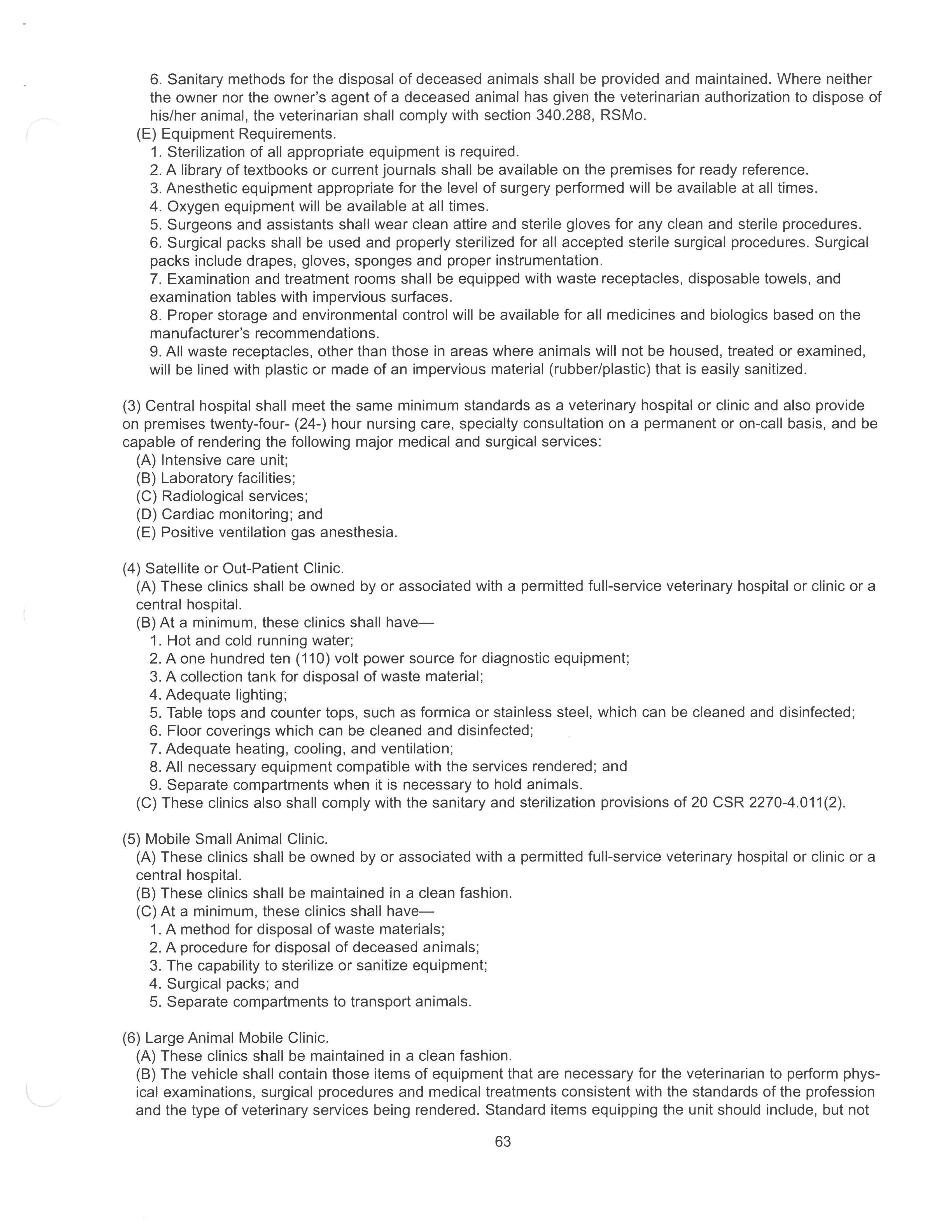
(A) Intensive care unit;
(B) Laboratory facilities;
(C) Radiological services;
(D) Cardiac monitoring; and
(E) Positive ventilation gas anesthesia.
(4) Satellite or Out-Patient Clinic.
(A) These clinics shall be owned by or associated with a permitted full-service veterinary hospital or clinic or a central hospital.
(B) At a minimum, these clinics shall have-
1. Hot and cold running water;
2. A one hundred ten (110) volt power source for diagnostic equipment;
3. A collection tank for disposal of waste material;
4. Adequate lighting;
5. Table tops and counter tops, such as formica or stainless steel, which can be cleaned and disinfected;
6. Floor coverings which can be cleaned and disinfected;
7. Adequate heating, cooling, and ventilation;
8. All necessary equipment compatible with the services rendered; and
9. Separate compartments when it is necessary to hold animals.
(C) These clinics also shall comply with the sanitary and sterilization provisions of 20 CSR 2270-4.011 (2).
(5) Mobile Small Animal Clinic.
(A) These clinics shall be owned by or associated with a permitted full-service veterinary hospital or clinic or a central hospital.
(B) These clinics shall be maintained in a clean fashion.
(C) At a minimum, these clinics shall have-
1. A method for disposal of waste materials;
2. A procedure for disposal of deceased animals;
3. The capability to sterilize or sanitize equipment;
4. Surgical packs; and
5. Separate compartments to transport animals.
(6) Large Animal Mobile Clinic.
(A) These clinics shall be maintained in a clean fashion.
(B) The vehicle shall contain those items of equipment that are necessary for the veterinarian to perform physical examinations, surgical procedures and medical treatments consistent with the standards of the profession and the type of veterinary services being rendered. Standard items equipping the unit should include, but not
63
be limited to, the following:
1. If sterile surgery is to be performed, sterile surgical instruments, suturing materials, syringes, and needles should be carried;
2. Protective clothing, rubber or disposable boots and a means to clean them between each visit to each premises as the disease warrants;
3. Current and properly stored pharmaceuticals and biologicals;
4. A means of cold sterilization; and
5. Obstetrical sleeves for rectal palpation which shall be cleaned and sanitized between each premises. If disposable sleeves are used, a new sleeve shall be used at each premises.
(7) Specialty Facilities.
(A) An application for a facility permit to practice veterinary medicine appropriately limited to procedures such as training, rehabilitation, and other modalities not requiring facilities otherwise permitted by the board, shall be submitted in writing and include:
1. A description of the procedures to be utilized;
2. The classes of practitioners who will practice in the facility;
3. The design of the facility; and
4. The location of the facility.
(B) Specialty facilities shall comply with the following:
1. All applicable building codes and zoning regulations;
2. The name of the facility shall be prominently displayed on a legible sign;
3. The name of the veterinarian responsible for the facility legibly posted on the sign;
4. The facility maintained in a clean and sanitary manner; and
5. The practice of the facility strictly limited to that approved by the board, except in an emergency. Such emergencies shall be reported to the board in writing within seventy-two (72) hours of the occurrence.
AUTHORITY: sections 340.210, 340.224, 340.264, and 340.288, RSMo 2016. *This rule originally filed as 4 CSR 270-4.011. Original rule filed Nov. 4, 1992, effective July 8, 1993. Amended: Filed April14, 1994, effective Sept. 30, 1994. Amended: Filed Dec. 1, 2005, effective June 30, 2006. Moved to 20 CSR 2270-4.011, effective Aug. 28, 2006. Amended: Filed May 14, 2007, effective Nov. 30, 2007. Amended: Filed July 25, 2018, effective Jan. 30, 2019.
*Original authority: 340.210, RSMo 1992, amended 1993, 1995, 1999; 340.224, RSMo 1992; 340.264, RSMo 1992, 1999; and 340.288, RSMo 1992, amended 1999.
20 CSR 2270-4.021 Minimum Standards for Emergency Clinics/Services
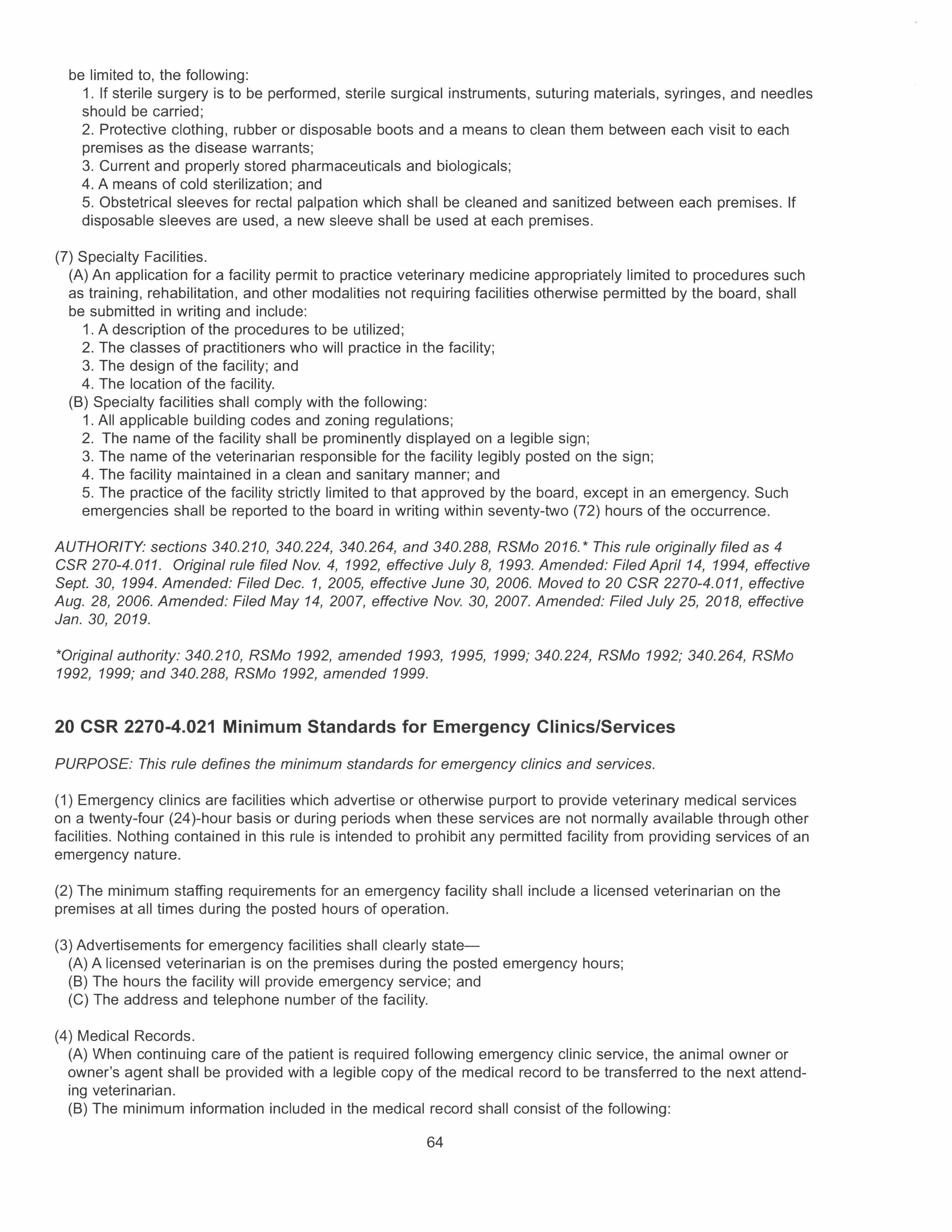
PURPOSE: This rule defines the minimum standards for emergency clinics and services.
(1) Emergency clinics are facilities which advertise or otherwise purport to provide veterinary medical services on a twenty-four (24 )-hour basis or during periods when these services are not normally available through other facilities. Nothing contained in this rule is intended to prohibit any permitted facility from providing services of an emergency nature.
(2) The minimum staffing requirements for an emergency facility shall include a licensed veterinarian on the premises at all times during the posted hours of operation.
(3) Advertisements for emergency facilities shall clearly state-
(A) A licensed veterinarian is on the premises during the posted emergency hours;
(B) The hours the facility will provide emergency service; and
(C) The address and telephone number of the facility.
(4) Medical Records.
(A) When continuing care of the patient is required following emergency clinic service, the animal owner or owner's agent shall be provided with a legible copy of the medical record to be transferred to the next attending veterinarian.
(B) The minimum information included in the medical record shall consist of the following:
64
1. Physical examination findings;
2. Dosages and time of administration of medications;
3 Copies of diagnostic data or procedures;
4. All radiographs, for which the facility shall obtain a signed release when transferred ;
5. Surgical summary;
6. Tentative diagnosis and prognosis; and
7. Follow-up recommendations.
(5) Equipment. In addition to the equipment for veterinary hospitals and clinics, all emergency facilities also shall have the equipment necessary to perform standard emergency medical procedures, including, but not limited to:
(A) The capacity to render timely and adequate diagnostic radiologic services on premises;
(B) The capacity to render timely and adequate laboratory services; and
(C) The ability to provide diagnostic cardiac monitoring.
AUTHORITY: sections 340.200 and 340.210, RSMo 2016. *This rule originally filed as 4 CSR 270-4.021.
Original rule filed Nov. 4, 1992, effective July 8, 1993. Moved to 20 CSR 2270-4.021, effective Aug. 28, 2006
Amended: Filed July 25, 2018 , effective Jan 30, 2019.
*Original authority: 340.200, RSMo 1992, amended 1999, 2004 and 340 210, RSMo 1992, amended 1993, 1995, 1999.
20 CSR 2270-4.031 Minimum Standards for Practice Techniques
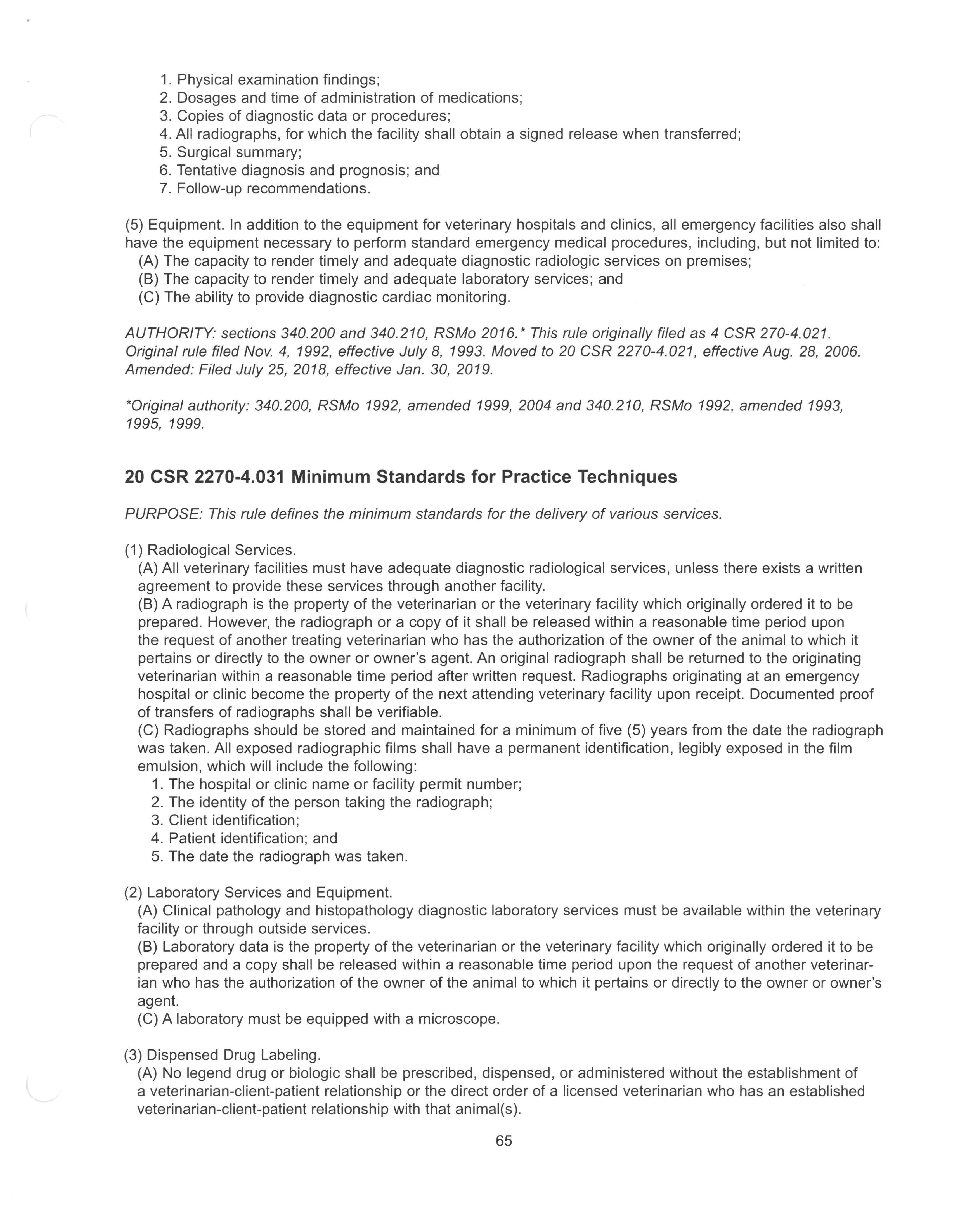
PURPOSE: This rule defines the minimum standards for the delivery of various services.
(1) Radiological Services.
(A) All veterinary facilities must have adequate diagnostic radiological services , unless there exists a written agreement to provide these services through another facility
(B) A radiograph is the property of the veterinarian or the veterinary facility which originally ordered it to be prepared. However, the radiograph or a copy of it shall be released within a reasonable time period upon the request of another treating veterinarian who has the authorization of the owner of the animal to which it pertains or directly to the owner or owner's agent. An original radiograph shall be returned to the originating veterinarian within a reasonable time period after written request. Radiographs originating at an emergency hospital or clinic become the property of the next attending veterinary facility upon receipt. Documented proof of transfers of radiographs shall be verifiable.
(C) Radiographs should be stored and maintained for a minimum of five (5) years from the date the radiograph was taken.·All exposed radiographic films shall have a permanent identification, legibly exposed in the film emulsion , which will include the following:
1. The hospital or clinic name or facility permit number;
2. The identity of the person taking the radiograph;
3. Client identification;
4. Patient identification; and
5. The date the radiograph was taken
(2) Laboratory Services and Equipment.
(A) Clinical pathology and histopathology diagnostic laboratory services must be available within the veterinary facility or through outside services.
(B) Laboratory data is the property of the veterinarian or the veterinary facility which originally ordered it to be prepared and a copy shall be released within a reasonable time period upon the request of another veterinarian who has the authorization of the owner of the animal to which it pertains or directly to the owner or owner's agent.
(C) A laboratory must be equipped with a microscope.
(3) Dispensed Drug Labeling.
(A) No legend drug or biologic shall be prescribed , dispensed, or administered without the establishment of a veterinarian-client-patient relationship or the direct order of a licensed veterinarian who has an established veterinarian-client-patient relationship with that animal(s).
65
(B) The veterinarian in charge is responsible for assuring that any legend drugs and biologicals prescribed for use in the veterinary facility are properly administered, for maintaining accurate records to include strength, dosage, and quantity of all medications used or prescribed and for instructions to clients on the administration of drugs when the veterinarian will not be providing direct supervision.
(C) All drugs and biologicals shall be maintained, administered, dispensed, and prescribed in compliance with state and federal laws.
(D) All repackaged legend drugs dispensed for companion animals shall be in approved safety closure containers, except that this provision shall not apply to drugs dispensed to any person who requests that the medication not be placed in these containers, or in those cases in which the medication is of a form or size that it cannot be dispensed reasonably in these containers.
(E) All drugs dispensed shall be labeled in compliance with all state and federal laws and as a minimum include:
1. Name, address, and telephone number of the facility;
2. Patient's name;
3. Date dispensed;
4. Directions for use;
5. Name, strength (if more than one (1) dosage form exists), and quantity of drug and the expiration date when available; and
6. Name of prescribing veterinarian.
(F) All clients shall have the right to receive a written prescription from their veterinarian to take to the pharmacy of their choice so long as a valid veterinarian-patient-client relationship exists.
(G) Records shall be maintained of all medications prescribed and dispensed for any animal or group of animals in that animal's individual record or the herd owner's record. These pharmacy records may be transferred, in whole or in part, from one veterinarian to another, in writing or by telephone, at the request of the client/owner or owner's agent, when necessary to continue treatment or disease prevention medication started by the original attending veterinarian.
(H) A veterinarian may dispense no more than a seven (7) day supply per patient from an office stock compounded preparation provided by a licensed pharmacy. A patient specific prescription must be issued to continue treatment beyond seven (7) days and comply with all other requirements under this rule.
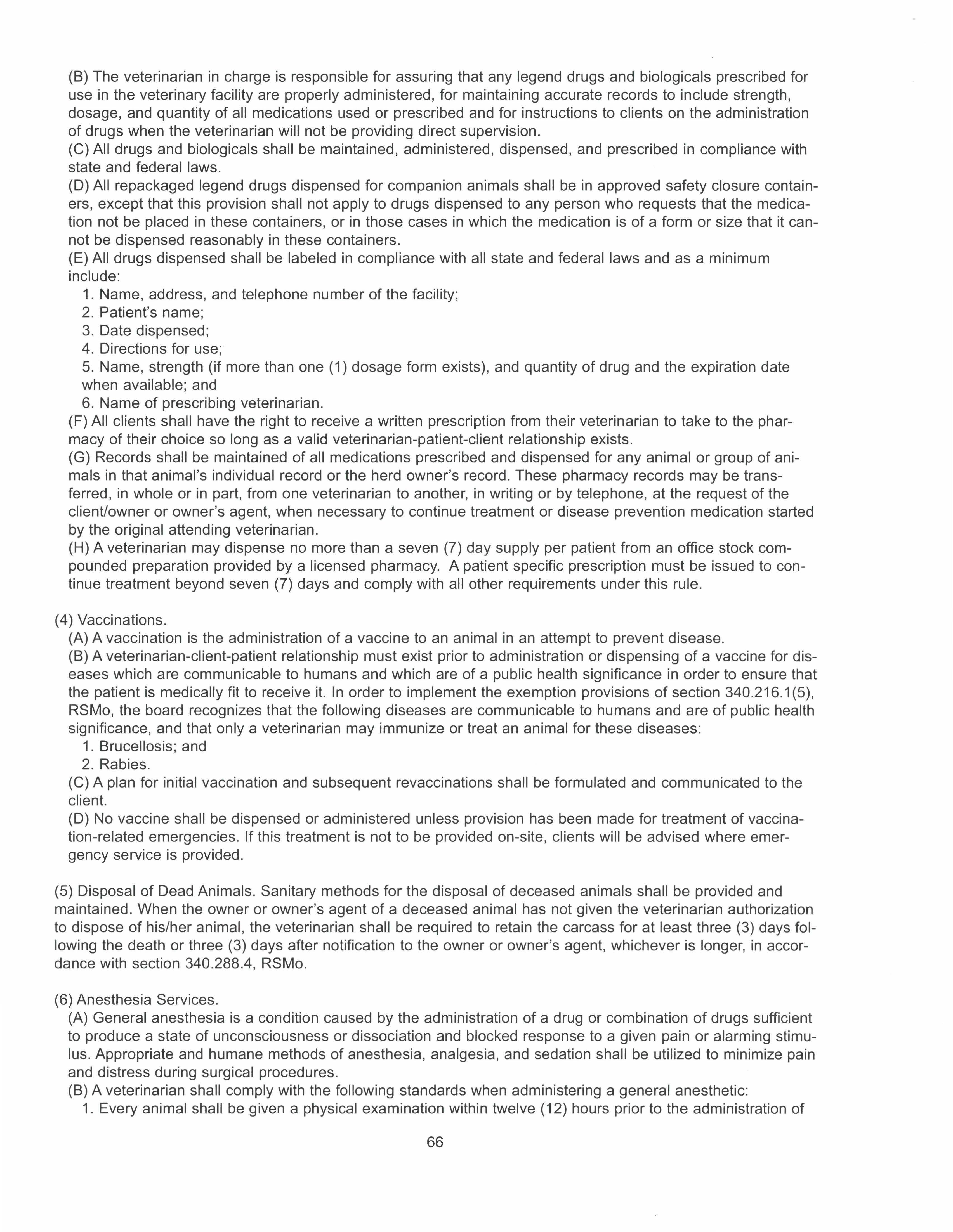
(4) Vaccinations.
(A) A vaccination is the administration of a vaccine to an animal in an attempt to prevent disease.
(B) A veterinarian-client-patient relationship must exist prior to administration or dispensing of a vaccine for diseases which are communicable to humans and which are of a public health significance in order to ensure that the patient is medically fit to receive it. In order to implement the exemption provisions of section 340.216.1 (5), RSMo, the board recognizes that the following diseases are communicable to humans and are of public health significance, and that only a veterinarian may immunize or treat an animal for these diseases:
1. Brucellosis; and
2. Rabies.
(C) A plan for initial vaccination and subsequent revaccinations shall be formulated and communicated to the client.
(D) No vaccine shall be dispensed or administered unless provision has been made for treatment of vaccination-related emergencies. If this treatment is not to be provided on-site, clients will be advised where emergency service is provided.
(5) Disposal of Dead Animals. Sanitary methods for the disposal of deceased animals shall be provided and maintained. When the owner or owner's agent of a deceased animal has not given the veterinarian authorization to dispose of his/her animal, the veterinarian shall be required to retain the carcass for at least three (3) days following the death or three (3) days after notification to the owner or owner 's agent, whichever is longer, in accordance with section 340.288.4 , RSMo.
(6) Anesthesia Services.
(A) General anesthesia is a condition caused by the administration of a drug or combination of drugs sufficient to produce a state of unconsciousness or dissociation and blocked response to a given pain or alarming stimulus. Appropriate and humane methods of anesthesia, analgesia, and sedation shall be utilized to minimize pain and distress during surgical procedures.
(B) A veterinarian shall comply with the following standards when administering a general anesthetic:
1. Every animal shall be given a physical examination within twelve (12) hours prior to the administration of
66
an anesthetic; and
2. The animal under general anesthesia shall be under continuous observation until at least the swallowing reflex has returned and not be released to the client until the animal demonstrates a righting reflex. This shall not preclude direct transfer of an animal under anesthesia to a suitable facility for referred observation.
(C) Equipment.
1. Anesthetic equipment in accordance with the level of surgery performed will be available at all times. The minimum amount of support equipment required for the delivery of assisted ventilation will be-
A. Resuscitation bags of appropriate volumes; and
B. An assortment of endotracheal tubes with cuffs in working condition.
2. Oxygen equipment will be available at all times.
3. Some method of respiratory monitoring is mandatory, such as observing chest movements, watching the rebreathing bag, or use of a respirometer. Some method of cardiac monitoring is recommended and may include use of a stethoscope or electrocardiographic monitor.
(D) Effective means shall be provided for exhausting waste gases from hospital areas in which inhalation anesthesia is used. These means shall comply with existing federal, state, and local regulations and may include use of filtration canisters, gravitational or negative-suction venting, or a combination of these.
(E) Anesthetic equipment will be maintained in proper working condition.
(7) Surgical Services.
(A) Sterile surgery shall be defined as procedures in which aseptic technique is practiced in patient preparation, instrumentation, and surgical attire.
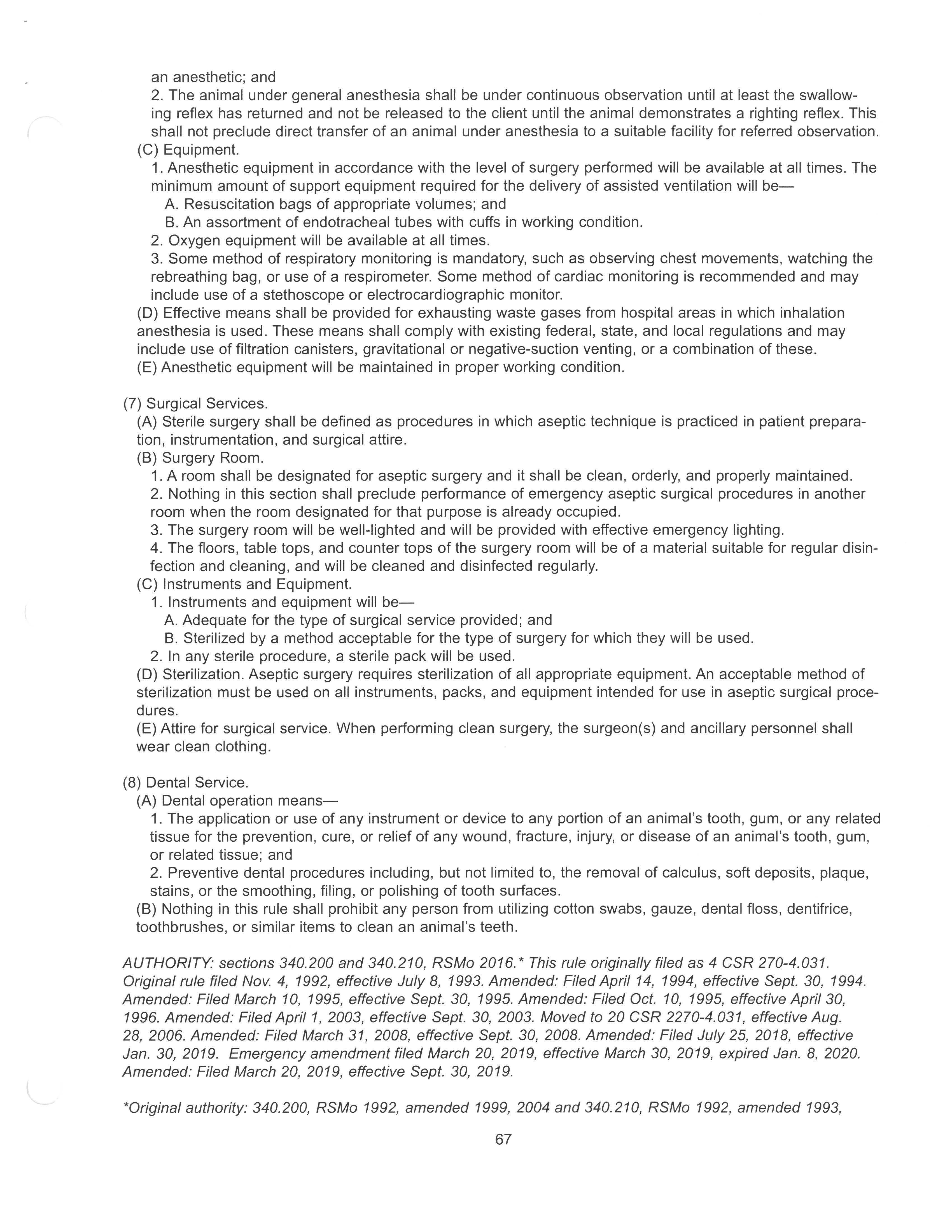
(B) Surgery Room.
1. A room shall be designated for aseptic surgery and it shall be clean, orderly, and properly maintained.
2. Nothing in this section shall preclude performance of emergency aseptic surgical procedures in another room when the room designated for that purpose is already occupied.
3. The surgery room will be well-lighted and will be provided with effective emergency lighting.
4. The floors, table tops, and counter tops of the surgery room will be of a material suitable for regular disinfection and cleaning, and will be cleaned and disinfected regularly.
(C) Instruments and Equipment.
1. Instruments and equipment will be-
A. Adequate for the type of surgical service provided; and
B. Sterilized by a method acceptable for the type of surgery for which they will be used.
2. In any sterile procedure, a sterile pack will be used.
(D) Sterilization. Aseptic surgery requires sterilization of all appropriate equipment. An acceptable method of sterilization must be used on all instruments, packs, and equipment intended for use in aseptic surgical procedures.
(E) Attire for surgical service. When performing clean surgery, the surgeon(s) and ancillary personnel shall wear clean clothing.
(8) Dental Service.
(A) Dental operation means-
1. The application or use of any instrument or device to any portion of an animal's tooth, gum, or any related tissue for the prevention, cure, or relief of any wound, fracture, injury, or disease of an animal's tooth, gum, or related tissue; and
2. Preventive dental procedures including, but not limited to, the removal of calculus, soft deposits, plaque, stains, or the smoothing, filing, or polishing of tooth surfaces.
(B) Nothing in this rule shall prohibit any person from utilizing cotton swabs, gauze, dental floss, dentifrice, toothbrushes, or similar items to clean an animal's teeth.
AUTHORITY: sections 340.200 and 340.210, RSMo 2016. *This rule originally filed as 4 CSR 270-4.031.
Original rule filed Nov. 4, 1992, effective July 8, 1993. Amended: Filed April 14, 1994, effective Sept. 30, 1994.
Amended: Filed March 10, 1995, effective Sept. 30, 1995. Amended: Filed Oct. 10, 1995, effective April 30, 1996. Amended: Filed April1, 2003, effective Sept. 30, 2003. Moved to 20 CSR 2270-4.031, effective Aug. 28, 2006. Amended: Filed March 31, 2008, effective Sept. 30, 2008. Amended: Filed July 25, 2018, effective Jan. 30, 2019. Emergency amendment filed March 20, 2019, effective March 30, 2019, expired Jan. 8, 2020.
Amended: Filed March 20, 2019, effective Sept. 30, 2019.
*Original authority: 340.200, RSMo 1992, amended 1999, 2004 and 340.210, RSMo 1992, amended 1993, 67
20 CSR 2270-4.041 Minimum Standards for Medical Records
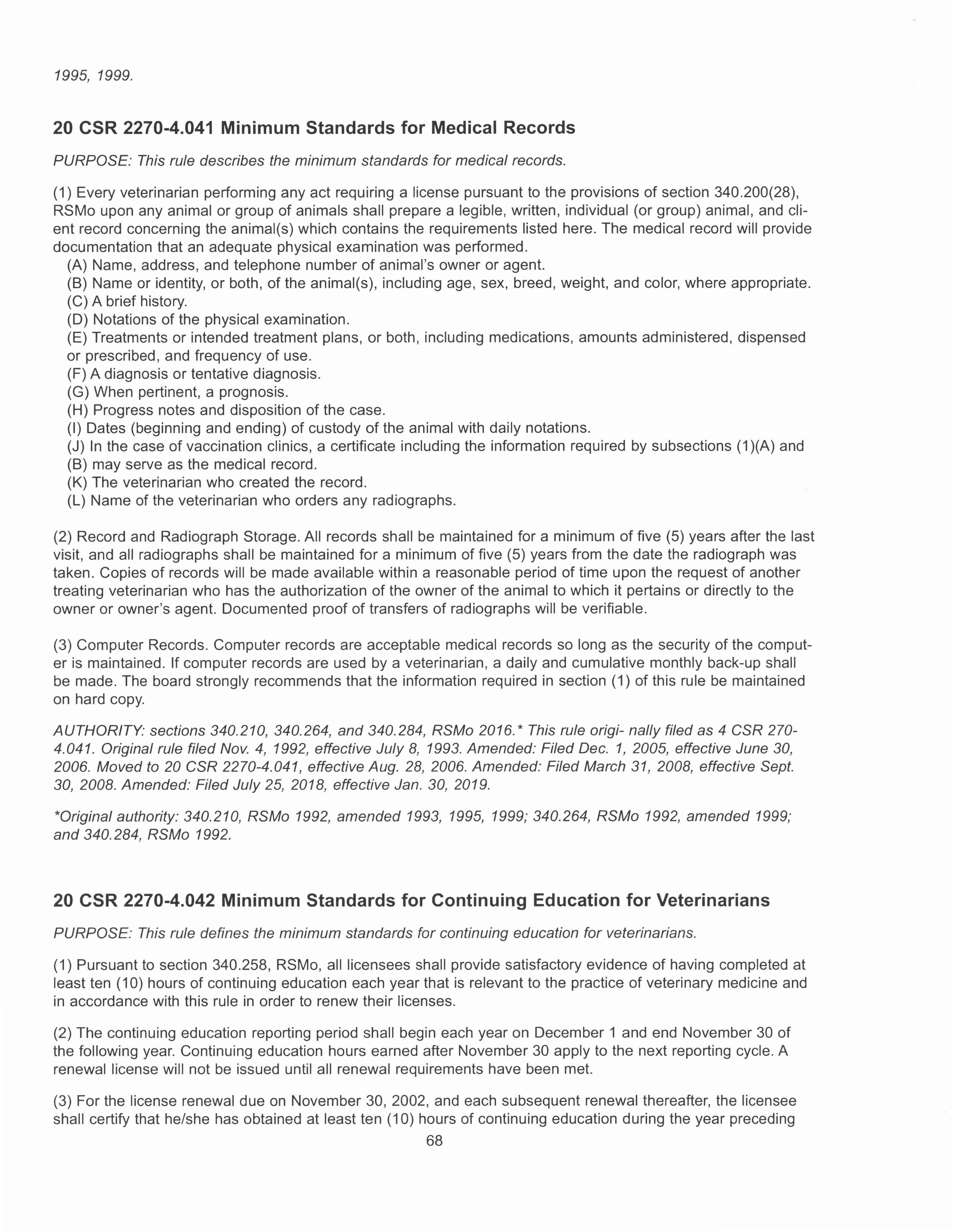
PURPOSE: This rule describes the minimum standards for medical records.
(1) Every veterinarian performing any act requiring a license pursuant to the provisions of section 340.200(28), RSMo upon any animal or group of animals shall prepare a legible, written, individual (or group) animal, and client record concerning the animal(s) which contains the requirements listed here. The medical record will provide documentation that an adequate physical examination was performed.
(A) Name, address, and telephone number of animal's owner or agent.
(B) Name or identity, or both, of the animal(s), including age, sex, breed, weight, and color, where appropriate.
(C) A brief history.
(D) Notations of the physical examination.
(E) Treatments or intended treatment plans, or both, including medications, amounts administered, dispensed or prescribed, and frequency of use.
(F) A diagnosis or tentative diagnosis.
(G) When pertinent, a prognosis.
(H) Progress notes and disposition of the case.
(I) Dates (beginning and ending) of custody of the animal with daily notations.
(J) In the case of vaccination clinics, a certificate including the information required by subsections (1 )(A) and
(B) may serve as the medical record.
(K) The veterinarian who created the record.
(L) Name of the veterinarian who orders any radiographs.
(2) Record and Radiograph Storage. All records shall be maintained for a minimum of five (5) years after the last visit, and all radiographs shall be maintained for a minimum of five (5) years from the date the radiograph was taken. Copies of records will be made available within a reasonable period of time upon the request of another treating veterinarian who has the authorization of the owner of the animal to which it pertains or directly to the owner or owner's agent. Documented proof of transfers of radiographs will be verifiable.
(3) Computer Records. Computer records are acceptable medical records so long as the security of the computer is maintained. If computer records are used by a veterinarian, a daily and cumulative monthly back-up shall be made. The board strongly recommends that the information required in section (1) of this rule be maintained on hard copy.
AUTHORITY· sections 340.210, 340.264, and 340.284, RSMo 2016. *This rule origi-nally filed as 4 CSR 2704.041. Original rule filed Nov. 4, 1992, effective July 8, 1993. Amended: Filed Dec. 1, 2005, effective June 30, 2006. Moved to 20 CSR 2270-4.041, effective Aug. 28, 2006. Amended: Filed March 31, 2008, effective Sept. 30, 2008. Amended: Filed July 25, 2018, effective Jan. 30, 2019.
*Original authority: 340.210, RSMo 1992, amended 1993, 1995, 1999; 340.264, RSMo 1992, amended 1999; and 340.284, RSMo 1992.
20 CSR 2270-4.042 Minimum Standards for Continuing Education for Veterinarians
PURPOSE: This rule defines the minimum standards for continuing education for veterinarians.
(1) Pursuant to section 340.258, RSMo, all licensees shall provide satisfactory evidence of having completed at least ten (1 0) hours of continuing education each year that is relevant to the practice of veterinary medicine and in accordance with this rule in order to renew their licenses.
(2) The continuing education reporting period shall begin each year on December 1 and end November 30 of the following year. Continuing education hours earned after November 30 apply to the next reporting cycle. A renewal license will not be issued until all renewal requirements have been met.
(3) For the license renewal due on November 30, 2002, and each subsequent renewal thereafter, the licensee shall certify that he/she has obtained at least ten (1 0) hours of continuing education during the year preceding 68
1995, 1999.
the license renewal on the renewal form provided by the board The renewal form shall be mailed directly to the board office prior to November 30 of each year. The licensee shall not submit the record of continuing education attendance to the board except in the case of a board audit. A licensee is not required to obtain any continuing education hours for the reporting period in which the licensee graduates from an accredited school of veterinary medicine and is initially licensed to practice as a veterinarian in Missouri.
(4) Every licensee shall maintain full and complete records of all approved continuing education hours earned for the two (2) previous reporting periods in addition to the current reporting period. The records shall document the titles of the courses taken, dates, locations, course sponsors , number of hours earned, and certificate of attendance or completion The board may conduct an audit of licensees to verify compliance with the continuing education requirements. Licensees shall assist the board in its audits by providing timely and complete responses to the board's inquiries.
(5) Violation of any provision of this rule shall be grounds for discipline in accordance with section 340.264, RSMo
(6) A continuing education hour includes but is not limited to:
(A) Fifty (50) minutes of attendance at an approved workshop or seminar;
(B) Fifty (50) minutes of reading an approved scientific journal;
(C) Twenty-five (25) minutes of presentation in an approved workshop or seminar. No credit shall be granted for any subsequent presentations on the same subject matter during the same renewal period;
(D) Completion of academic course work for credit in veterinary medicine at an accredited college of veterinary medicine with one (1) credit hour equaling ten (1 0) continuing education hours.
(7) The required ten (1 0) hours may be satisfied through any combination of the following education activities:
(A) Attendance or presentation at scientific workshops or seminars approved by this board;
(B) Completion of audio or video recordings , electronic, computer, or interactive materials or programs on scientific subjects prepared or sponsored by any of the organizations defined in section (8) below. The licensee must obtain written certification of course completion from the sponsor;
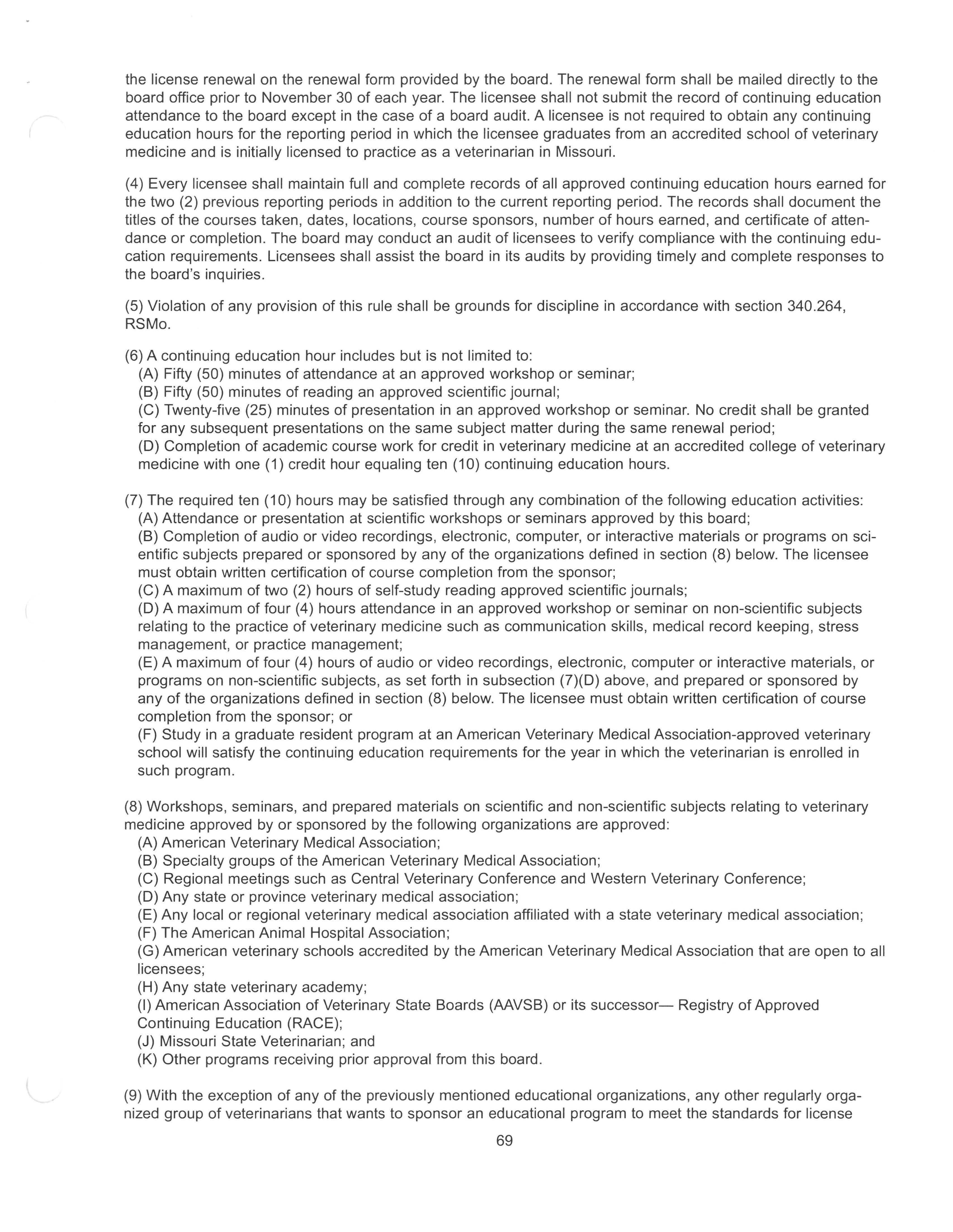
(C) A maximum of two (2) hours of self-study reading approved scientific journals;
(D) A maximum of four (4) hours attendance in an approved workshop or seminar on non-scientific subjects relating to the practice of veterinary medicine such as communication skills, medical record keeping , stress management, or practice management;
(E) A maximum of four (4) hours of audio or video recordings, electronic, computer or interactive materials, or programs on non-scientific subjects, as set forth in subsection (7)(D) above, and prepared or sponsored by any of the organizations defined in section (8) below. The licensee must obtain written certification of course completion from the sponsor; or
(F) Study in a graduate resident program at an American Veterinary Medical Association-approved veterinary school will satisfy the continuing education requirements for the year in which the veterinarian is enrolled in such program.
(8) Workshops, seminars, and prepared materials on scientific and non-scientific subjects relating to veterinary medicine approved by or sponsored by the following organizations are approved :
(A) American Veterinary Medical Association;
(B) Specialty groups of the American Veterinary Medical Association;
(C) Regional meetings such as Central Veterinary Conference and Western Veterinary Conference;
(D) Any state or province veterinary medical association;
(E) Any local or regional veterinary medical association affiliated with a state veterinary medical association;
(F) The American Animal Hospital Association;
(G) American veterinary schools accredited by the American Veterinary Medical Association that are open to all licensees;
(H) Any state veterinary academy;
(I) American Association of Veterinary State Boards (AAVSB) or its successor- Registry of Approved Continuing Education (RACE) ;
(J) Missouri State Veterinarian ; and
(K) Other programs receiving prior approval from this board
(9) With the exception of any of the previously mentioned educational organizations, any other regularly organized group of veterinarians that wants to sponsor an educational program to meet the standards for license 69
renewal in Missouri shall submit one (1) copy of the program schedule and outline to the board's executive director not fewer than thirty (30) days prior to the date of the program. The outline must include the program's subject matter, the number of hours required for its presentation, and the identity and qualifications of the speakers and instructors. The board shall review the schedule and outline to determine if approval will be granted. The board will not consider requests for approval of any program submitted after it has already been presented.
(10) The following scientific journals are approved by the board:
(A) Journal of the American Veterinary Medical Association;
(B) The Journal of Veterinary Research;
(C) Veterinary Medicine;
(D) Publications of the American Veterinary Medical Association Approved Constituent Specialty Groups;
(E) Compendium of continuing education;
(F) Journal of American Animal Hospital Association;
(G) Other publications approved in advance by the board.
(11) The board shall waive continuing education requirements as required by section 41.946, RSMo, and grant a waiver or an extension of time for continuing education requirements to a licensee for good cause. Any licensee seeking renewal of a license or certificate without having fully complied with these continuing education requirements who wishes to seek a waiver or extension of the requirements shall file with the board a renewal application, a statement setting forth the facts concerning the noncompliance, a request for waiver or an extension of time in which to complete the continuing education requirements and, if desired, a request for an interview before the board. If the board finds from the statement or any other evidence submitted, that good cause has been shown for waiving the continuing education requirements, or any part thereof, or for granting an extension of time in which to obtain the required continuing education hours, the board shall waive part or all of the requirements for the renewal period for which the licensee has applied or grant an extension of time, not to exceed six (6) months, in which to obtain the required continuing education hours. At that time, the licensee will be requested to submit the required renewal fee.
(A) Good cause shall be defined as an inability to devote sufficient hours to fulfilling the continuing education requirements during the applicable renewal period based on one (1) of the following reasons:
1. Full-time service in the armed forces of the United States during a substantial part of the renewal period; or
2. An incapacitating illness; or
3. Undue hardship.
(B) If an interview before the board is requested at the time the request for waiver or extension is filed, the licensee shall be given at least twenty (20) days written notice of the date, time, and place of the interview.
(12) Continuing education credit hours used to satisfy the continuing education requirements of another state may be submitted to fulfill the requirements of this state if the other state's continuing education require- ments are substantially equal to or greater than the requirements of this state.
(13) A licensee who completes more than ten (1 0) continuing education hours, excluding self-study, during the current reporting period may receive credit for the excess hours, not to exceed ten (1 0), in the next succeeding reporting period. Continuing education hours cannot be carried over more than one (1) continuing education reporting period after being earned.
(14) Any licensee who seeks to renew an inactive, retired, or noncurrent license shall submit proper evidence that s/he has obtained at least ten (1 0) continuing education hours for each year that his/her license was inactive, retired, or noncurrent. These required approved continuing education credits shall not exceed a total of fifty (50) hours. The required hours must have been obtained within three (3) years prior to renewal.
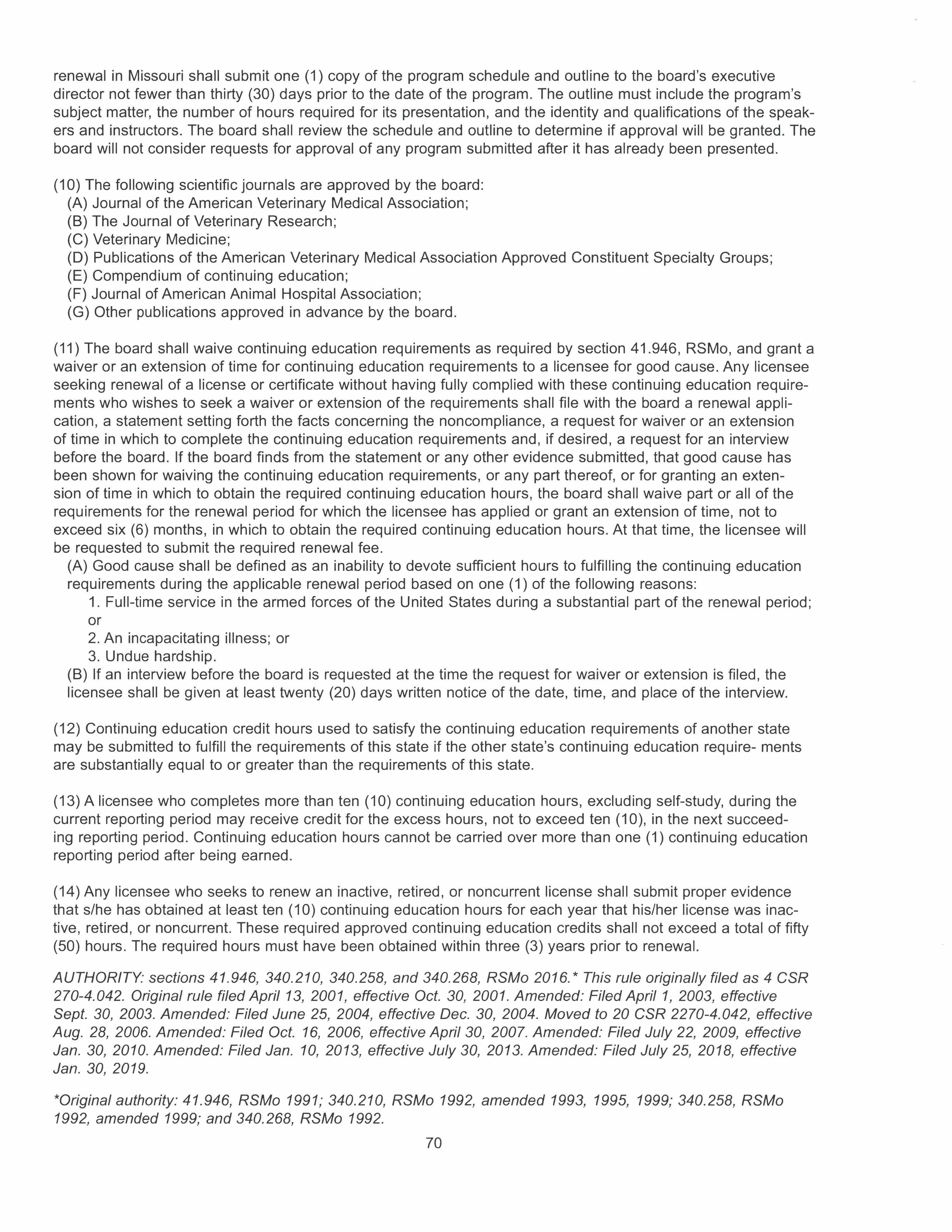
AUTHORITY: sections 41.946, 340.210, 340.258, and 340 268, RSMo 2016. *This rule originally filed as 4 CSR 270-4.042. Original rule filed April 13, 2001, effective Oct. 30, 2001. Amended: Filed April 1, 2003, effective Sept. 30, 2003. Amended: Filed June 25, 2004, effective Dec. 30, 2004. Moved to 20 CSR 2270-4.042, effective Aug. 28, 2006. Amended: Filed Oct. 16, 2006, effective April 30, 2007. Amended: Filed July 22, 2009, effective Jan. 30, 2010. Amended: Filed Jan. 10, 2013, effective July 30, 2013. Amended: Filed July 25, 2018, effective Jan. 30, 2019.
*Original authority: 41.946, RSMo 1991; 340.210, RSMo 1992, amended 1993, 1995, 1999; 340.258, RSMo 1992, amended 1999; and 340.268, RSMo 1992.
70
20 CSR 2270-4.050 Minimum Standards for Continuing Education for Veterinary Technicians
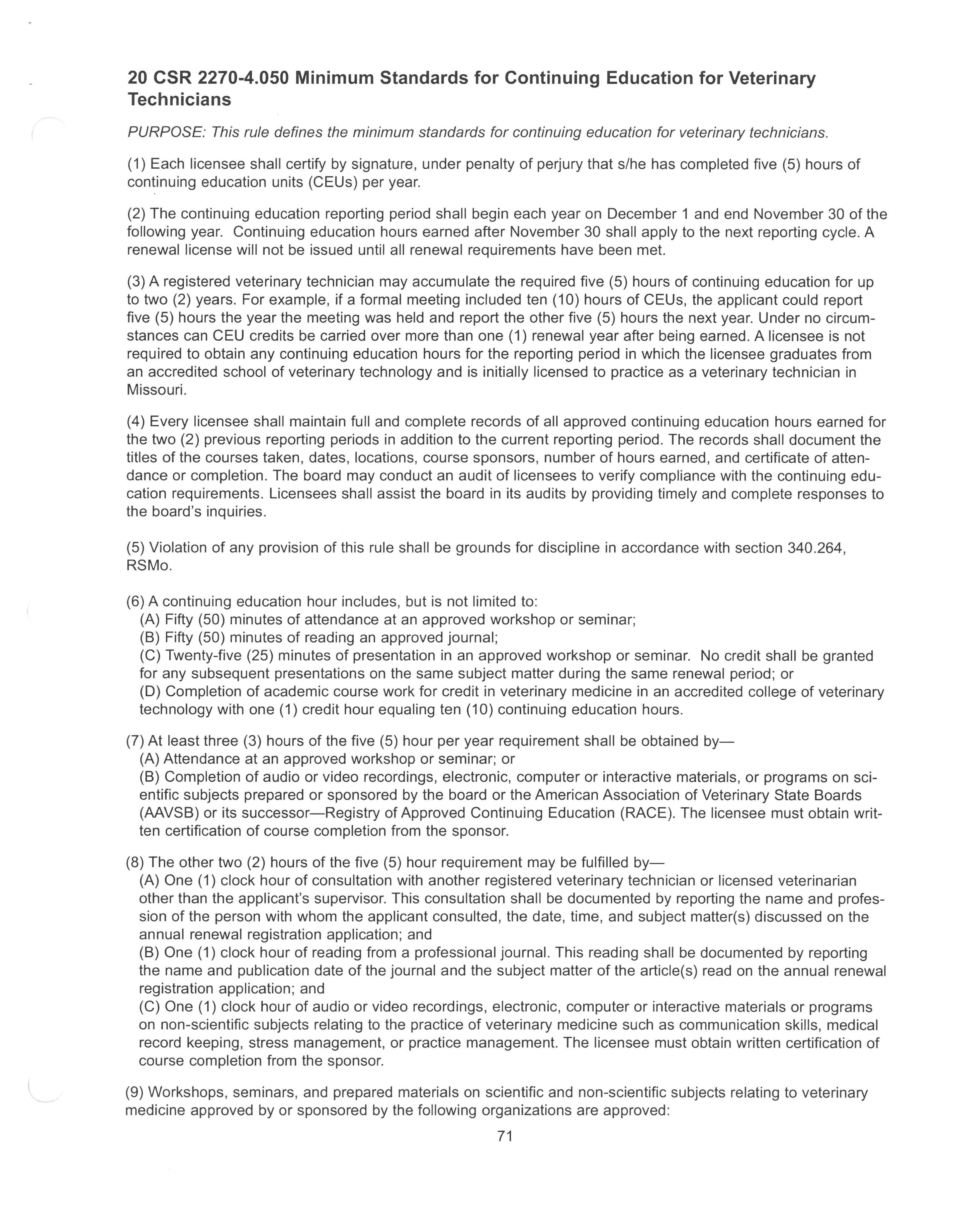
PURPOSE: This rule defines the minimum standards for continuing education for veterinary technicians.
(1) Each licensee shall certify by signature, under penalty of perjury that s/he has completed five (5) hours of continuing education units (CEUs) per year.
(2) The continuing education reporting period shall begin each year on December 1 and end November 30 of the following year. Continuing education hours earned after November 30 shall apply to the next reporting cycle. A renewal license will not be issued until all renewal requirements have been met.
(3) A registered veterinary technician may accumulate the required five (5) hours of continuing education for up to two (2) years. For example, if a formal meeting included ten (1 0) hours of CEUs, the applicant could report five (5) hours the year the meeting was held and report the other five (5) hours the next year. Under no circumstances can CEU credits be carried over more than one (1) renewal year after being earned. A licensee is not required to obtain any continuing education hours for the reporting period in which the licensee graduates from an accredited school of veterinary technology and is initially licensed to practice as a veterinary technician in Missouri.
(4) Every licensee shall maintain full and complete records of all approved continuing education hours earned for the two (2) previous reporting periods in addition to the current reporting period. The records shall document the titles of the courses taken, dates, locations, course sponsors, number of hours earned, and certificate of attendance or completion. The board may conduct an audit of licensees to verify compliance with the continuing education requirements. Licensees shall assist the board in its audits by providing timely and complete responses to the board's inquiries.
(5) Violation of any provision of this rule shall be grounds for discipline in accordance with section 340.264, RSMo.
(6) A continuing education hour includes, but is not limited to:
(A) Fifty (50) minutes of attendance at an approved workshop or seminar;
(B) Fifty (50) minutes of reading an approved journal;
(C) Twenty-five (25) minutes of presentation in an approved workshop or seminar. No credit shall be granted for any subsequent presentations on the same subject matter during the same renewal period; or
(D) Completion of academic course work for credit in veterinary medicine in an accredited college of veterinary technology with one (1) credit hour equaling ten (1 0) continuing education hours.
(7) At least three (3) hours of the five (5) hour per year requirement shall be obtained by-
(A) Attendance at an approved workshop or seminar; or
(B) Completion of audio or video recordings, electronic, computer or interactive materials, or programs on scientific subjects prepared or sponsored by the board or the American Association of Veterinary State Boards (AAVSB) or its successor-Registry of Approved Continuing Education (RACE). The licensee must obtain written certification of course completion from the sponsor.
(8) The other two (2) hours of the five (5) hour requirement may be fulfilled by-
(A) One (1) clock hour of consultation with another registered veterinary technician or licensed veterinarian other than the applicant's supervisor. This consultation shall be documented by reporting the name and profession of the person with whom the applicant consulted, the date, time, and subject matter(s) discussed on the annual renewal registration application; and
(B) One (1) clock hour of reading from a professional journal. This reading shall be documented by reporting the name and publication date of the journal and the subject matter of the article(s) read on the annual renewal registration application; and
(C) One (1) clock hour of audio or video recordings, electronic, computer or interactive materials or programs on non-scientific subjects relating to the practice of veterinary medicine such as communication skills, medical record keeping, stress management, or practice management. The licensee must obtain written certification of course completion from the sponsor.
(9) Workshops, seminars, and prepared materials on scientific and non-scientific subjects relating to veterinary medicine approved by or sponsored by the following organizations are approved:
71
(A) American Veterinary Medical Association;
(B) Specialty groups of the American Veterinary Medical Association;
(C) Regional meetings such as Central Veterinary Conference and Western Veterinary Conference;
(D) Any state or province veterinary medical association;
(E) Any local or regional veterinary medical association affiliated with a state veterinary medical association;
(F) The American Animal Hospital Association;
(G) American veterinary schools accredited by the American Veterinary Medical Association that are open to all licensees;
(H) Any state veterinary academy;
(I) American Association of Veterinary State Boards (AAVSB) or its successor-Registry of Approved Continuing Education (RACE);
(J) Missouri State Veterinarian; and
(K) Other programs receiving prior approval from this board.
(10) With the exception of any of the previously mentioned educational organizations, any other regularly organized group of veterinarians or veterinary technicians that want to sponsor an educational program to meet the standards for license renewal in Missouri shall submit one (1) copy of the program schedule and outline to the board's executive director not fewer than thirty (30) days prior to the date of the program. The outline must include the program's subject matter, the number of hours required for its presentation and the identity and qualifications of the speakers and instructors. The board shall review the schedule and outline to determine if approval will be granted. The board will not consider requests for approval of any program submitted after it has already been presented.
(11) The board shall waive continuing education requirements as required by section 41.946, RSMo and otherwise may grant a waiver or an extension of time for continuing education requirements to a licensee for good cause. Any licensee seeking renewal of a license or certificate without having fully complied with these continuing education requirements who wishes to seek a waiver or extension of the requirements shall file with the board a renewal application, a statement setting forth the facts concerning the noncompliance, a request for waiver or extension of time in which to complete the continuing education requirements and, if desired, a request for an interview before the board. If the board finds from the statement or any other evidence submitted, that good cause has been shown for waiving the continuing education requirements, or any part thereof, or for granting an extension of time in which to obtain the required continuing education hours, the board shall waive part or all of the requirements for the renewal period for which the licensee has applied or grant an extension of time, not to exceed six (6) months, in which to obtain the required continuing education hours. At that time, the licensee will be requested to submit the required renewal fee.
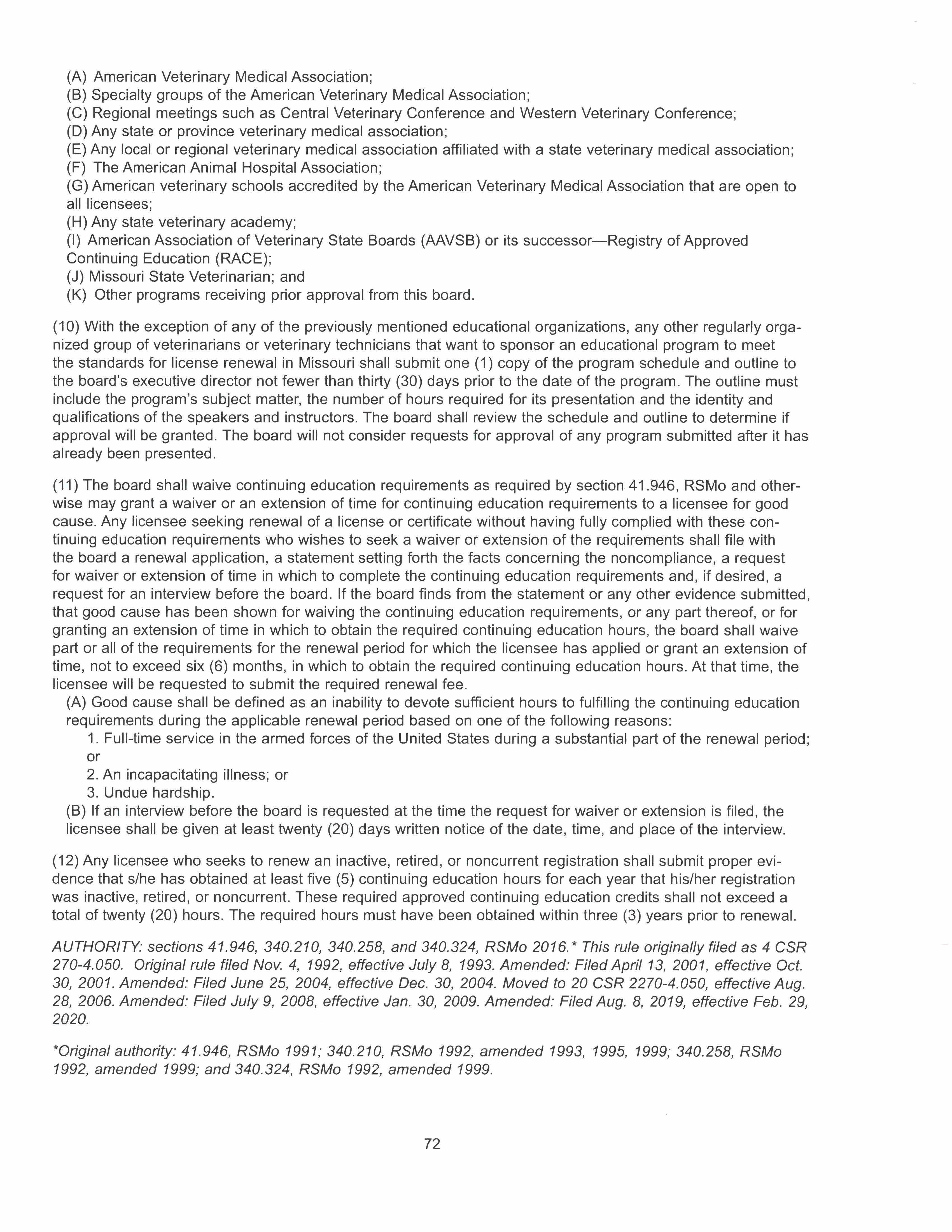
(A) Good cause shall be defined as an inability to devote sufficient hours to fulfilling the continuing education requirements during the applicable renewal period based on one of the following reasons:
1. Full-time service in the armed forces of the United States during a substantial part of the renewal period; or
2. An incapacitating illness; or
3. Undue hardship.
(B) If an interview before the board is requested at the time the request for waiver or extension is filed, the licensee shall be given at least twenty (20) days written notice of the date, time, and place of the interview.
(12) Any licensee who seeks to renew an inactive, retired, or noncurrent registration shall submit proper evidence that s/he has obtained at least five (5) continuing education hours for each year that his/her registration was inactive, retired, or noncurrent. These required approved continuing education credits shall not exceed a total of twenty (20) hours. The required hours must have been obtained within three (3) years prior to renewal.
AUTHORITY" sections 41.946, 340.210, 340.258, and 340.324, RSMo 2016. *This rule originally filed as 4 CSR 270-4.050. Original rule filed Nov. 4, 1992, effective July 8, 1993. Amended: Filed Apri/13, 2001, effective Oct. 30, 2001. Amended: Filed June 25, 2004, effective Dec. 30, 2004. Moved to 20 CSR 2270-4.050, effective Aug. 28, 2006. Amended: Filed July 9, 2008, effective Jan. 30, 2009. Amended: Filed Aug. 8, 2019, effective Feb. 29, 2020.
*Original authority: 41.946, RSMo 1991; 340.210, RSMo 1992, amended 1993, 1995, 1999; 340.258, RSMo 1992, amended 1999; and 340.324, RSMo 1992, amended 1999.
72
20 CSR 2270-4.060 Minimum Standards for Supervision
PURPOSE: This rule defines the minimum standards for supervision.
(1) Duties of the Supervising Veterinarian-
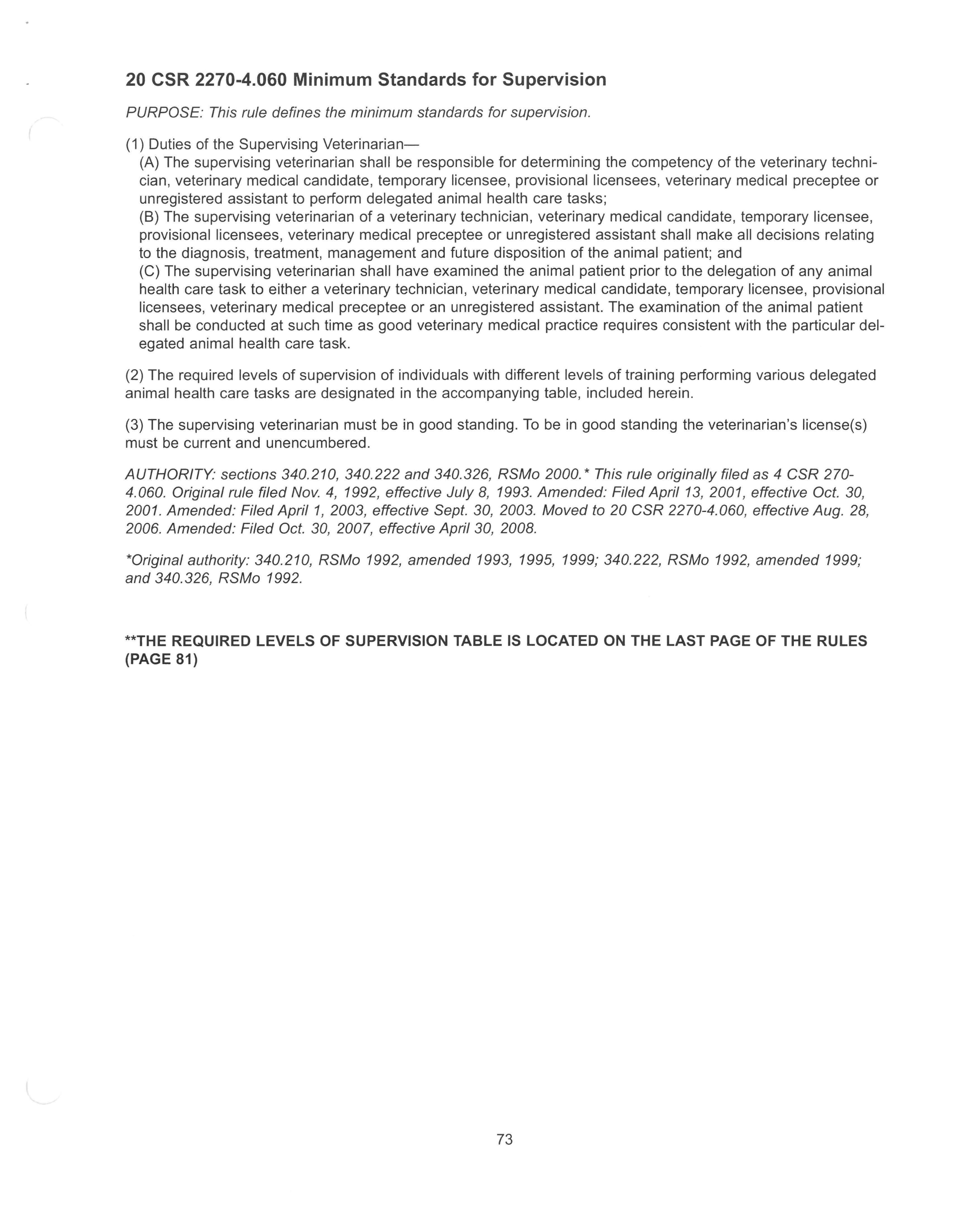
(A) The supervising veterinarian shall be responsible for determining the competency of the veterinary technician, veterinary medical candidate, temporary licensee, provisional licensees, veterinary medical preceptee or unregistered assistant to perform delegated animal health care tasks;
(B) The supervising veterinarian of a veterinary technician, veterinary medical candidate, temporary licensee, provisional licensees, veterinary medical preceptee or unregistered assistant shall make all decisions relating to the diagnosis, treatment, management and future disposition of the animal patient; and
(C) The supervising veterinarian shall have examined the animal patient prior to the delegation of any animal health care task to either a veterinary technician, veterinary medical candidate, temporary licensee, provisional licensees, veterinary medical preceptee or an unregistered assistant. The examination of the animal patient shall be conducted at such time as good veterinary medical practice requires consistent with the particular delegated animal health care task.
(2) The required levels of supervision of individuals with different levels of training performing various delegated animal health care tasks are designated in the accompanying table, included herein.
(3) The supervising veterinarian must be in good standing. To be in good standing the veterinarian's license(s) must be current and unencumbered.
AUTHORITY: sections 340.210, 340.222 and 340.326 , RSMo 2000. *This rule originally filed as 4 CSR 2704 060. Original rule filed Nov 4, 1992, effective July 8, 1993. Amended: Filed April 13, 2001 , effective Oct. 30, 2001 . Amended: Filed April1, 2003, effective Sept. 30, 2003. Moved to 20 CSR 2270-4.060, effective Aug. 28, 2006. Amended: Filed Oct. 30, 2007, effective April 30, 2008.
*Original authority: 340.210, RSMo 1992, amended 1993, 1995, 1999; 340 222, RSMo 1992, amended 1999; and 340.326, RSMo 1992.
**THE REQUIRED LEVELS OF SUPERVISION TABLE IS LOCATED ON THE LAST PAGE OF THE RULES (PAGE 81)
73
Title 20-DEPARTMENT OF COMMERCE AND INSURANCE Division 2270-Missouri Veterinary Medical Board
Chapter 5-Veterinary Facilities Permits
20 CSR 2270-5.011 Permit Applications
PURPOSE: This rule outlines the procedures required to secure a permit for all veterinary facilities and defines the term veterinarian in charge.
(1) All veterinary facilities shall have a facility permit issued by the Missouri Veterinary Medical Board.
(2) Applications for facility permits must be made on the forms provided by the board. Permit application forms may be obtained by requesting them from the executive director, Missouri Veterinary Medical Board, PO Box 633, Jefferson City, MO 65102.
(3) The application must be legible (printed or typed), signed under oath or affirmation by the responsible veterinarian in charge of the facility and accompanied by the appropriate fee.
(4) The veterinarian in charge of the veterinary establishment is responsible for-
(A) The operation and management of the veterinary facility;
(B) Regularly being on site which means being directly present at the facility on a routine basis;
(C) Maintaining the facility within the standards set forth by this chapter and Chapter 4-Minimum Standards; and
(D) The veterinarian in charge will be responsible for the supervision of all veterinary and veterinary technician personnel, to assure full compliance with the veterinary laws of Missouri.
(5) The following documents must be on file for a permit application to be considered complete:
(A) Completed application;
(B) Appropriate fee;
(C) Completed self-inspection form; and
(D) If a business entity owns the facility, a copy of the articles of incorporation, partnership agreement, or business organization documents that clearly state that the licensed veterinarian is not subject to the direction of anyone not licensed to practice veterinary medicine in Missouri in making veterinary medical decisions or judgments.
(6) Upon receipt of a completed application, the facility permit may be issued. The permit shall be conspicuously displayed within the facility.
(7) If ownership of a veterinary facility changes, the veterinarian in charge to whom the permit was originally issued is responsible for notifying the board and returning the permit within thirty (30) days of the change in ownership. The veterinarian in charge must apply for a new permit and submit all applicable fees prior to performing any veterinary services in the facility.
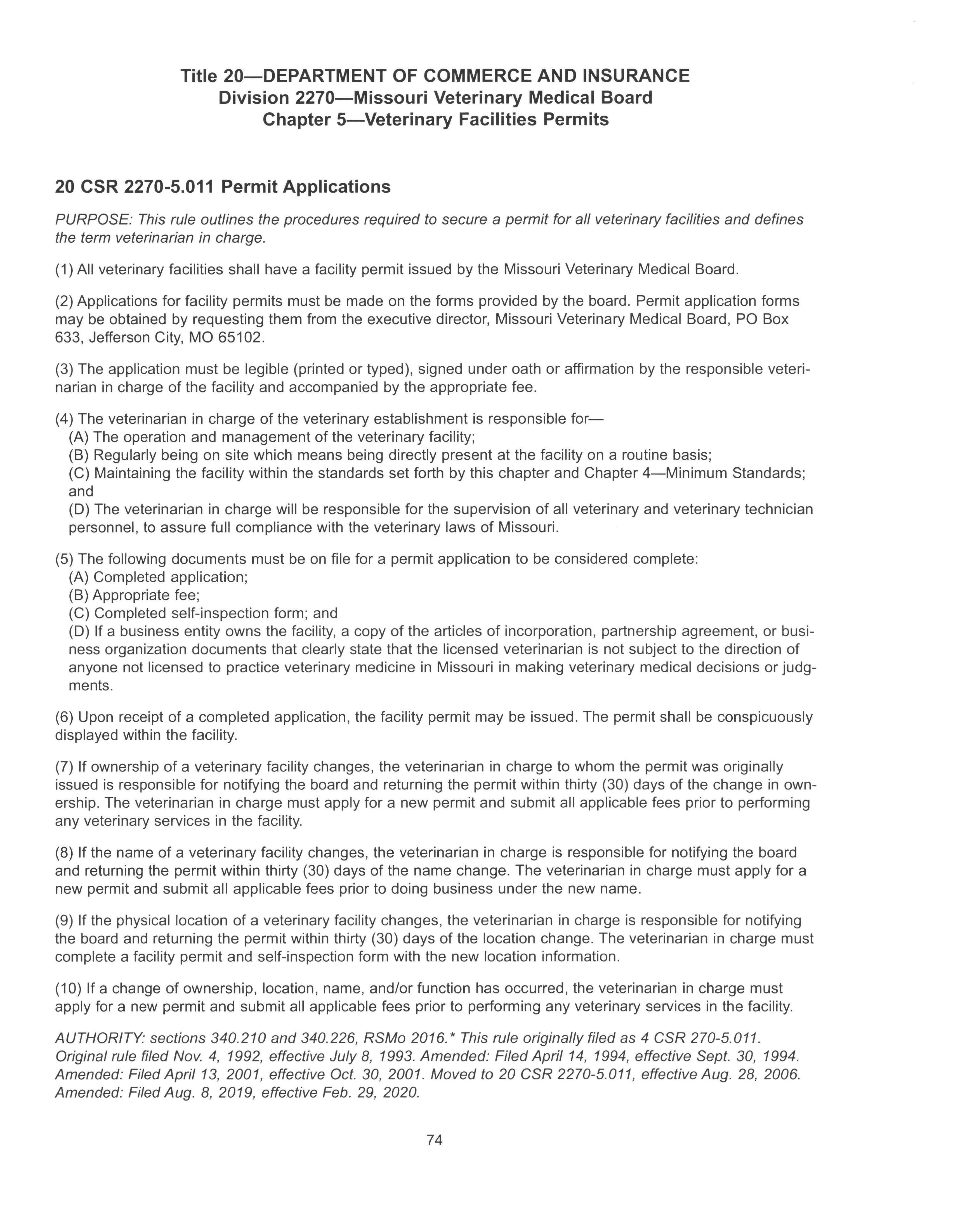
(8) If the name of a veterinary facility changes, the veterinarian in charge is responsible for notifying the board and returning the permit within thirty (30) days of the name change. The veterinarian in charge must apply for a new permit and submit all applicable fees prior to doing business under the new name.
(9) If the physical location of a veterinary facility changes, the veterinarian in charge is responsible for notifying the board and returning the permit within thirty (30) days of the location change. The veterinarian in charge must complete a facility permit and self-inspection form with the new location information.
(1 0) If a change of ownership, location, name, and/or function has occurred, the veterinarian in charge must apply for a new permit and submit all applicable fees prior to performing any veterinary services in the facility.
AUTHORITY· sections 340.210 and 340.226, RSMo 2016. *This rule originally filed as 4 CSR 270-5.011.
Original rule filed Nov. 4, 1992, effective July 8, 1993. Amended: Filed April 14, 1994, effective Sept. 30, 1994.
Amended: Filed April13, 2001, effective Oct. 30, 2001. Moved to 20 CSR 2270-5.011, effective Aug. 28, 2006.
Amended: Filed Aug. 8, 2019, effective Feb. 29, 2020.
74
20 CSR 270-5.021 Veterinary Facility Self-Inspection Procedures
PURPOSE: This rule outlines the procedures for self-inspection of veterinary facilities.
(1) The veterinarian in charge of each veterinary facility in the state is responsible for completing the selfinspection form and returning it to the board office.
(2) The self-inspection form (see 20 CSR 2270-5.011) is available from the executive director, Missouri Veterinary Medical Board, P.O. Box 633, Jefferson City, MO 65102.
(3) The purpose of the self-inspection is to verify that all veterinary facilities comply with the minimum standards which are found in Chapter 4 of these rules.
(4) Pursuant to 340.210, RSMo the board may inspect a veterinary facility about which the board has received a complaint.
AUTHORITY· sections 340.210 and 340.264, RSMo 2000. *This rule originally filed as 4 CSR 270-5 021. Original rule filed Nov. 4, 1992, effective July 8, 1993. Moved to 20 CSR 2270-5.021, effective Aug. 28, 2006. Amended: Filed June 27, 2008, effective Dec. 30, 2008.
*Original authority: 340.210, RSMo 1992, amended 1993, 1995, 1999; and 340.264, RSMo 1992, amended 1999
20 CSR 2270-5.031 Facility Permit Renewal Procedures
PURPOSE: This rule outlines the procedures for the renewal of facility permits.
(1) A facility permit shall be reviewed annually on or before the expiration of the permit by submitting the properly completed renewal application and inspection form and the fee to the Missouri Veterinary Medical Board. The renewal application and inspection form shall be signed under oath or affirmation.
(2) Failure of the veterinarian in charge to receive the notice and application to renew the permit shall not excuse him/her from the requirements of this rule.
(3) Each facility permit shall expire annually on March 31. Failure to renew a permit constitutes grounds for discipline pursuant to 340 264.2(13) and (25) , RSMo for all veterinarians and veterinary technicians working at the facility. If the permit is not renewed within thirty (30) days of the expiration date, a penalty fee will be assessed.
AUTHORITY: sections 340.210, RSMo Supp. 1993 and 340 . 264 , RSMo Supp. 1992. *This rule originally filed as 4 CSR 270-5 031. Original rule filed Nov 4, 1992, effective July 8, 1993. Amended: Filed April14 , 1994 , effective Sept. 30, 1994 Moved to 20 CSR 2270-5.031, effective Aug. 28, 2006.
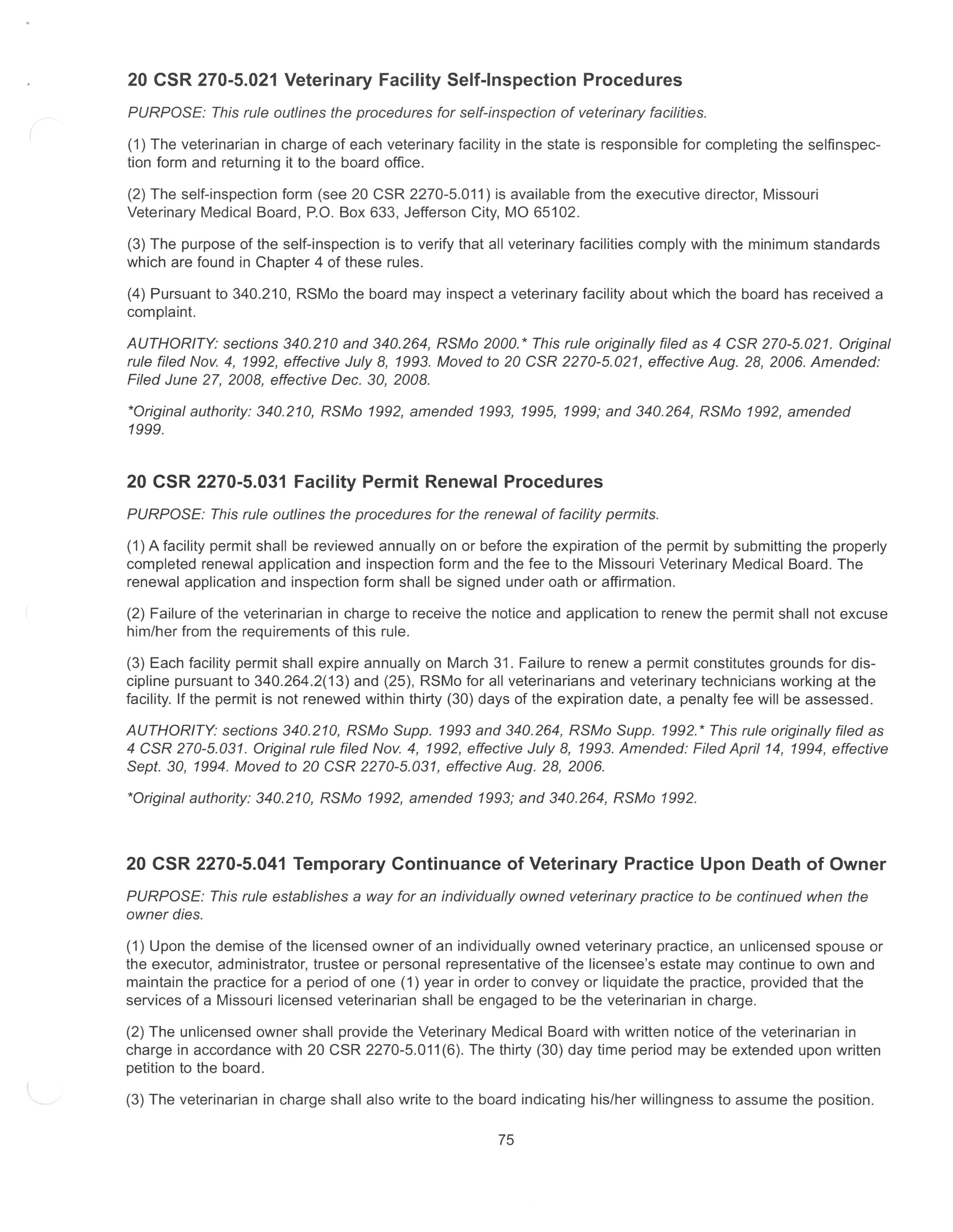
*Original authority: 340.210, RSMo 1992, amended 1993; and 340 .264, RSMo 1992.
20 CSR 2270-5.041 Temporary Continuance of Veterinary Practice Upon Death of Owner
PURPOSE: This rule establishes a way for an individually owned veterinary practice to be continued when the owner dies.
(1) Upon the demise of the licensed owner of an individually owned veterinary practice , an unlicensed spouse or the executor, administrator, trustee or personal representative of the licensee's estate may continue to own and maintain the practice for a period of one (1) year in order to convey or liquidate the practice, provided that the services of a Missouri licensed veterinarian shall be engaged to be the veterinarian in charge
(2) The unlicensed owner shall provide the Veterinary Medical Board with written notice of the veterinarian in charge in accordance with 20 CSR 2270-5.011 (6) The thirty (30) day time period may be extended upon written petition to the board.
(3) The veterinarian in charge shall also write to the board indicating his/her willingness to assume the position.
75
(4) If, for any reason, the veterinarian in charge is terminated, both the owner and the veterinarian in charge shall immediately inform the board in writing and a new veterinarian in charge shall be immediately engaged and registered with the board.
(5) The one (1 )-year period of conveyance or liquidation may be extended following written petition to the board.
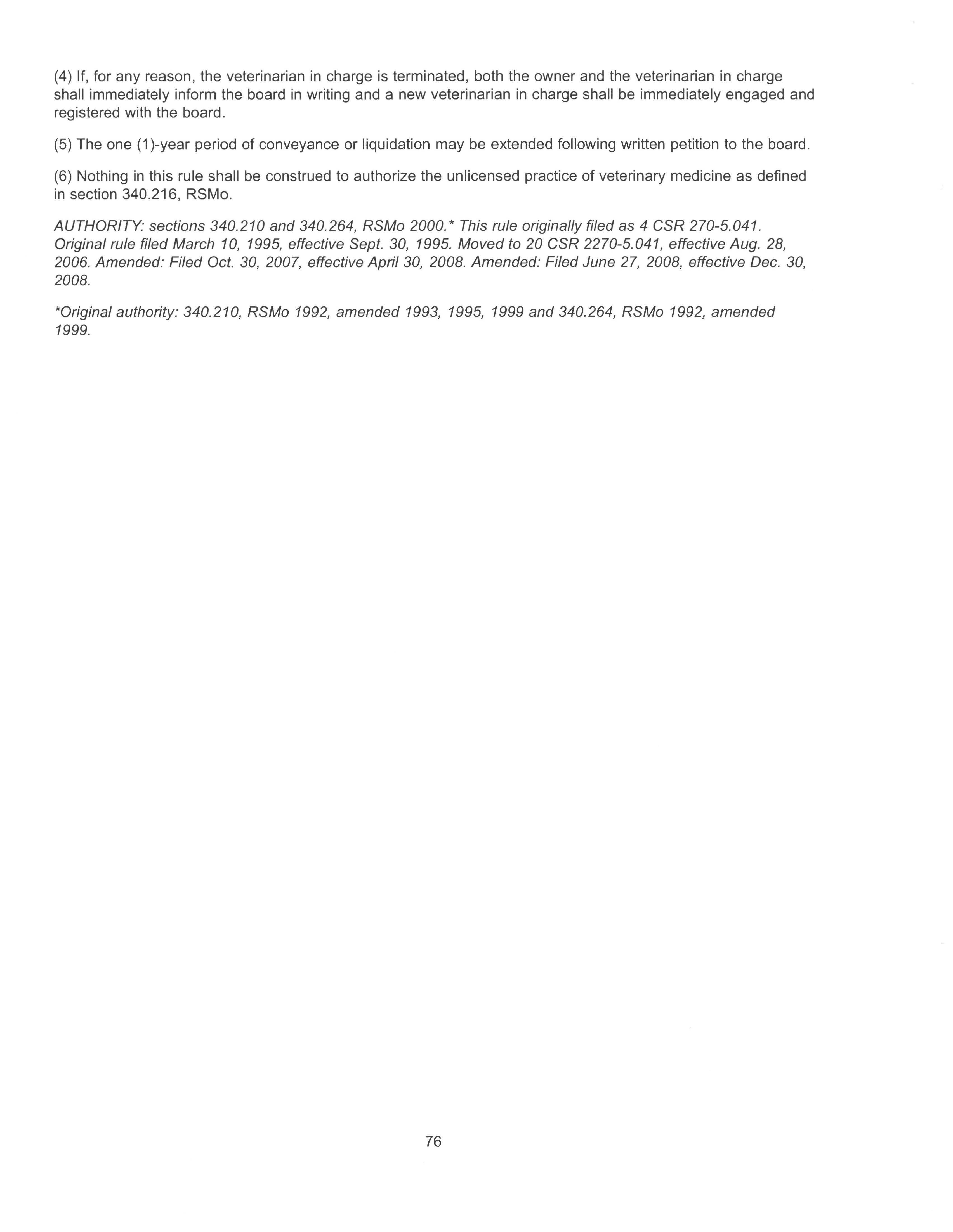
(6) Nothing in this rule shall be construed to authorize the unlicensed practice of veterinary medicine as defined in section 340.216, RSMo.
AUTHORITY: sections 340.210 and 340.264, RSMo 2000. *This rule originally filed as 4 CSR 270-5.041. Original rule filed March 10, 1995, effective Sept. 30, 1995. Moved to 20 CSR 2270-5.041, effective Aug. 28, 2006. Amended: Filed Oct. 30, 2007, effective April 30, 2008. Amended: Filed June 27, 2008, effective Dec. 30, 2008.
*Original authority: 340.210, RSMo 1992, amended 1993, 1995, 1999 and 340.264, RSMo 1992, amended 1999.
76
2270-Missouri Veterinary Medical Board
Chapter 6-Professional Conduct for the Practice of Veterinary Medicine
20 CSR 2270-6.011 Rules of Professional Conduct
PURPOSE: This rule establishes a professsional code of conduct for veterinarians and veterinary technicians.
(1) Pursuant to section 340.210.2(13), RSMo, the Missouri Veterinary Medical Board adopts the following rules to be referred to as the rules of professional conduct. These rules of professional conduct are binding on every person licensed by the board to practice as a veterinarian or registered by the board to practice as a veterinary technician. Whenever the term licensee is used, it shall be read to include any individual possessing a license, certificate of registration, permit, or any other form of authorization issued by the board pursuant to Chapter 340, RSMo. Any act or practice found to be in violation of these rules of professional conduct shall be considered as unprofessional conduct and be grounds for the filing of a complaint with the Administrative Hearing Commission.
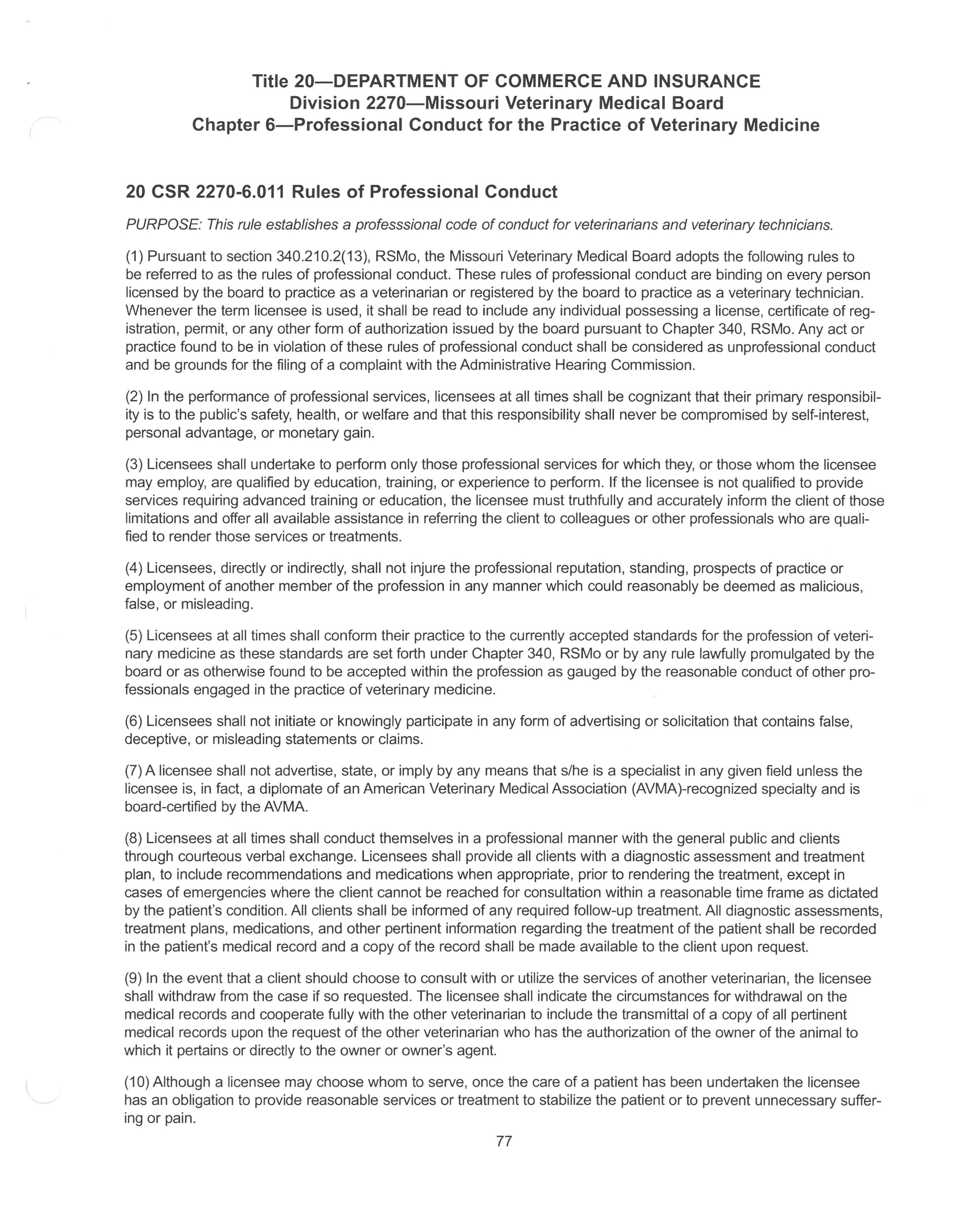
(2) In the performance of professional services, licensees at all times shall be cognizant that their primary responsibility is to the public's safety, health, or welfare and that this responsibility shall never be compromised by self-interest, personal advantage, or monetary gain.
(3) Licensees shall undertake to perform only those professional services for which they, or those whom the licensee may employ, are qualified by education, training, or experience to perform. If the licensee is not qualified to provide services requiring advanced training or education, the licensee must truthfully and accurately inform the client of those limitations and offer all available assistance in referring the client to colleagues or other professionals who are qualified to render those services or treatments.
(4) Licensees, directly or indirectly, shall not injure the professional reputation, standing, prospects of practice or employment of another member of the profession in any manner which could reasonably be deemed as malicious, false, or misleading.
(5) Licensees at all times shall conform their practice to the currently accepted standards for the profession of veterinary medicine as these standards are set forth under Chapter 340, RSMo or by any rule lawfully promulgated by the board or as otherwise found to be accepted within the profession as gauged by the reasonable conduct of other professionals engaged in the practice of veterinary medicine.
(6) Licensees shall not initiate or knowingly participate in any form of advertising or solicitation that contains false, deceptive, or misleading statements or claims.
(7) A licensee shall not advertise, state, or imply by any means that s/he is a specialist in any given field unless the licensee is, in fact, a diplomate of an American Veterinary Medical Association (AVMA)-recognized specialty and is board-certified by the AVMA.
(8) Licensees at all times shall conduct themselves in a professional manner with the general public and clients through courteous verbal exchange. Licensees shall provide all clients with a diagnostic assessment and treatment plan, to include recommendations and medications when appropriate, prior to rendering the treatment, except in cases of emergencies where the client cannot be reached for consultation within a reasonable time frame as dictated by the patient's condition. All clients shall be informed of any required follow-up treatment. All diagnostic assessments, treatment plans, medications, and other pertinent information regarding the treatment of the patient shall be recorded in the patient's medical record and a copy of the record shall be made available to the client upon request.
(9) In the event that a client should choose to consult with or utilize the services of another veterinarian, the licensee shall withdraw from the case if so requested. The licensee shall indicate the circumstances for withdrawal on the medical records and cooperate fully with the other veterinarian to include the transmittal of a copy of all pertinent medical records upon the request of the other veterinarian who has the authorization of the owner of the animal to which it pertains or directly to the owner or owner's agent.
(1 0) Although a licensee may choose whom to serve , once the care of a patient has been undertaken the licensee has an obligation to provide reasonable services or treatment to stabilize the patient or to prevent unnecessary suffering or pain.
20-DEPARTMENT
Title
OF COMMERCE AND INSURANCE Division
77
(11) Licensees shall not reveal confidential, proprietary, or privileged facts or data or any other sensitive information contained in a patient's medical records or as otherwise obtained in a professional capacity without the prior consent of the client except as oth-erwise authorized or required by Chapter 340, RSMo, lawful rules as promulgated by the board, court order, or any other state or federal law, or regulation. However, this sec-tion shall not apply to cases in which the vet-erinarian may observe animal abuse or neglect. The board recognizes that veterinar-ians may observe cases of animal abuse or neglect as defined by federal or state laws, or local ordinances. When these situations cannot be resolved through education, the board considers it the responsibility of the veteri-narian to report such cases to the appropriate authorities. Disclosures may be necessary to protect the health and welfare of animals and people. Veterinarians should be aware that accurate record keeping and documentation of these cases are invaluable.
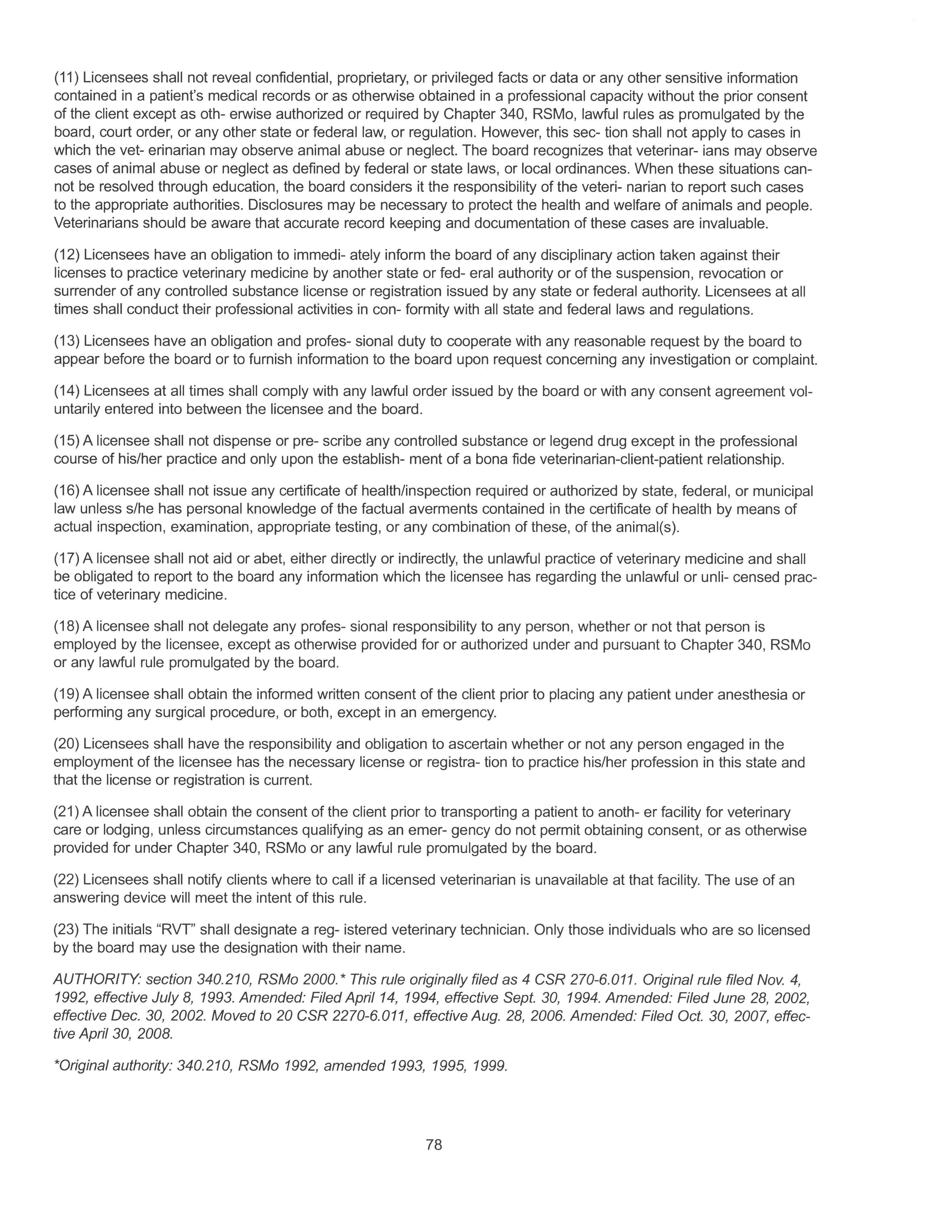
(12) Licensees have an obligation to immedi- ately inform the board of any disciplinary action taken against their licenses to practice veterinary medicine by another state or fed-eral authority or of the suspension, revocation or surrender of any controlled substance license or registration issued by any state or federal authority. Licensees at all times shall conduct their professional activities incon-formity with all state and federal laws and regulations.
(13) Licensees have an obligation and profes-sional duty to cooperate with any reasonable request by the board to appear before the board or to furnish information to the board upon request concerning any investigation or complaint.
(14) Licensees at all times shall comply with any lawful order issued by the board or with any consent agreement voluntarily entered into between the licensee and the board.
(15) A licensee shall not dispense or pre- scribe any controlled substance or legend drug except in the professional course of his/her practice and only upon the establish- ment of a bona fide veterinarian-client-patient relationship.
(16) A licensee shall not issue any certificate of health/inspection required or authorized by state, federal, or municipal law unless s/he has personal knowledge of the factual averments contained in the certificate of health by means of actual inspection, examination, appropriate testing, or any combination of these, of the animal(s).
(17) A licensee shall not aid or abet, either directly or indirectly, the unlawful practice of veterinary medicine and shall be obligated to report to the board any information which the licensee has regarding the unlawful or unli-censed practice of veterinary medicine.
(18) A licensee shall not delegate any profes-sional responsibility to any person, whether or not that person is employed by the licensee, except as otherwise provided for or authorized under and pursuant to Chapter 340 , RSMo or any lawful rule promulgated by the board.
(19) A licensee shall obtain the informed written consent of the client prior to placing any patient under anesthesia or performing any surgical procedure, or both, except in an emergency.
(20) Licensees shall have the responsibility and obligation to ascertain whether or not any person engaged in the employment of the licensee has the necessary license or registra- tion to practice his/her profession in this state and that the license or registration is current.
(21) A licensee shall obtain the consent of the client prior to transporting a patient to anoth-er facility for veterinary care or lodging, unless circumstances qualifying as an emer-gency do not permit obtaining consent, or as otherwise provided for under Chapter 340, RSMo or any lawful rule promulgated by the board.
(22) Licensees shall notify clients where to call if a licensed veterinarian is unavailable at that facility. The use of an answering device will meet the intent of this rule.
(23) The initials "RVT" shall designate a reg- istered veterinary technician. Only those individuals who are so licensed by the board may use the designation with their name.
AUTHORITY: section 340.210, RSMo 2000. *This rule originally filed as 4 CSR 270-6.011 . Original rule filed Nov. 4, 1992, effective July 8, 1993. Amended: Filed April14, 1994, effective Sept. 30, 1994. Amended: Filed June 28, 2002, effective Dec. 30, 2002. Moved to 20 CSR 2270-6.011, effective Aug. 28, 2006. Amended: Filed Oct. 30, 2007, effective April 30, 2008.
*Original authority: 340.210, RSMo 1992, amended 1993, 1995, 1999.
78
Title 20-DEPARTMENT OF COMMERCE AND INSURANCE Division 2270-Missouri Veterinary Medical Board
Chapter 7-Disciplinary Proceedings
20 CSR 2270-7.010 Public Complaint Handling and Disposition Procedure
PURPOSE: This rule establishes a procedure for the receipt, handling and disposition of public complaints pursuant to the mandate of section 620.010.15(6), RSMo.
(1) All complaints shall be made in writing on an official complaint form available from the board office and shall fully identify the complainant by name and address. Oral or telephone communications will not be considered or processed as complaints. The person making these communications will be asked to file a written statement.
(2) Complaints shall be mailed or delivered to the following address: Missouri Veterinary Medical Board, P.O. Box 633, Jefferson City, MO 65102. Complaints may be based upon personal knowledge or beliefs based on information received from other sources. The executive director or any board staff member may file a complaint pursuant to this rule in the same manner as any member of the public.
(3) Each complaint received under this rule will be maintained by the board. The complaint file will contain a record of each complainant's name and address; the name and address of the subject(s) of the complaint; the date each complaint is received by the board; a brief statement of the complaint, including the name of any person injured or victimized by the alleged acts or practices; a notation whether the complaint resulted in its dismissal by the board or formal charges being filed with the Administrative Hearing Commission and the ultimate disposition of the complaint. This complaint file shall be a closed record of the board.
(4) Each complaint received under this rule shall be acknowledged in writing. The complainant shall be notified of the ultimate disposition of the complaint.
(5) This rule shall not be deemed to limit the board's authority to file a complaint with the Administrative Hearing Commission charging a licensee with any actionable conduct or violation. The complaint filed by the board need not be limited to the acts charged in a public complaint.
AUTHORITY· sections 340.210 and 340.282, RSMo 2000 and 620.010.15, RSMo Supp. 2002. *This rule originally filed as 4 CSR 270-7.010. Original rule filed Nov. 4, 1992, effective July 8, 1993. Amended: Filed Apri/1, 2003, effective Sept. 30, 2003. Moved to 20 CSR 2270-7.010, effective Aug. 28, 2006.
*Original authority: 340.210, RSMo 1992, amended 1993, 1995, 1999; 340.282, RSMo 1992; and 620.010.15., RSMo 1973, amended 1981, 1983, 1986,1989, 1990, 1993, 1994, 1995, 1999, 2001.
20 CSR 2270-7.020 Revocation of Temporary or Provisional License
PURPOSE: This rule sets forth the procedure to be used for revocation of temporary licenses under section 340.250, RSMo.
(1) All proceedings instituted or conducted by the board, or both, in regard to the revocation of temporary or provisional licenses as authorized under section 340.250, RSMo shall be handled in accordance with the provisions as set forth under Chapter 536, RSMo as a contested case.
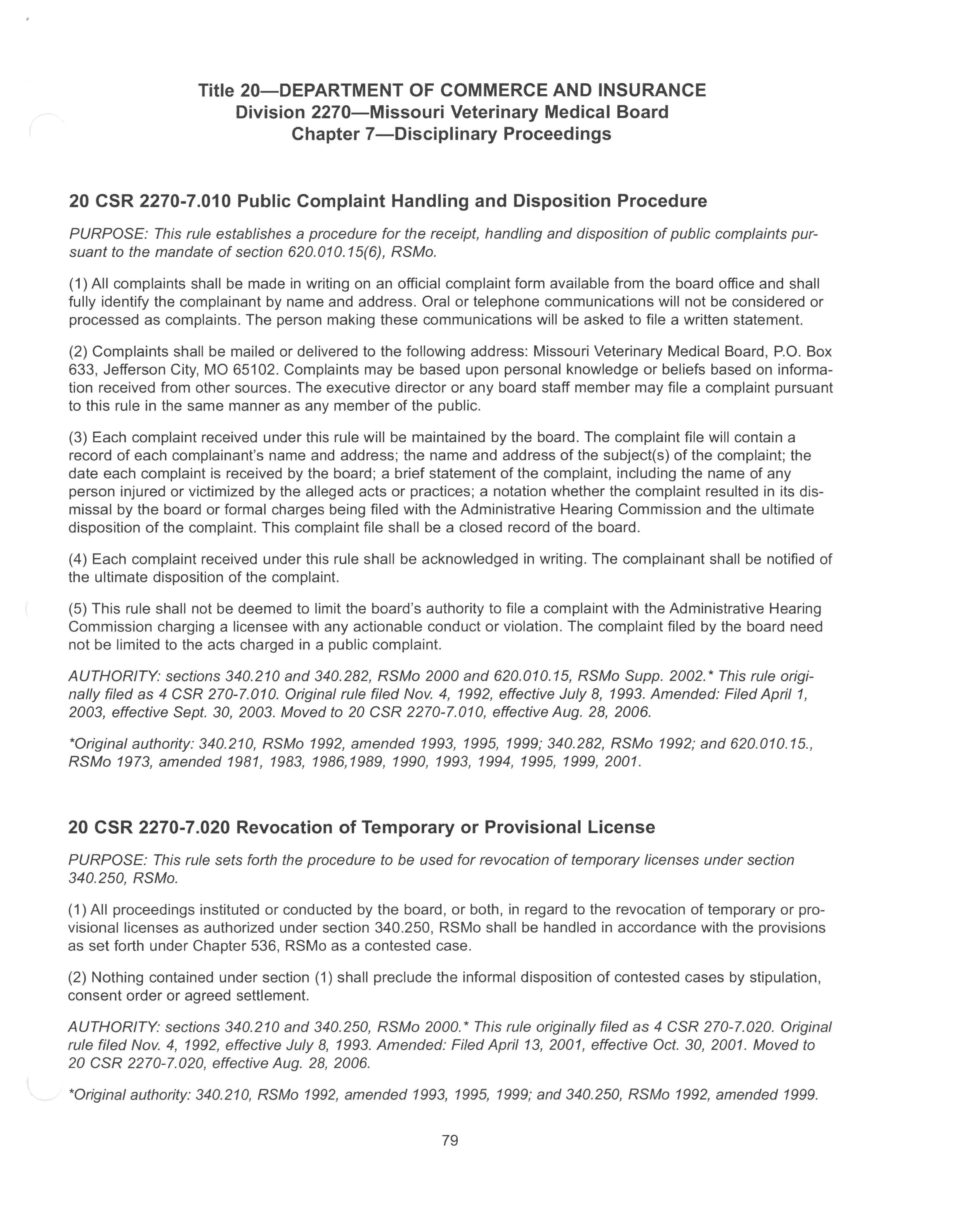
(2) Nothing contained under section (1) shall preclude the informal disposition of contested cases by stipulation, consent order or agreed settlement.
AUTHORITY: sections 340.210 and 340.250, RSMo 2000. *This rule originally filed as 4 CSR 270-7.020. Original rule filed Nov. 4, 1992, effective July 8, 1993. Amended: Filed April13, 2001, effective Oct. 30, 2001. Moved to 20 CSR 2270-7.020, effective Aug. 28, 2006.
*Original authority: 340.210, RSMo 1992, amended 1993, 1995, 1999; and 340.250, RSMo 1992, amended 1999.
79
20 CSR 2270-7.030 Automatic Revocation of License
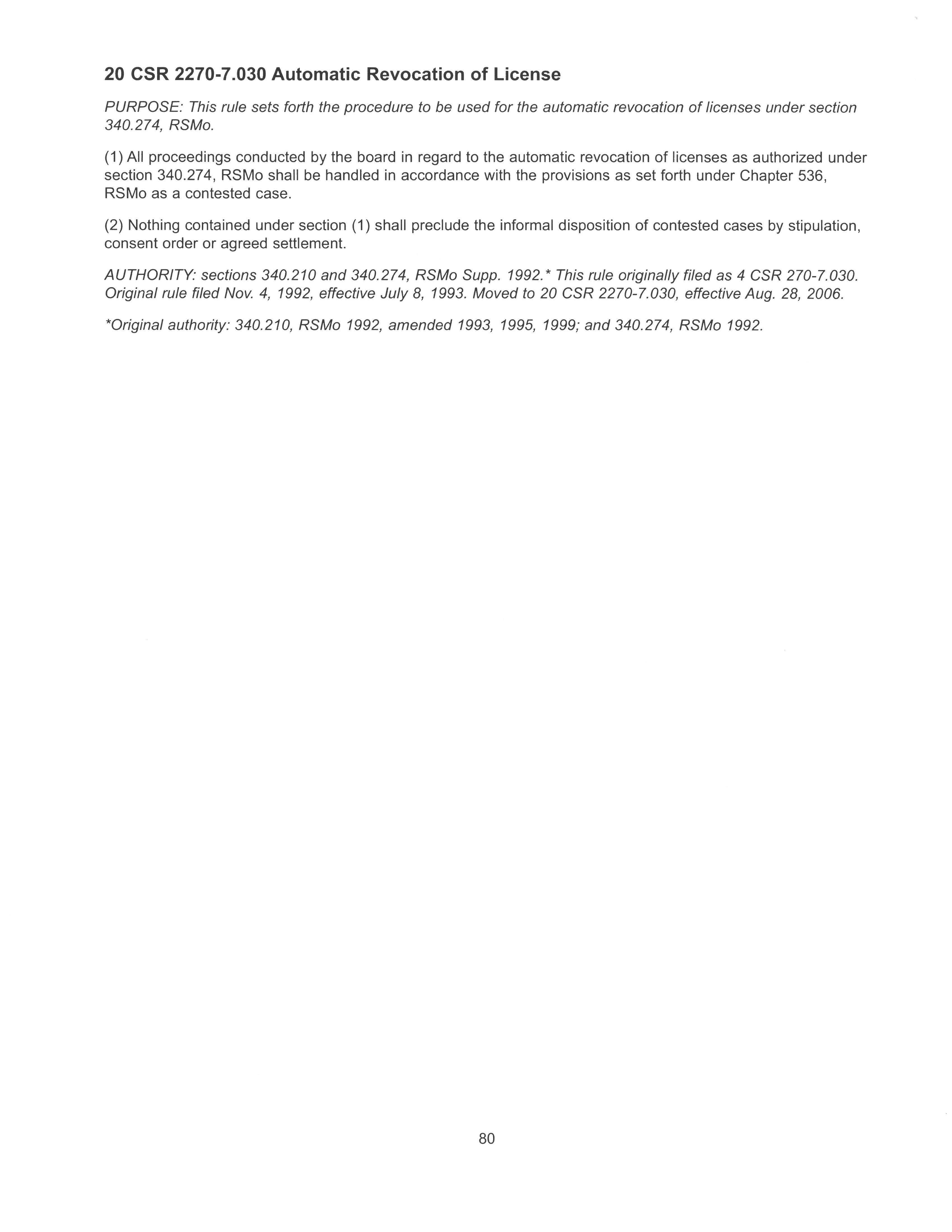
PURPOSE: This rule sets forth the procedure to be used for the automatic revocation of licenses under section 340.274, RSMo.
(1) All proceedings conducted by the board in regard to the automatic revocation of licenses as authorized under section 340.274, RSMo shall be handled in accordance with the provisions as set forth under Chapter 536, RSMo as a contested case.
(2) Nothing contained under section (1) shall preclude the informal disposition of contested cases by stipulation, consent order or agreed settlement.
AUTHORITY: sections 340.210 and 340.274, RSMo Supp. 1992. *This rule originally filed as 4 CSR 270-7.030. Original rule filed Nov. 4, 1992, effective July 8, 1993. Moved to 20 CSR 2270-7.030, effective Aug. 28, 2006.
*Original authority: 340.210, RSMo 1992, amended 1993, 1995, 1999; and 340.274, RSMo 1992.
80
MISSOURI STATE VETERINARY MEDICAL BOARD REQUIRED LEVELS OF SUPERVISION
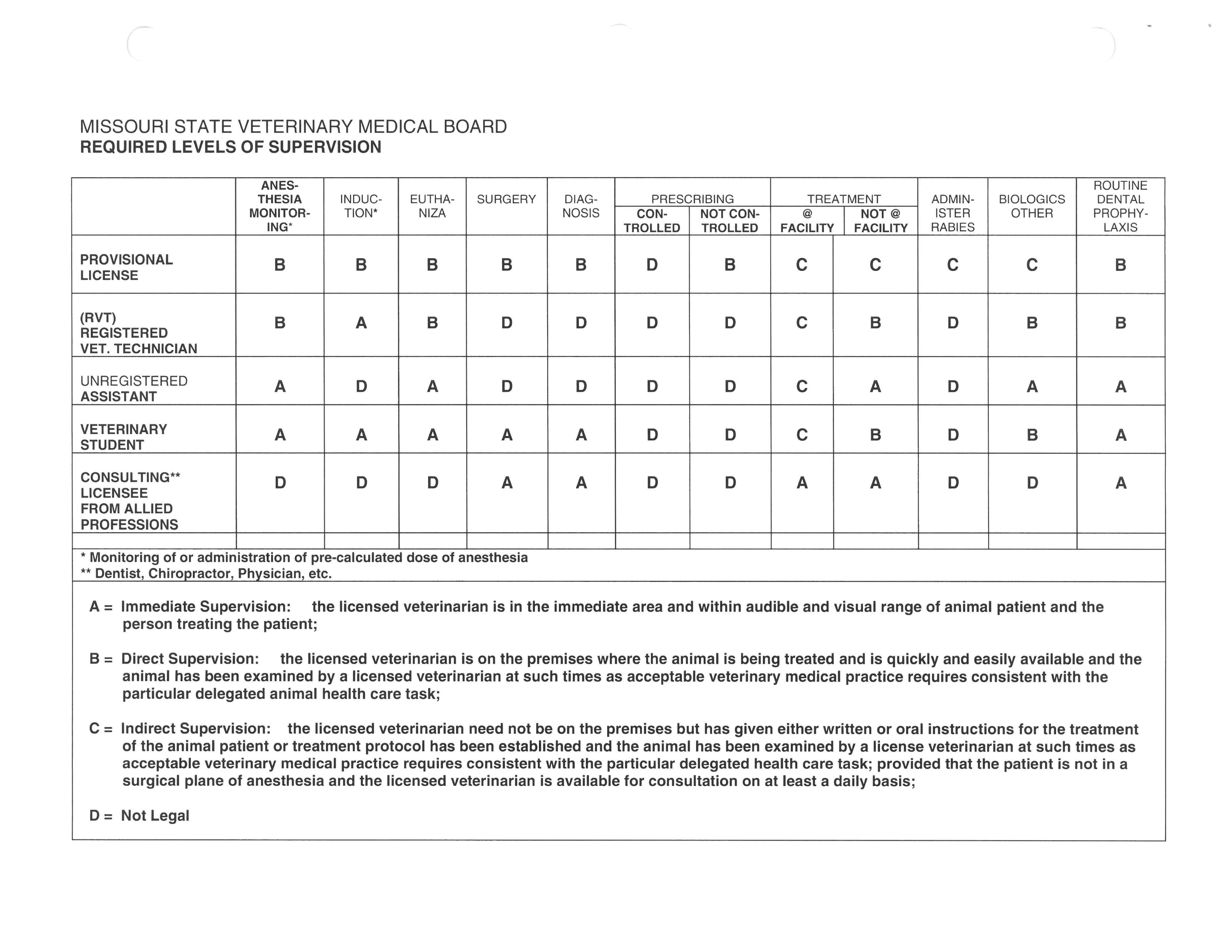
ANESTHESIA INDUC- EUTHA- SURGERY MONITOR- TION* NIZA lNG*
* Monitoring of or administration of pre-calculated dose of anesthesia ** Dentist, Chiropractor, Physician, etc.
A= Immediate Supervision: the licensed veterinarian is in the immediate area and within audible and visual range of animal patient and the person treating the patient;
B = Direct Supervision: the licensed veterinarian is on the premises where the animal is being treated and is quickly and easily available and the animal has been examined by a licensed veterinarian at such times as acceptable veterinary medical practice requires consistent with the particular delegated animal health care task;
C = Indirect Supervision: the licensed veterinarian need not be on the premises but has given either written or oral instructions for the treatment of the animal patient or treatment protocol has been established and the animal has been examined by a license veterinarian at such times as acceptable veterinary medical practice requires consistent with the particular delegated health care task; provided that the patient is not in a surgical plane of anesthesia and the licensed veterinarian is available for consultation on at least a daily basis;
D = Not Legal
PROVISIONAL B B B B LICENSE (RVT) B A B D REGISTERED VET. TECHNICIAN UNREGISTERED A D A D ASSISTANT VETERINARY A A A A STUDENT CONSULTING** D D D A LICENSEE FROM ALLIED PROFESSIONS
DIAGNOS IS B D D A A ROUTINE PRESCRIBING TREATMENT ADMIN- BIOLOGICS DENTAL CON- NOT CON- @ I NOT@ ISTER OTHER PROPHYTROLLED TROLLED FACILITY FACILITY RABIES LAXIS D B c c c c B D D c B D B B D D c A D A A D D c B D B A D D A A D D A

82

• • (

""'


















 The Honorable Michael L. Parson Governor
STATE OF MISSOURI
The Honorable Michael L. Parson Governor
STATE OF MISSOURI
















































































